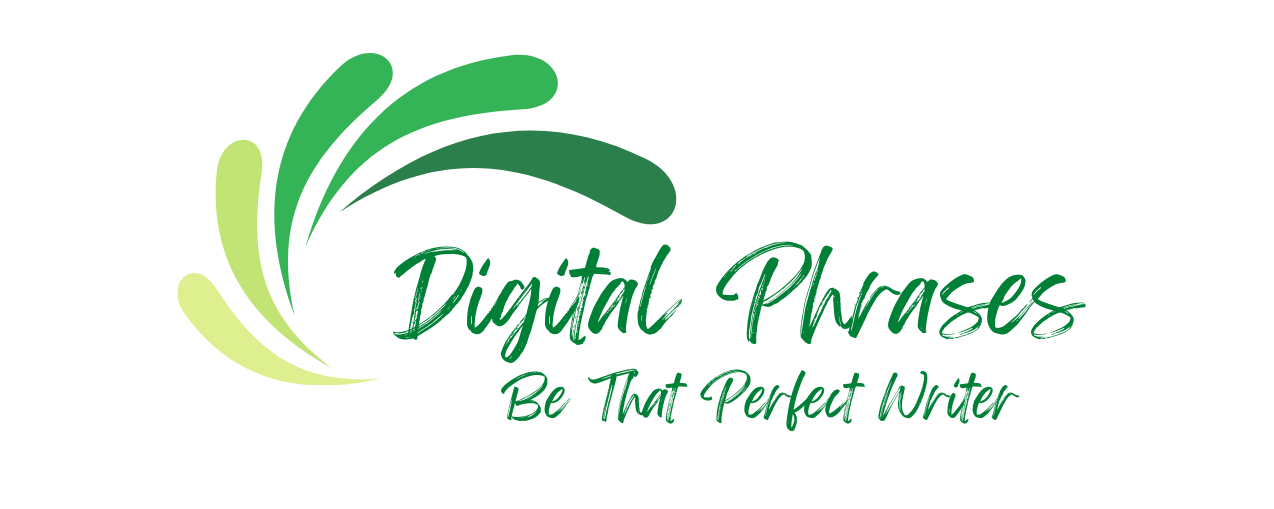

30 Writing Prompts About Culture
The world is shrinking!
Borders are blurring, and everyone’s bumping into everyone else. That means understanding different cultures isn’t some fancy extra anymore, it’s like, essential.
Maybe you’re a travel addict, a jet- setting business whiz, or just someone who loves the crazy quilt of human stuff – whatever your reason, culture is an awesome way to see the world in a whole new light.
But where do you even begin with such a giant, messy topic?
Here’s the magic word : writing.
Think of writing prompts like a compass.
They’ll help you navigate the maze of customs, traditions , and all that weird stuff that makes each place unique.
We’re about to crack open a treasure chest of prompts to get your brain buzzing about culture.
Get ready to explore the world, one prompt at a time!
Writing Prompts About Culture
- Dive into the world of culinary traditions, exploring how food plays a vital role in expressing cultural identity . Consider a family recipe passed down through generations or a dish unique to a particular region. How do the ingredients, preparation methods, and stories behind these foods reflect the identity and values of the people who consume them? Explore the deep connections between food and cultural expression.
- As societies become more globalized, traditional celebrations sometimes evolve to incorporate modern elements. Imagine a traditional festival or celebration from a specific culture. How might this event transform when influenced by modern technologies, values, or social practices? Write about the adaptation and fusion of ancient traditions in today’s globalized world.
- Artifacts, whether ancient pottery or a grandmother ’s hand-embroidered shawl, are tangible representations of a culture’s history and values. Choose an artifact that resonates with you, perhaps from a museum, personal collection, or historical site. What stories does it tell? Delve into the journey and significance of this artifact within its cultural context.
- Language is a living entity, always evolving, but in its evolution, certain words, idioms, or phrases might get lost. Consider a dying language or dialect and the culture it represents. How does the decline or evolution of a language impact the preservation of its corresponding culture? Narrate the journey of a language and the cultural nuances it safeguards.
- Throughout history, fashion has often been a medium to challenge societal norms and make political or cultural statements. Choose a period or a culture where fashion played a significant role in societal change or resistance. Examine how fashion became a powerful tool for cultural revolution during that time.
- Migration patterns have historically led to the fusion of cultures, birthing new traditions, cuisines, and art forms. Choose two distinct cultures and imagine how they might blend if a significant migration occurred between them. Highlight the beauty and challenges of creating a hybrid culture from two distinct roots.
- Every culture has its unique rhythms, melodies, and musical instruments that encapsulate its spirit and history. Select a specific cultural music form, be it folk songs , classical pieces, or indigenous rhythms. How does this music narrate the tales, struggles, and celebrations of its people? Dive into the soundscape of a culture and uncover its stories.
- Myths , legends, and folktales are the backbone of many cultures, passing down morals, values, and lessons through the ages. Pick a well-known myth from any culture. How might this myth be interpreted in today’s society? Reimagine a cultural myth in a modern setting, keeping its core message intact.
- The skylines and structures of a region can often tell tales of its history, values, and aspirations. Choose an iconic architectural marvel from any culture and delve into its design, purpose, and the stories it embodies. How do the choices in its construction reflect the beliefs and aesthetics of its society? Uncover the symbiotic relationship between architecture and the culture it emerges from.
- Sports have a way of uniting communities and nations. Think about a sport that is intrinsic to a particular culture. How has it evolved over time, and what does its popularity (or decline) reveal about societal shifts? Delve into the world of sports as a reflection of cultural change and unity.
- Literature is often a mirror to society, reflecting its mores, conflicts , and aspirations. Choose a literary classic from any culture and analyze the societal norms it addresses. How do the narratives and character arcs within the story resonate with or rebel against the cultural values of its time? Explore the intersections of literature and the cultural fabric it is woven from.
- The advent of the digital age has reshaped the way cultures express themselves. Consider a traditional art form or practice, and imagine how it might adapt in a world dominated by digital technology . Would it find a new audience, evolve into a different form, or struggle to remain relevant? Analyze the metamorphosis of traditional practices in the digital realm.
- Sacred sites, whether temples, churches, or natural landmarks, have long been places of pilgrimage and reverence. Choose a sacred space and explore its significance in its respective culture. How have modern beliefs and practices influenced the traditional importance of this site? Reflect on the shifting sands of faith and the endurance of sacred spaces.
- Festivals are a celebration of cultural identity, traditions, and community. However, as the world becomes more interconnected, many festivals draw international crowds. Examine the dynamics of a cultural festival when viewed and experienced by outsiders. Do they enrich the experience, or is there potential for cultural appropriation? Contemplate the complexities of cultural immersion and respect in a globalized world.
- Dance , in its many forms, encapsulates the emotions , stories, and rhythms of a culture. Focus on a specific dance form, its origins, and its evolution. How do the movements, attire, and accompanying music narrate a culture’s history and values? Step into the world of dance as a dynamic reflection of cultural legacy .
- Family dynamics and structures vary across cultures, influencing societal values, roles, and expectations. Investigate a particular culture’s family setup, whether it’s the nuclear family, joint families , matriarchal setups, or any other. How do these family structures support or challenge the broader societal norms? Delve into the intricate dance between family frameworks and cultural evolution.
- Films often encapsulate the ethos, anxieties, and aspirations of a culture at a given time. Choose a notable film from a specific culture and period. How does it address societal issues, mirror popular sentiments, or even challenge dominant narratives? Analyze how cinema serves both as a reflection and influencer of cultural trends.
- In the age of the internet, various cultures are leveraging technology to preserve and promote their heritage. Investigate how a culture uses digital platforms, such as virtual museums or augmented reality experiences, to showcase its history. What advantages and challenges does this digital shift present? Unravel the implications of digitizing cultural heritage in a rapidly evolving world.
- Era Traditional crafts, from pottery to weaving, carry the essence of a culture’s history and craftsmanship. Choose a dwindling craft form and dive into its techniques, significance, and challenges in a modern marketplace. How can these crafts bridge the old with the new? Highlight the silent tales that each crafted artifact whispers about its origin .
- With rapid urban development, many traditional cultural hubs, like old marketplaces or theaters, undergo transformation. Delve into the journey of such a cultural hub adapting to the urban sprawl. How does this evolution impact the community’s cultural expression and memory? Explore the push and pull between urban progress and cultural preservation.
- Nature has always held symbolic importance in cultural myths, tales, and rituals. Select a plant or animal deeply rooted in a culture’s lore. What does this species symbolize, and how has its role or perception shifted with changing environmental and societal landscapes? Delve into the symbiotic relationship between nature’s elements and cultural narratives.
- Educational systems play a pivotal role in shaping the mindset of the next generation. Analyze how a culture’s education system imparts its history, values, and worldviews. Are there any gaps, biases, or shifts in modern pedagogical approaches that influence cultural continuity? Reflect on education as the torchbearer of cultural legacies and its modern challenges.
- Over time, some cultural practices fade away, only to be rediscovered by newer generations seeking identity and roots. Narrate the journey of an individual or a community striving to resurrect a lost tradition. What challenges do they face, and how does the revival impact their sense of identity? Contemplate the balance between progression and the yearning for ancestral connections.
- Fusion cuisine is a testament to how different cultures can come together, creating delightful gastronomic experiences. Choose two distinct culinary traditions and imagine a fusion dish they might inspire . How do flavors, ingredients, and cooking techniques intertwine to create something novel, yet rooted in tradition? Explore the art and nuances of blending culinary cultures.
- Natural landscapes, be it mountains, rivers, or forests , have always held significant importance in shaping the lifestyles and beliefs of native cultures. Choose a prominent landscape feature and explore its significance in the legends, livelihoods, and values of its indigenous people. Probe into how nature’s canvas plays a central role in weaving cultural tales.
- Every culture boasts symbols that hold deep meanings—like the dragon in Chinese lore or the phoenix in Greek mythology . Pick a well-known symbol from a culture and trace its evolution over centuries. How has its significance or representation shifted with time, and what factors influenced those changes? Dive deep into the ever-changing meanings and perceptions attached to iconic cultural symbols.
- Throughout history, societies have faced natural and man-made disasters that have left indelible marks on their culture. Explore how a specific culture coped with and evolved due to such a calamity. Did they develop new rituals, narratives, or artistic expressions in response? Examine the capacity of culture to adapt, persevere, and transform in the face of adversity .
- Traditional games , often passed down through generations, reveal a lot about a culture’s values, strategies, and social dynamics. Choose an ancient game, perhaps one less known globally, and dissect its rules, objectives, and societal significance. Highlight how these games serve as playful windows into the psyche and history of a culture.
- Modern cities often become melting pots of various cultures, each adding its unique flavor to the urban tapestry. Focus on a metropolis known for its multicultural vibrancy. How do the diverse communities coexist, celebrate their distinct identities, and contribute to the city’s ethos? Narrate the dance of coexistence and influence in a multicultural urban setting.
- Often, it’s personal stories that provide the most profound insights into a culture’s heart and soul. Envision a diary entry of an individual from a distinct culture, capturing a day in their life , their hopes, struggles, and joys. Through this intimate lens, what larger cultural narratives emerge? Unfold the tapestry of a culture through the personal lens of one of its members.
Founder and Chief Content Curator @ Digital Phrases
I'm a writer, words are my superpower, and storytelling is my kryptonite.
DraftSparks ✨
720+ ‘Culture’ Writing Prompts
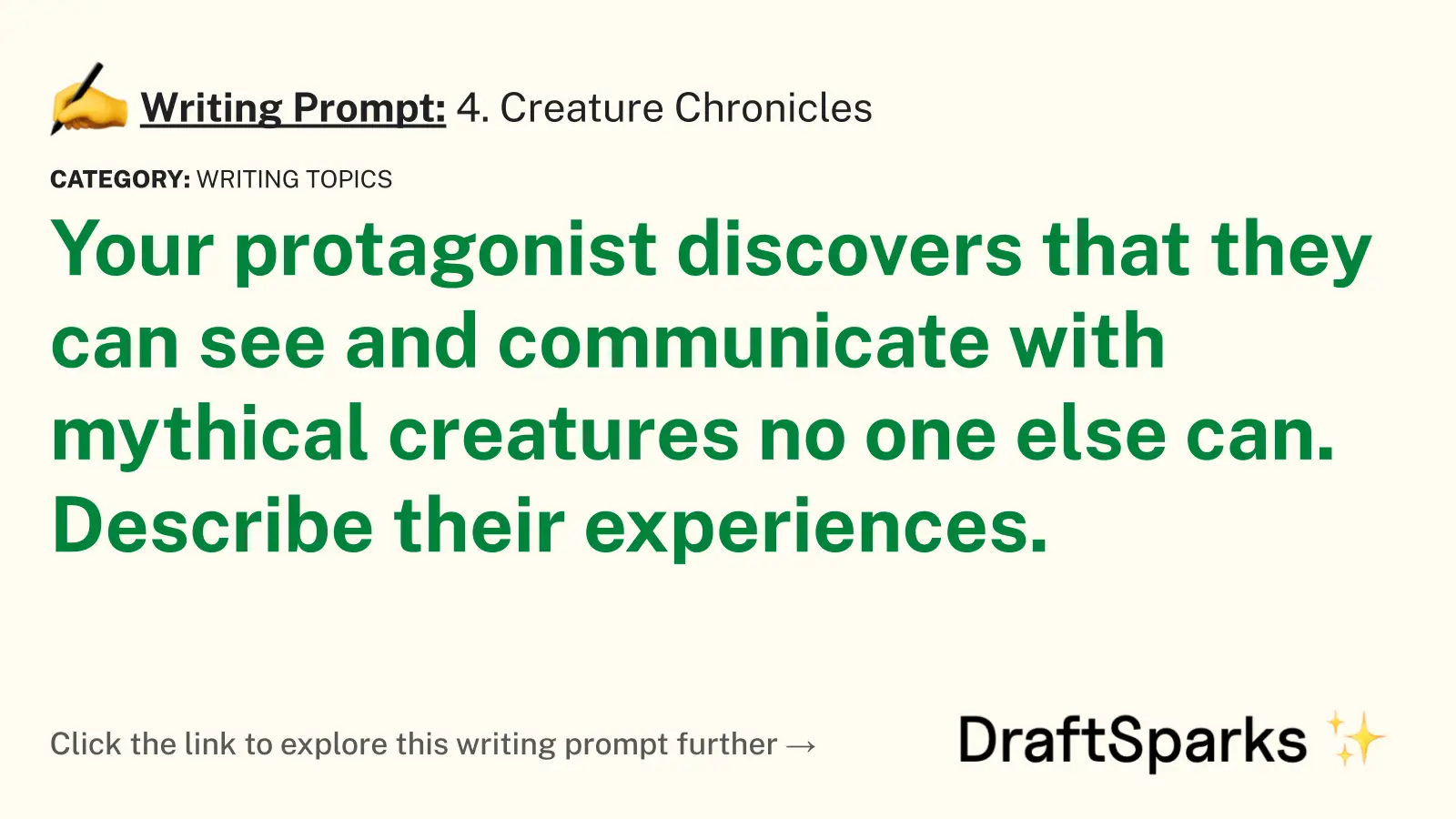
4. Creature Chronicles
Your protagonist discovers that they can see and communicate with mythical creatures no one else can. Describe their experiences.
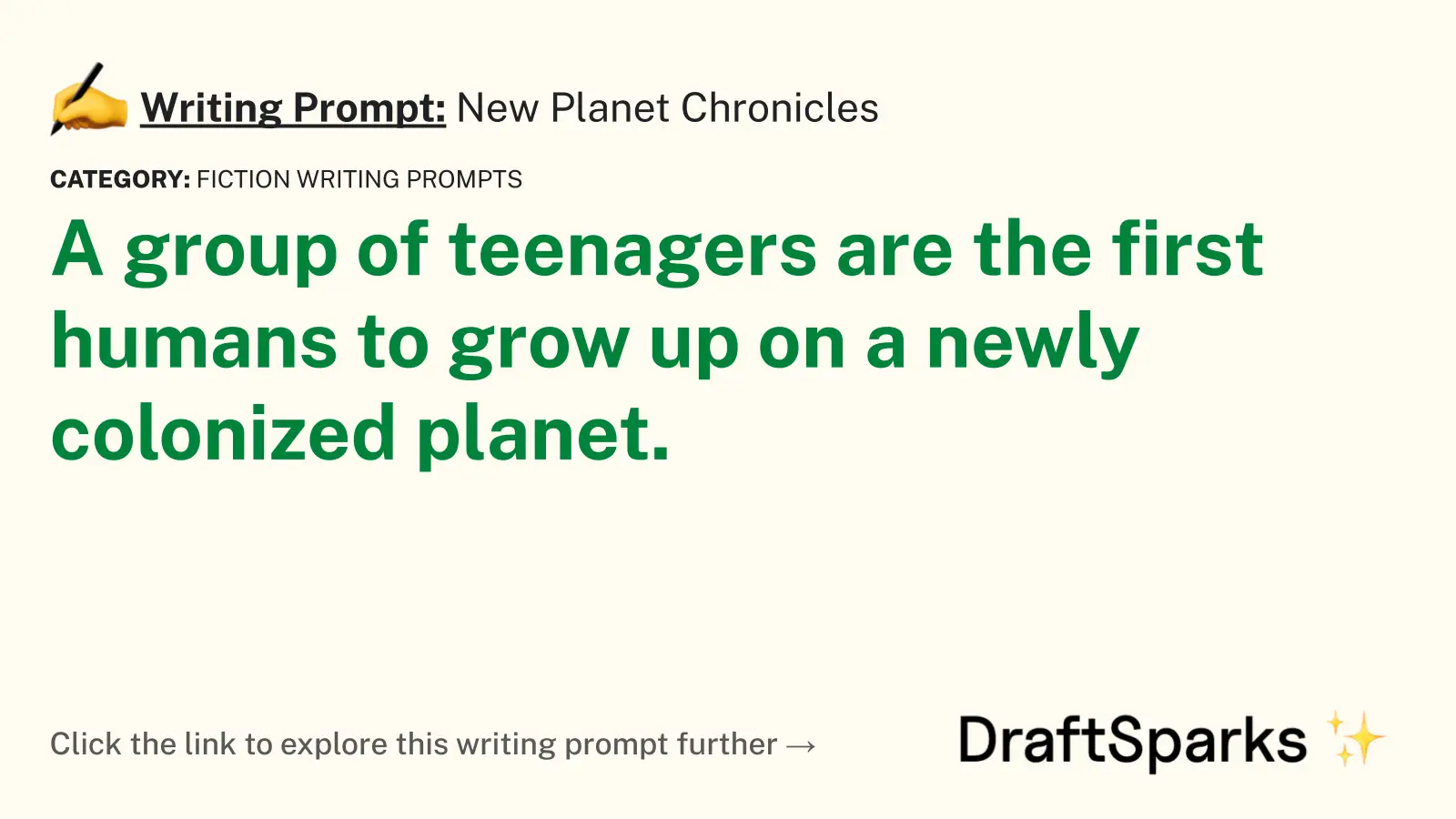
New Planet Chronicles
A group of teenagers are the first humans to grow up on a newly colonized planet.

Multilingual Metaphors of Love
Pick a metaphor that you associate with love or Valentine’s Day and translate it into different languages. Analyze how the metaphor might change or hold the same meaning in different languages.
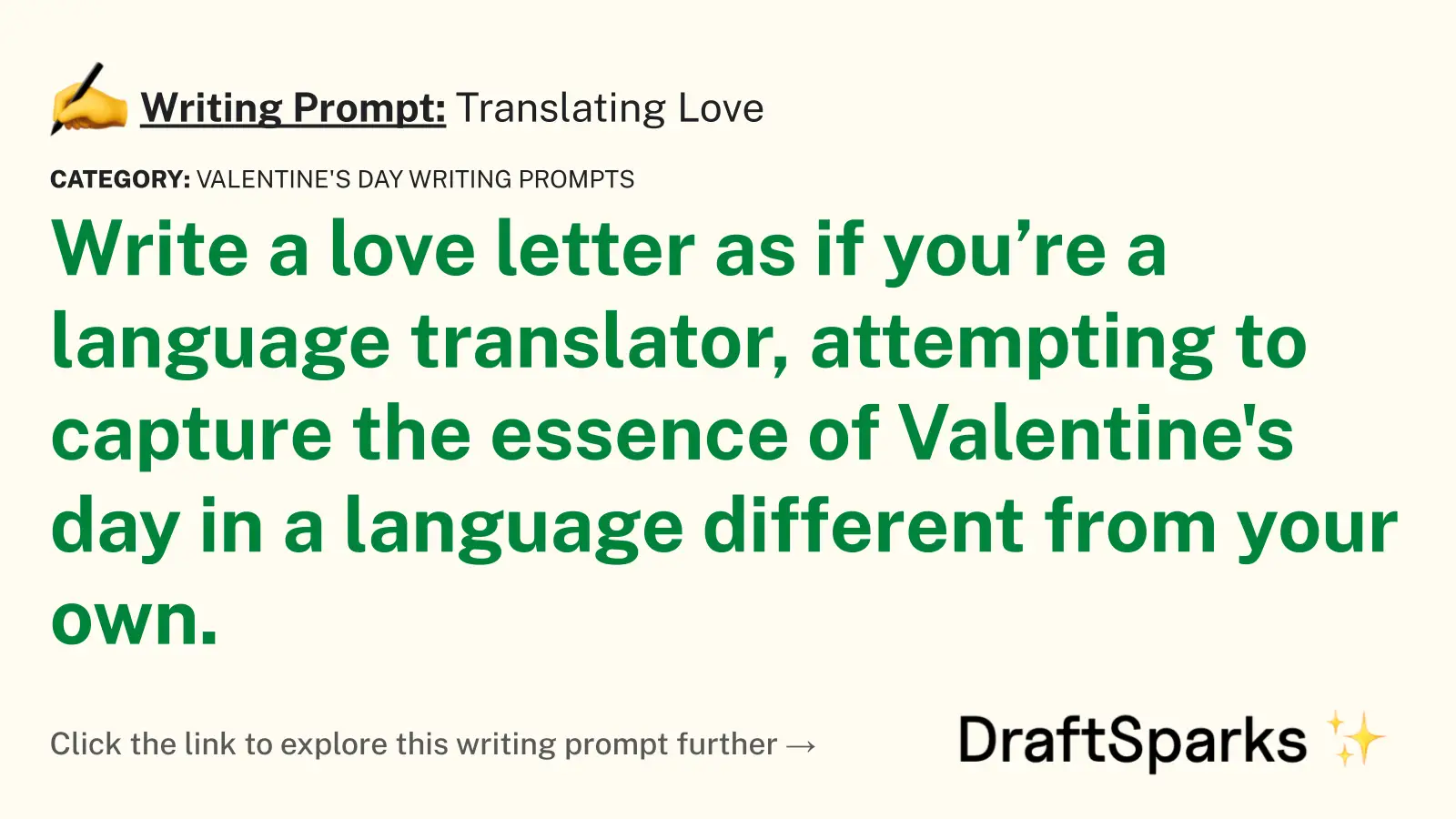
Translating Love
Write a love letter as if you’re a language translator, attempting to capture the essence of Valentine’s day in a language different from your own.

Dia dos Namorados in Brazil
Write about Brazil’s June 12th romance holiday, Dia dos Namorados, or ‘Lovers’ Day.’
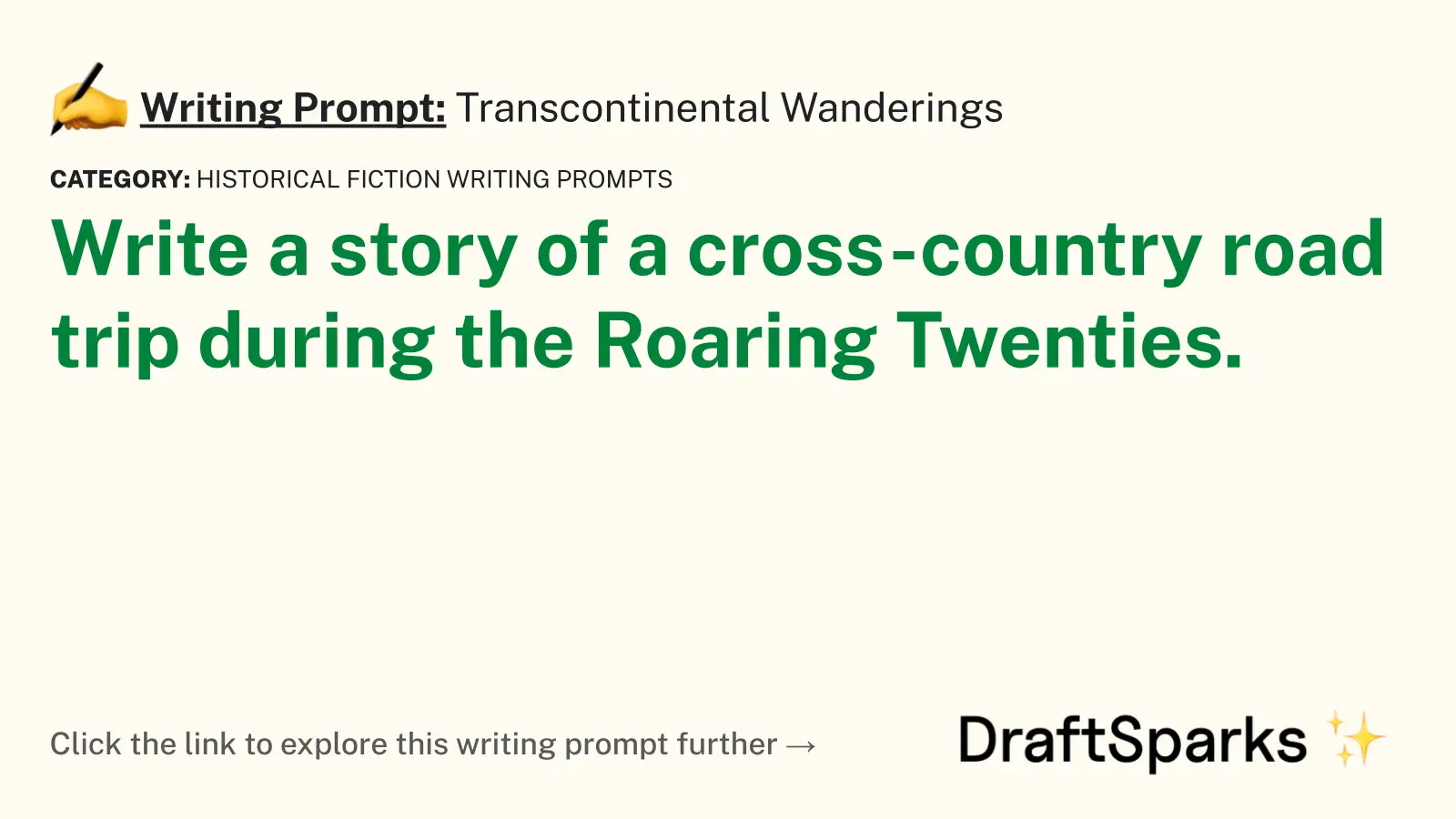
Transcontinental Wanderings
Write a story of a cross-country road trip during the Roaring Twenties.
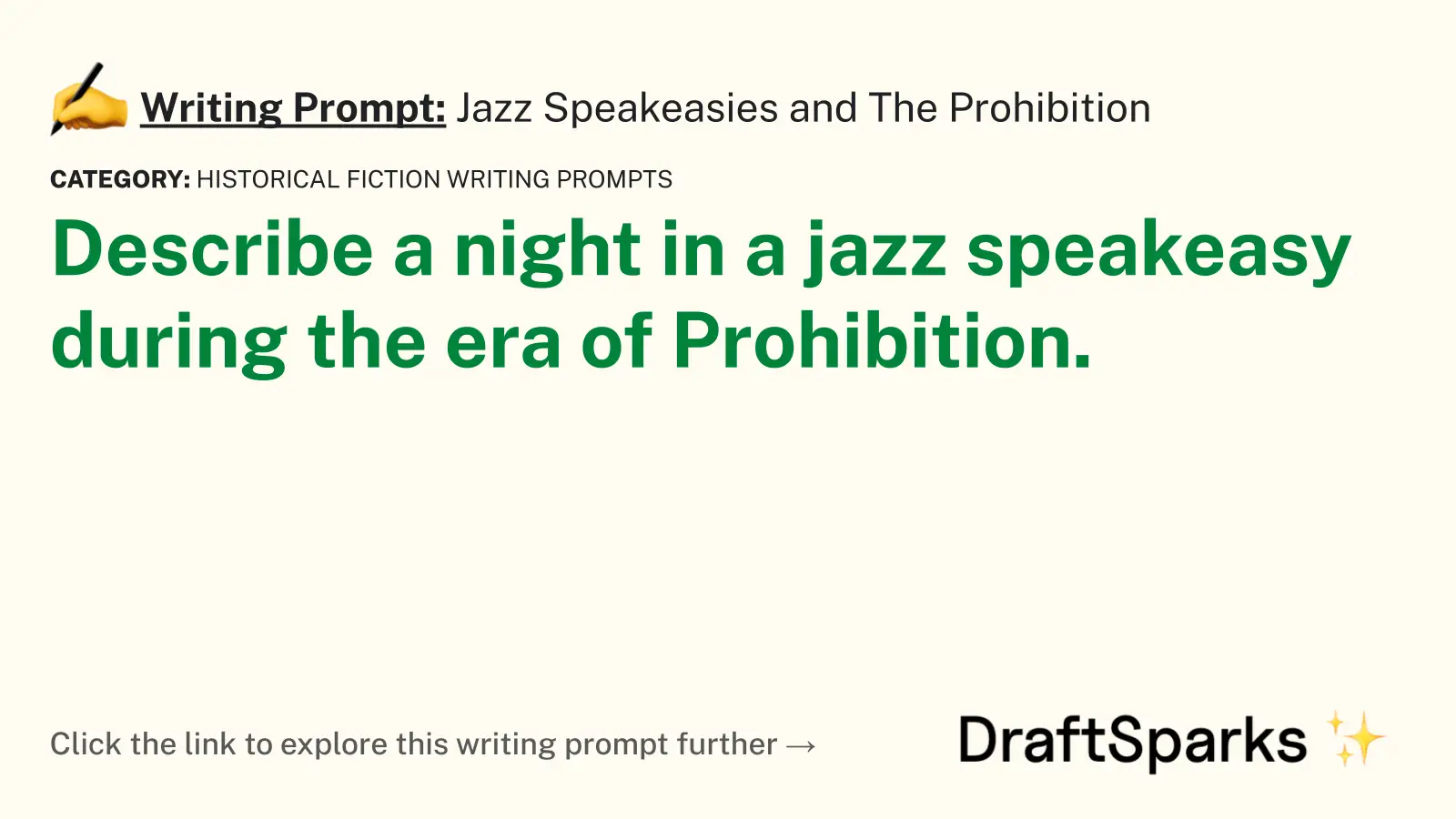
Jazz Speakeasies and The Prohibition
Describe a night in a jazz speakeasy during the era of Prohibition.

Brand Evolution
Trace the evolution of the Guinness brand from its inception to the present day.
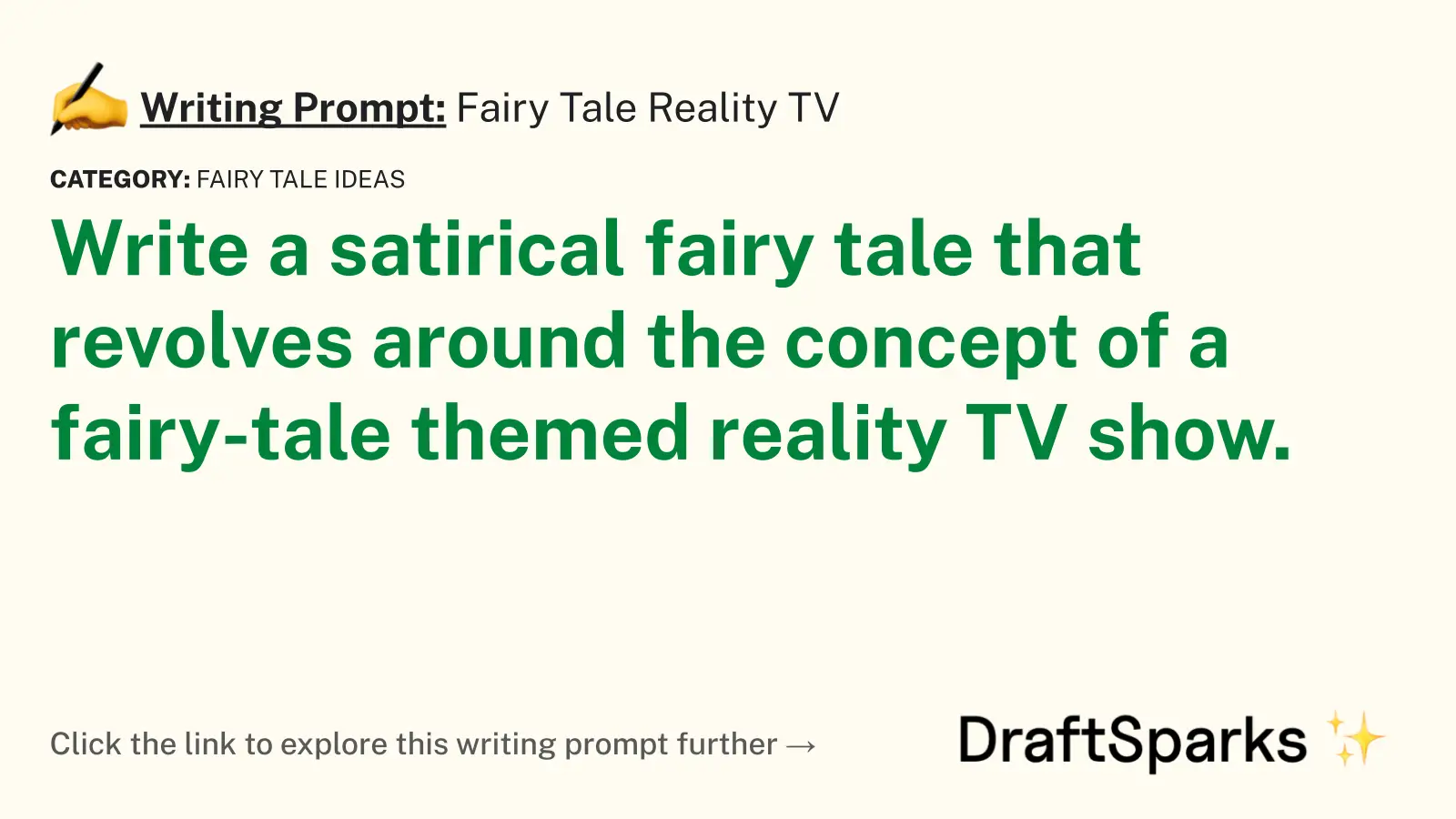
Fairy Tale Reality TV
Write a satirical fairy tale that revolves around the concept of a fairy-tale themed reality TV show.
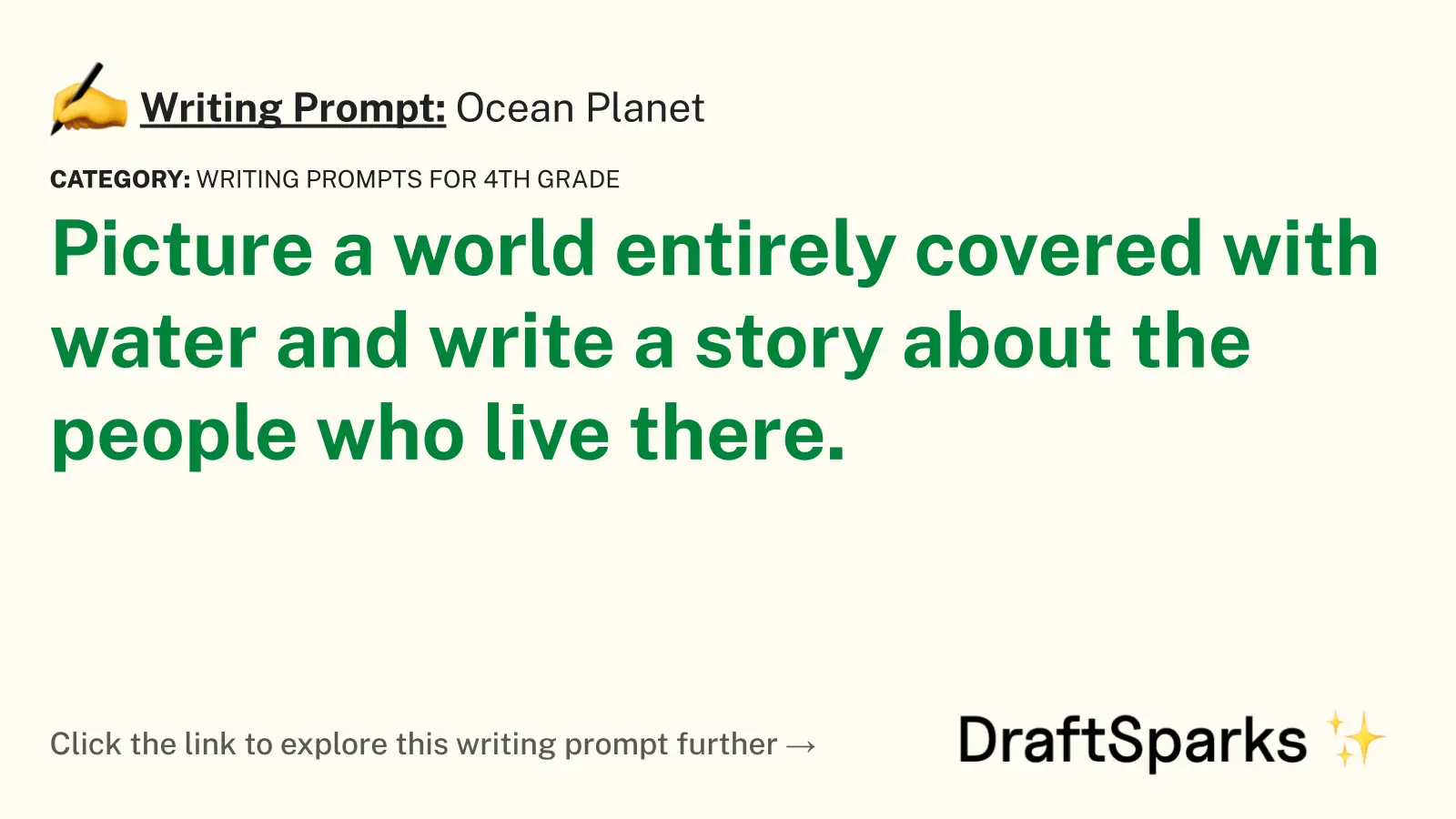
Ocean Planet
Picture a world entirely covered with water and write a story about the people who live there.
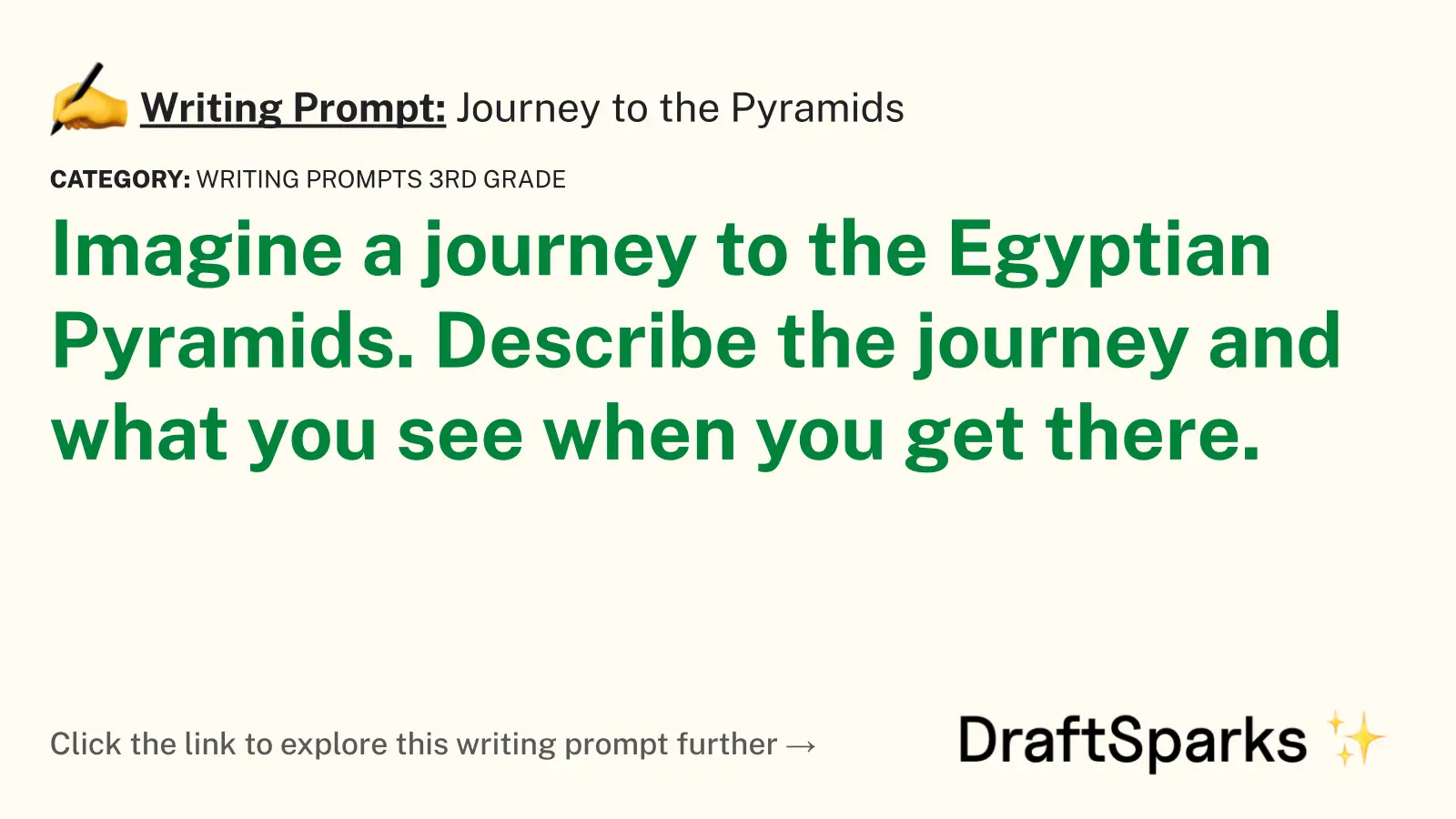
Journey to the Pyramids
Imagine a journey to the Egyptian Pyramids. Describe the journey and what you see when you get there.
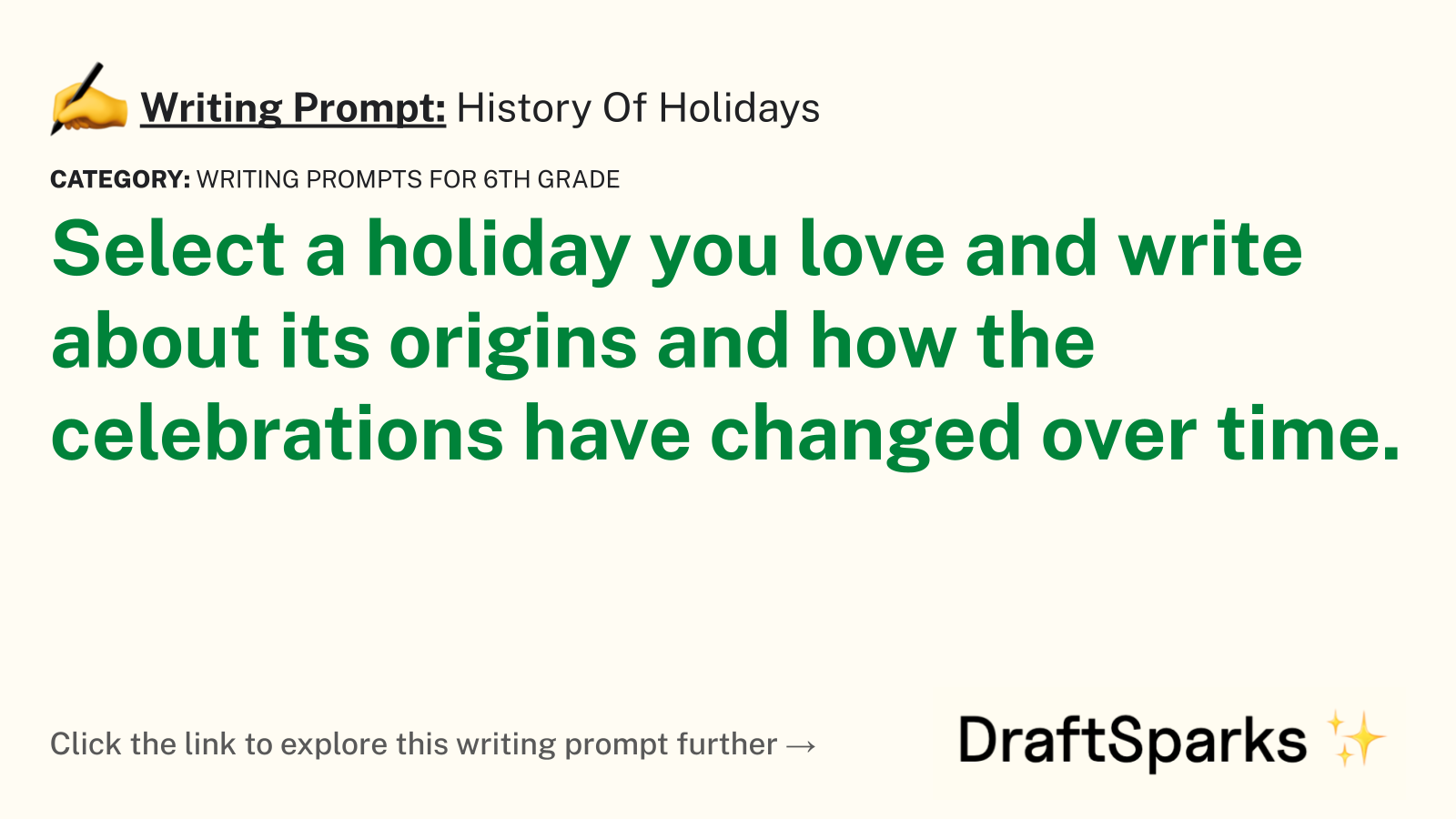
History Of Holidays
Select a holiday you love and write about its origins and how the celebrations have changed over time.
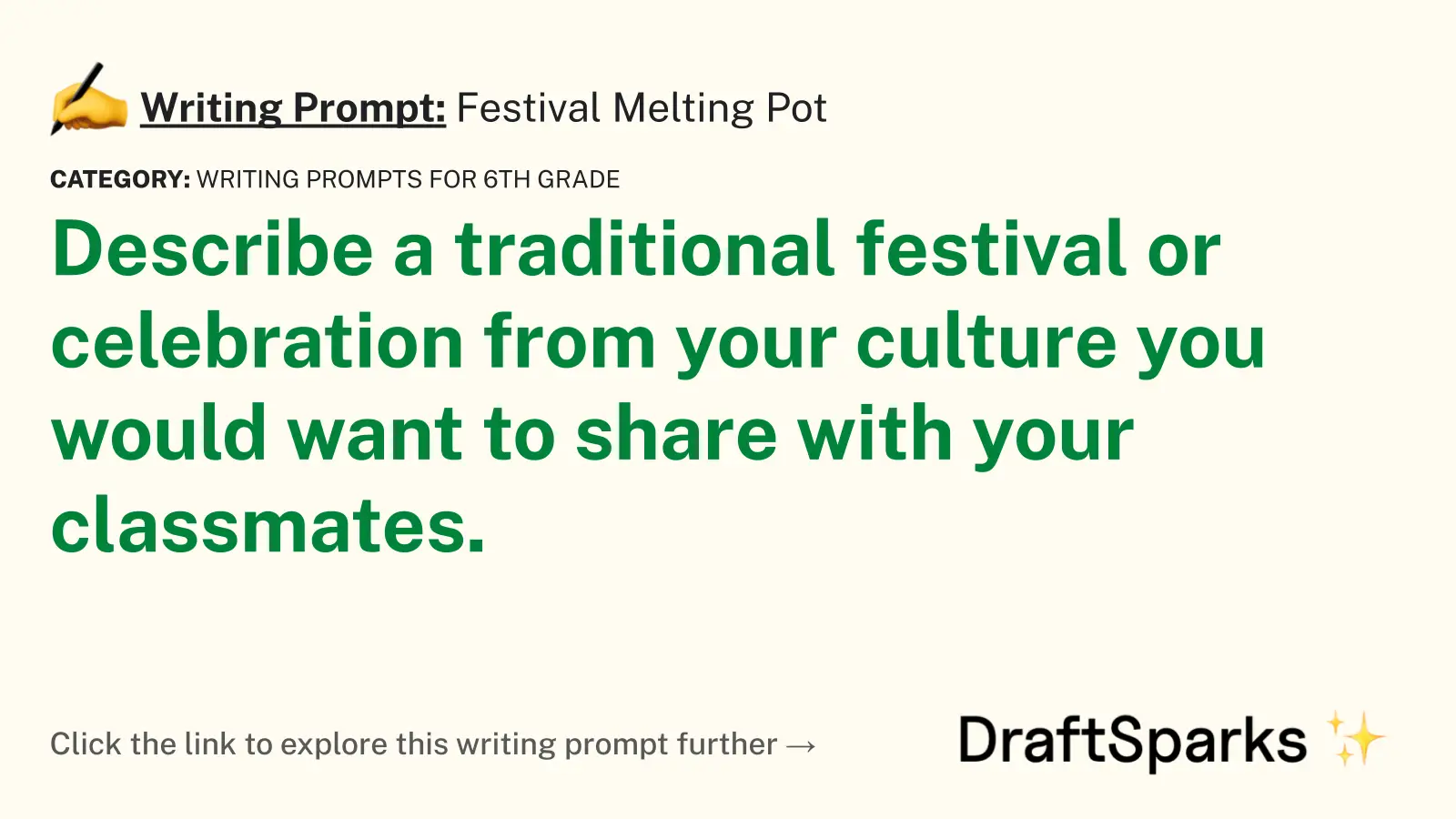
Festival Melting Pot
Describe a traditional festival or celebration from your culture you would want to share with your classmates.
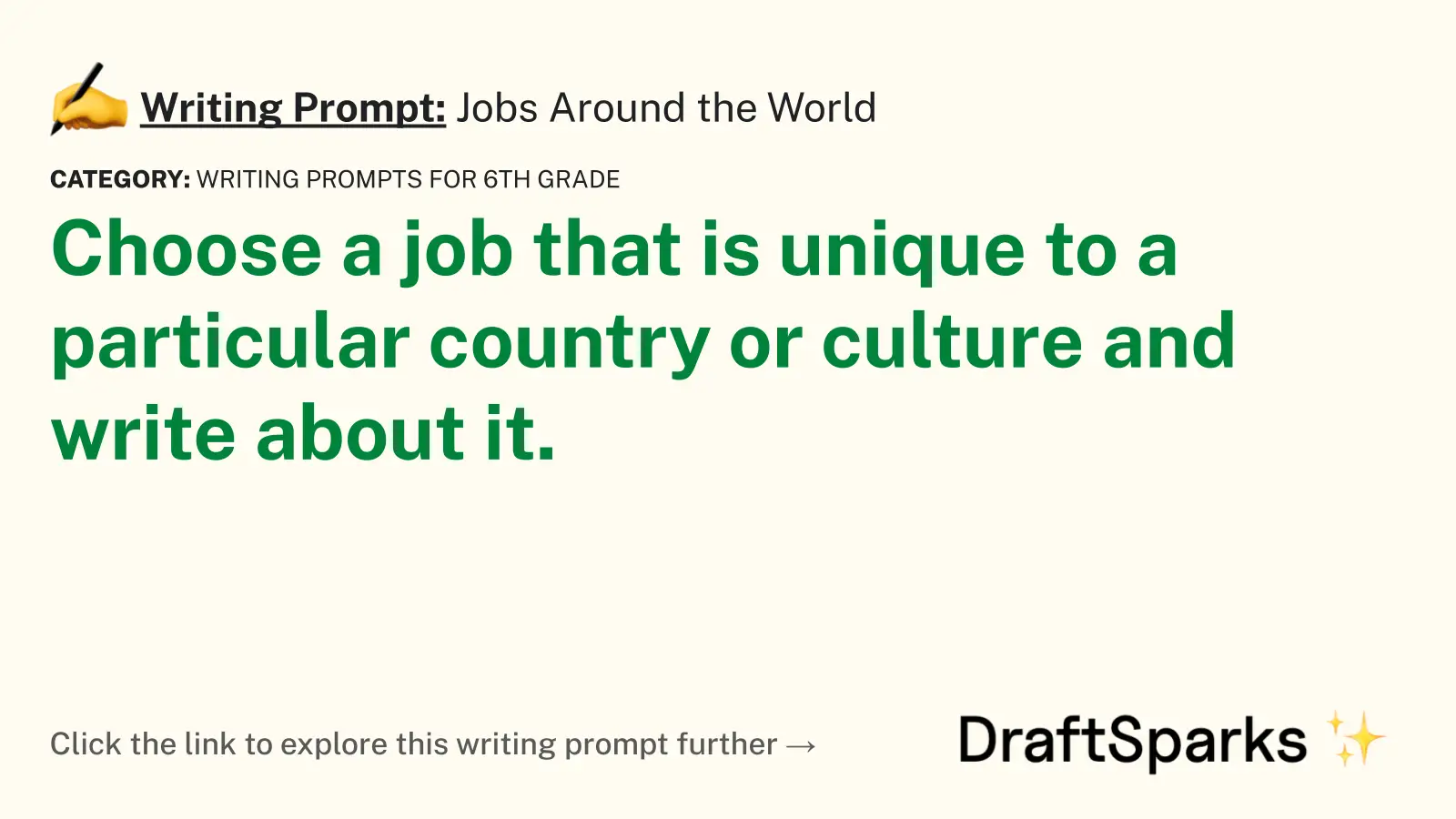
Jobs Around the World
Choose a job that is unique to a particular country or culture and write about it.
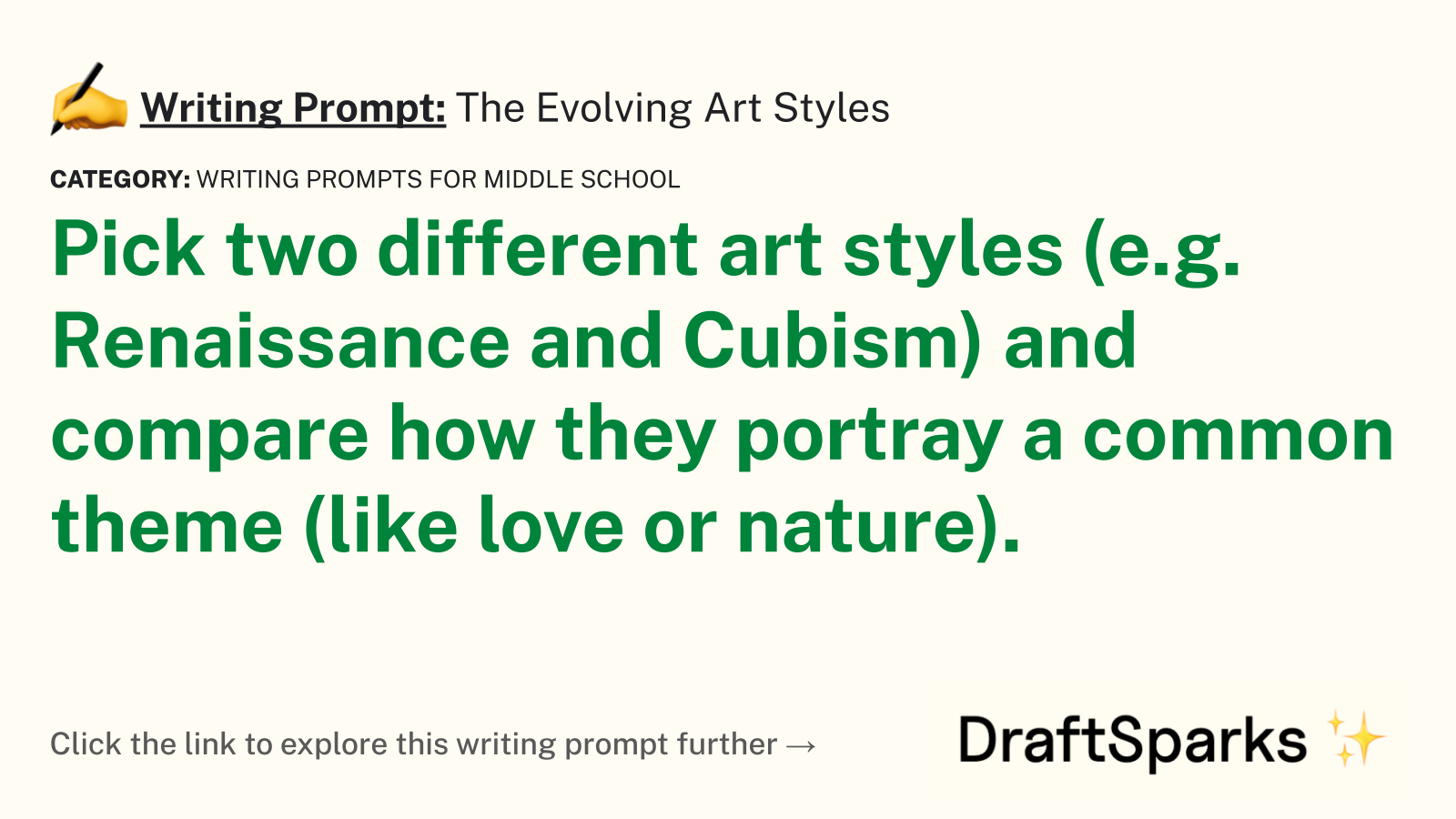
The Evolving Art Styles
Pick two different art styles (e.g. Renaissance and Cubism) and compare how they portray a common theme (like love or nature).
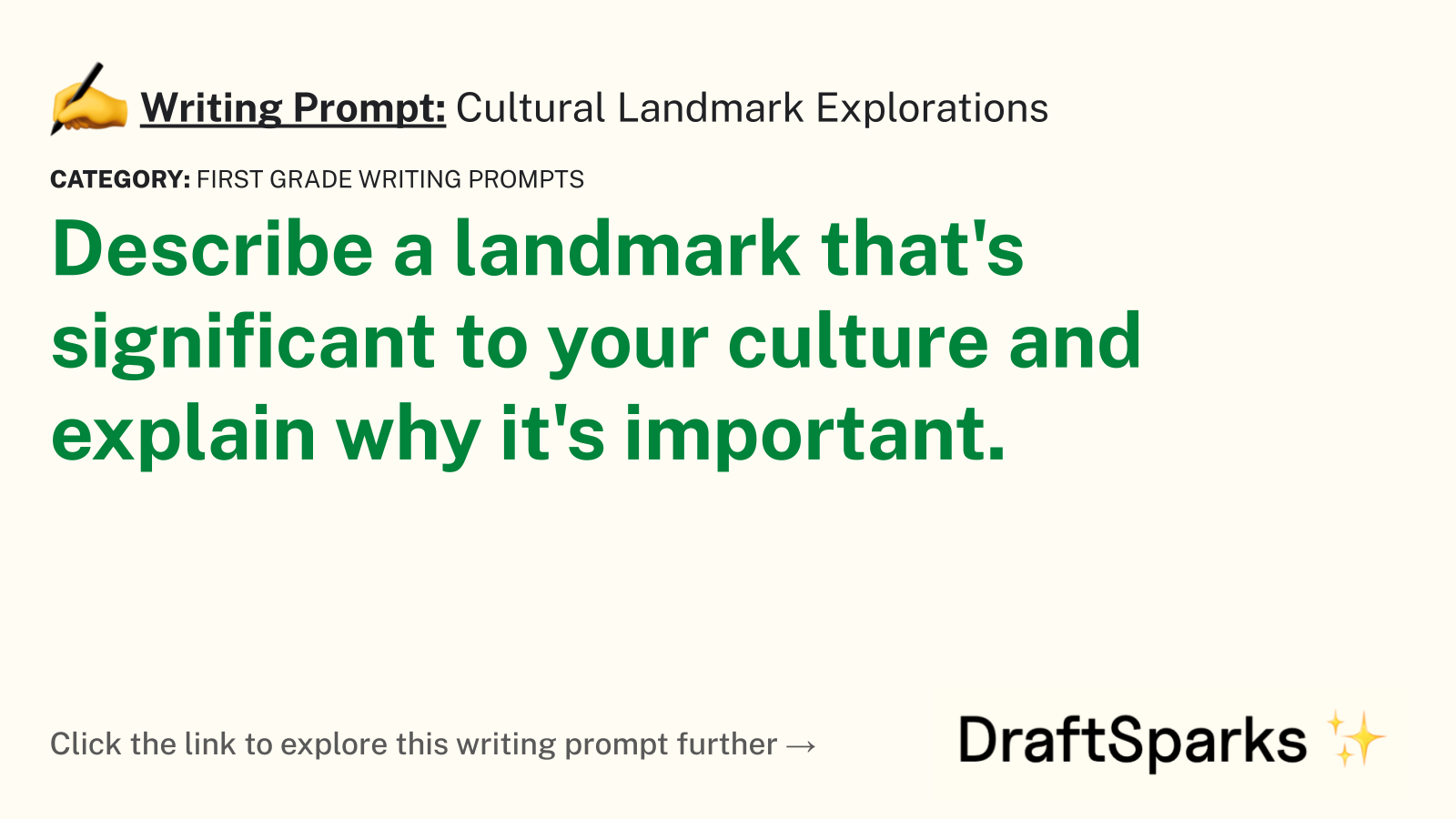
Cultural Landmark Explorations
Describe a landmark that’s significant to your culture and explain why it’s important.
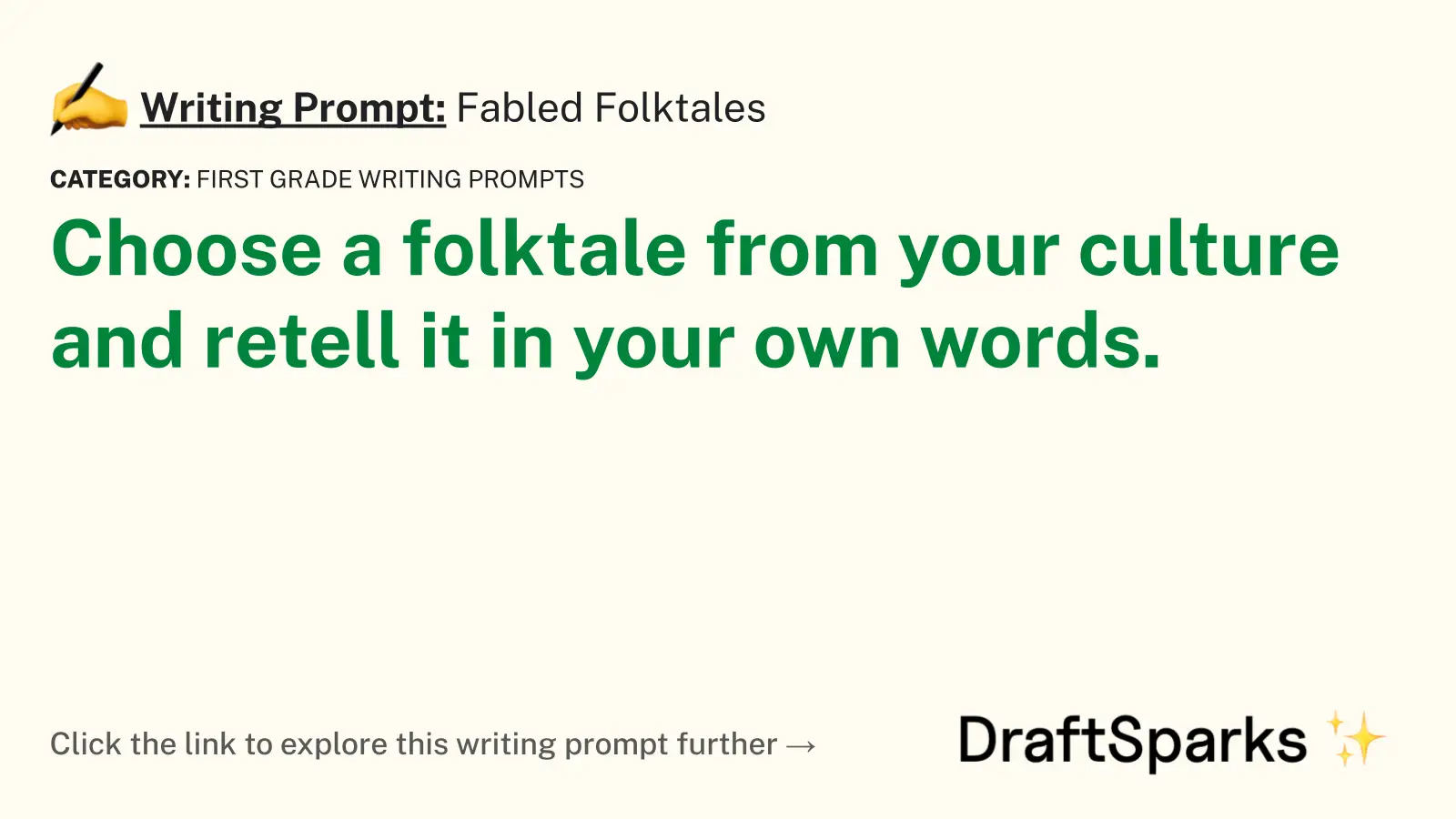
Fabled Folktales
Choose a folktale from your culture and retell it in your own words.

Cultural Clothing Chronicles
Write about a traditional outfit from your culture and describe when and how it’s worn.
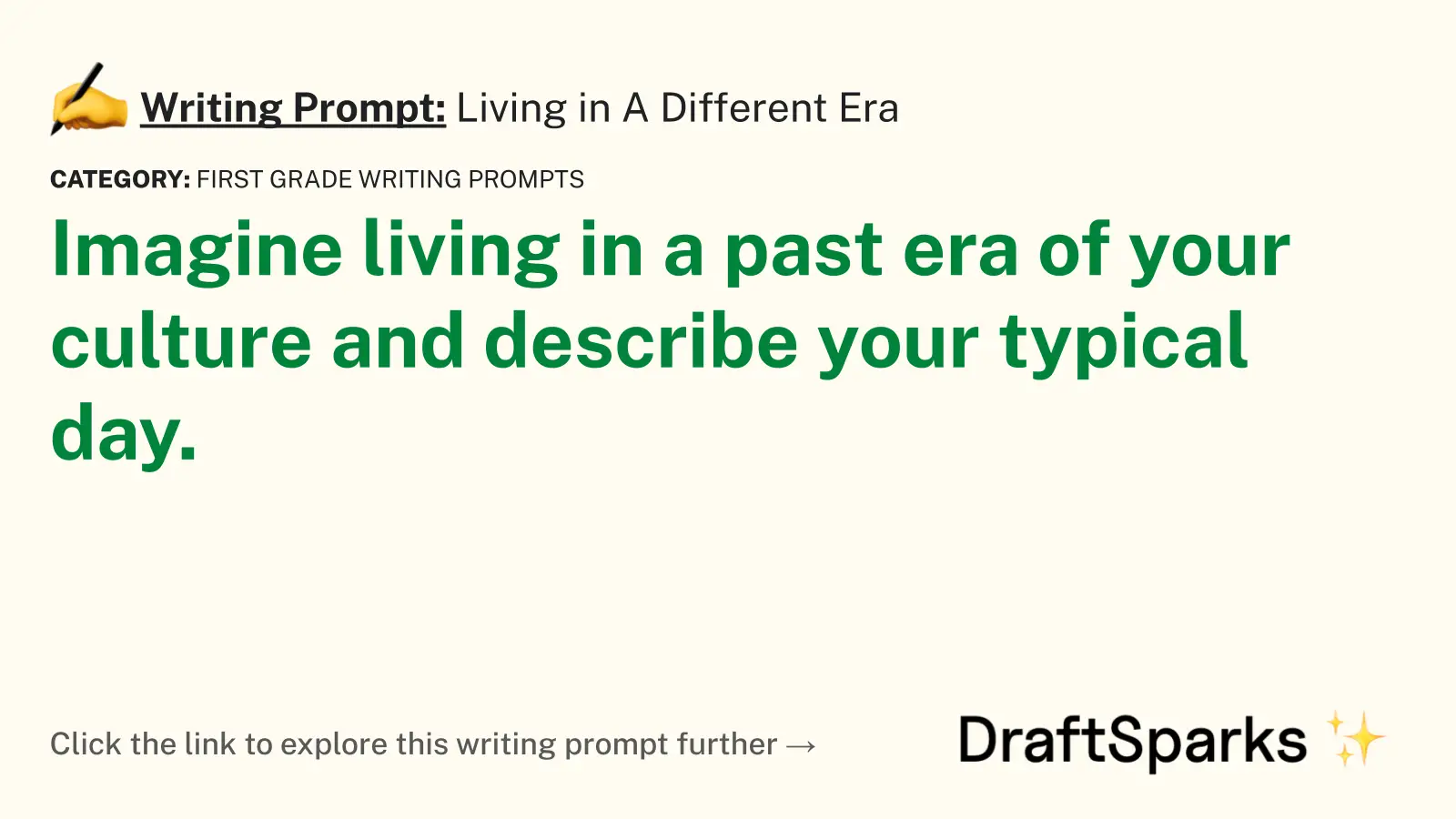
Living in A Different Era
Imagine living in a past era of your culture and describe your typical day.
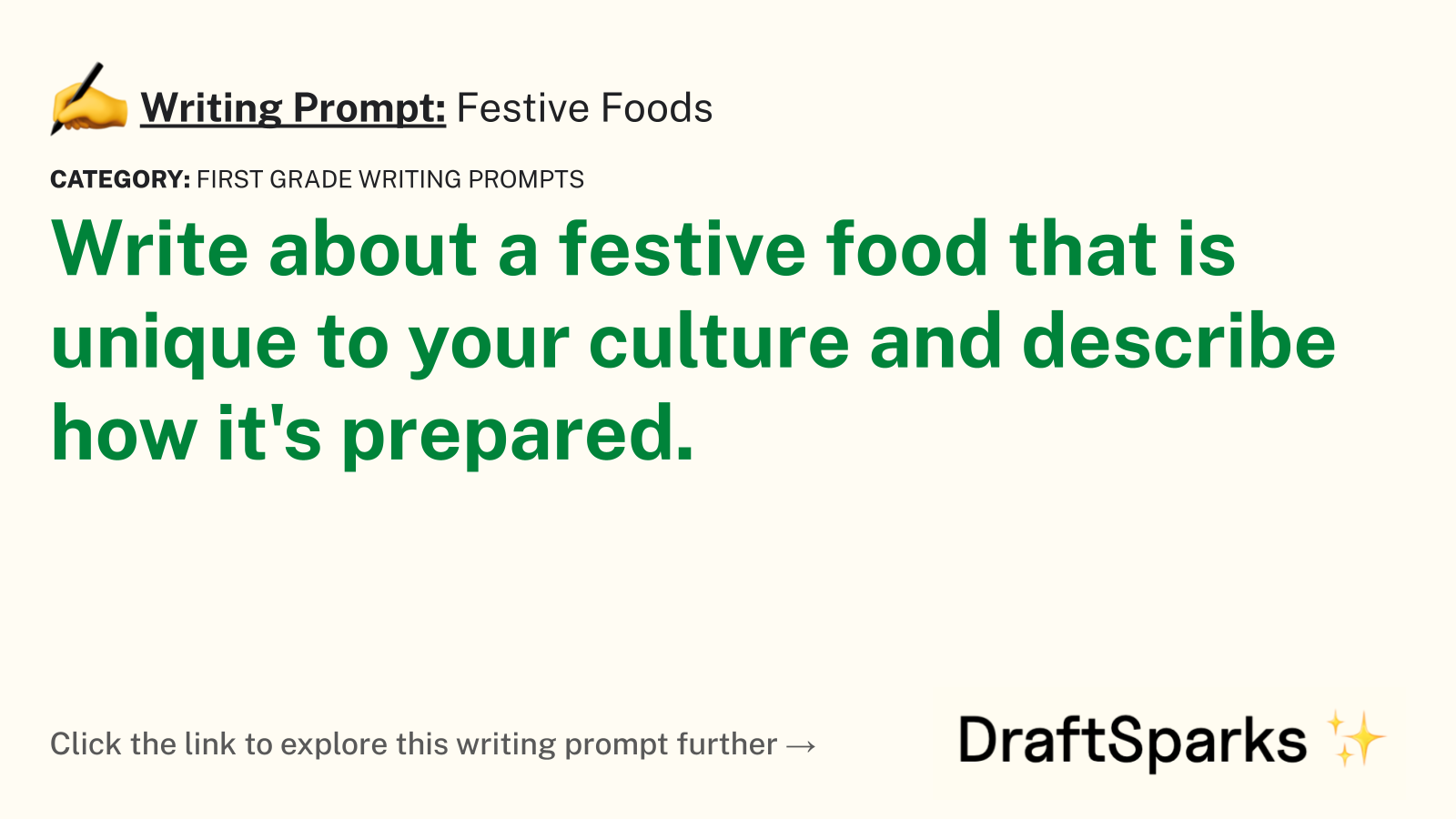
Festive Foods
Write about a festive food that is unique to your culture and describe how it’s prepared.
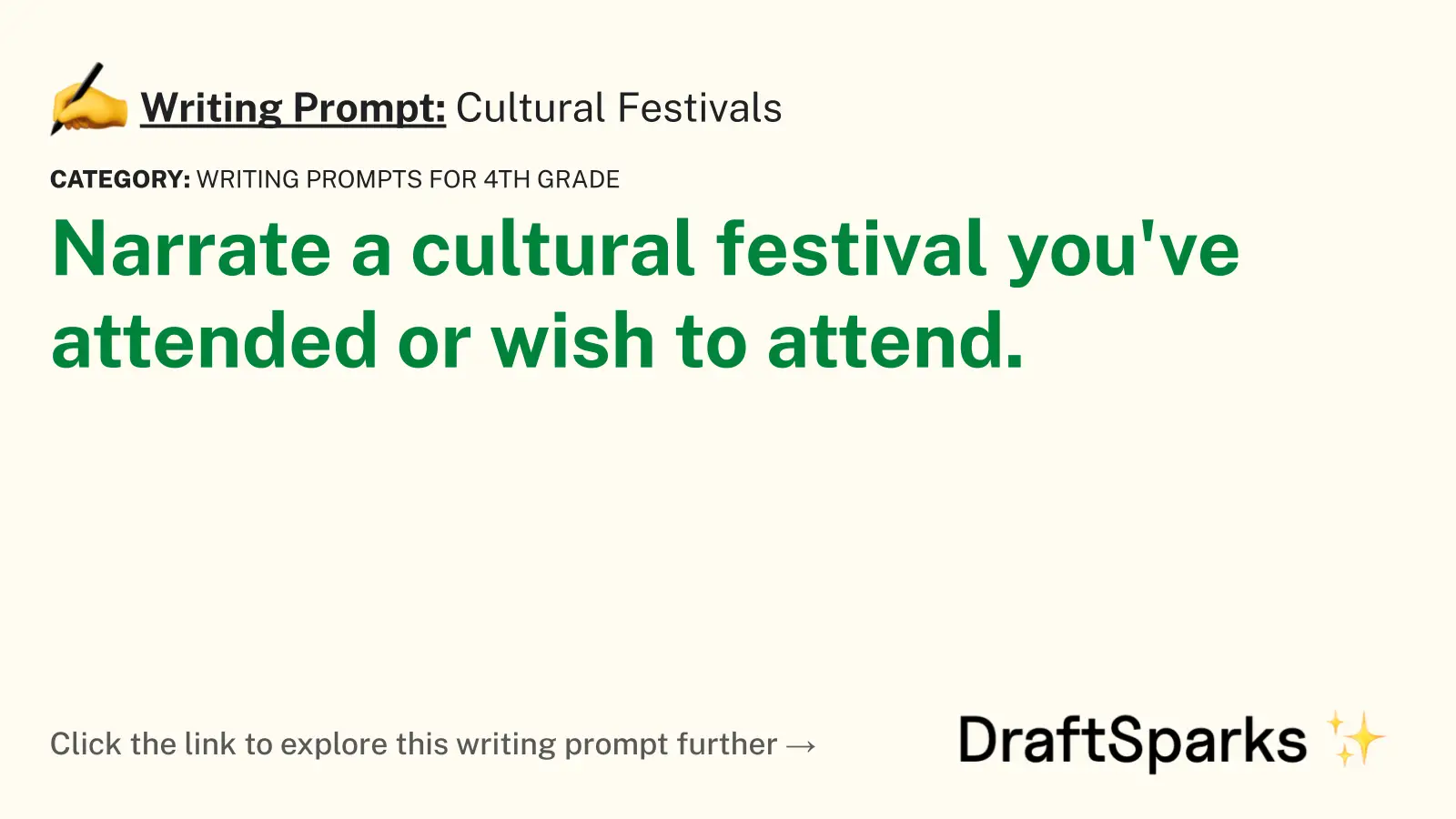
Cultural Festivals
Narrate a cultural festival you’ve attended or wish to attend.

Land of Mistle-Twist
Imagine a world where holiday rules and customs are completely opposite to the ones in our world. Write a story from the perspective of a character who travels from our world to this alternative holiday world.
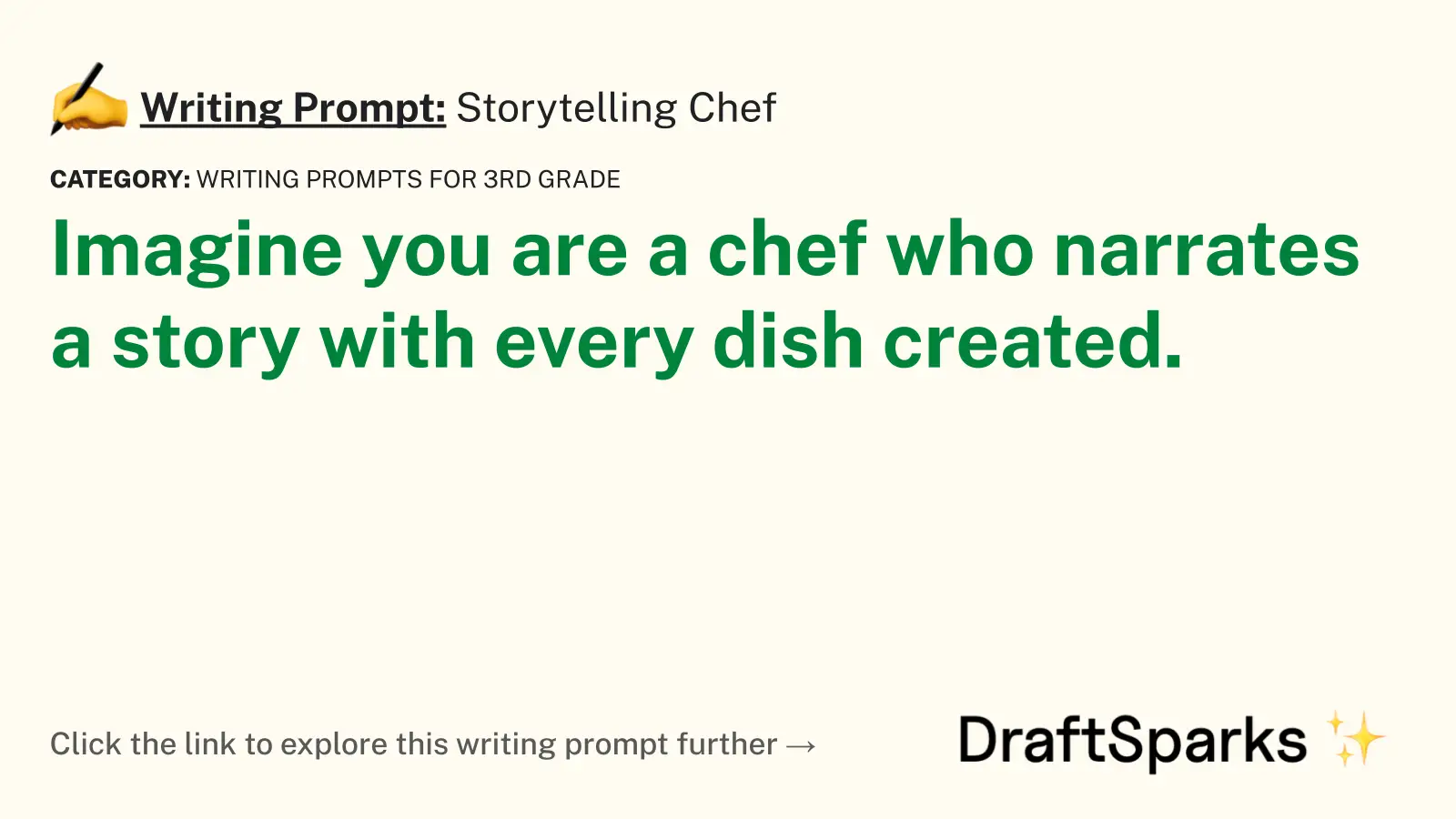
Storytelling Chef
Imagine you are a chef who narrates a story with every dish created.
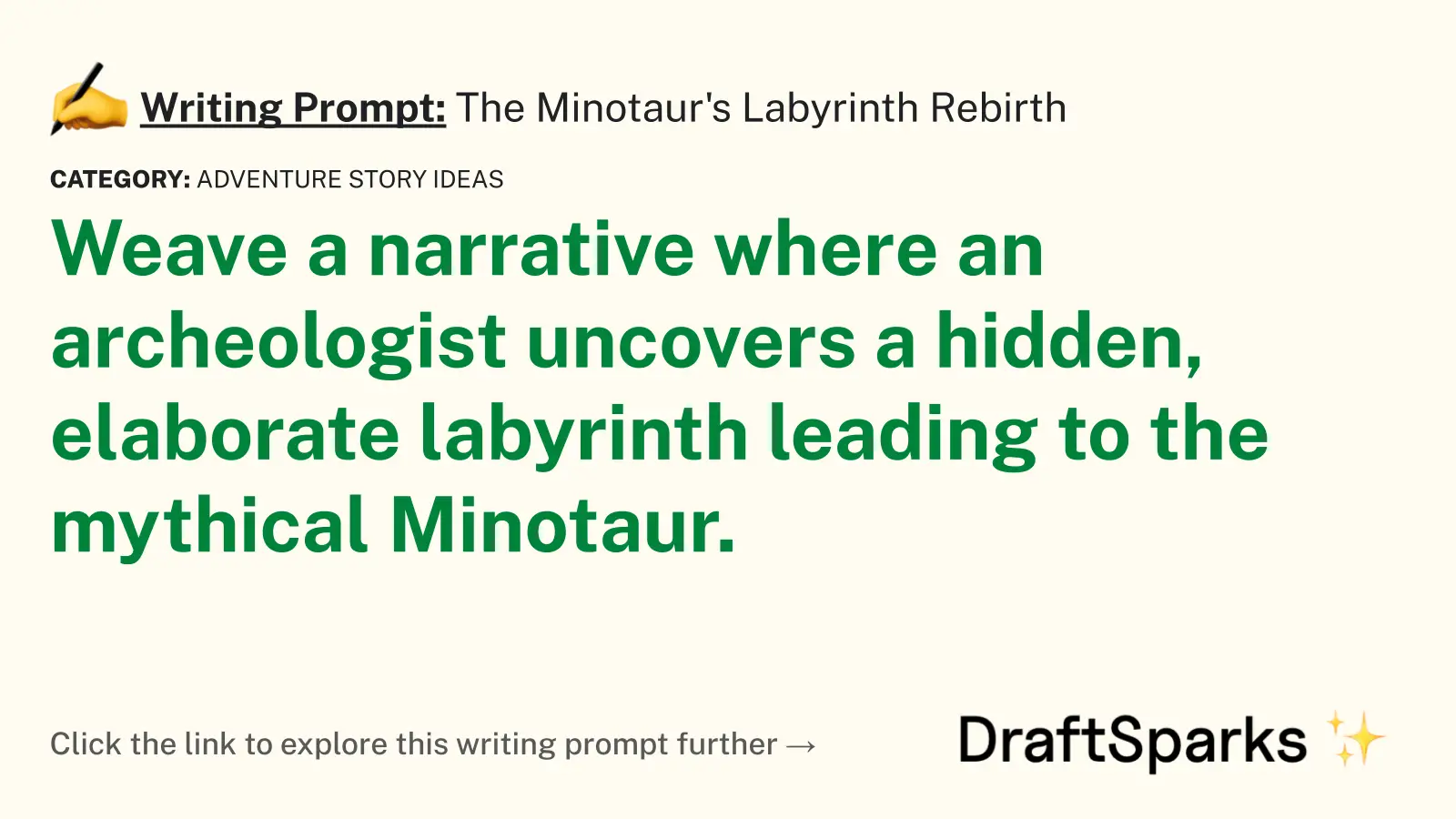
The Minotaur’s Labyrinth Rebirth
Weave a narrative where an archeologist uncovers a hidden, elaborate labyrinth leading to the mythical Minotaur.
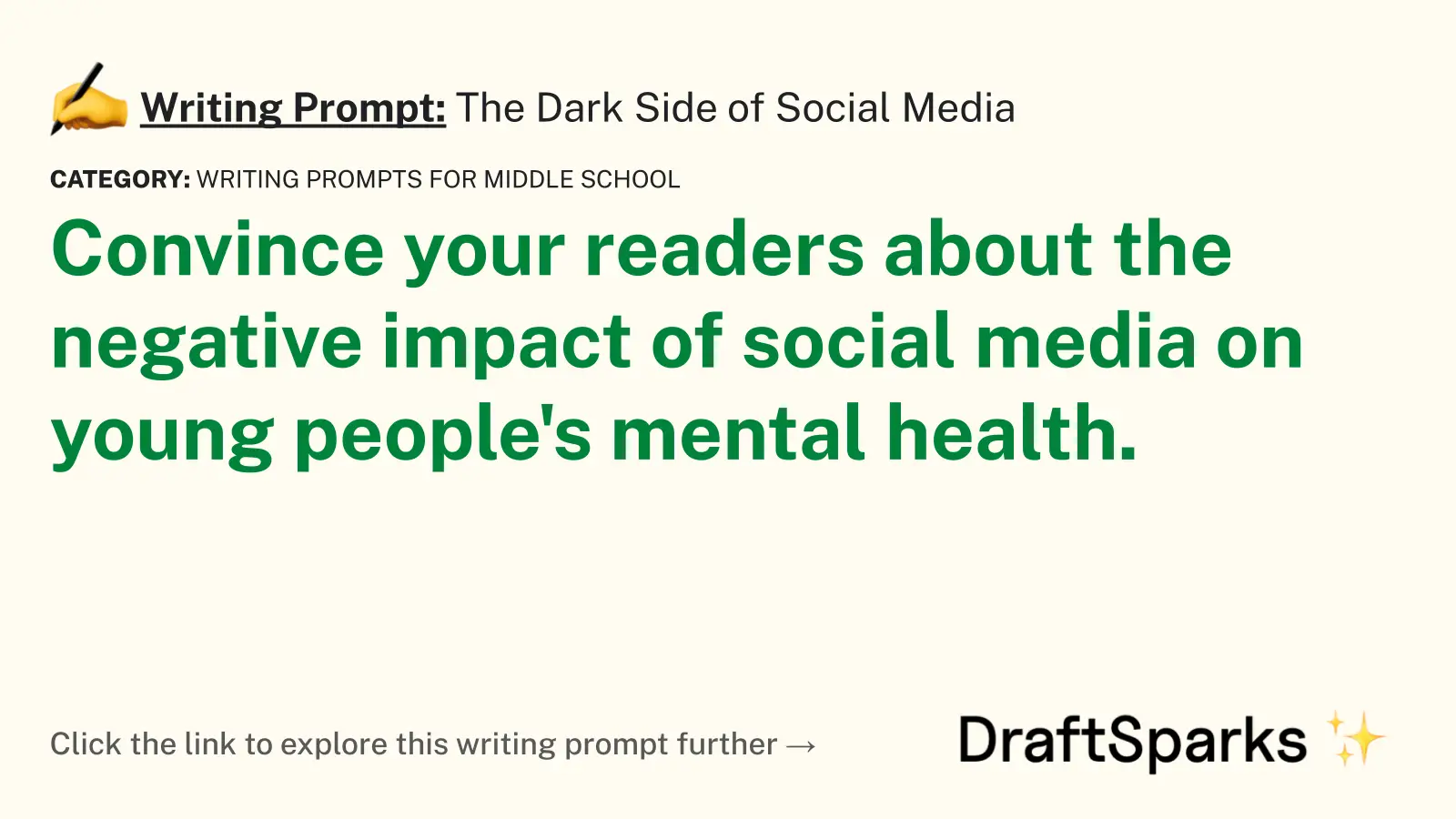
The Dark Side of Social Media
Convince your readers about the negative impact of social media on young people’s mental health.
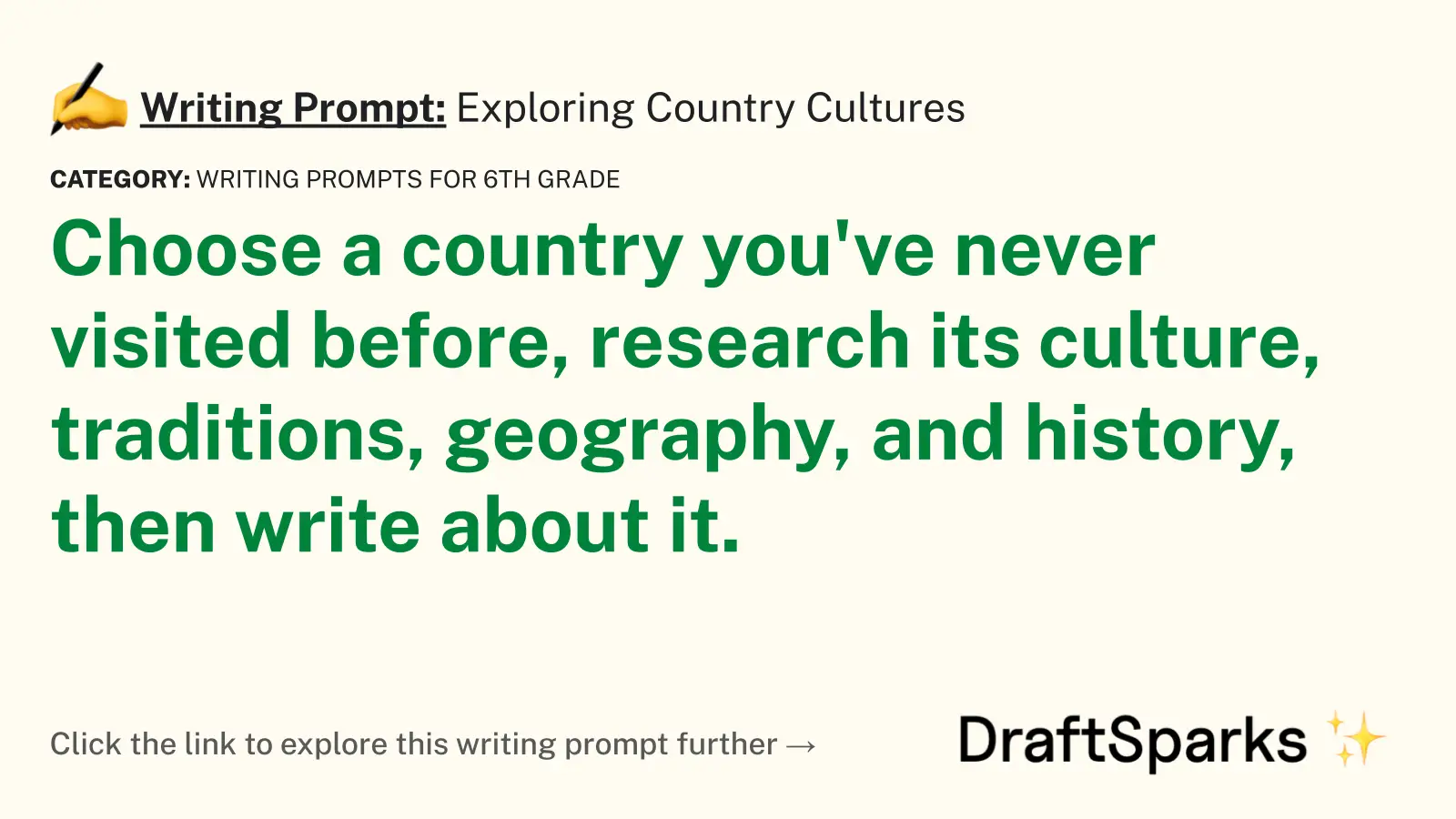
Exploring Country Cultures
Choose a country you’ve never visited before, research its culture, traditions, geography, and history, then write about it.
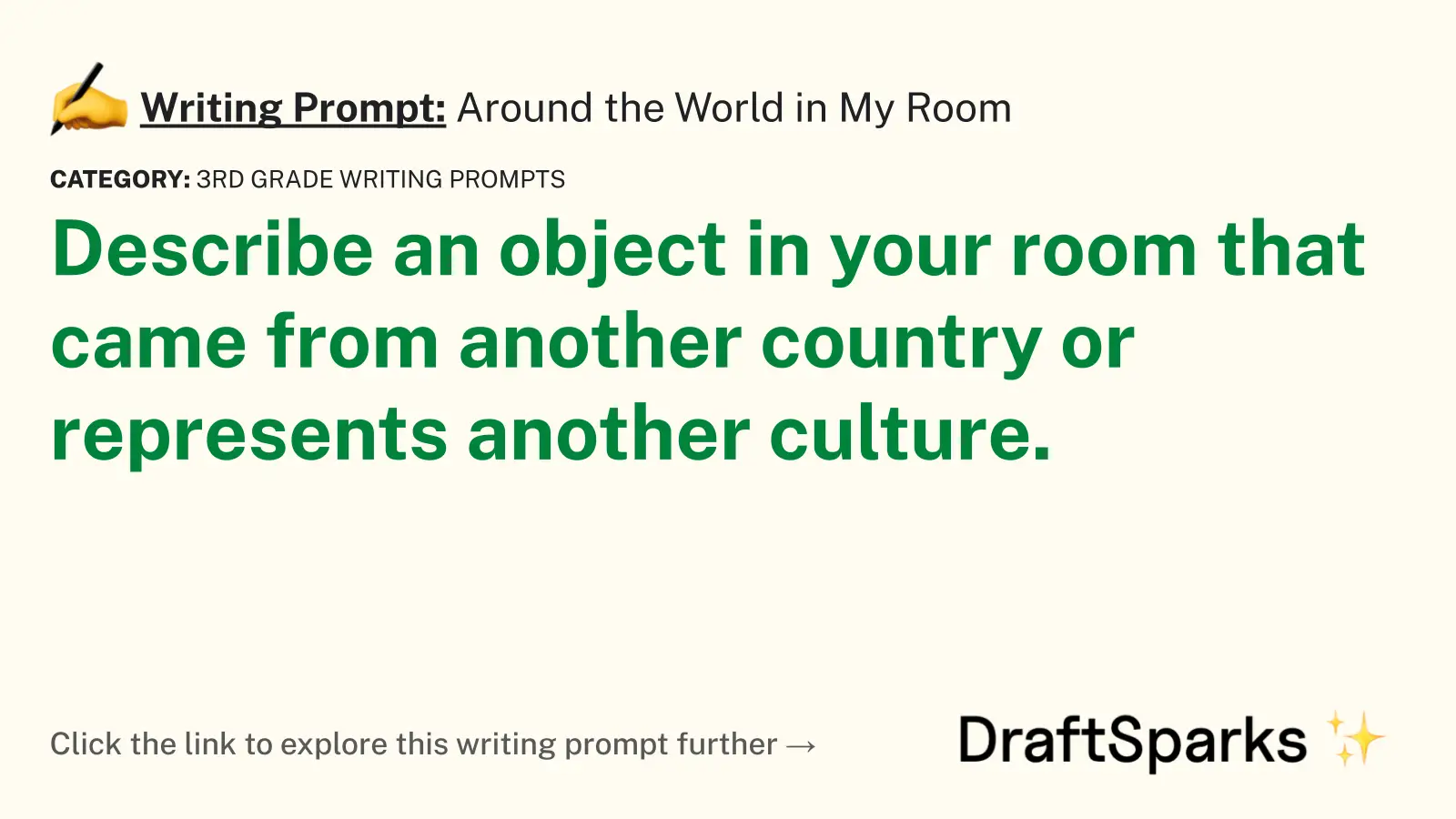
Around the World in My Room
Describe an object in your room that came from another country or represents another culture.
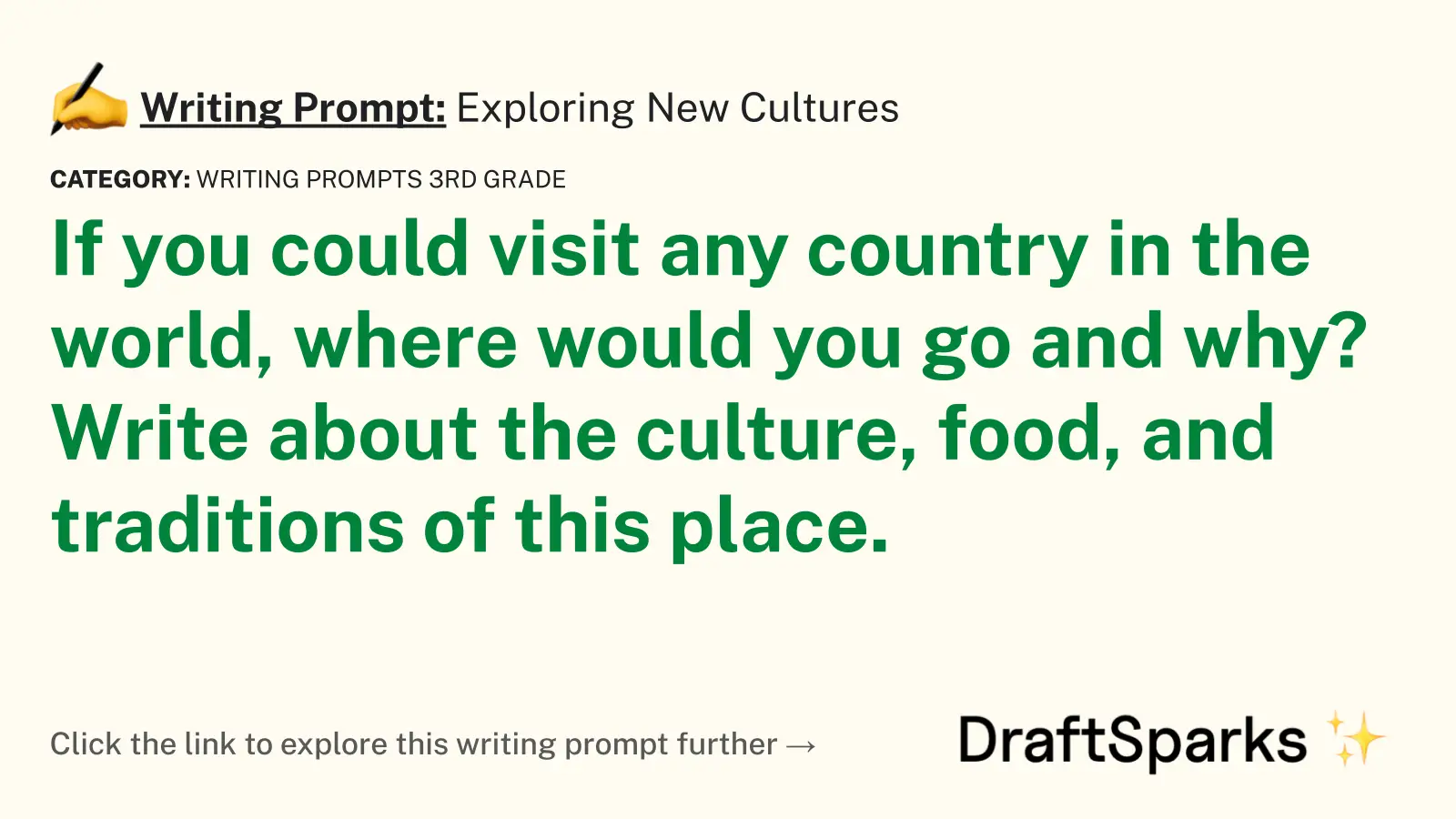
Exploring New Cultures
If you could visit any country in the world, where would you go and why? Write about the culture, food, and traditions of this place.

Holiday Traditions
Write about your favorite family tradition during a specific holiday.
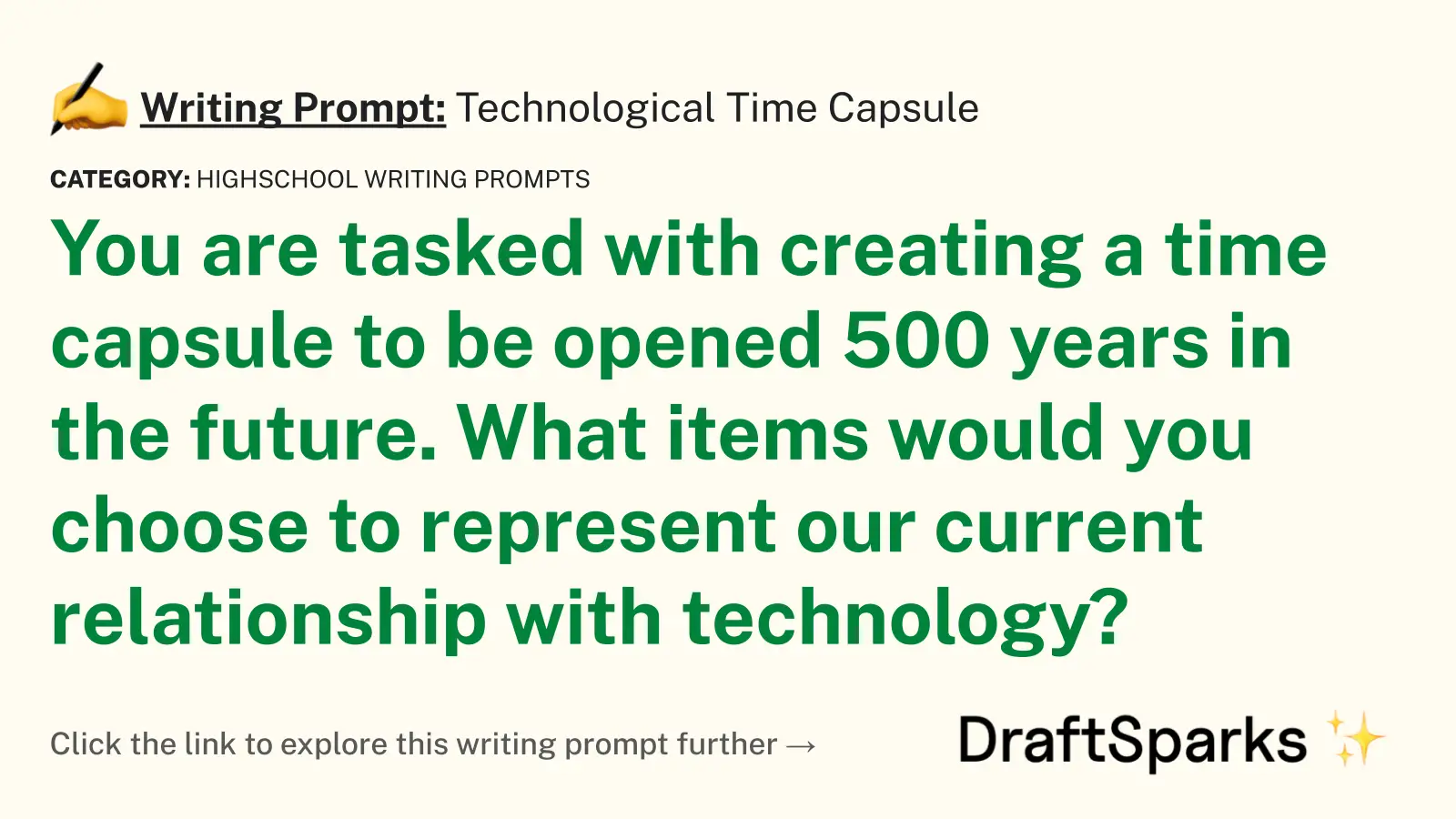
Technological Time Capsule
You are tasked with creating a time capsule to be opened 500 years in the future. What items would you choose to represent our current relationship with technology?
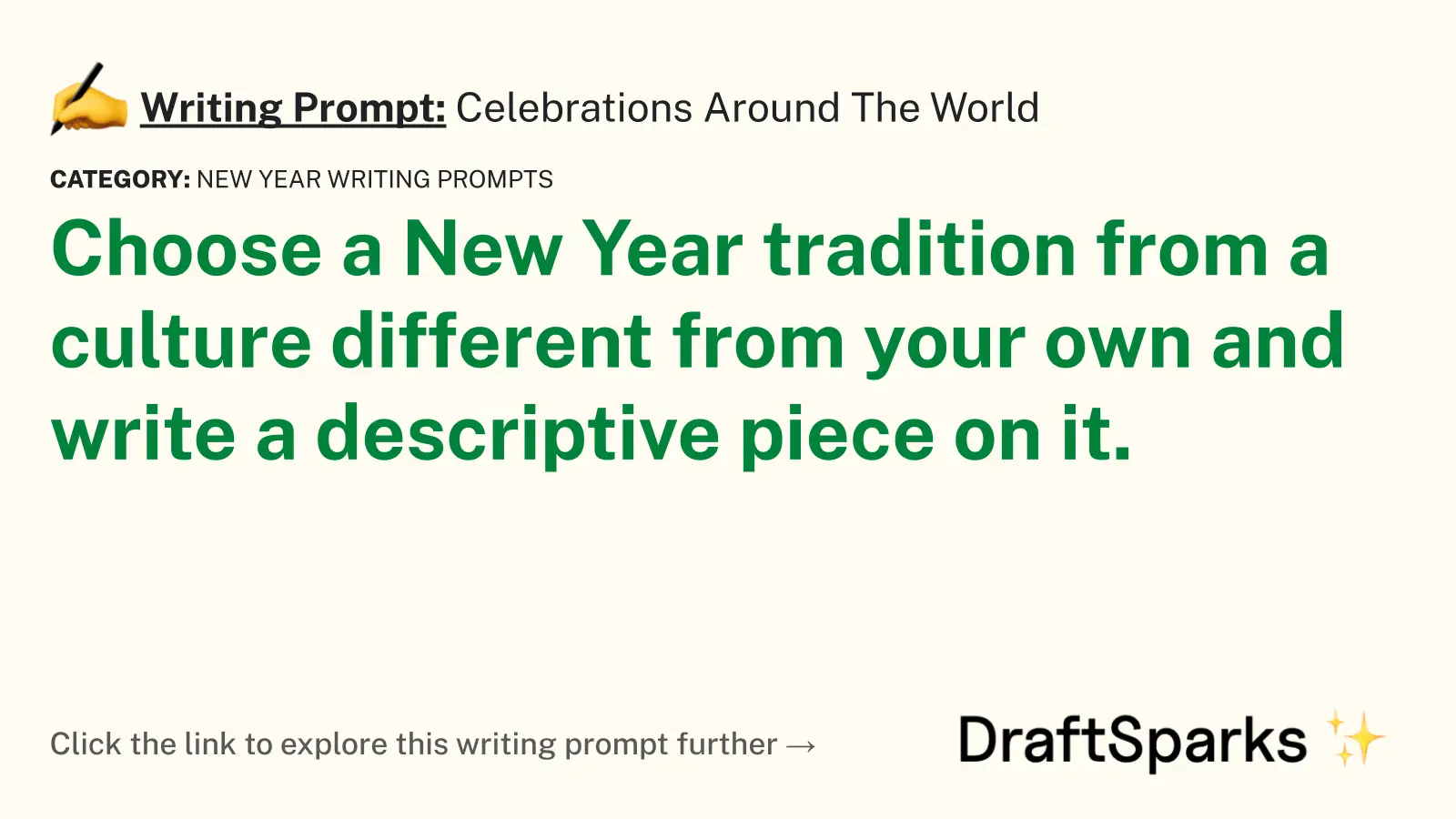
Celebrations Around The World
Choose a New Year tradition from a culture different from your own and write a descriptive piece on it.

Festive Food Traditions
Write about a specific food or culinary tradition associated with New Year celebrations in your culture/family.
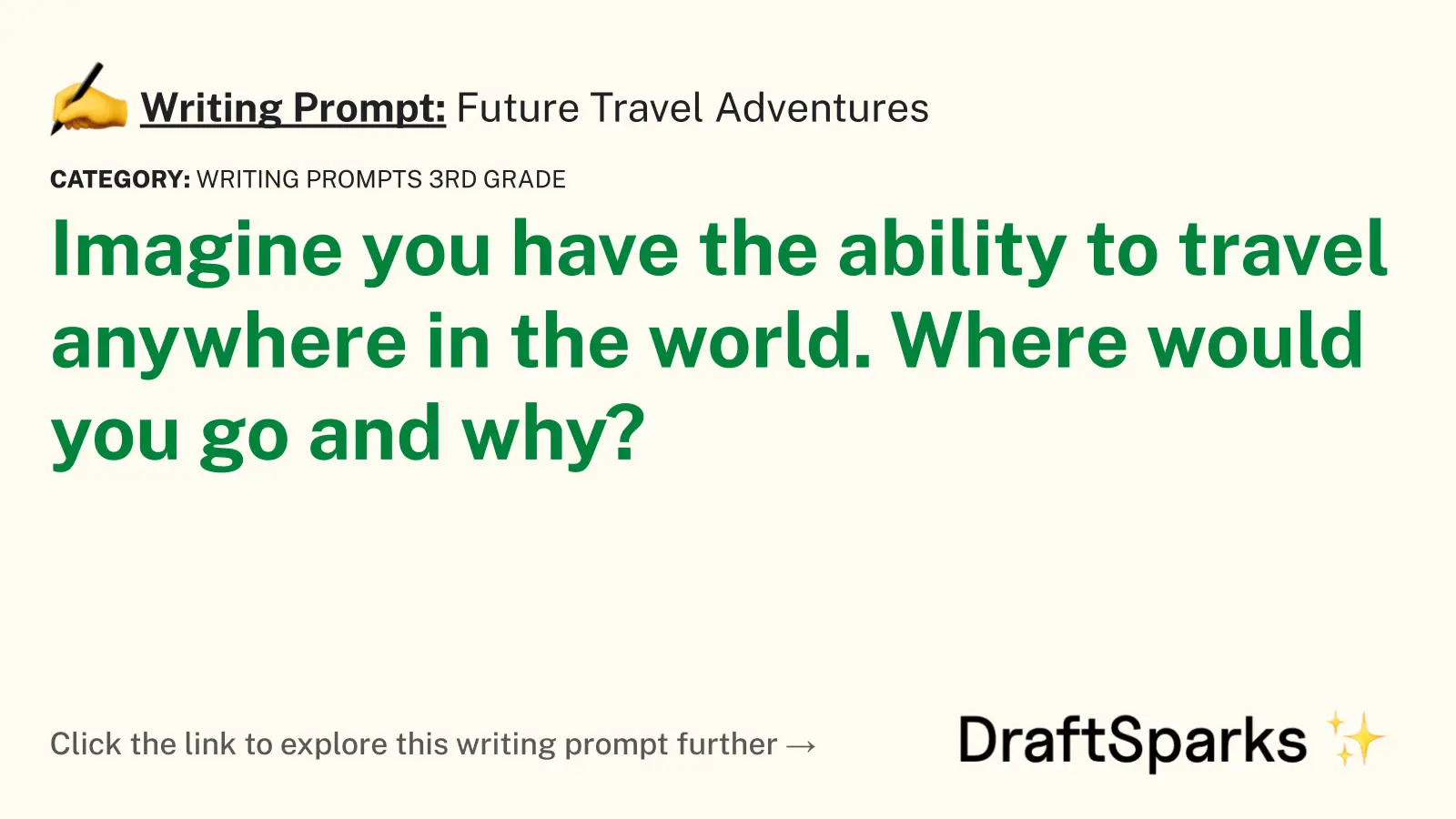
Future Travel Adventures
Imagine you have the ability to travel anywhere in the world. Where would you go and why?

Celebrating Family Traditions
Write about a specific family tradition in your household and why it’s important to you.

The Ripple Effect of Kindness
Imagine you have decided to start a new tradition at your workplace where each employee picks another coworker to thank personally on Employee Appreciation Day. Describe the effects of this tradition over time.
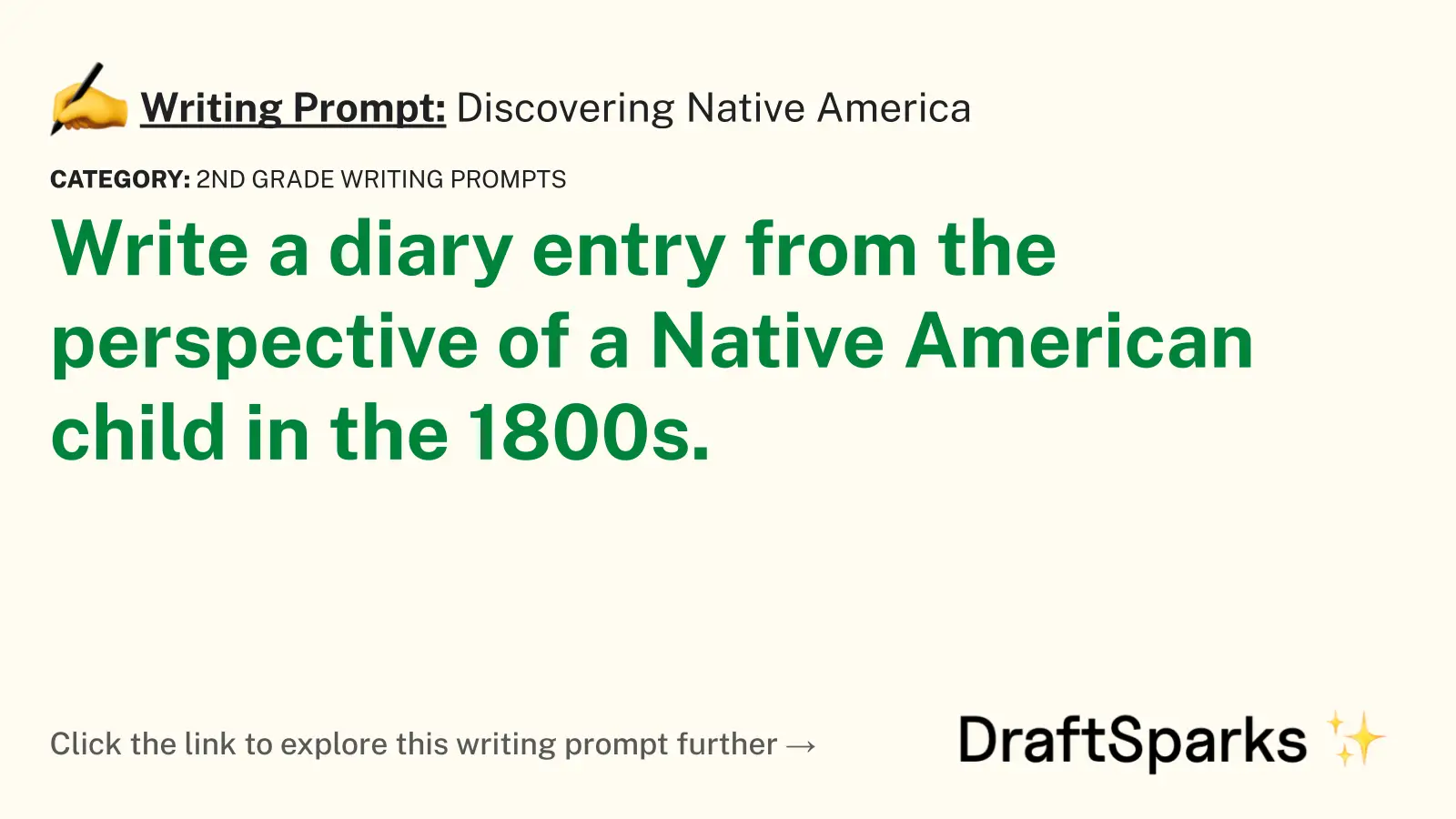
Discovering Native America
Write a diary entry from the perspective of a Native American child in the 1800s.

Tasting the Emerald Isle
Describe the traditional Irish food that you tasted on St. Patrick’s Day.
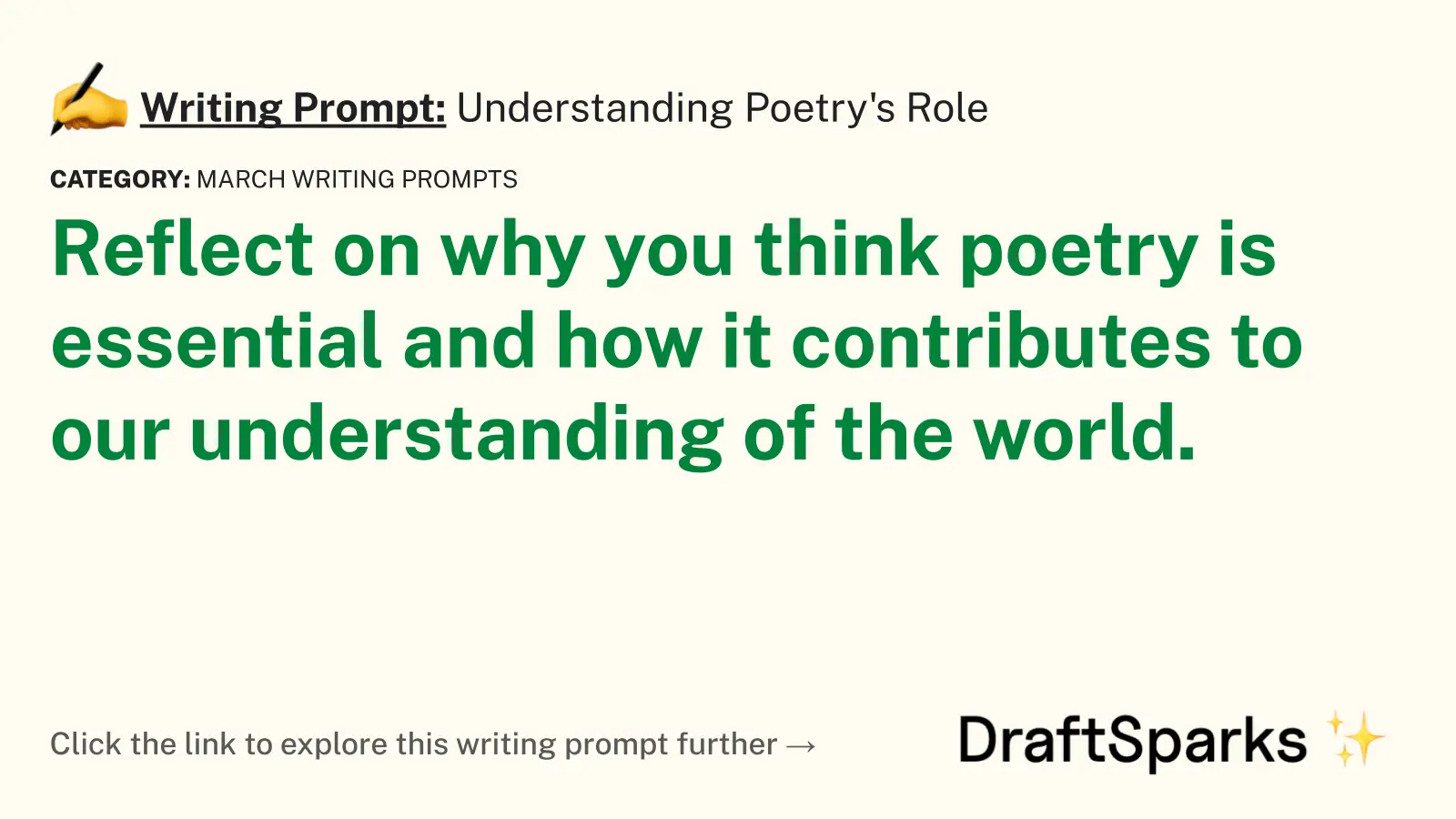
Understanding Poetry’s Role
Reflect on why you think poetry is essential and how it contributes to our understanding of the world.
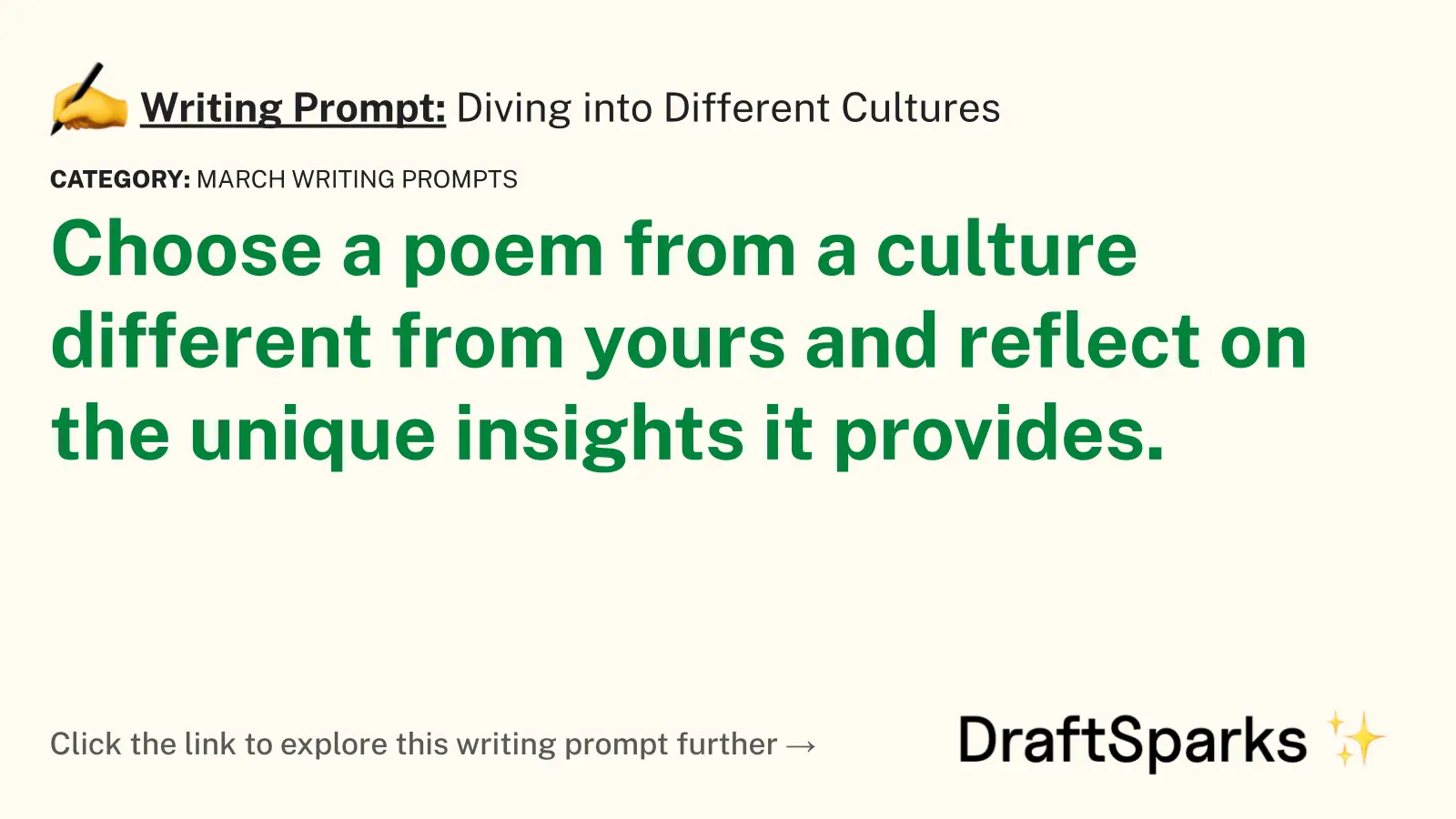
Diving into Different Cultures
Choose a poem from a culture different from yours and reflect on the unique insights it provides.
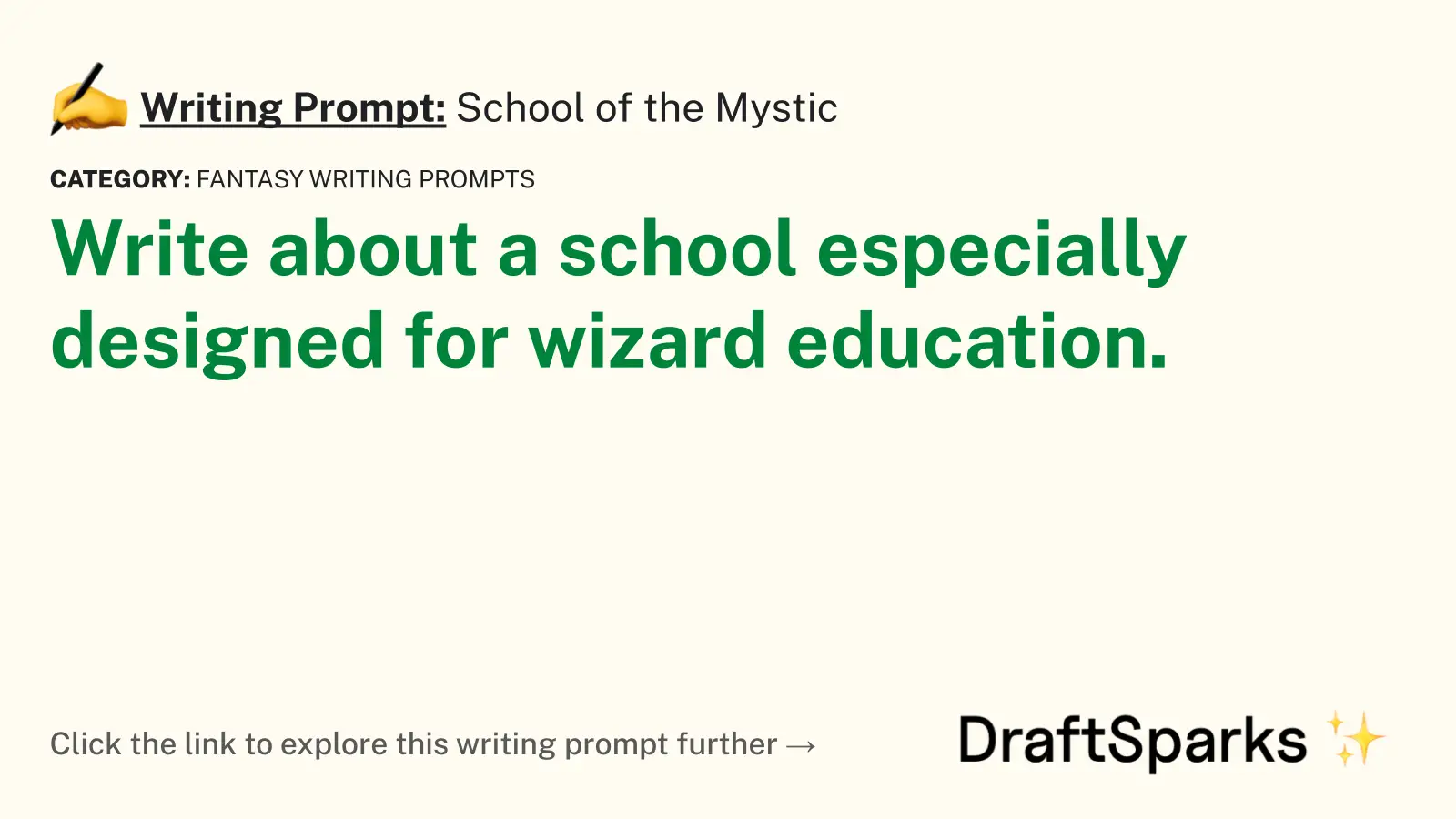
School of the Mystic
Write about a school especially designed for wizard education.
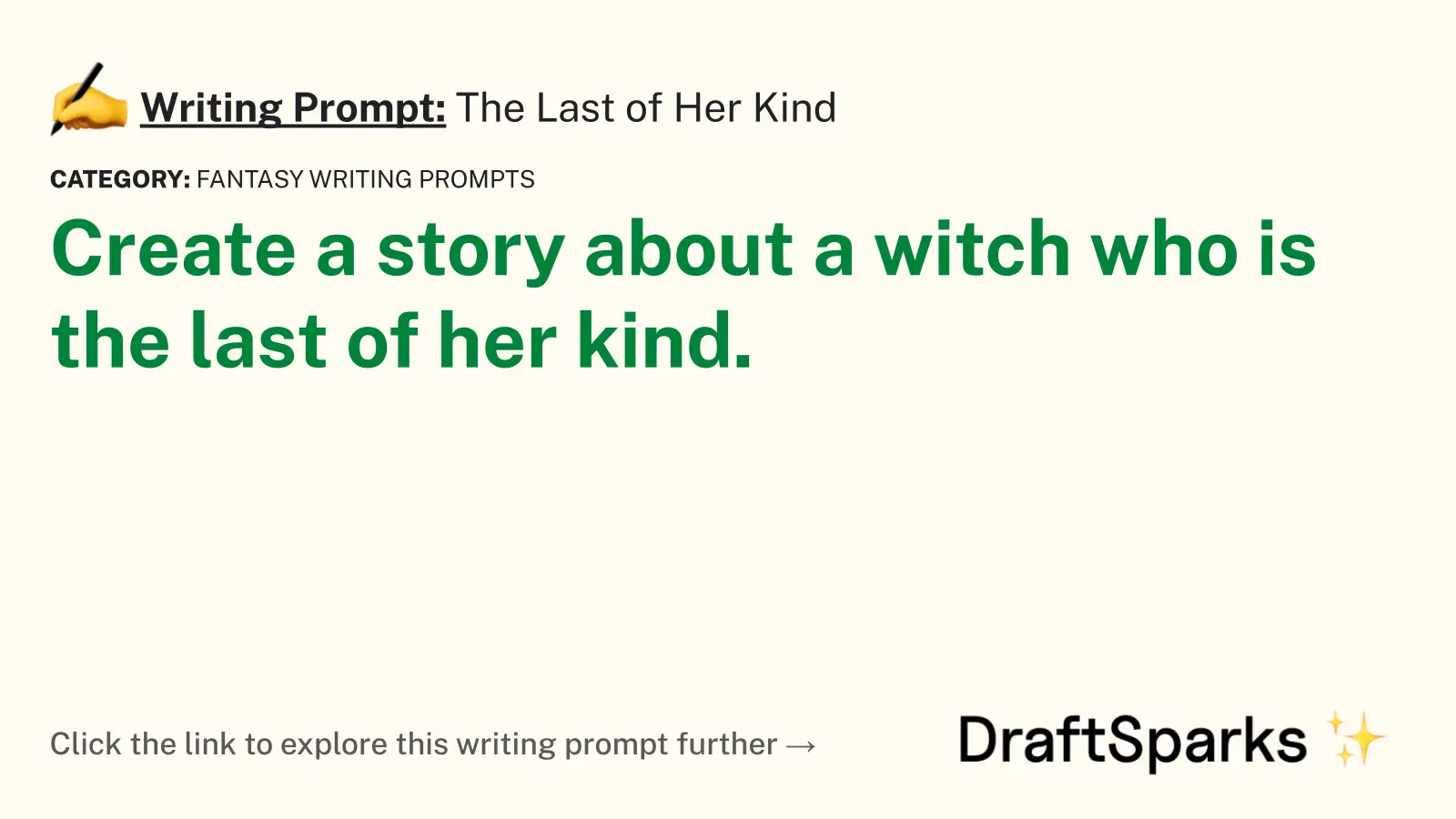
The Last of Her Kind
Create a story about a witch who is the last of her kind.

Commercial Cupid
Critique the commercialization of Valentine’s Day in modern times.
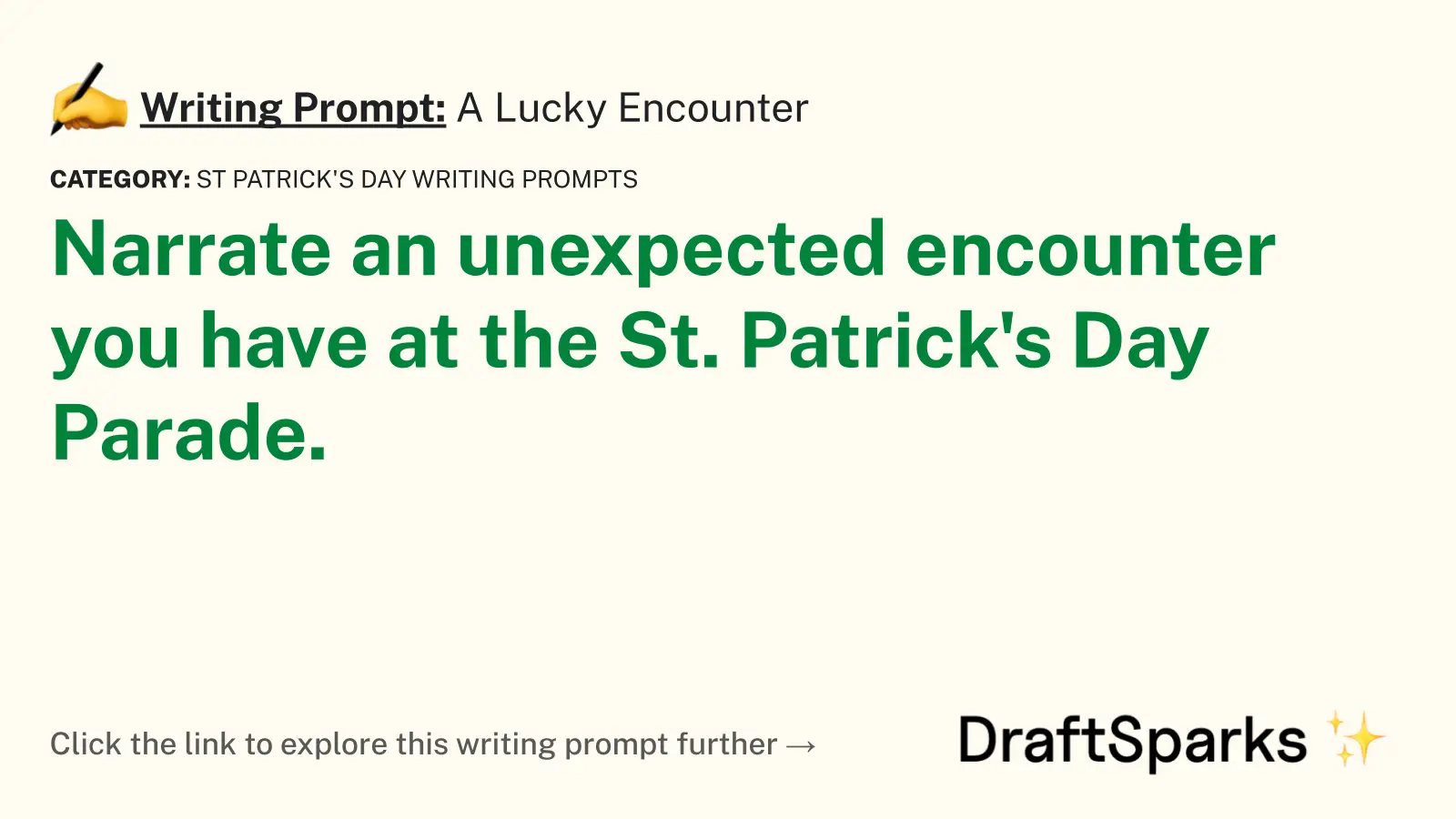
A Lucky Encounter
Narrate an unexpected encounter you have at the St. Patrick’s Day Parade.

Forgotten Beings
Detail a story featuring creatures long lost in history, now surfacing to spread terror.
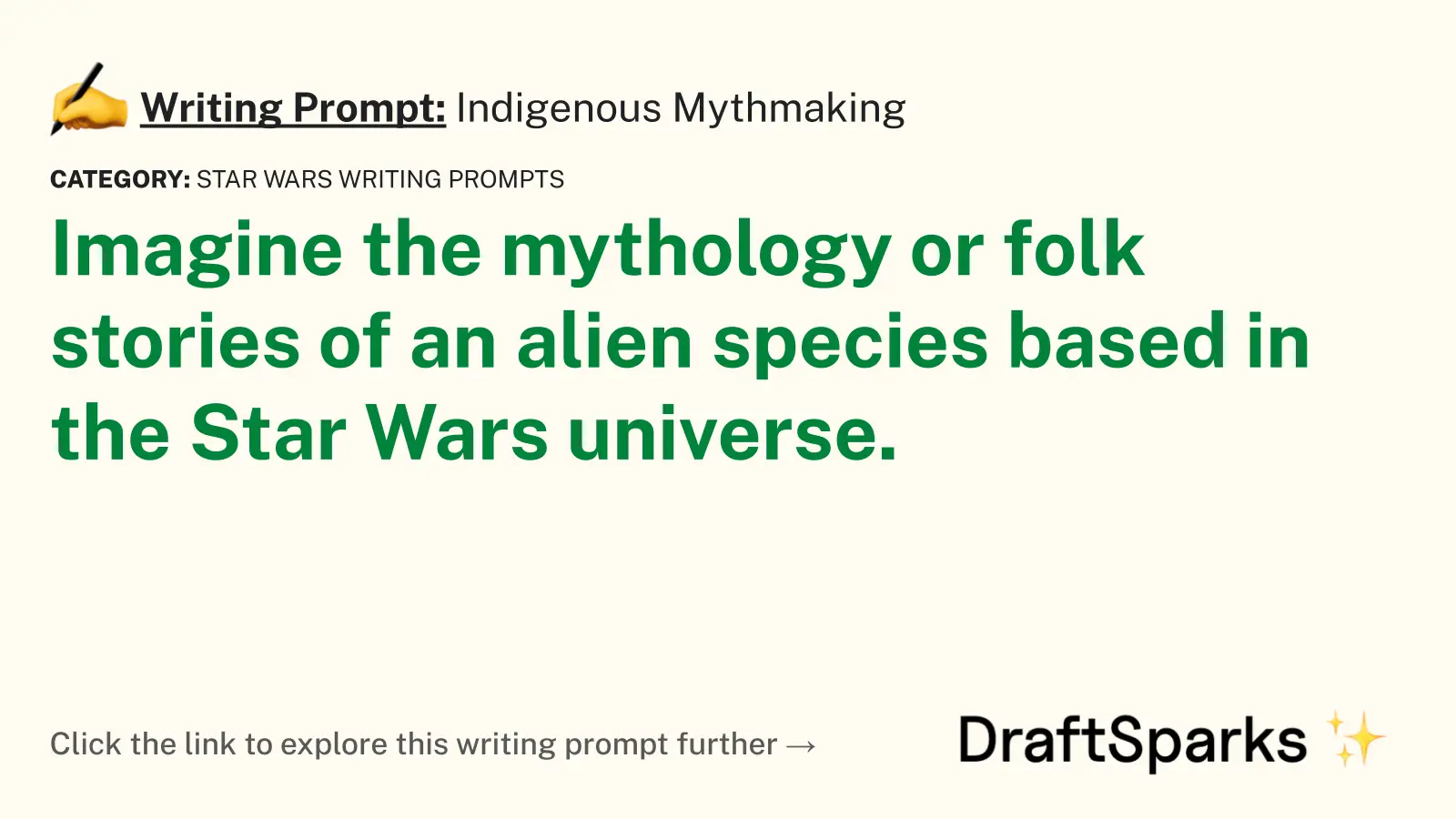
Indigenous Mythmaking
Imagine the mythology or folk stories of an alien species based in the Star Wars universe.
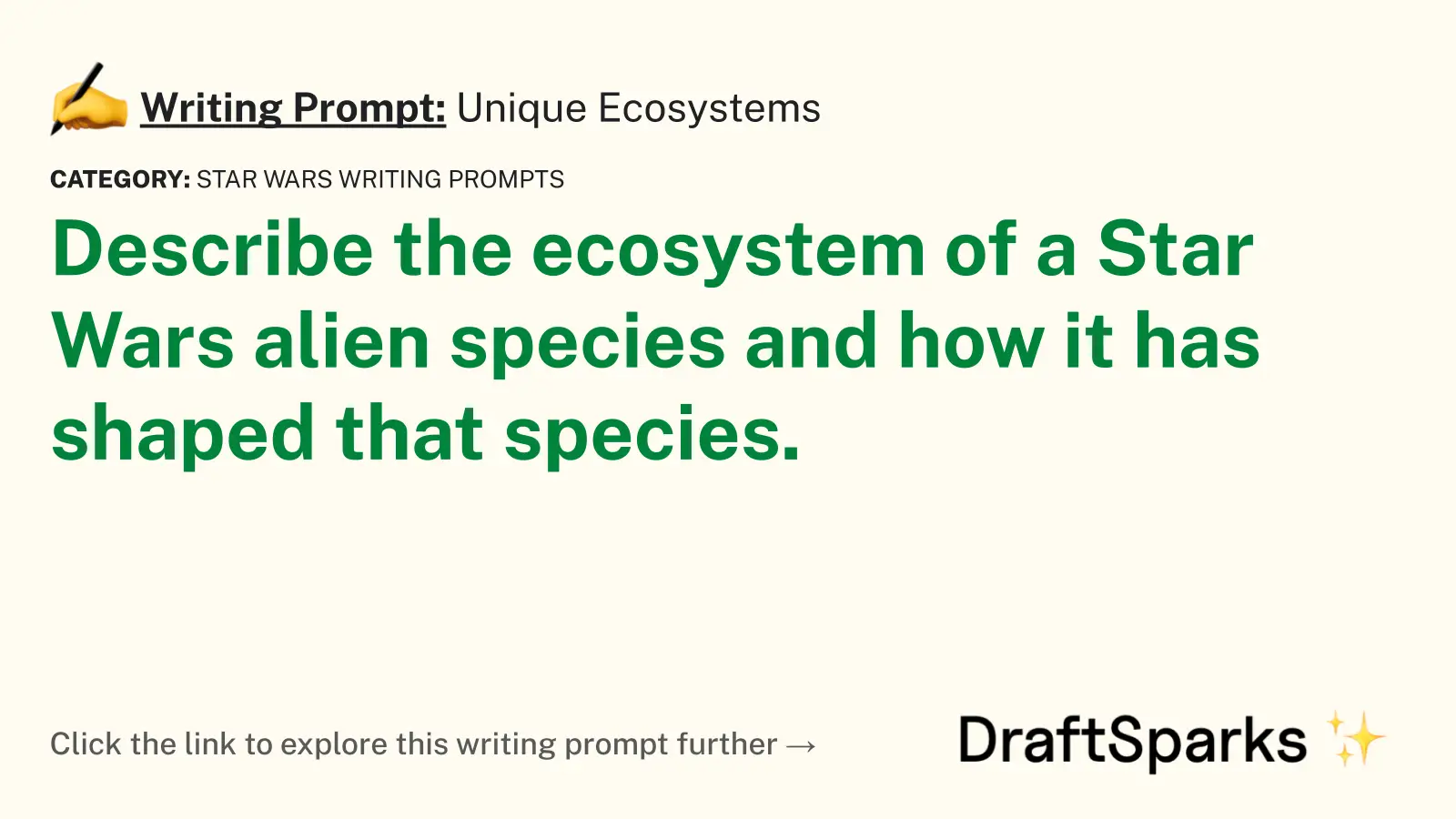
Unique Ecosystems
Describe the ecosystem of a Star Wars alien species and how it has shaped that species.
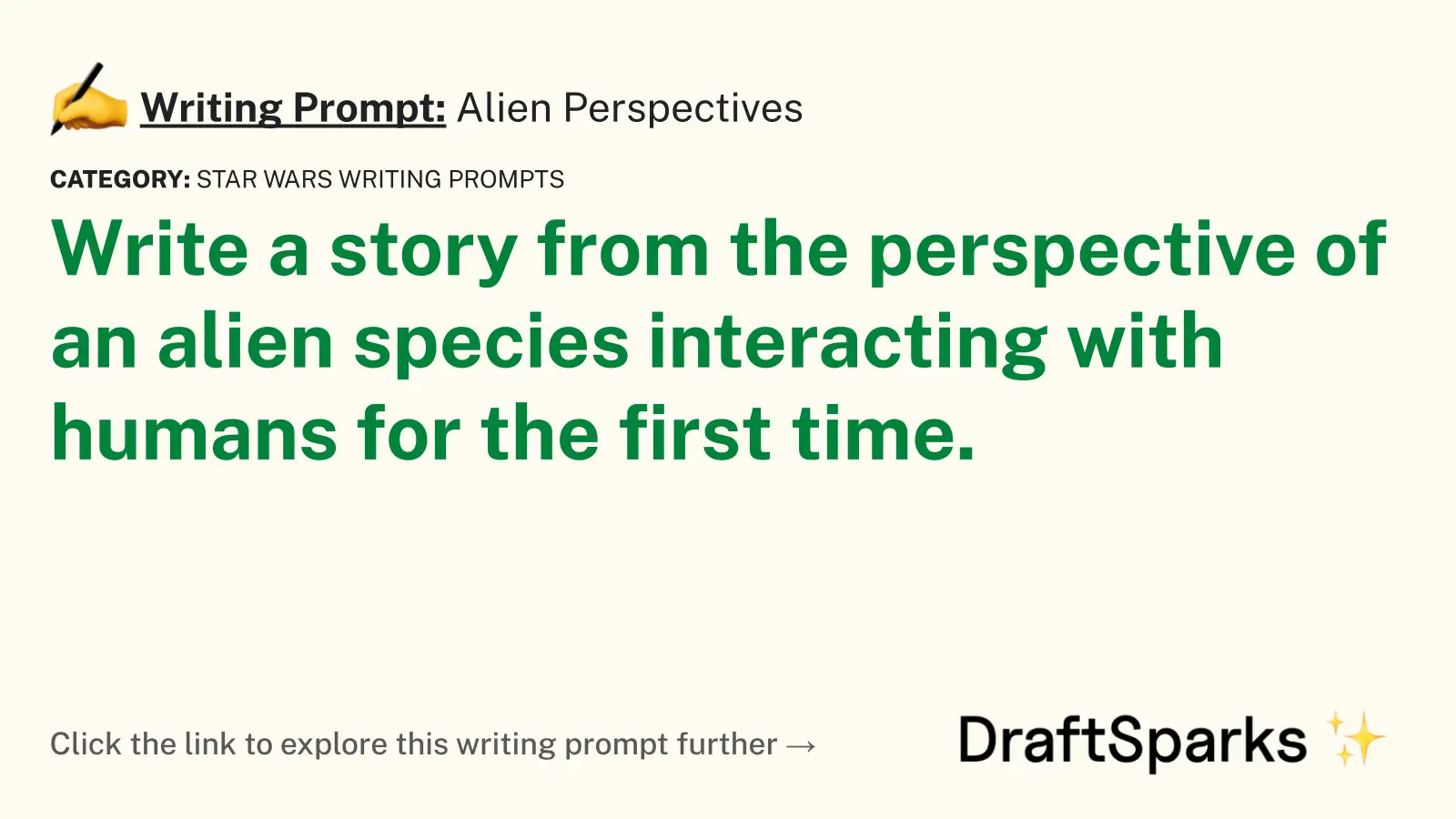
Alien Perspectives
Write a story from the perspective of an alien species interacting with humans for the first time.
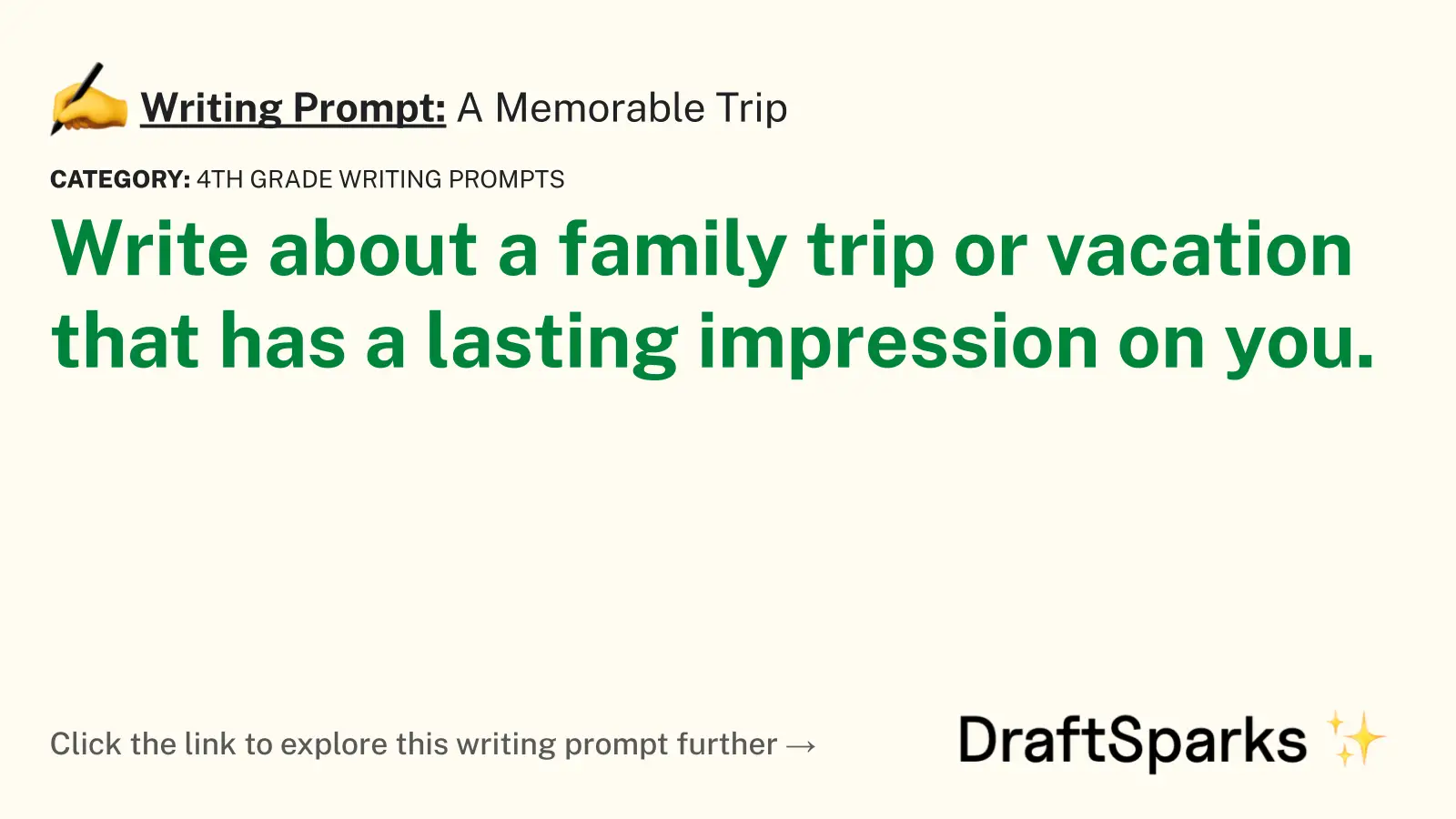
A Memorable Trip
Write about a family trip or vacation that has a lasting impression on you.
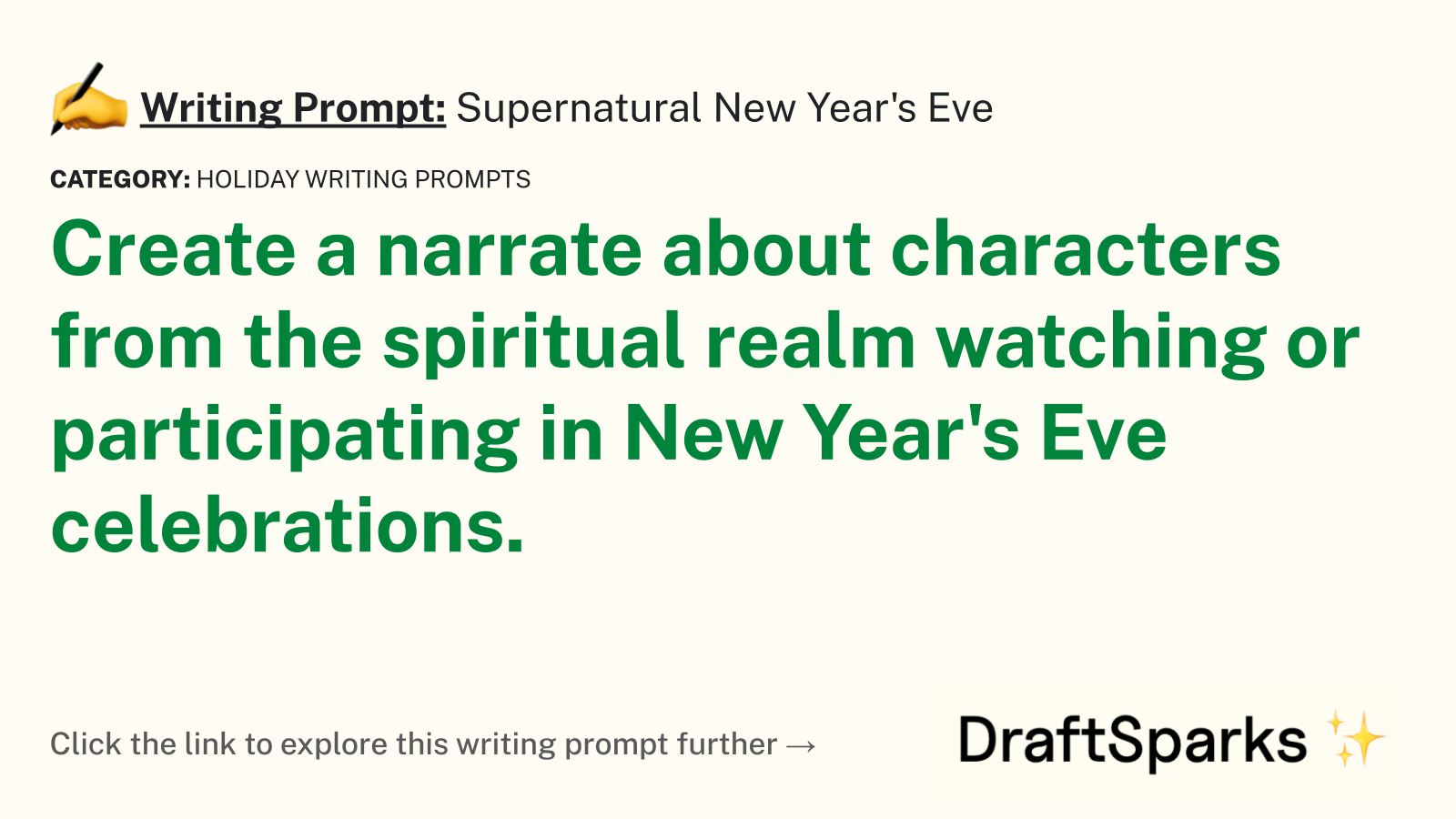
Supernatural New Year’s Eve
Create a narrate about characters from the spiritual realm watching or participating in New Year’s Eve celebrations.
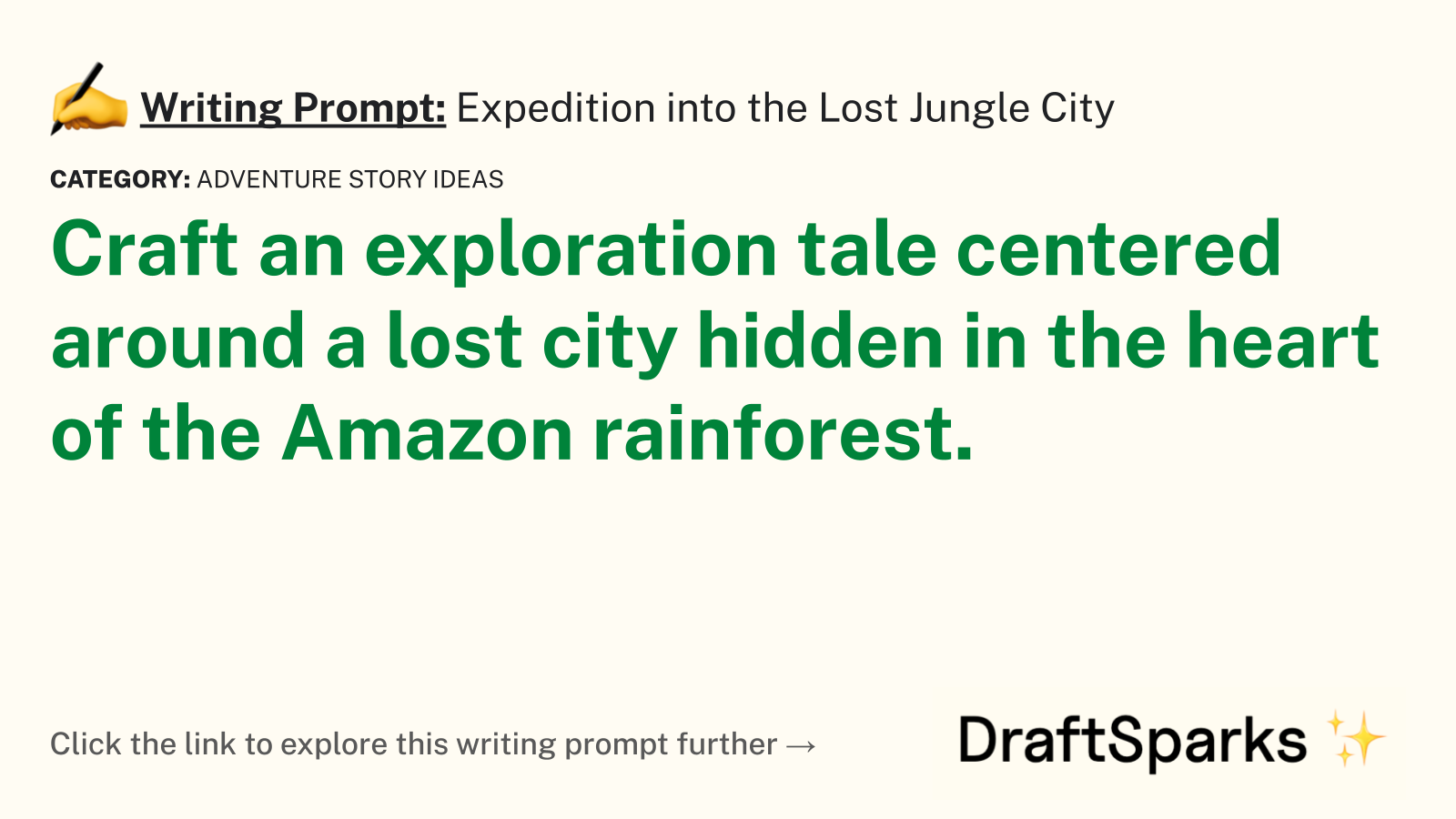
Expedition into the Lost Jungle City
Craft an exploration tale centered around a lost city hidden in the heart of the Amazon rainforest.
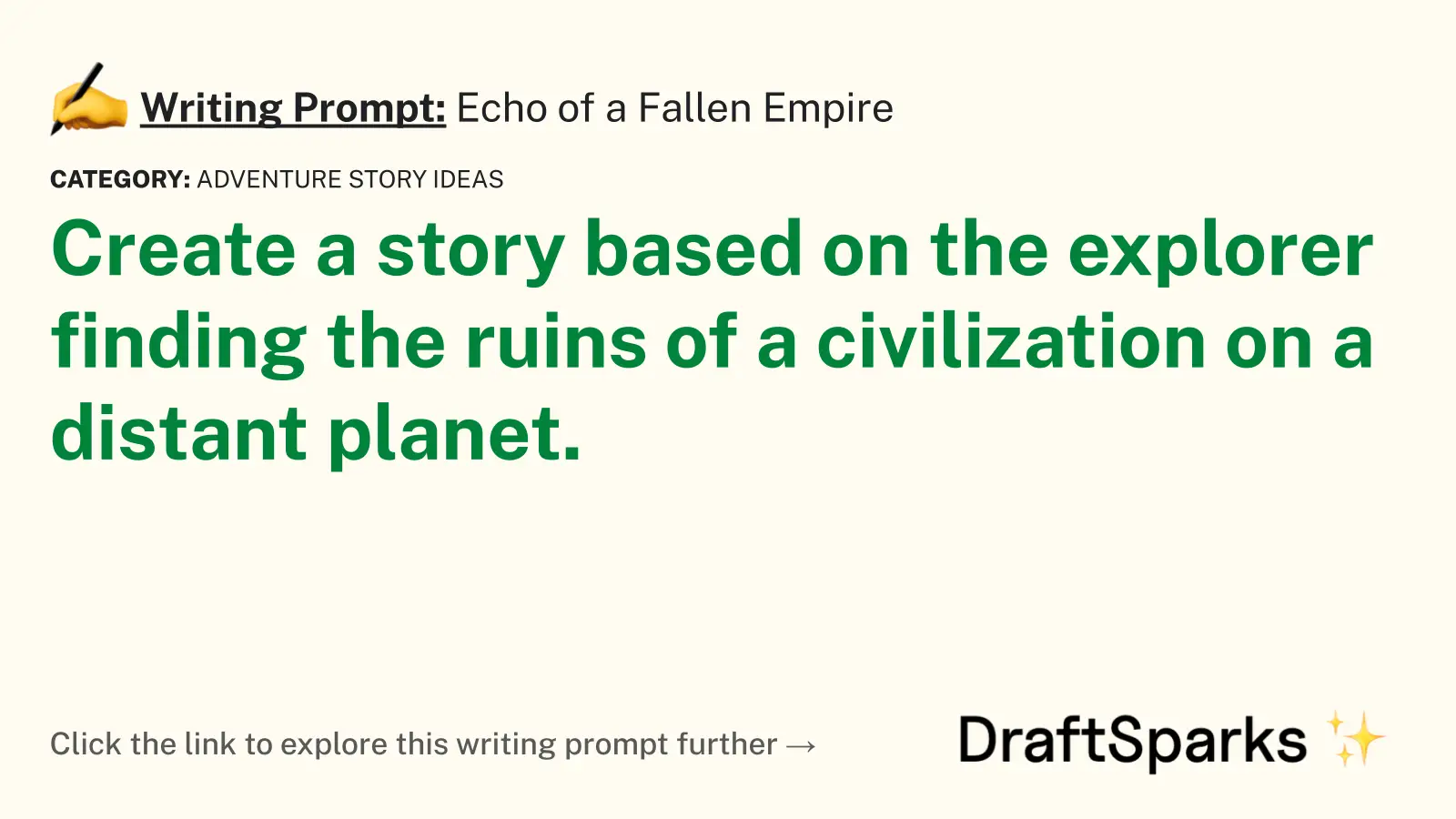
Echo of a Fallen Empire
Create a story based on the explorer finding the ruins of a civilization on a distant planet.

Racing Camans
Imagine you’re a player in an exciting game of Camogie – an Irish stick-and-ball team sport played by women.
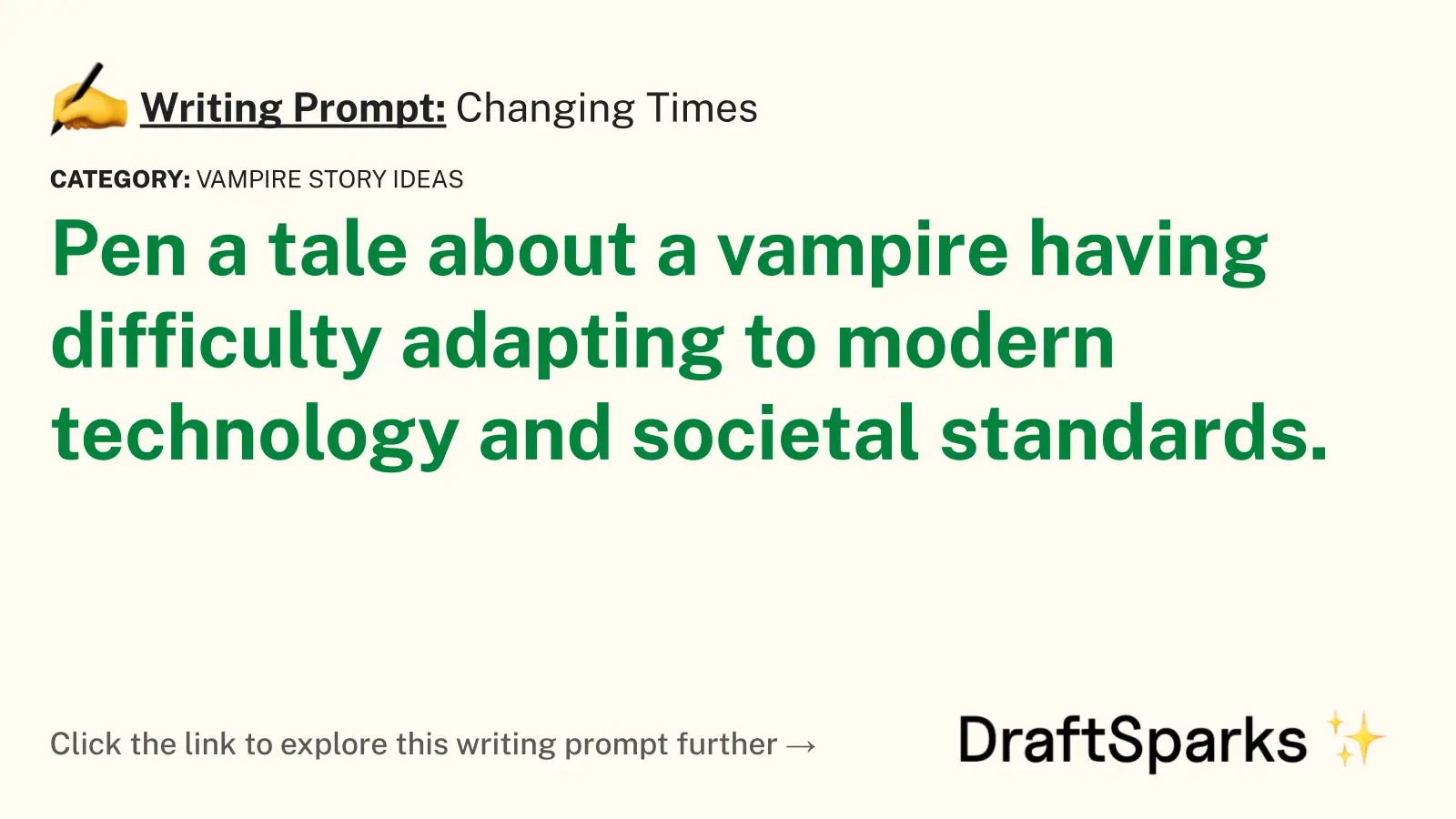
Changing Times
Pen a tale about a vampire having difficulty adapting to modern technology and societal standards.
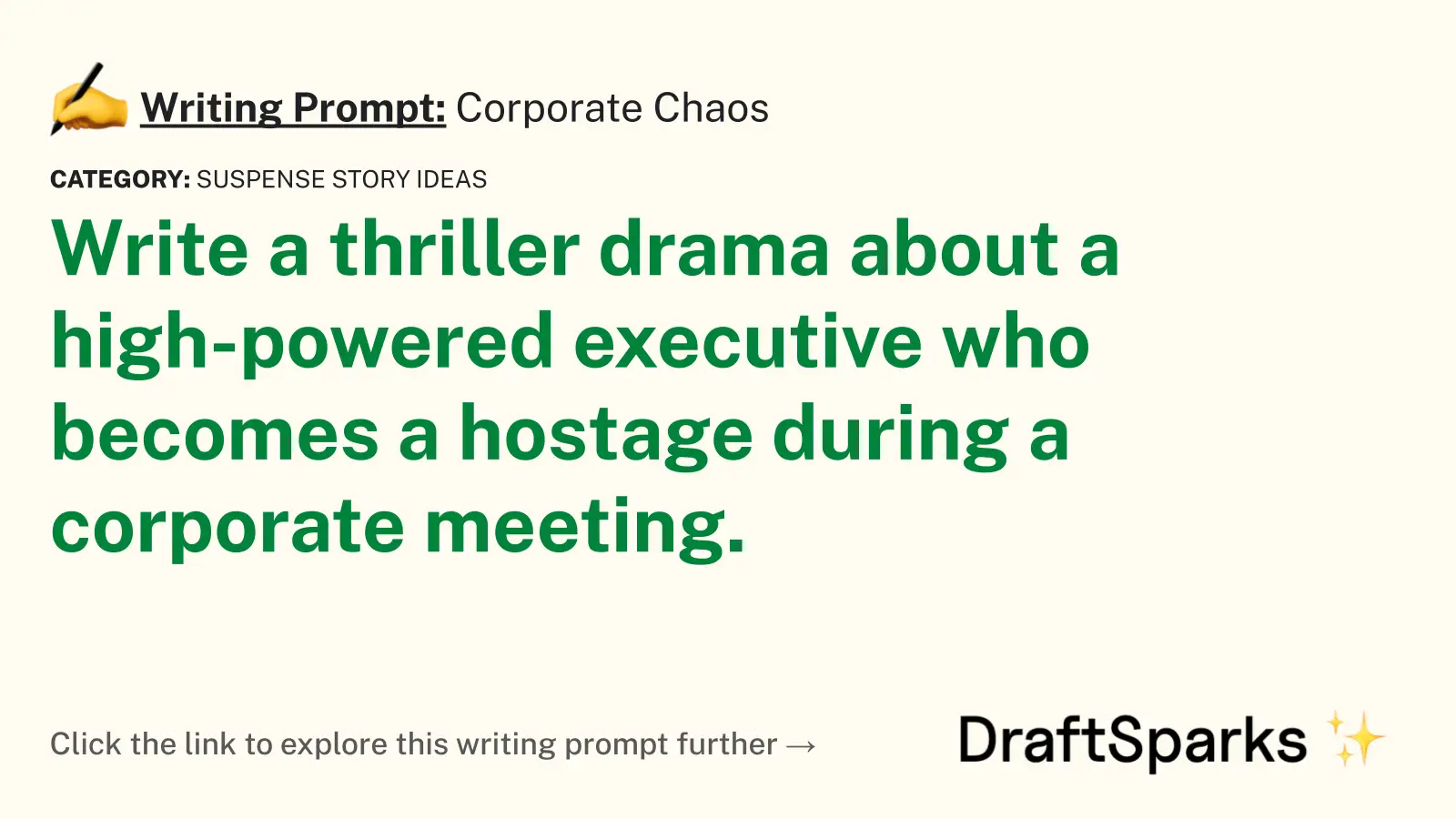
Corporate Chaos
Write a thriller drama about a high-powered executive who becomes a hostage during a corporate meeting.
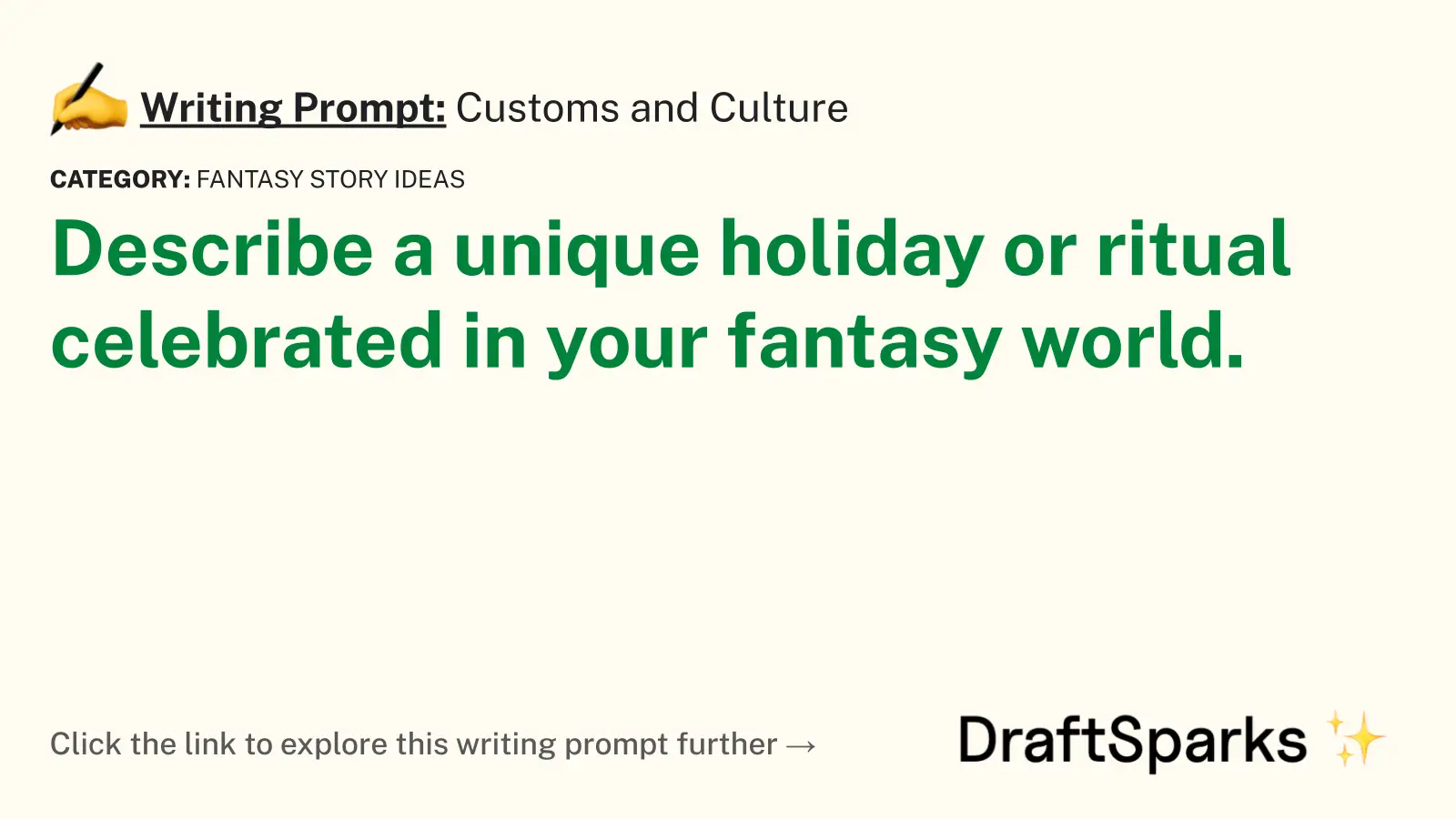
Customs and Culture
Describe a unique holiday or ritual celebrated in your fantasy world.
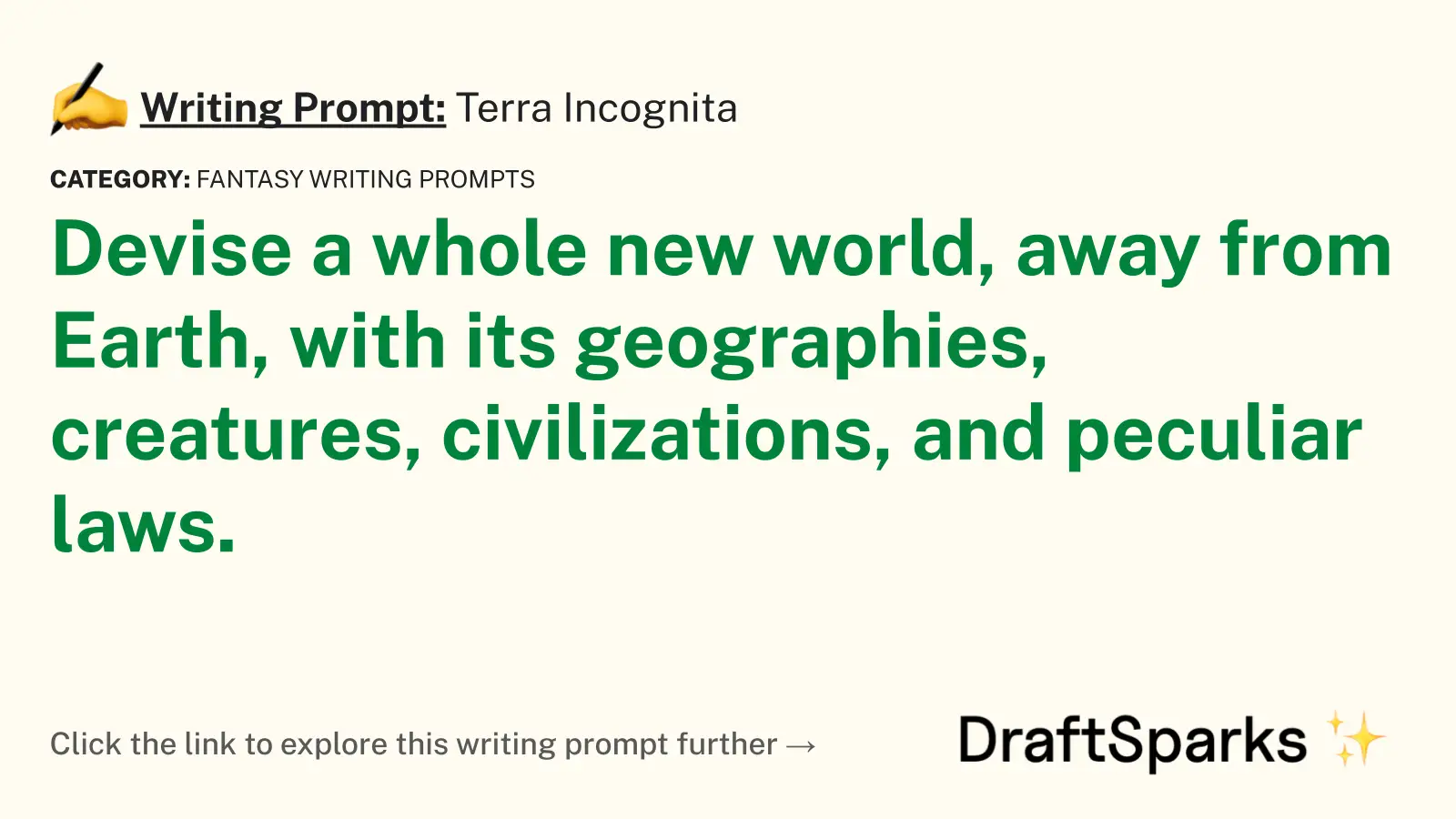
Terra Incognita
Devise a whole new world, away from Earth, with its geographies, creatures, civilizations, and peculiar laws.
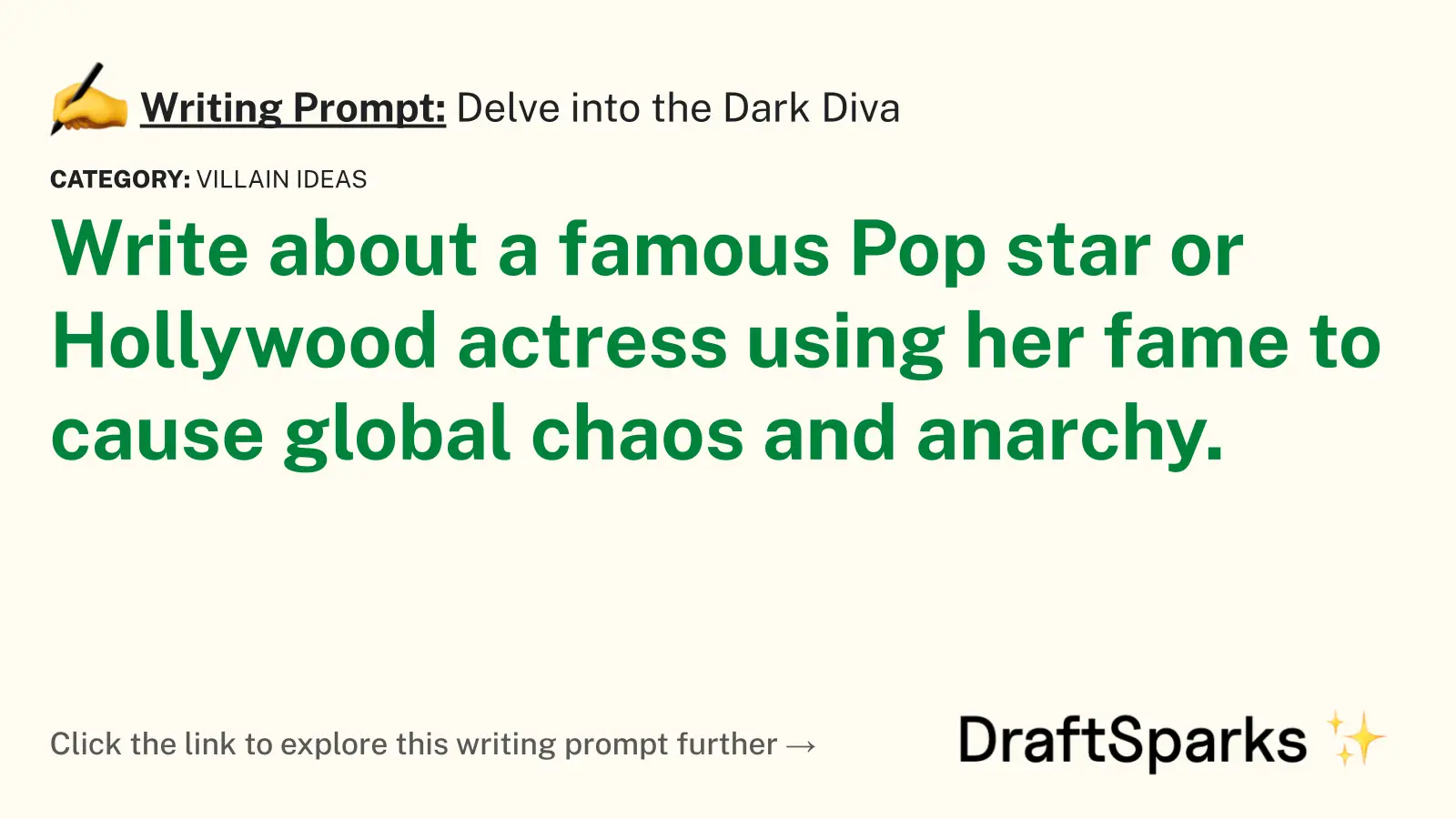
Delve into the Dark Diva
Write about a famous Pop star or Hollywood actress using her fame to cause global chaos and anarchy.

Lush Solstice
Imagine a version of Earth where Winter Solstice instead ushers in a wave of intense plant growth overnight.
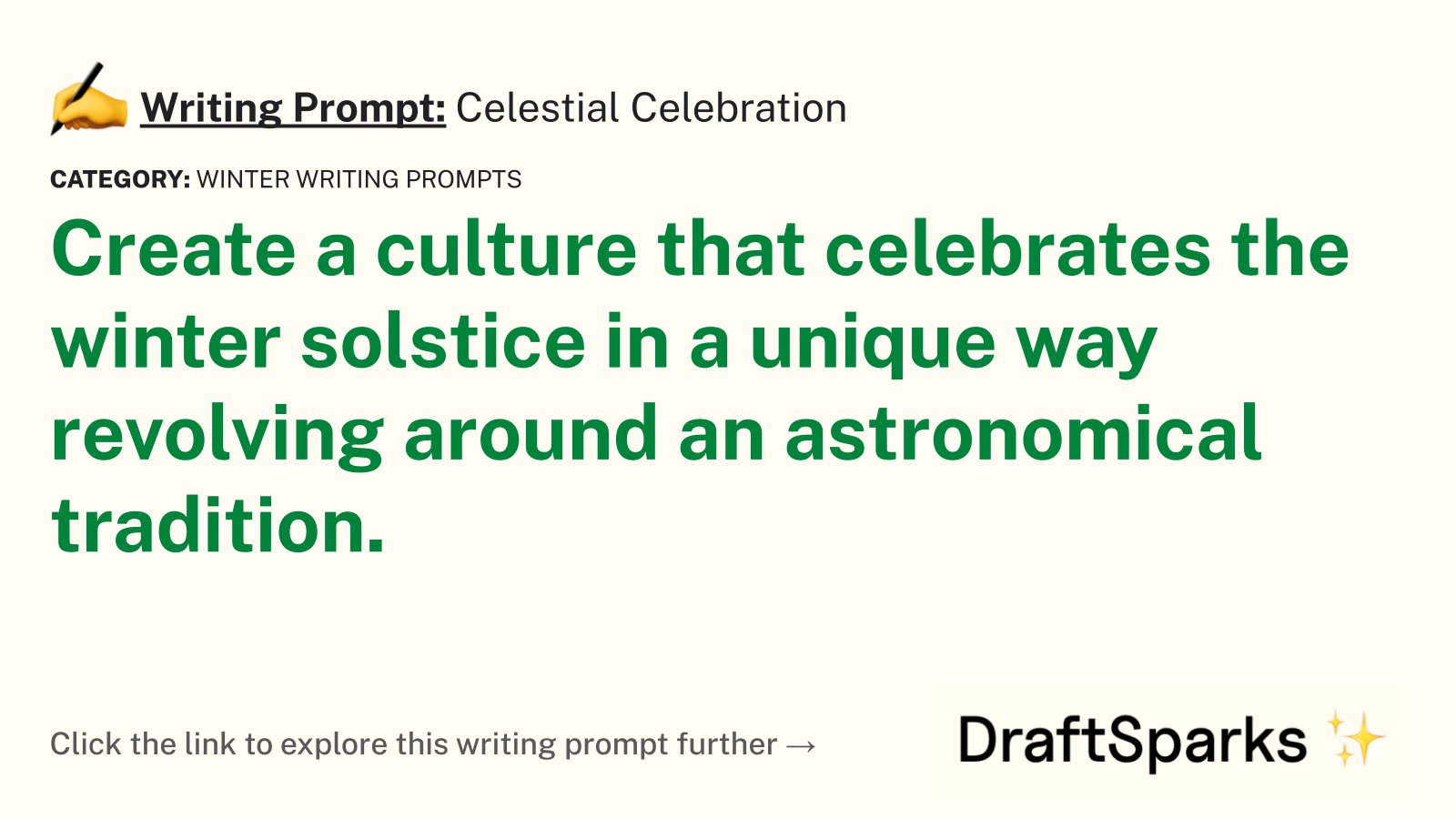
Celestial Celebration
Create a culture that celebrates the winter solstice in a unique way revolving around an astronomical tradition.
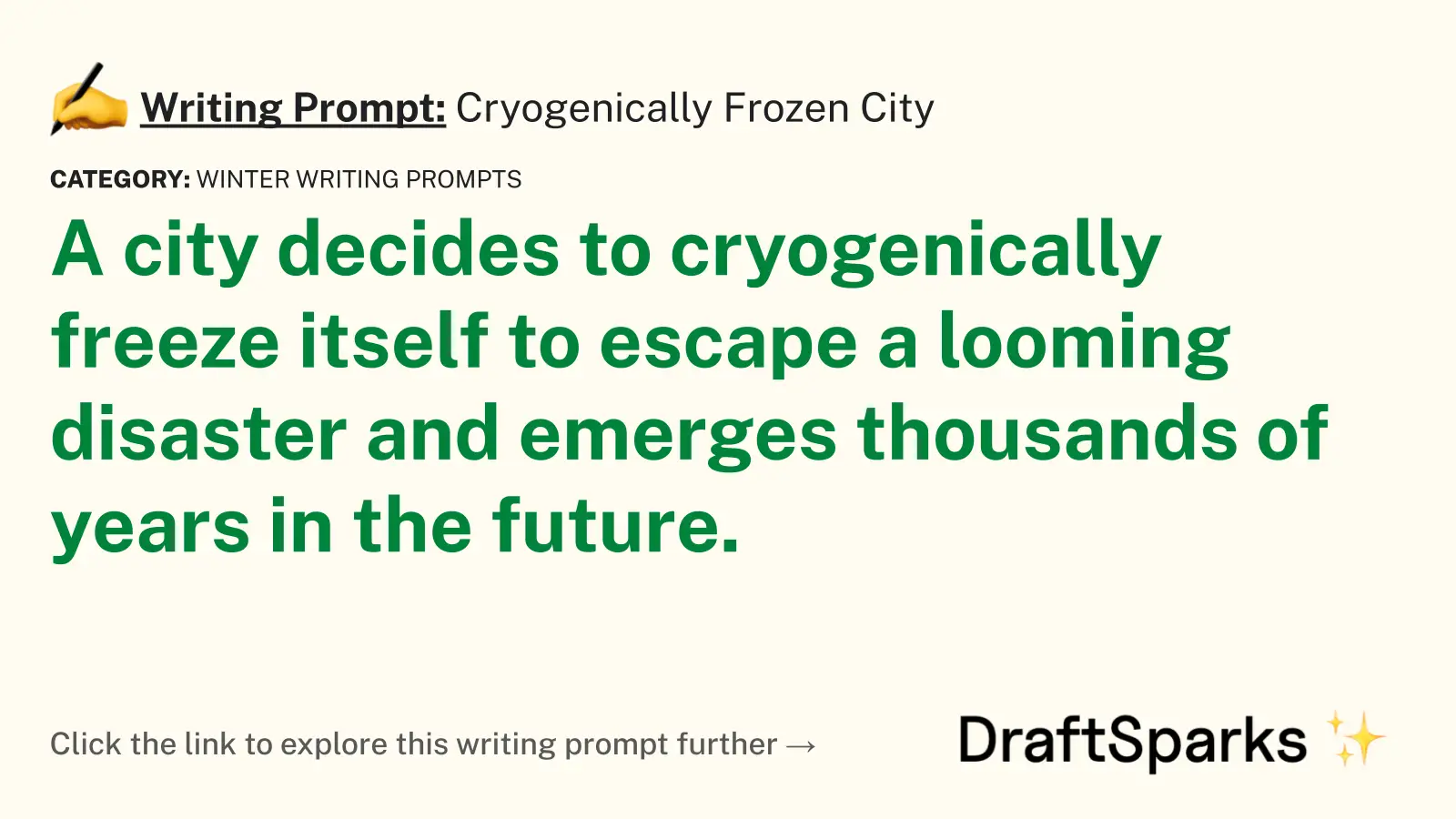
Cryogenically Frozen City
A city decides to cryogenically freeze itself to escape a looming disaster and emerges thousands of years in the future.

The Nordic Way of Life
Write about how the Nordic people adapt their lifestyle to cope with harsh winter conditions.

Alien Hipsters
Planet earth has been invaded! But instead of conquering alien forces, they’re alien hipsters loving all things retro earth-style.
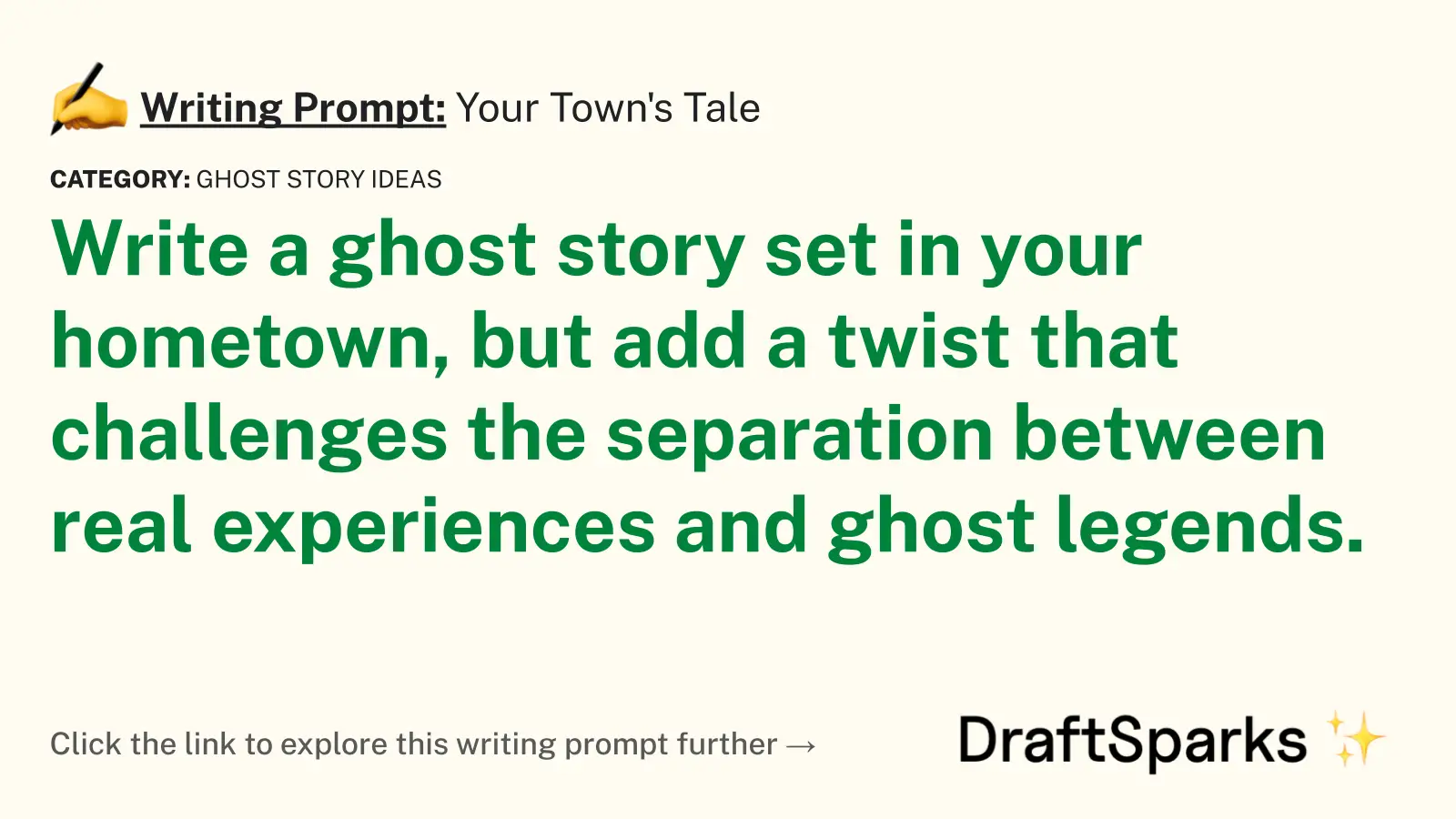
Your Town’s Tale
Write a ghost story set in your hometown, but add a twist that challenges the separation between real experiences and ghost legends.
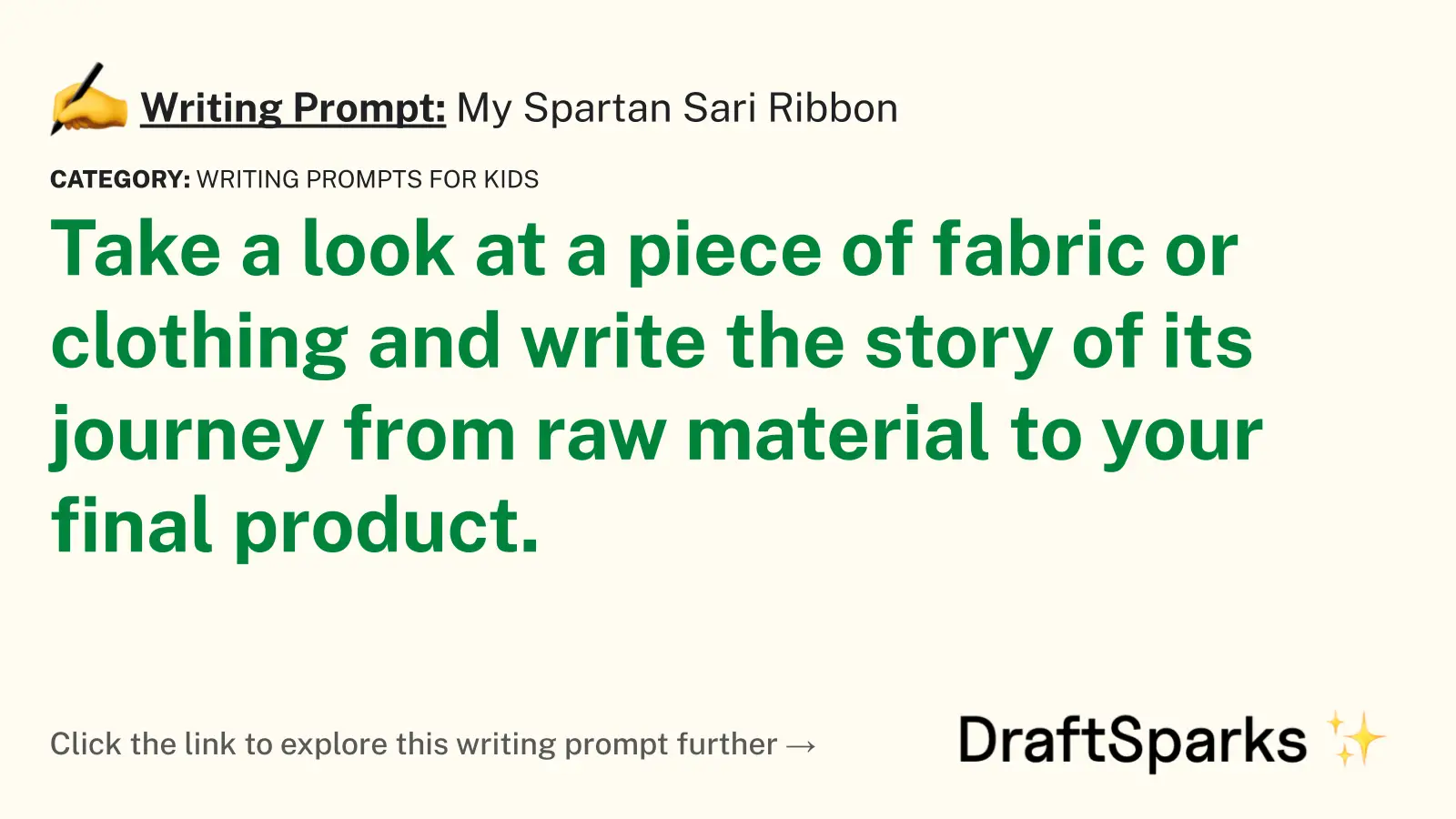
My Spartan Sari Ribbon
Take a look at a piece of fabric or clothing and write the story of its journey from raw material to your final product.
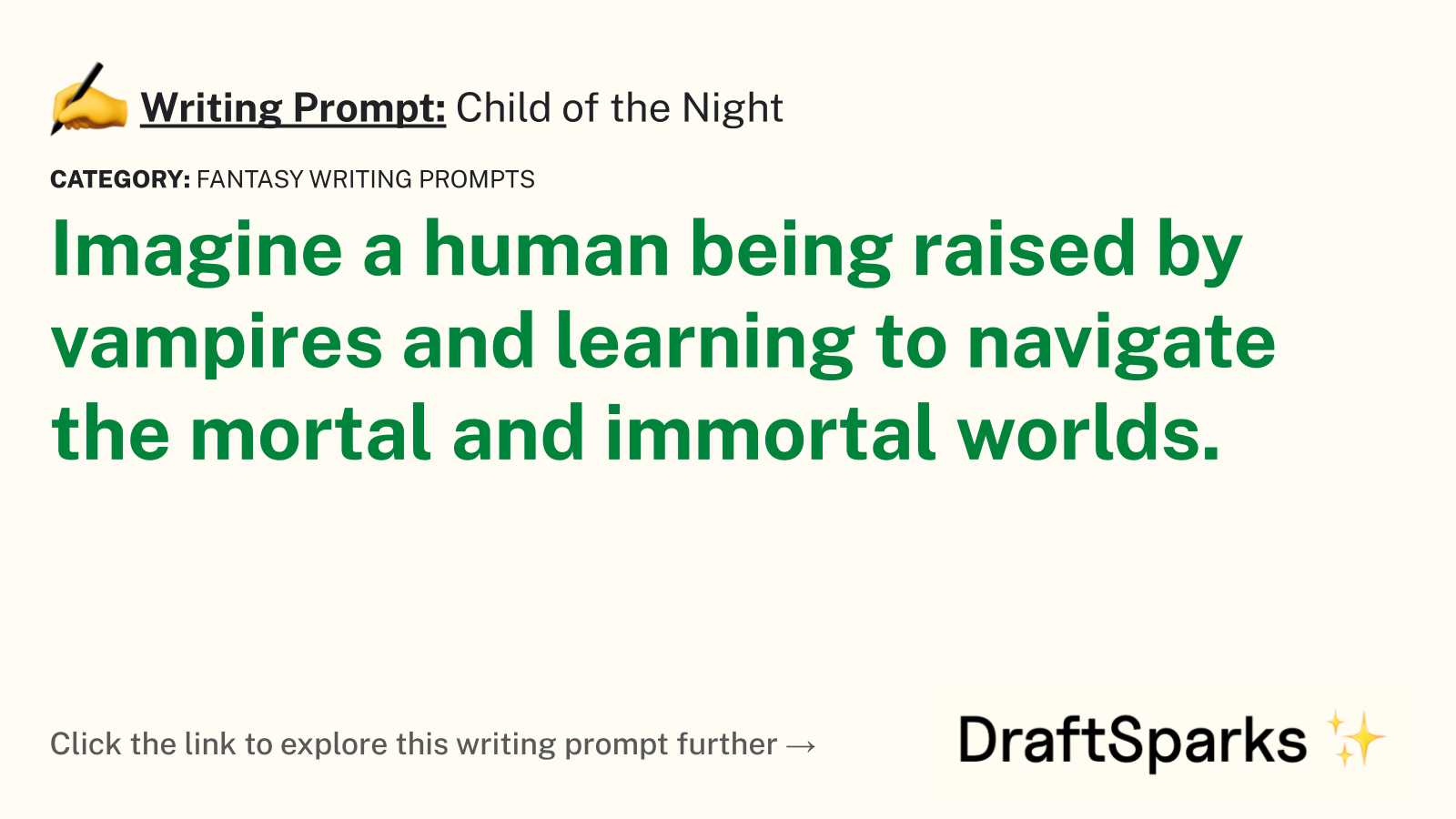
Child of the Night
Imagine a human being raised by vampires and learning to navigate the mortal and immortal worlds.
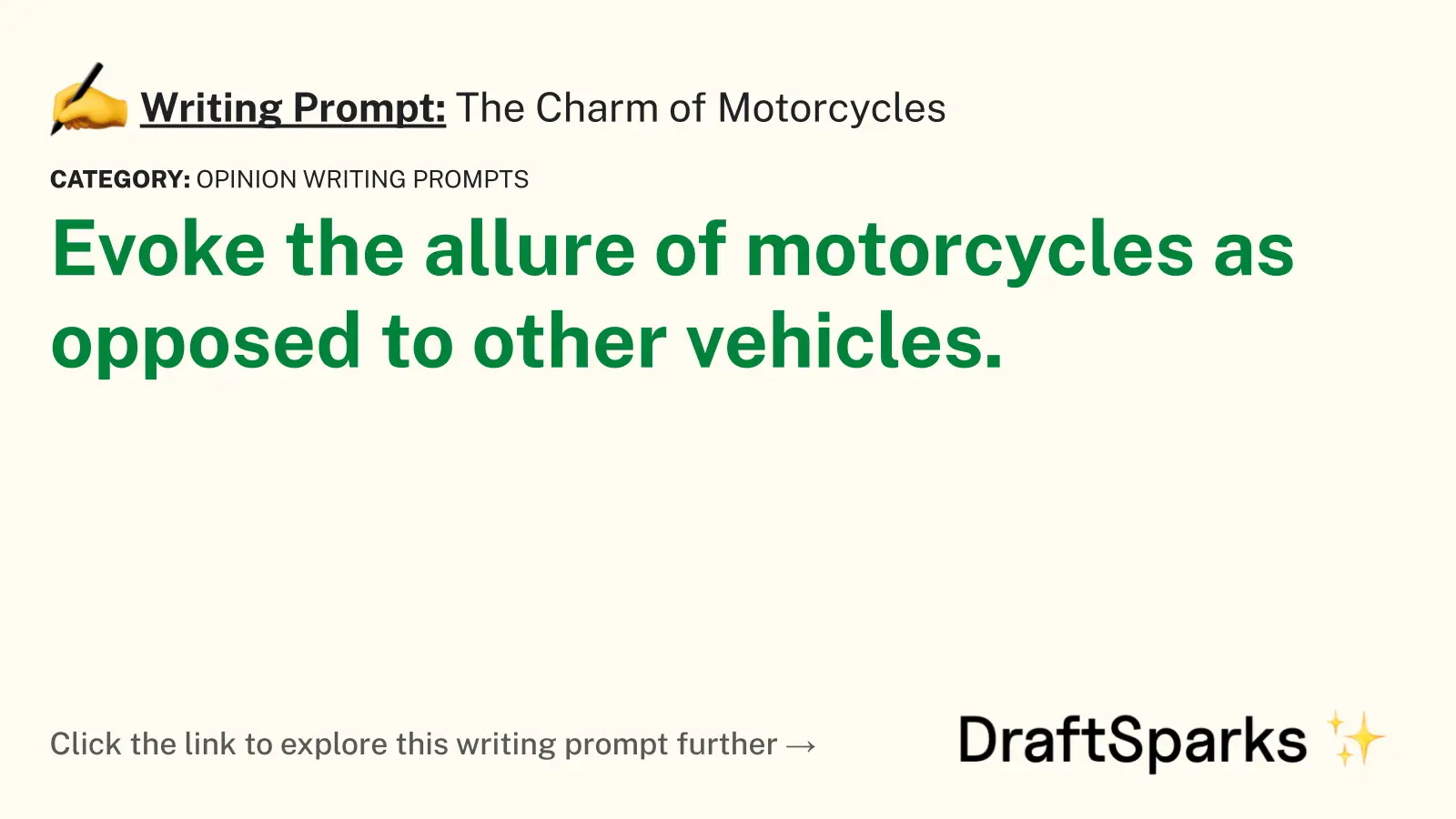
The Charm of Motorcycles
Evoke the allure of motorcycles as opposed to other vehicles.
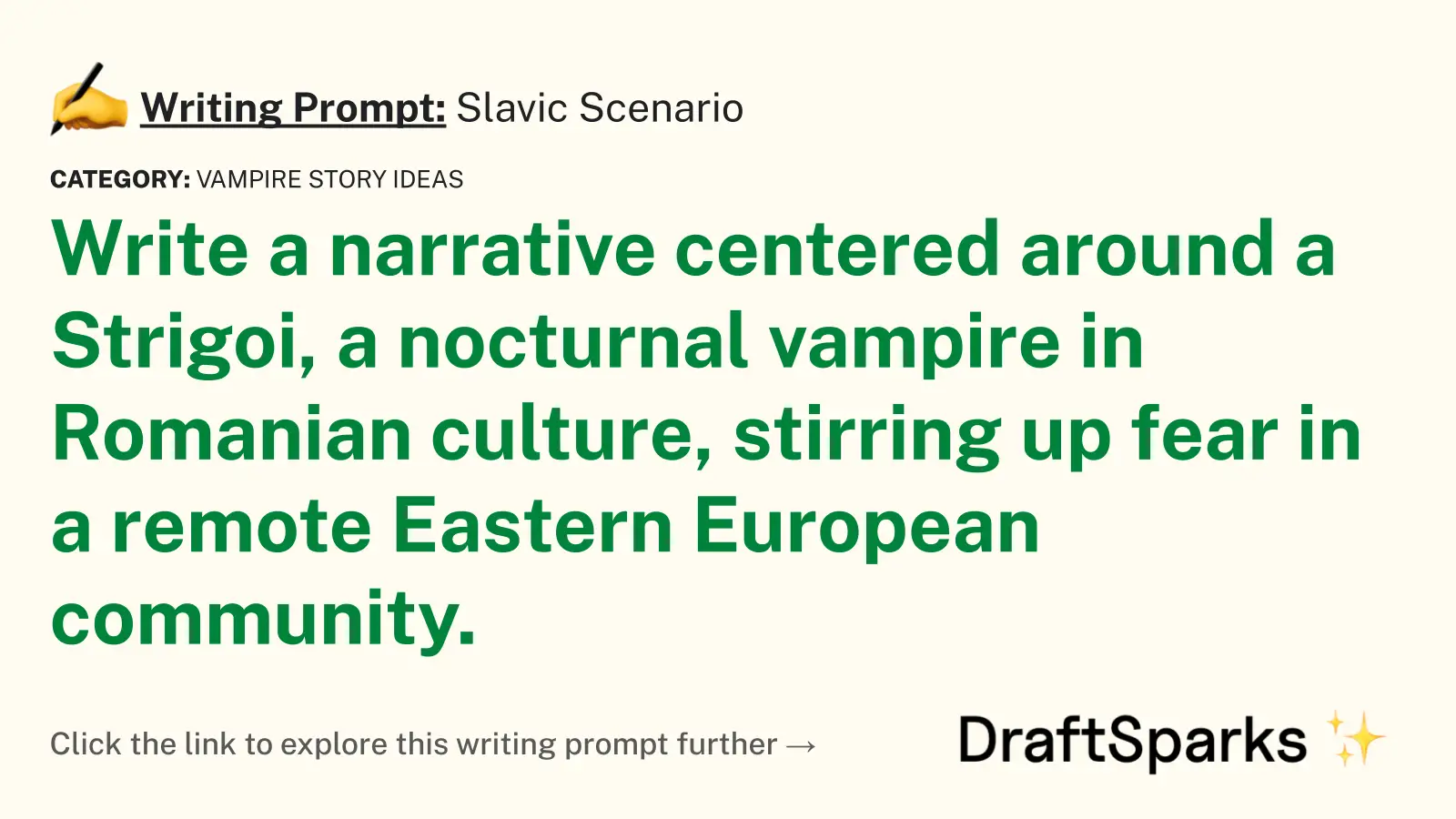
Slavic Scenario
Write a narrative centered around a Strigoi, a nocturnal vampire in Romanian culture, stirring up fear in a remote Eastern European community.
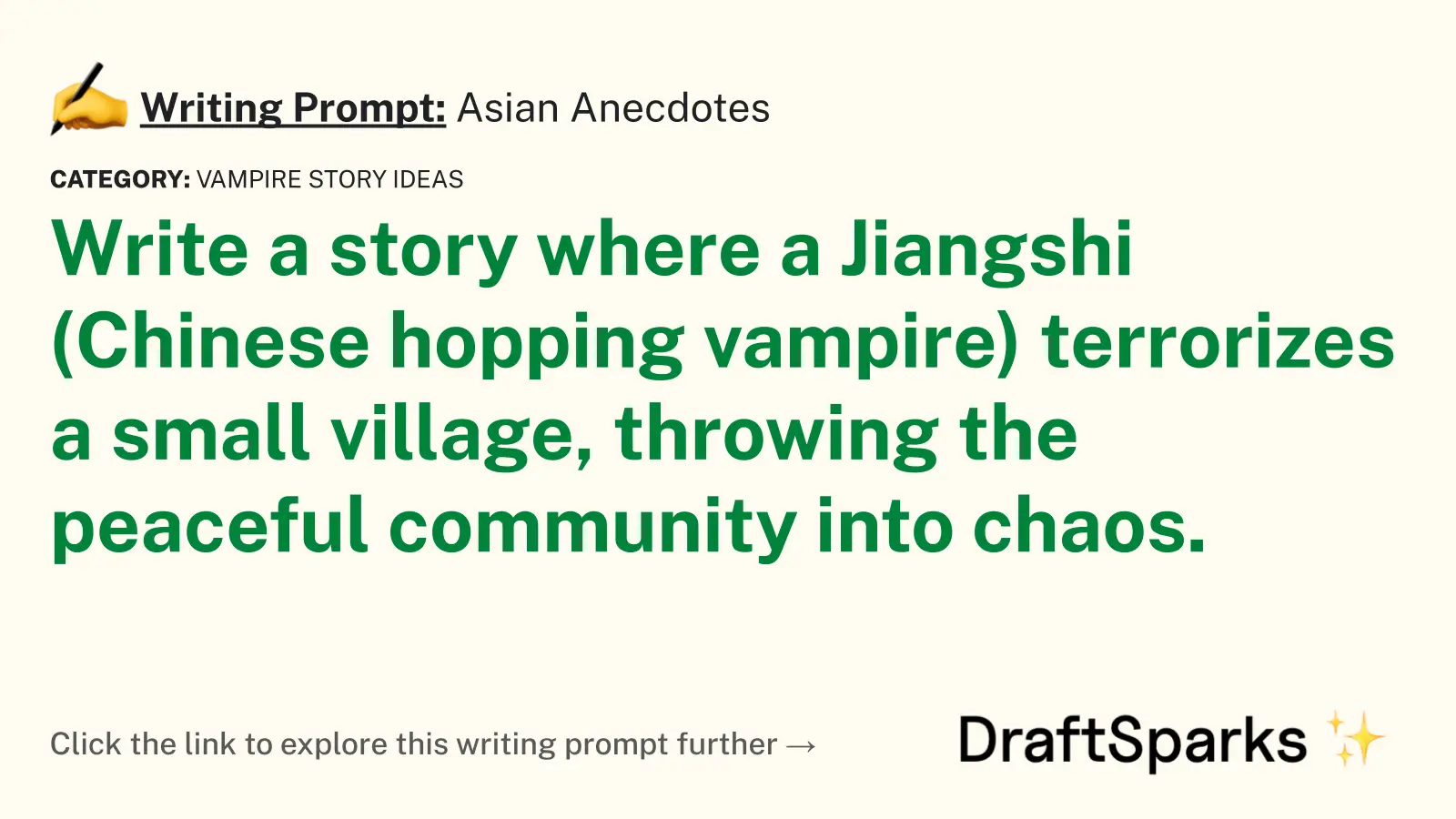
Asian Anecdotes
Write a story where a Jiangshi (Chinese hopping vampire) terrorizes a small village, throwing the peaceful community into chaos.
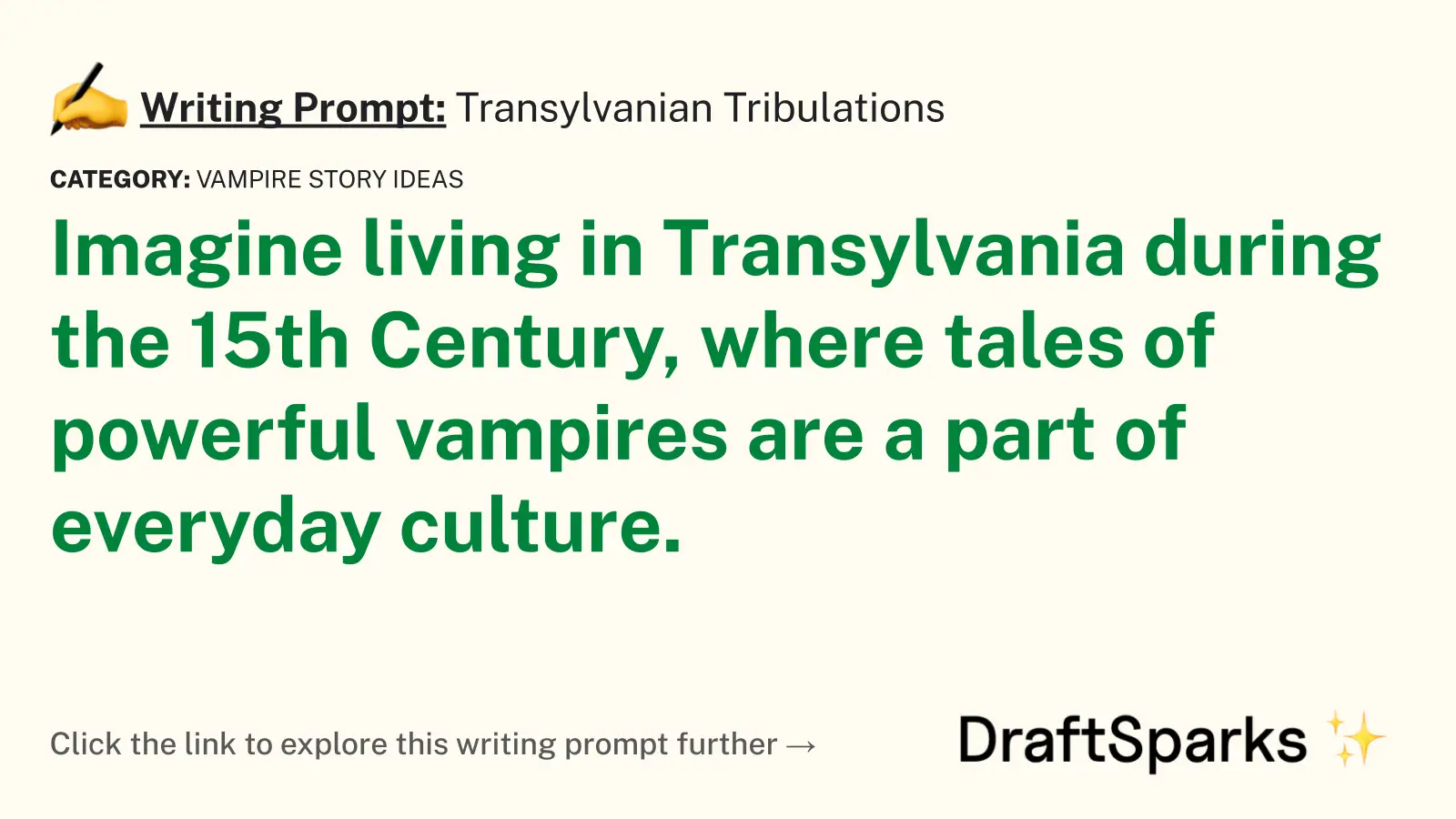
Transylvanian Tribulations
Imagine living in Transylvania during the 15th Century, where tales of powerful vampires are a part of everyday culture.
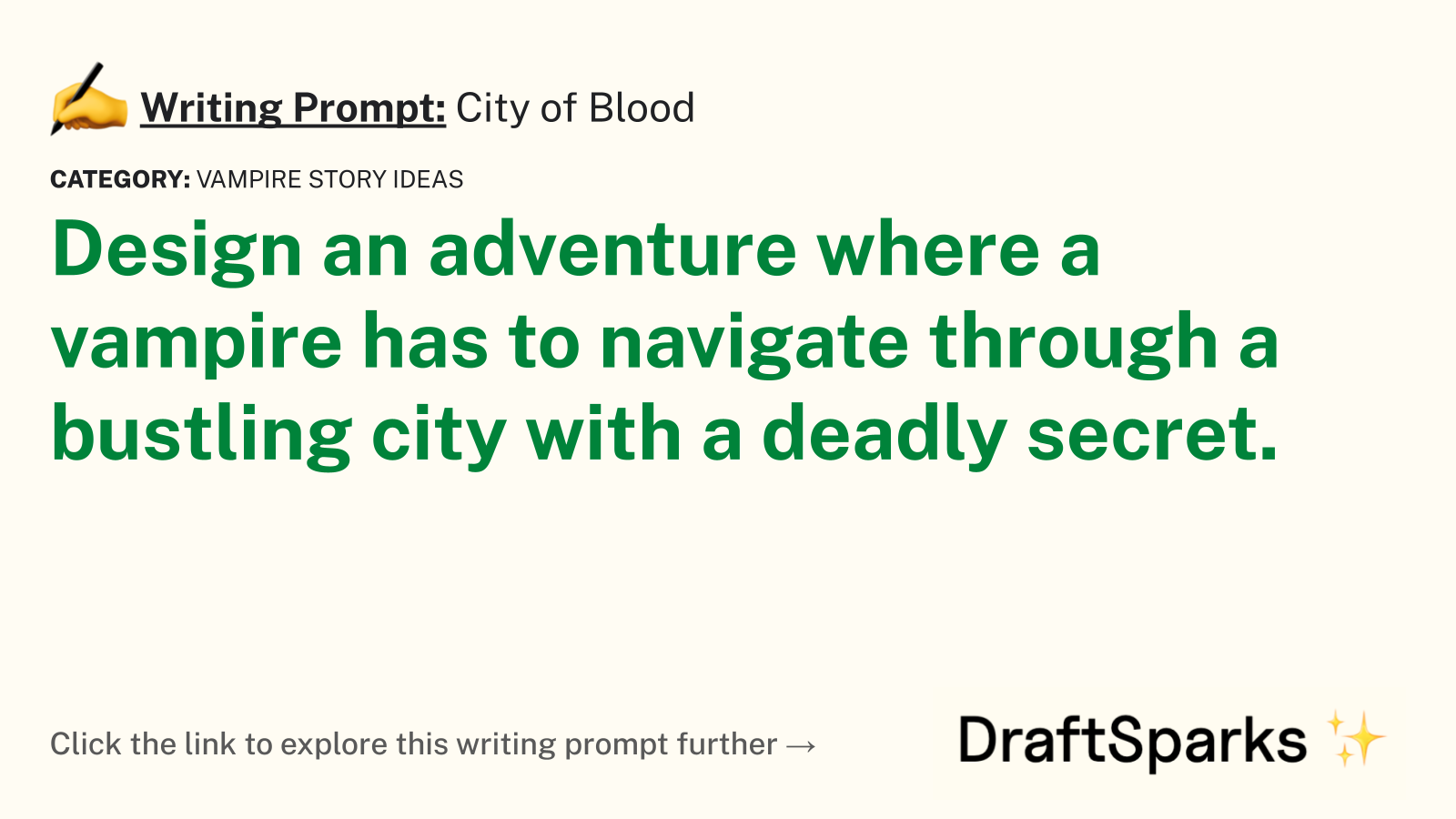
City of Blood
Design an adventure where a vampire has to navigate through a bustling city with a deadly secret.
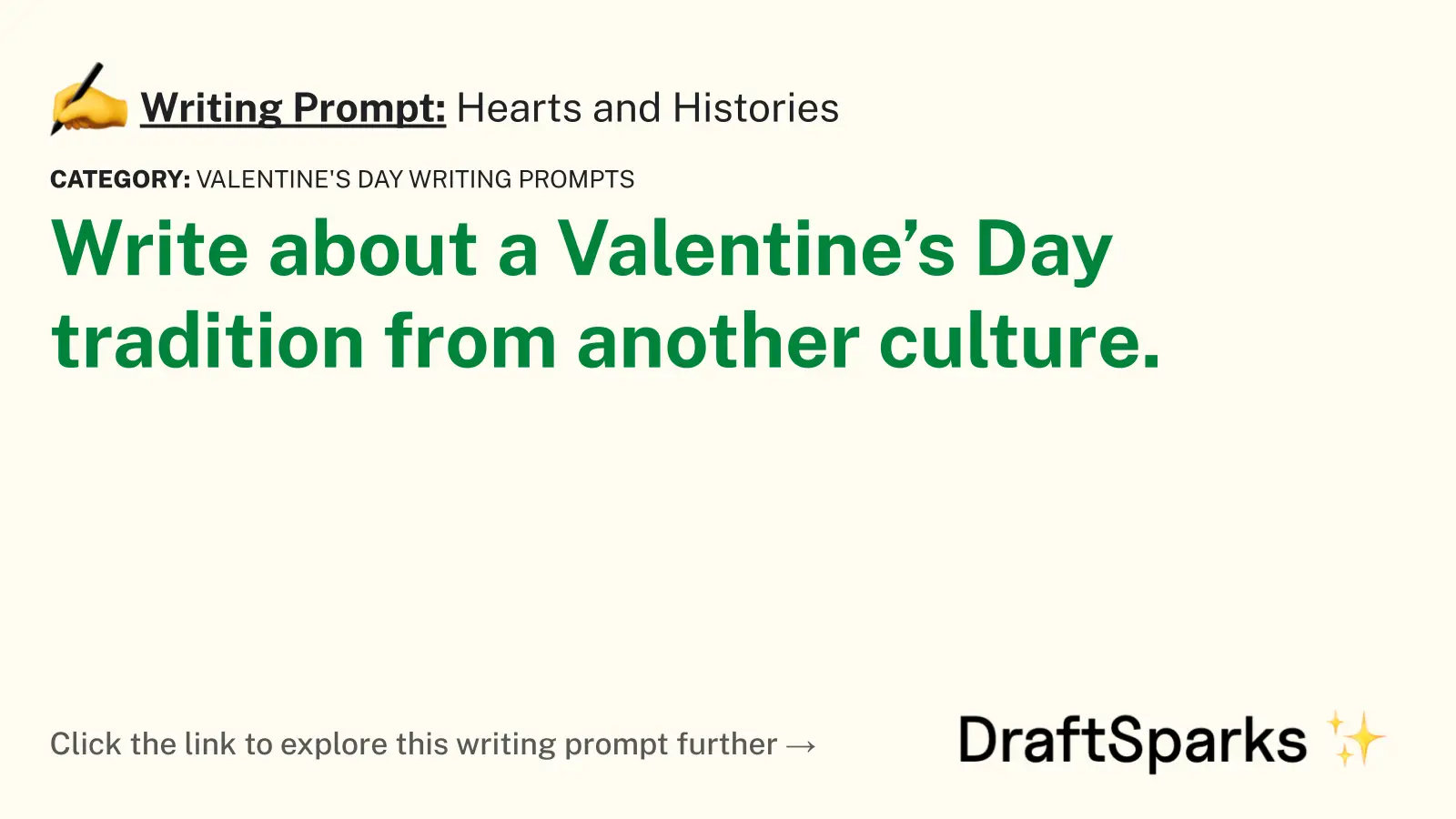
Hearts and Histories
Write about a Valentine’s Day tradition from another culture.
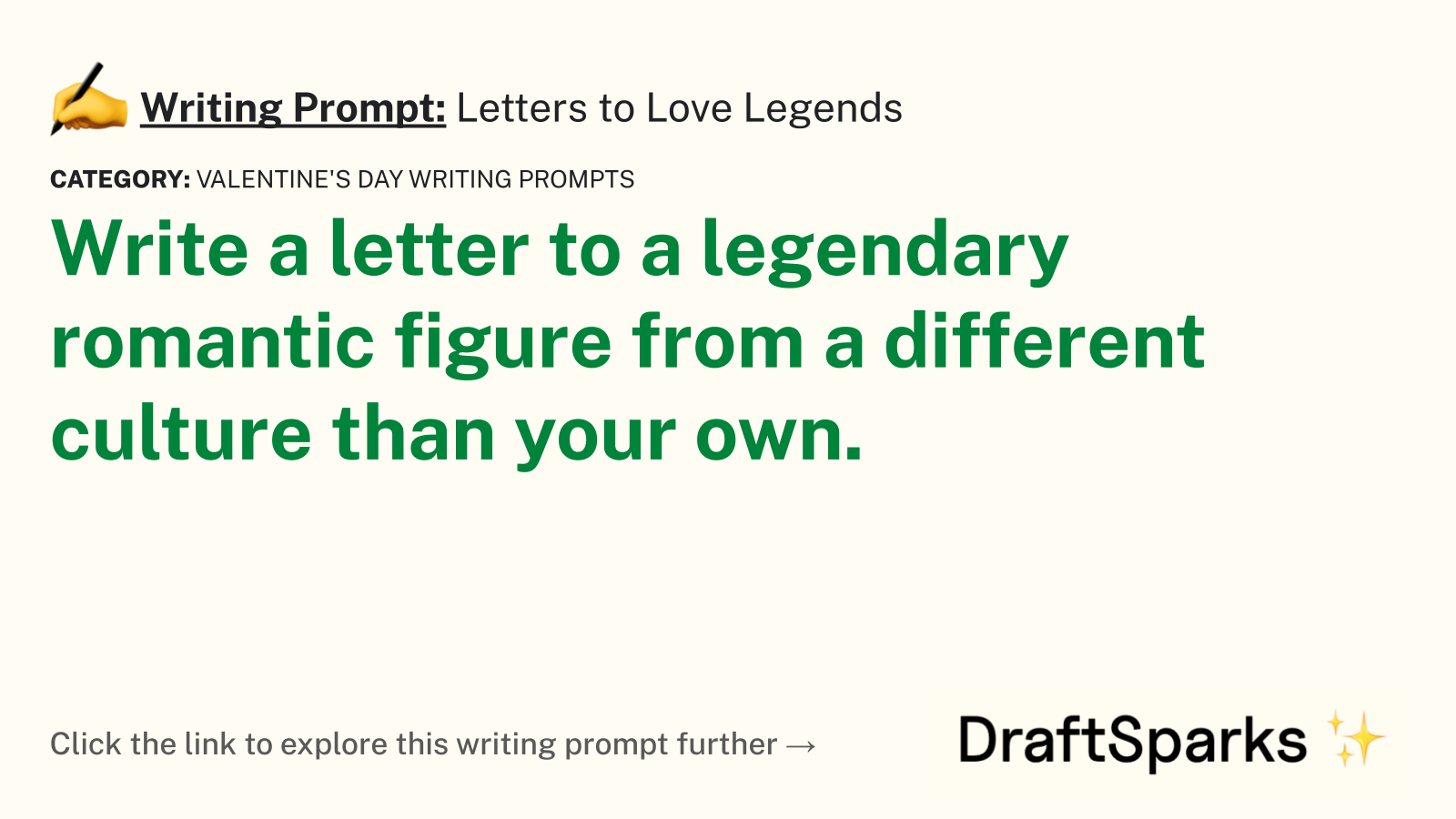
Letters to Love Legends
Write a letter to a legendary romantic figure from a different culture than your own.
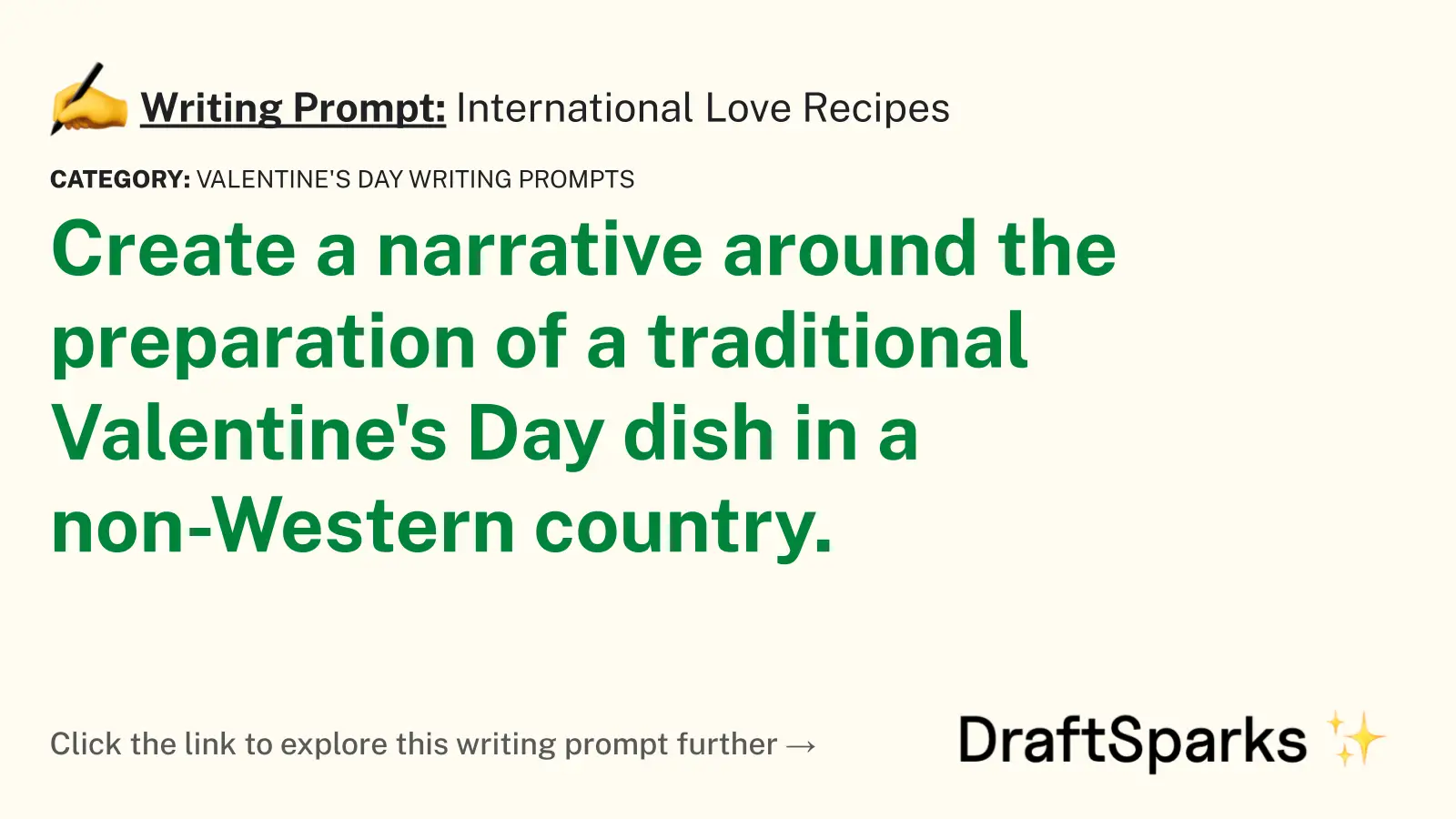
International Love Recipes
Create a narrative around the preparation of a traditional Valentine’s Day dish in a non-Western country.
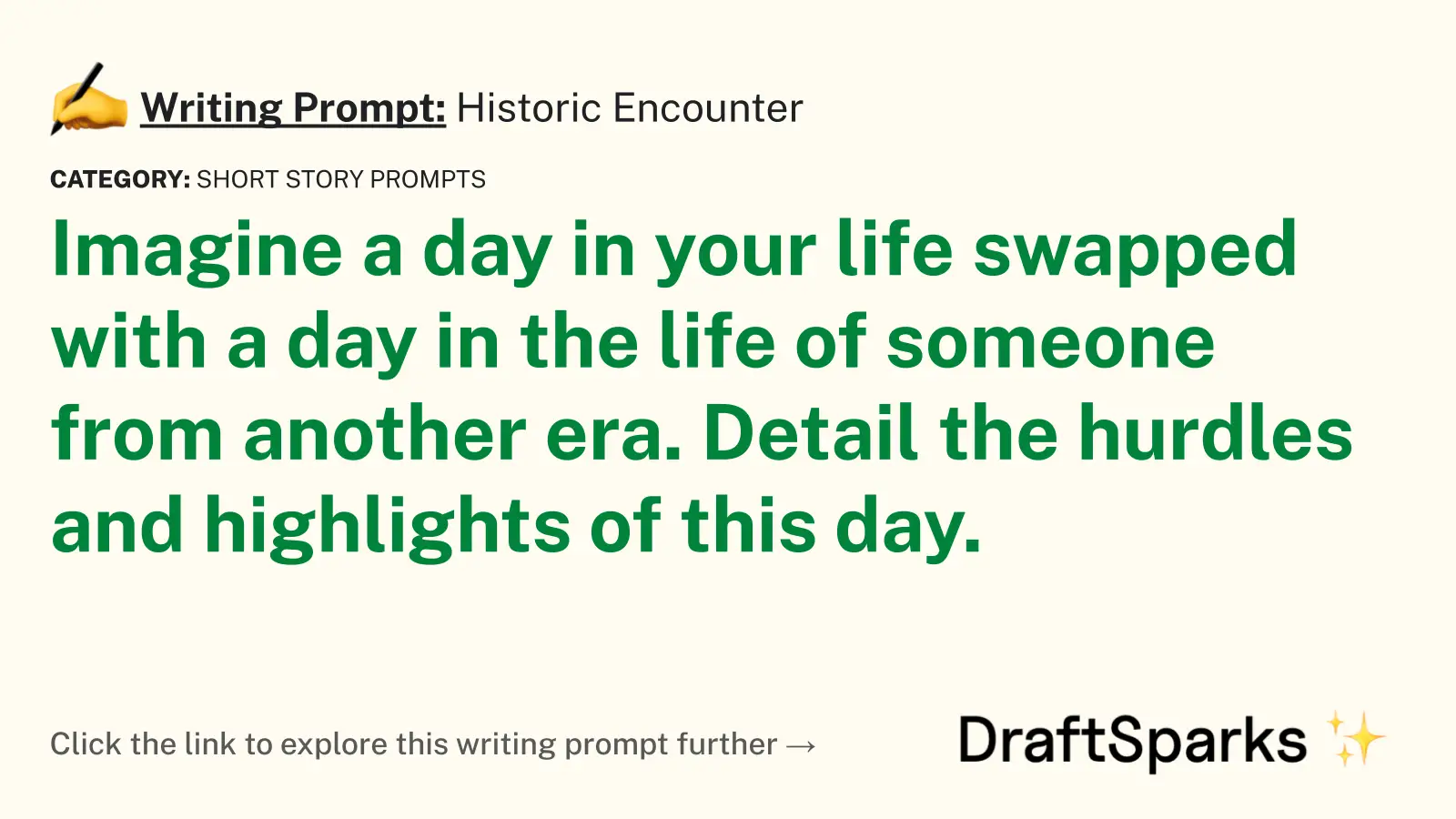
Historic Encounter
Imagine a day in your life swapped with a day in the life of someone from another era. Detail the hurdles and highlights of this day.
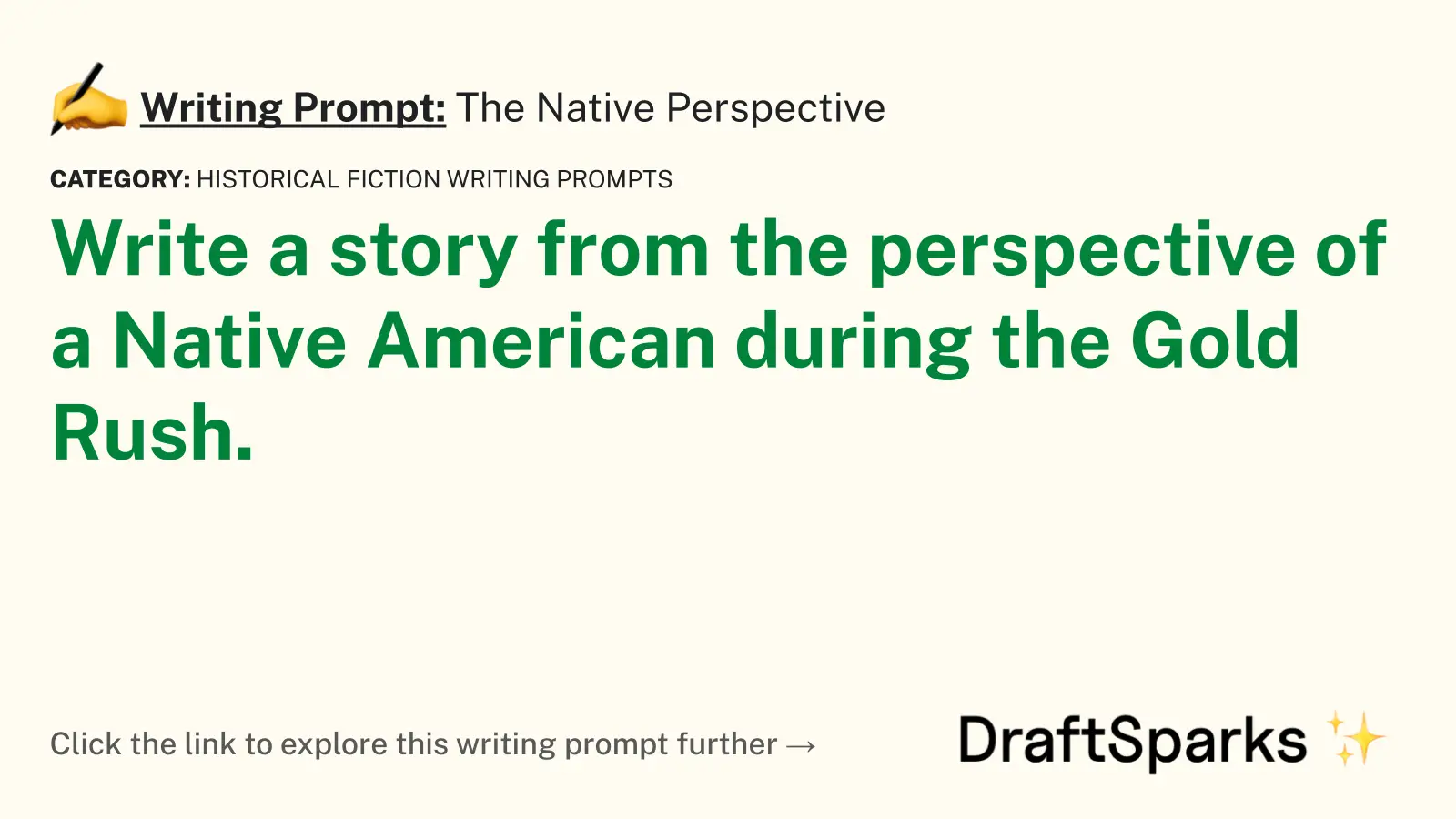
The Native Perspective
Write a story from the perspective of a Native American during the Gold Rush.

Kingdom Within The Cracks
Your character accidentally falls into a crack in their home’s floor, only to land in an entirely different, fantastical land.
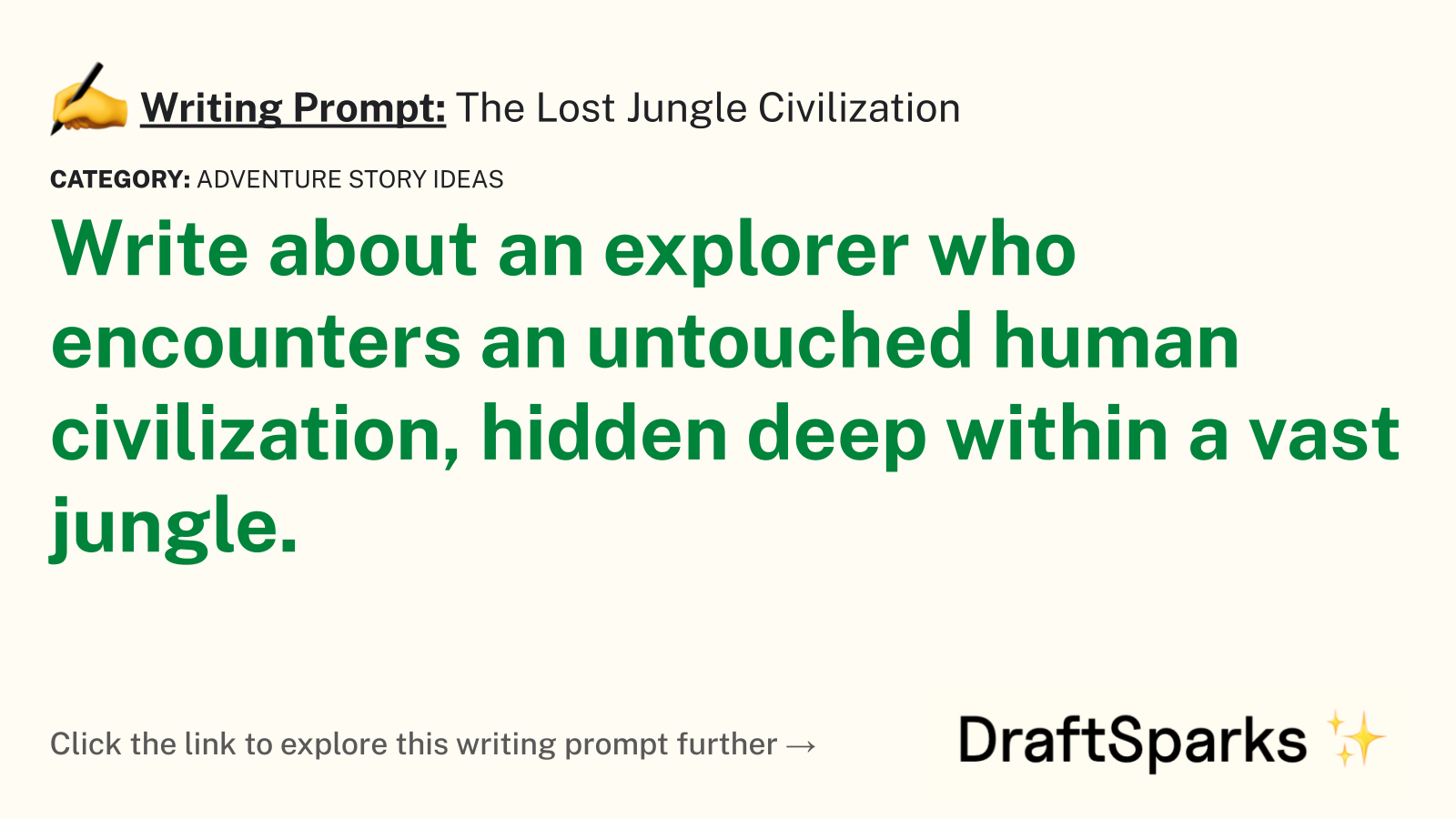
The Lost Jungle Civilization
Write about an explorer who encounters an untouched human civilization, hidden deep within a vast jungle.
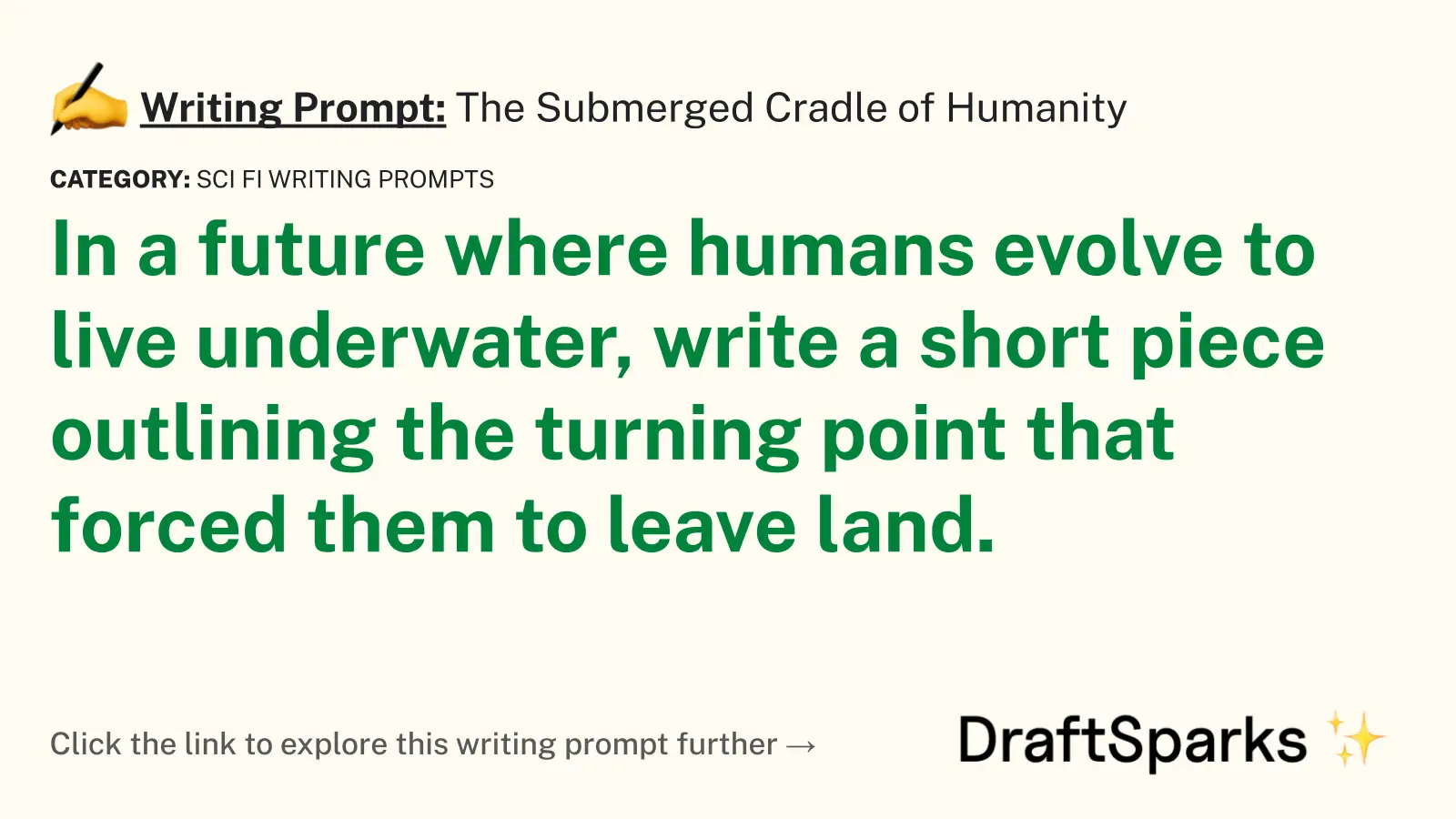
The Submerged Cradle of Humanity
In a future where humans evolve to live underwater, write a short piece outlining the turning point that forced them to leave land.
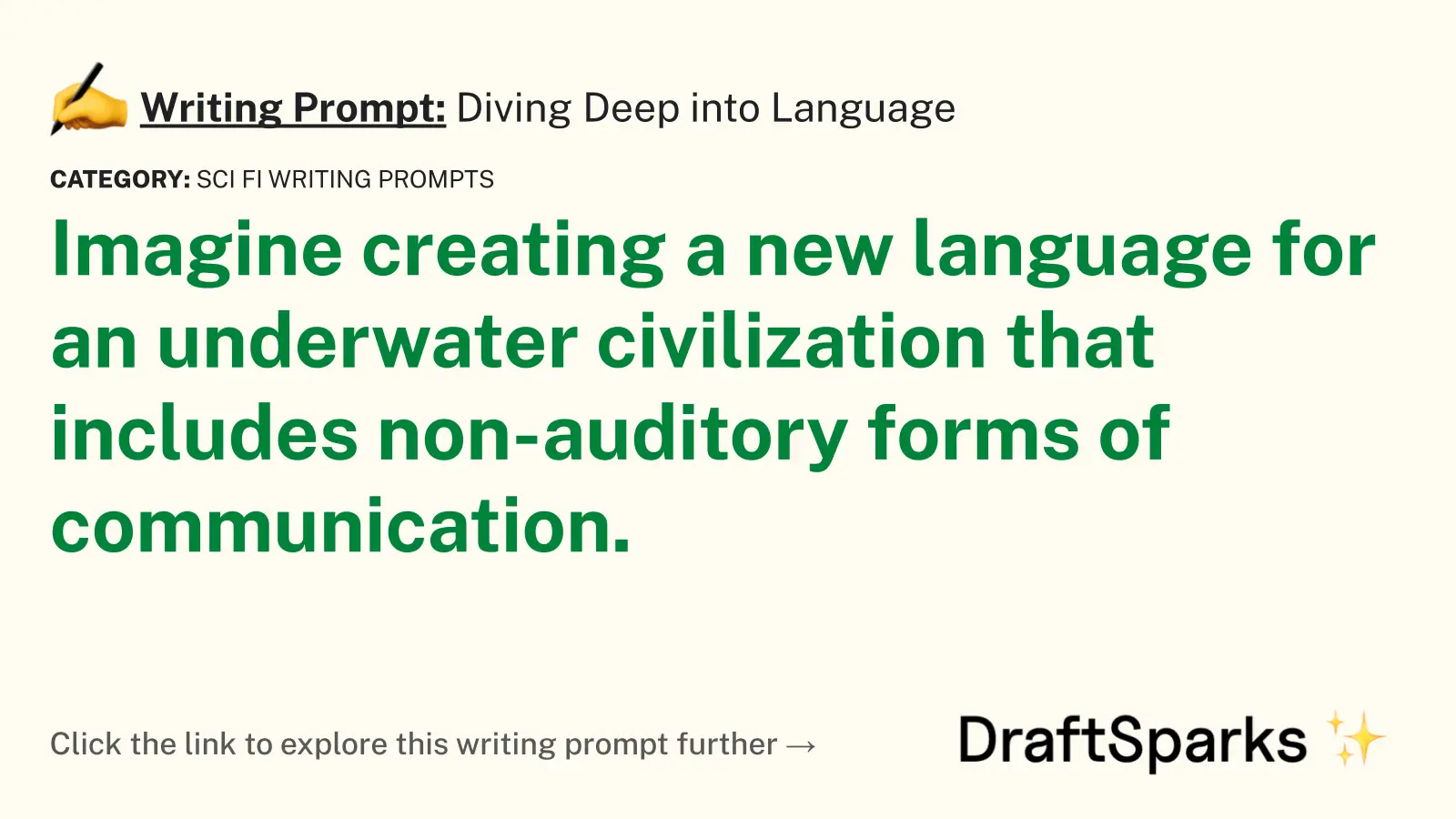
Diving Deep into Language
Imagine creating a new language for an underwater civilization that includes non-auditory forms of communication.
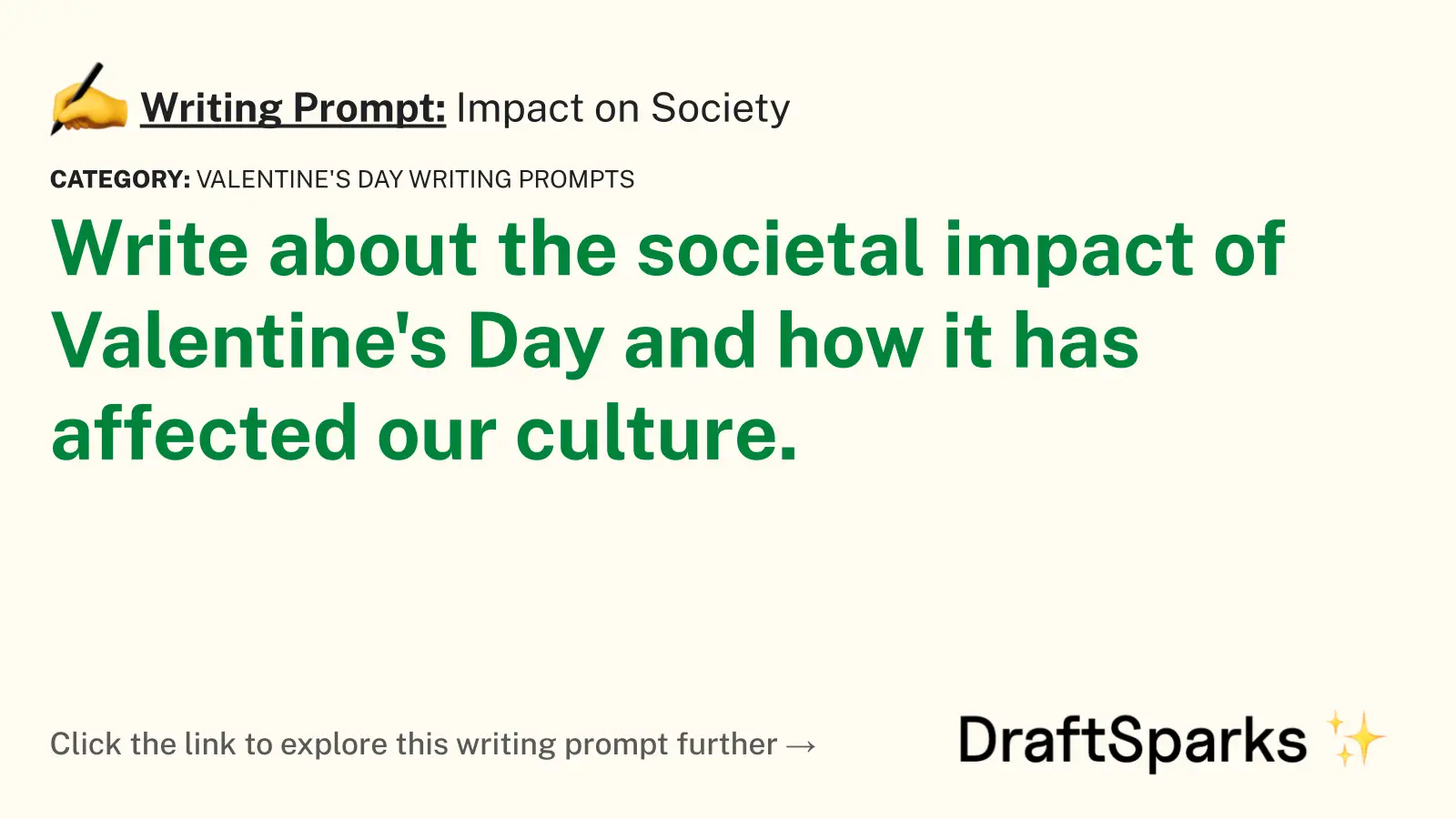
Impact on Society
Write about the societal impact of Valentine’s Day and how it has affected our culture.
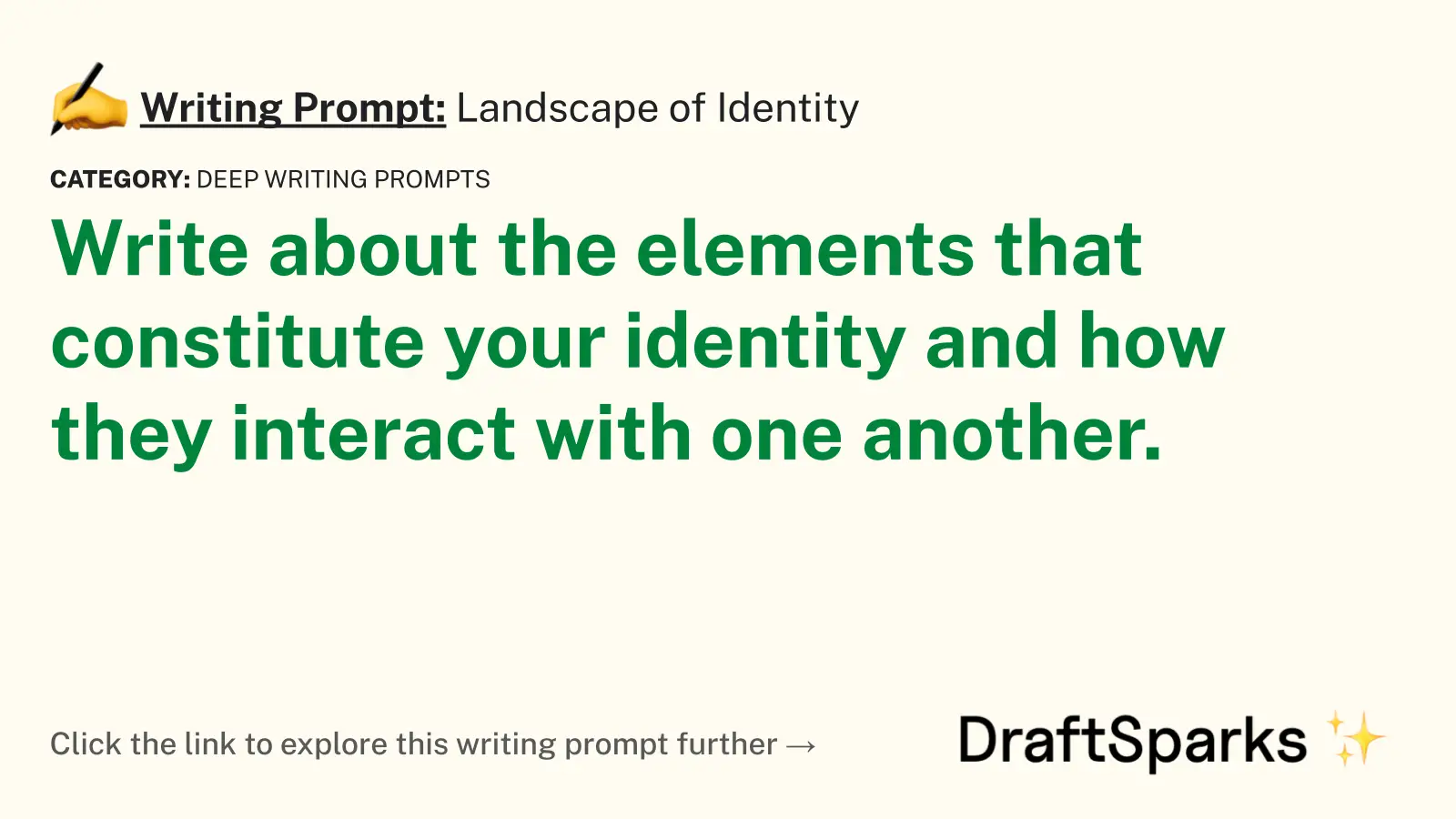
Landscape of Identity
Write about the elements that constitute your identity and how they interact with one another.
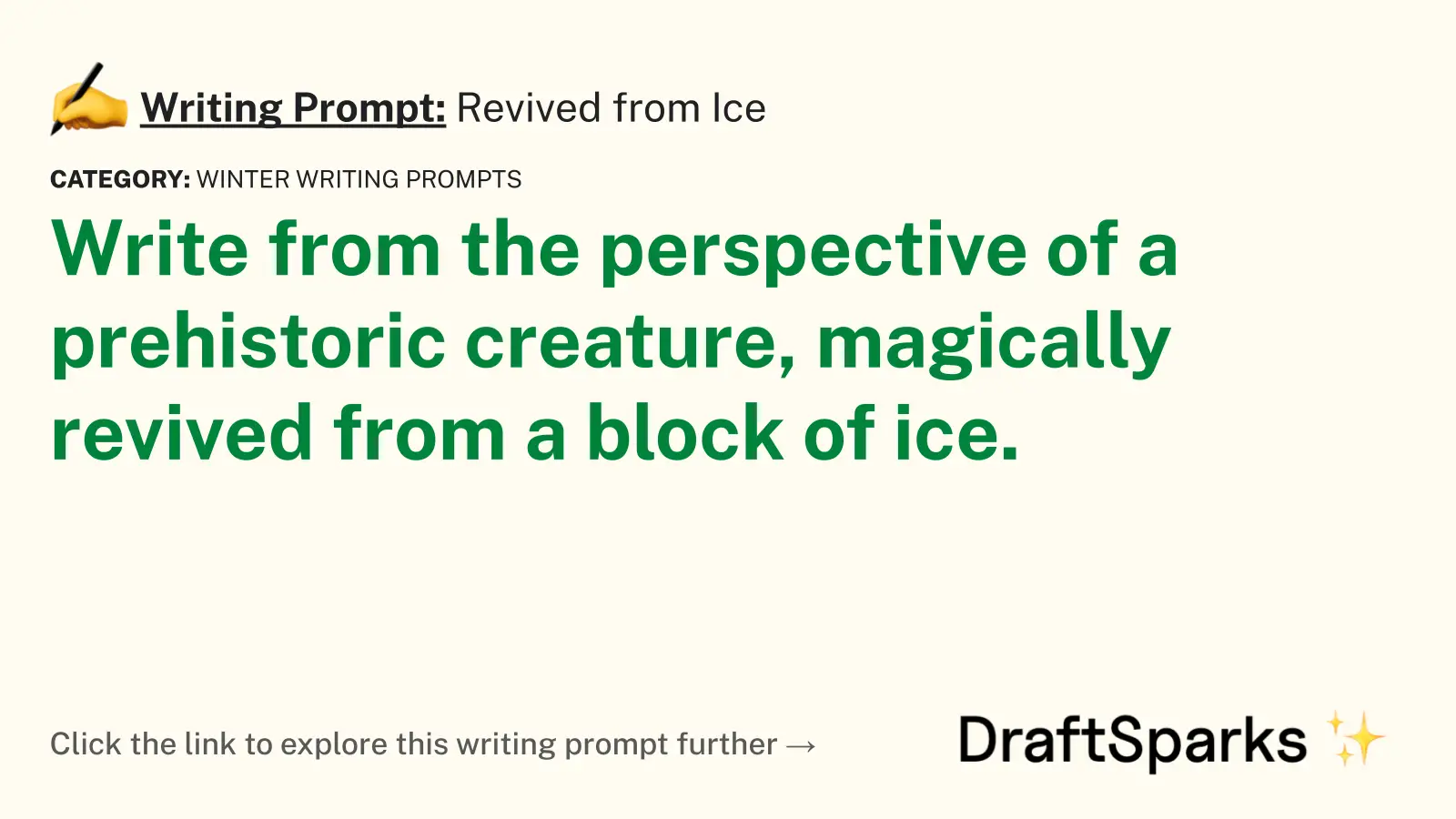
Revived from Ice
Write from the perspective of a prehistoric creature, magically revived from a block of ice.
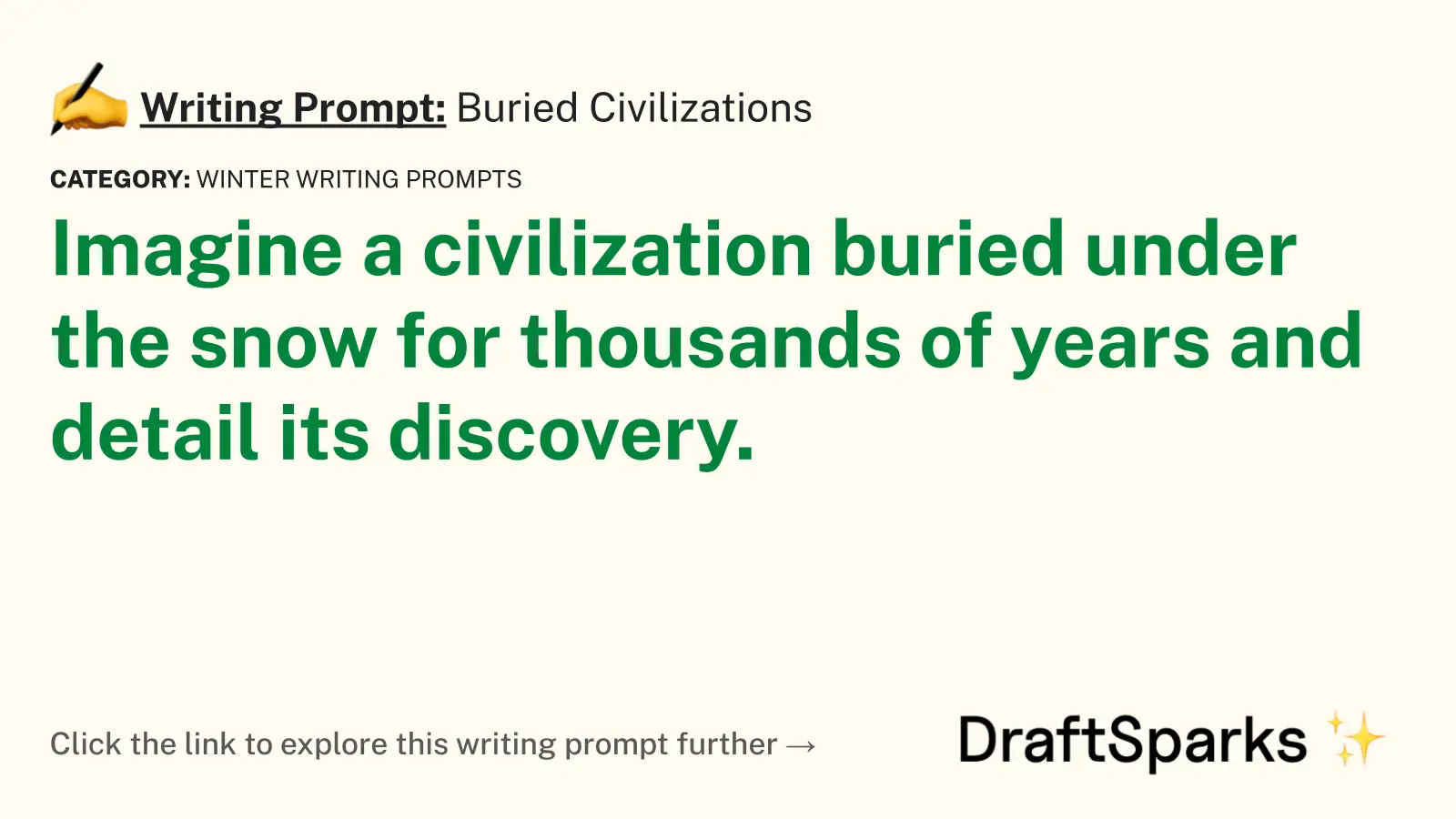
Buried Civilizations
Imagine a civilization buried under the snow for thousands of years and detail its discovery.
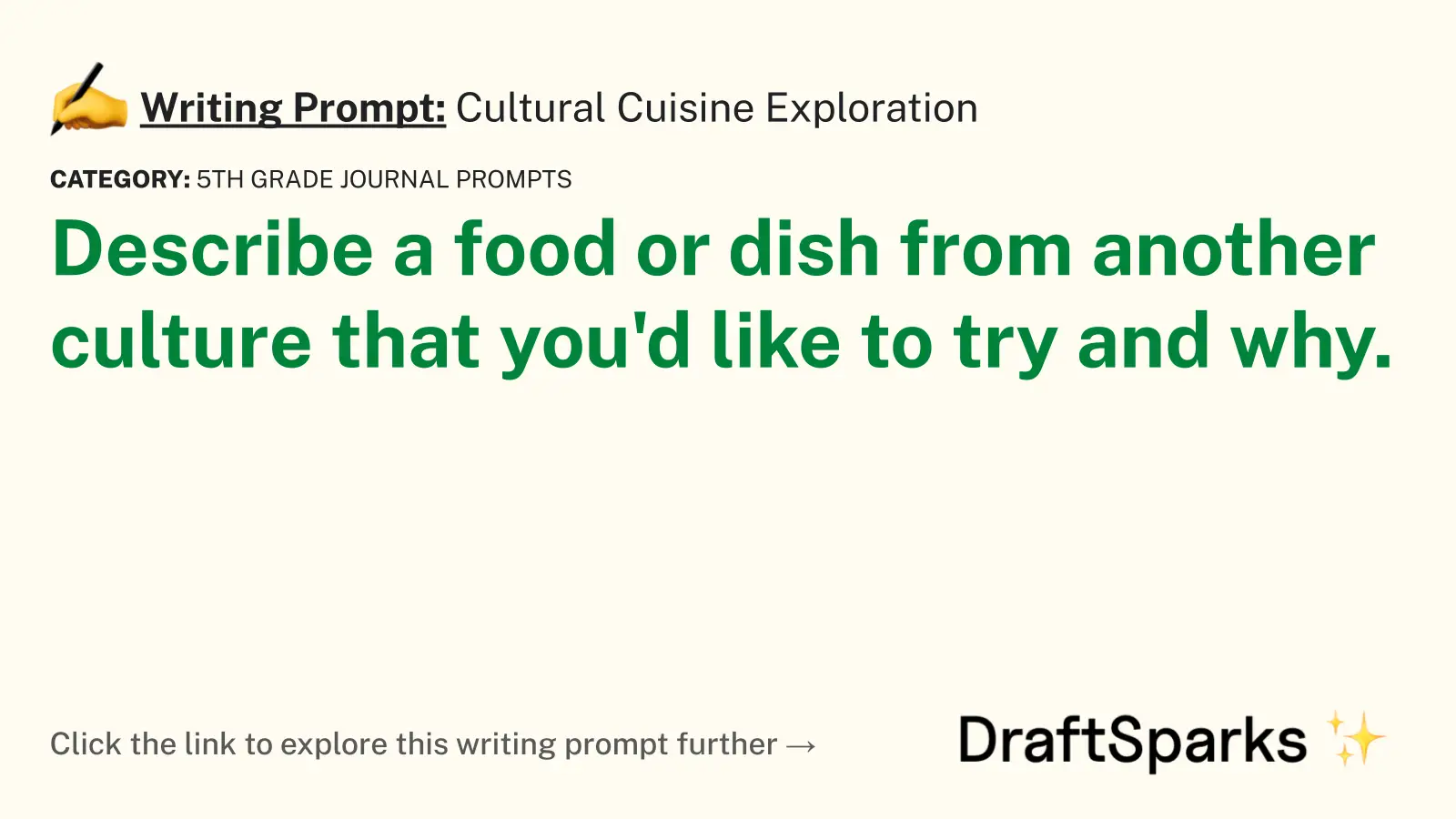
Cultural Cuisine Exploration
Describe a food or dish from another culture that you’d like to try and why.
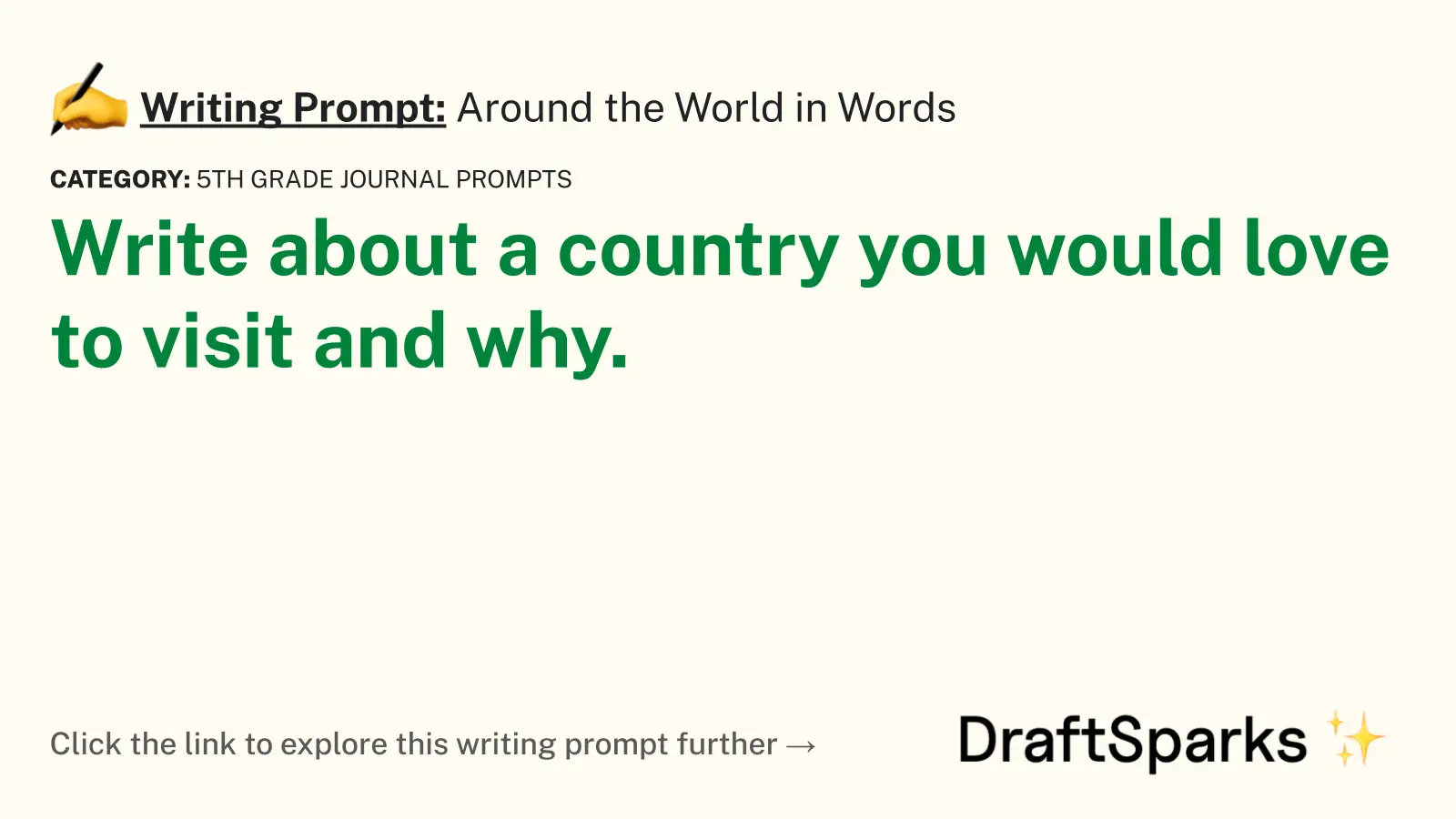
Around the World in Words
Write about a country you would love to visit and why.
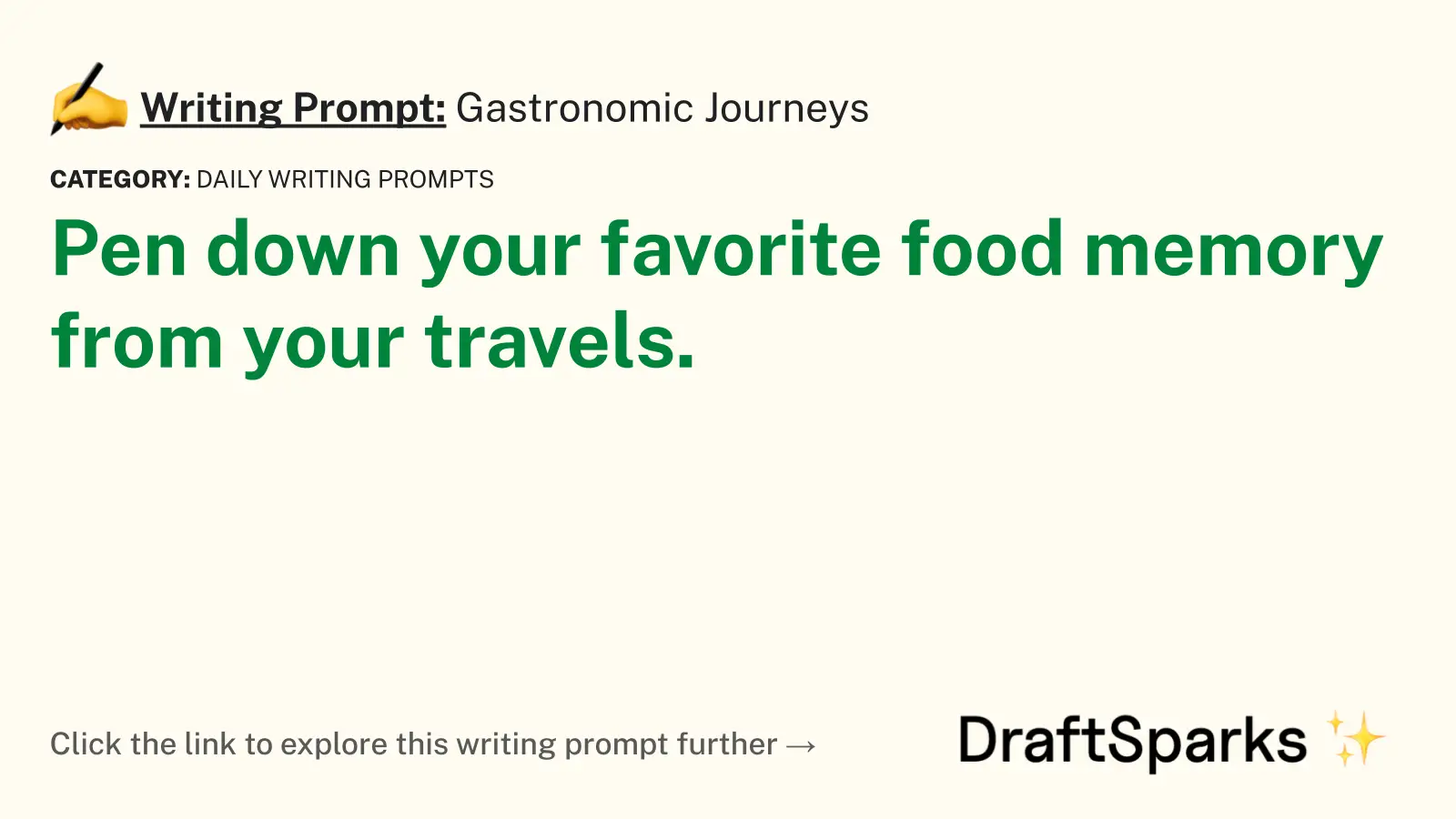
Gastronomic Journeys
Pen down your favorite food memory from your travels.
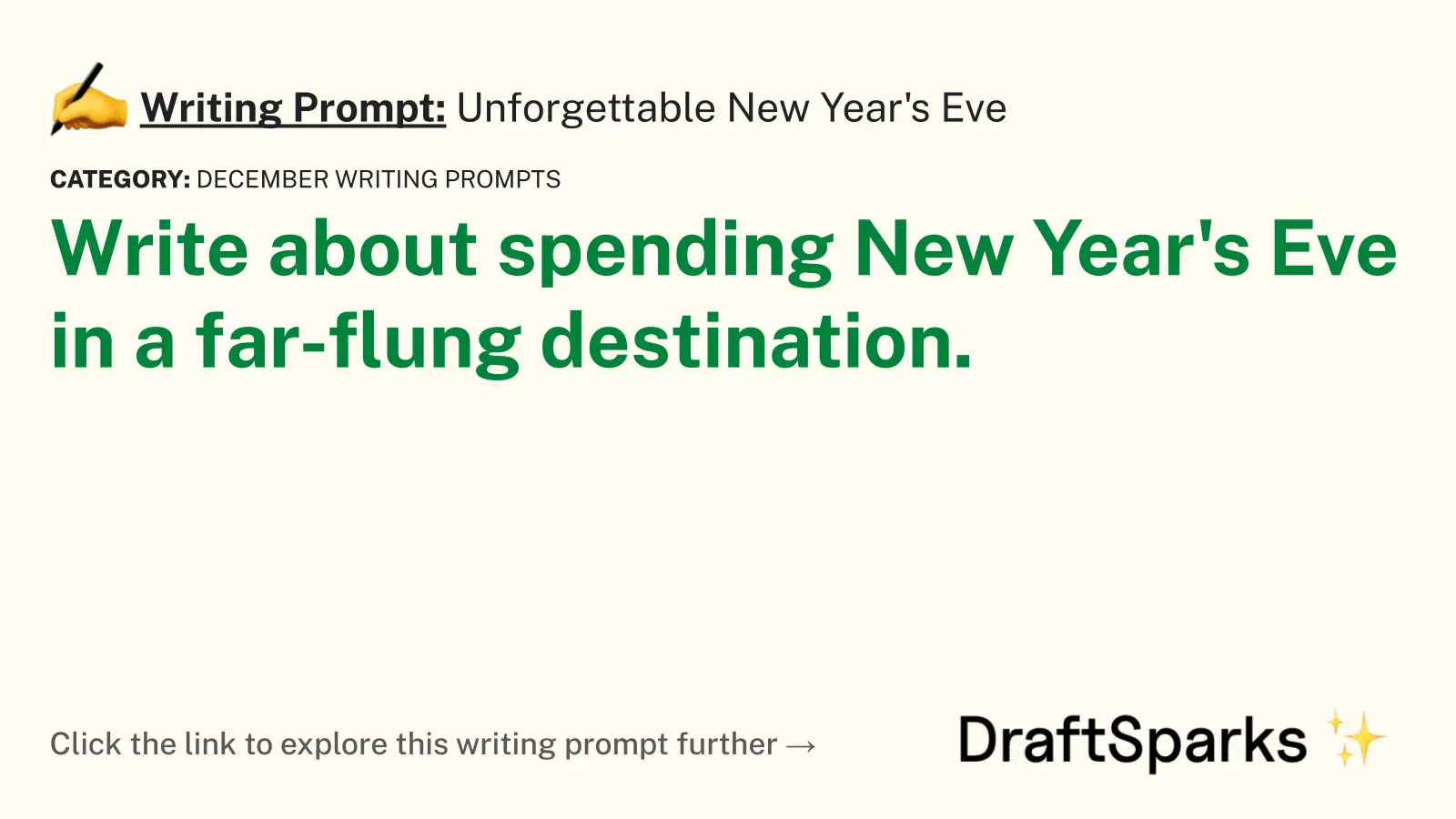
Unforgettable New Year’s Eve
Write about spending New Year’s Eve in a far-flung destination.
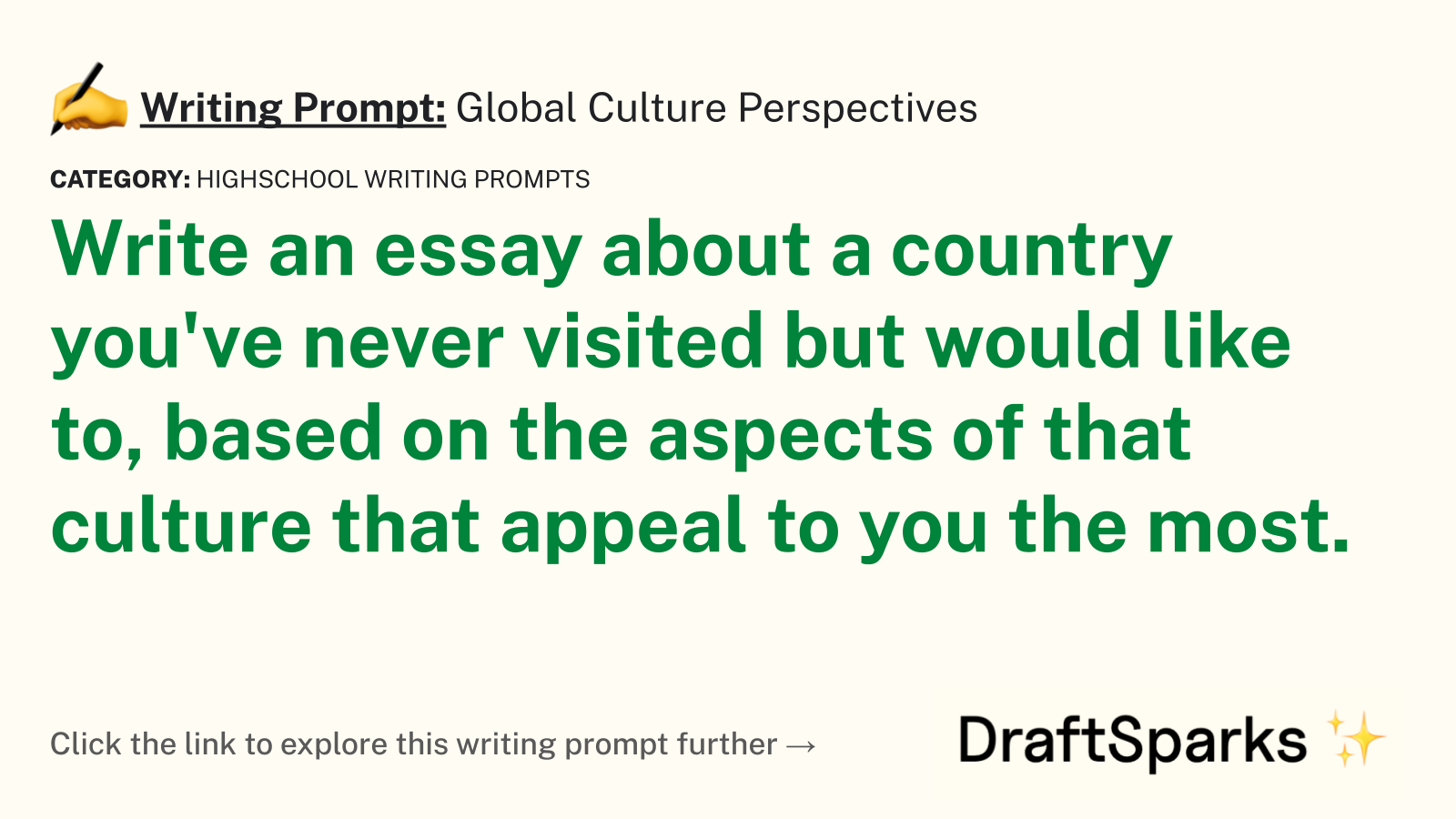
Global Culture Perspectives
Write an essay about a country you’ve never visited but would like to, based on the aspects of that culture that appeal to you the most.
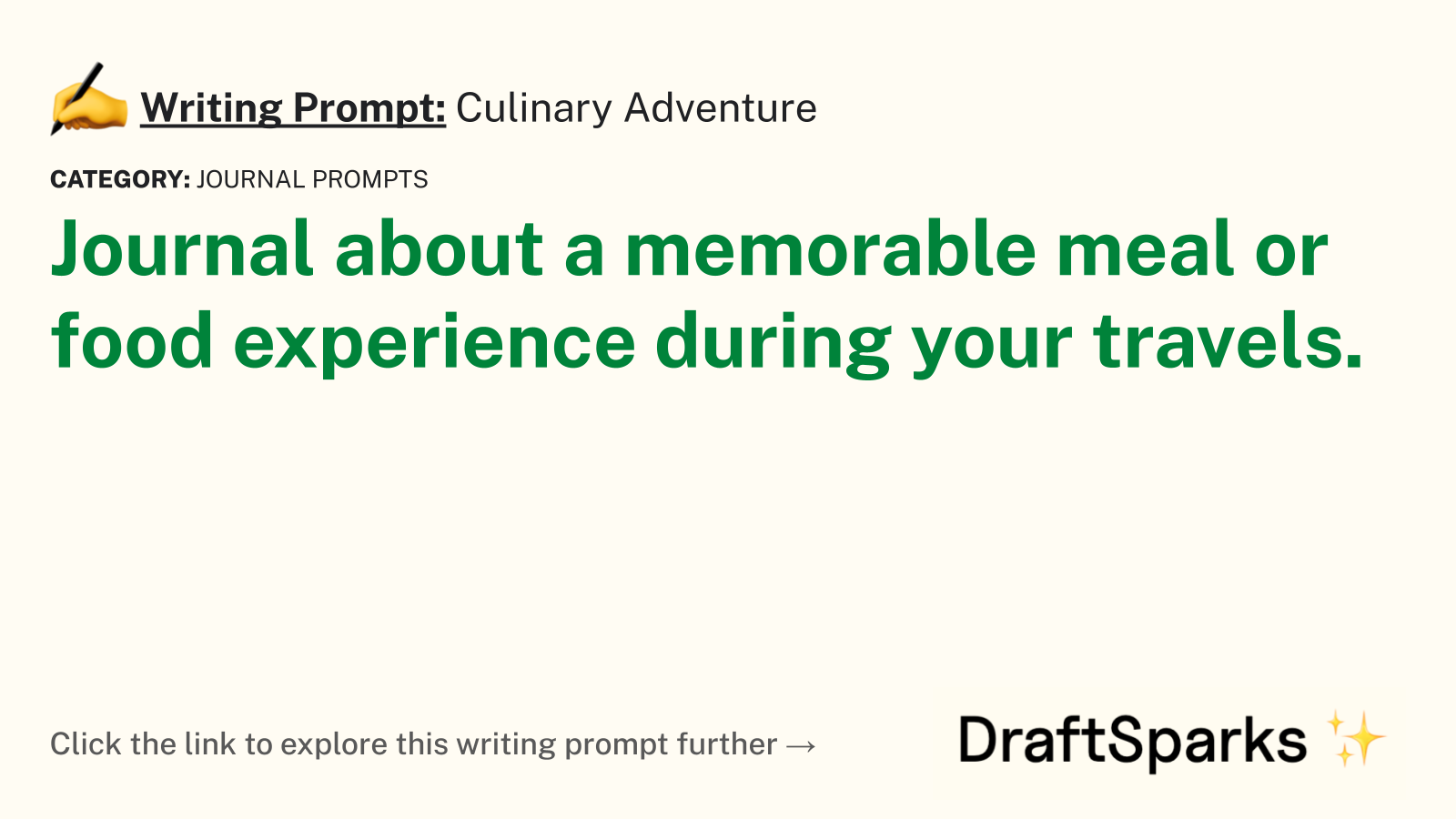
Culinary Adventure
Journal about a memorable meal or food experience during your travels.
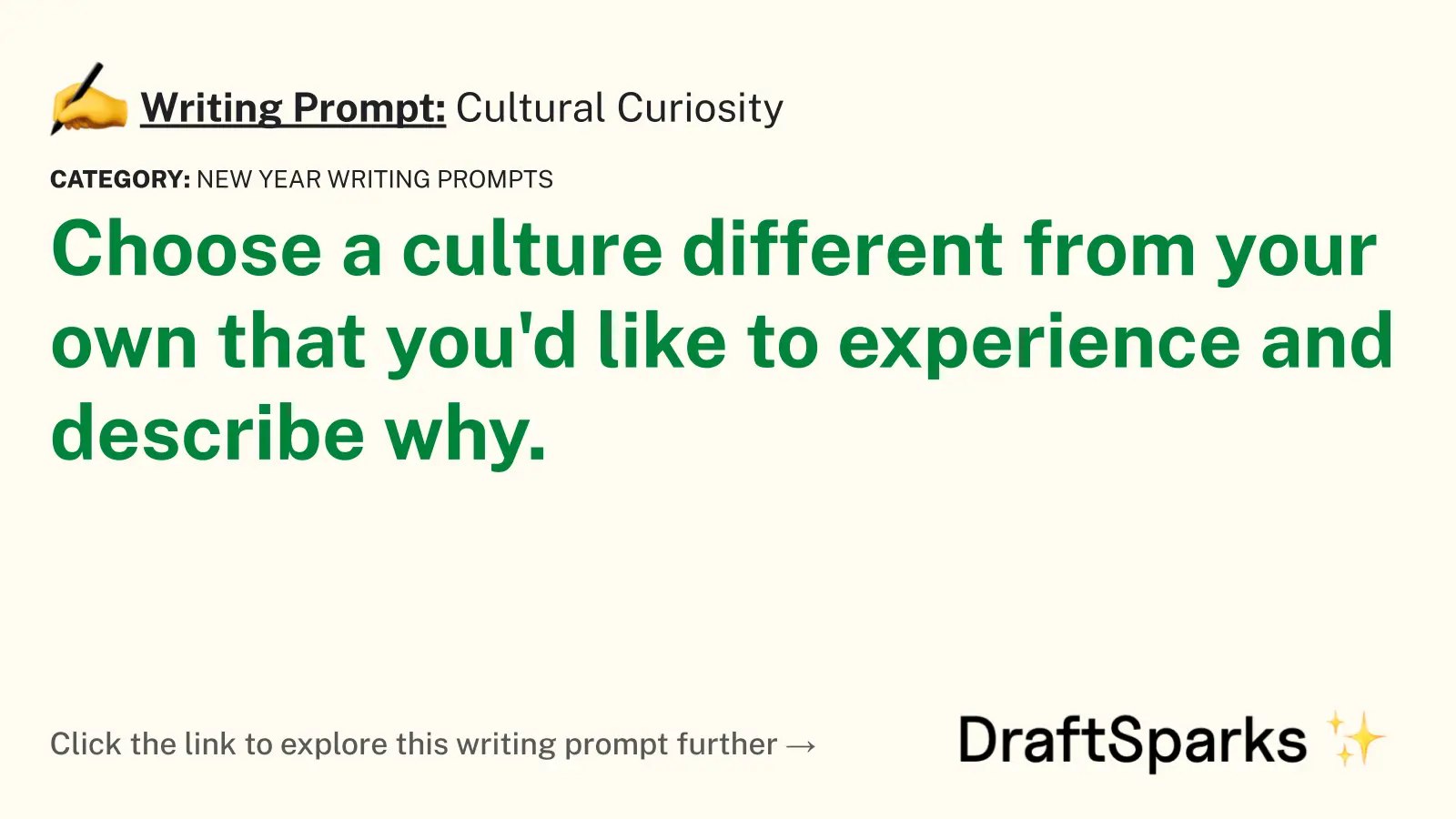
Cultural Curiosity
Choose a culture different from your own that you’d like to experience and describe why.
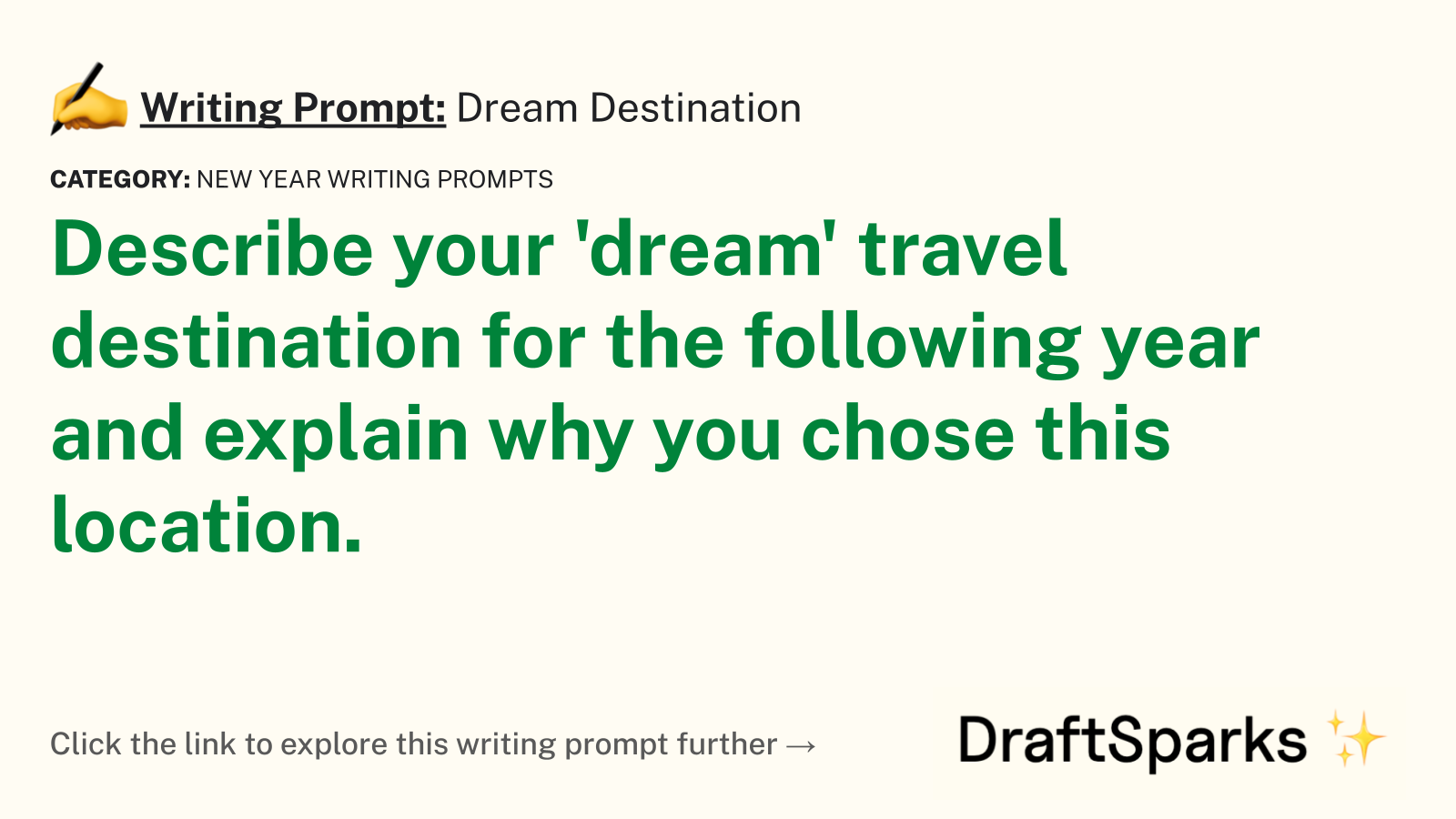
Dream Destination
Describe your ‘dream’ travel destination for the following year and explain why you chose this location.
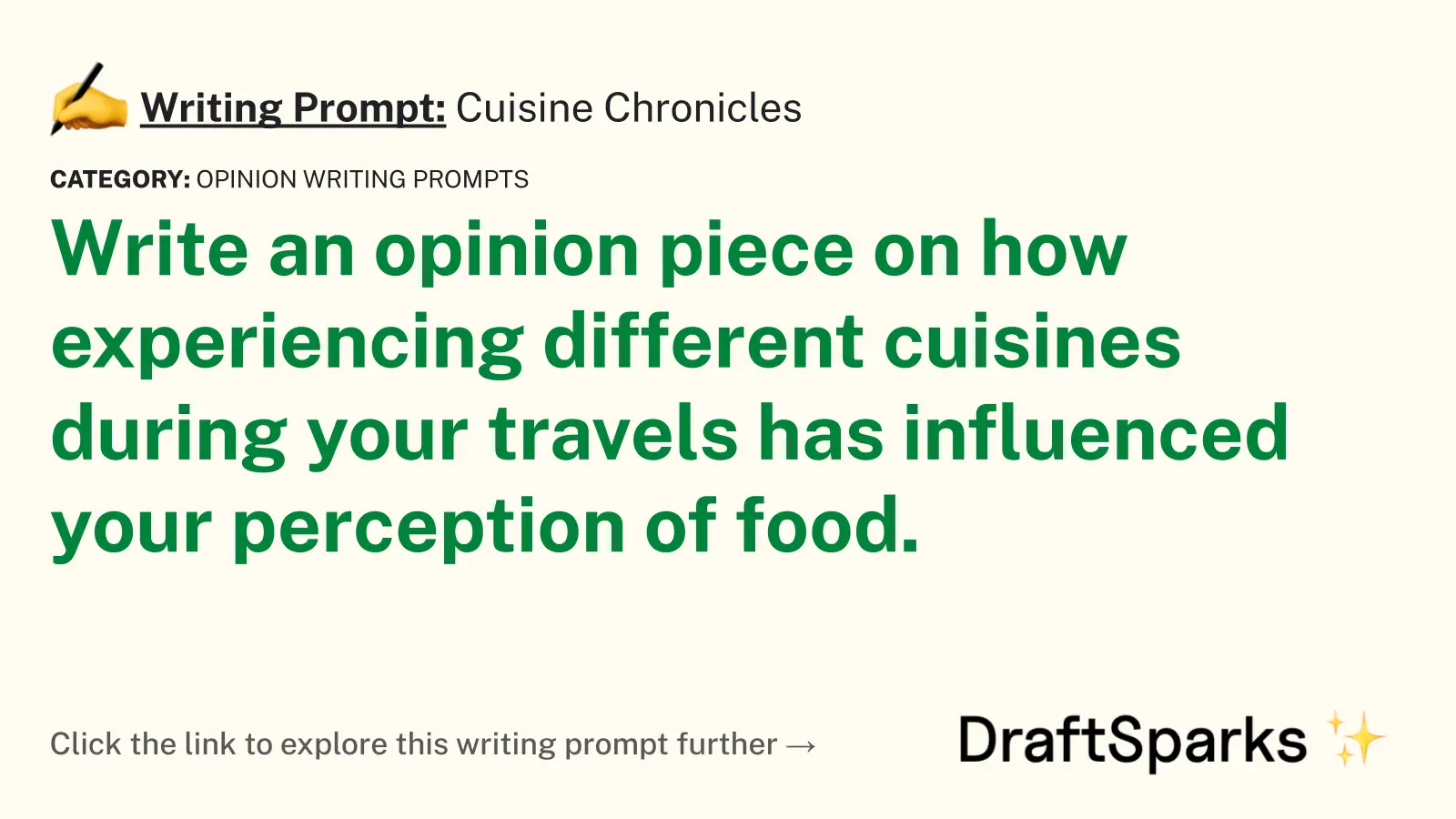
Cuisine Chronicles
Write an opinion piece on how experiencing different cuisines during your travels has influenced your perception of food.
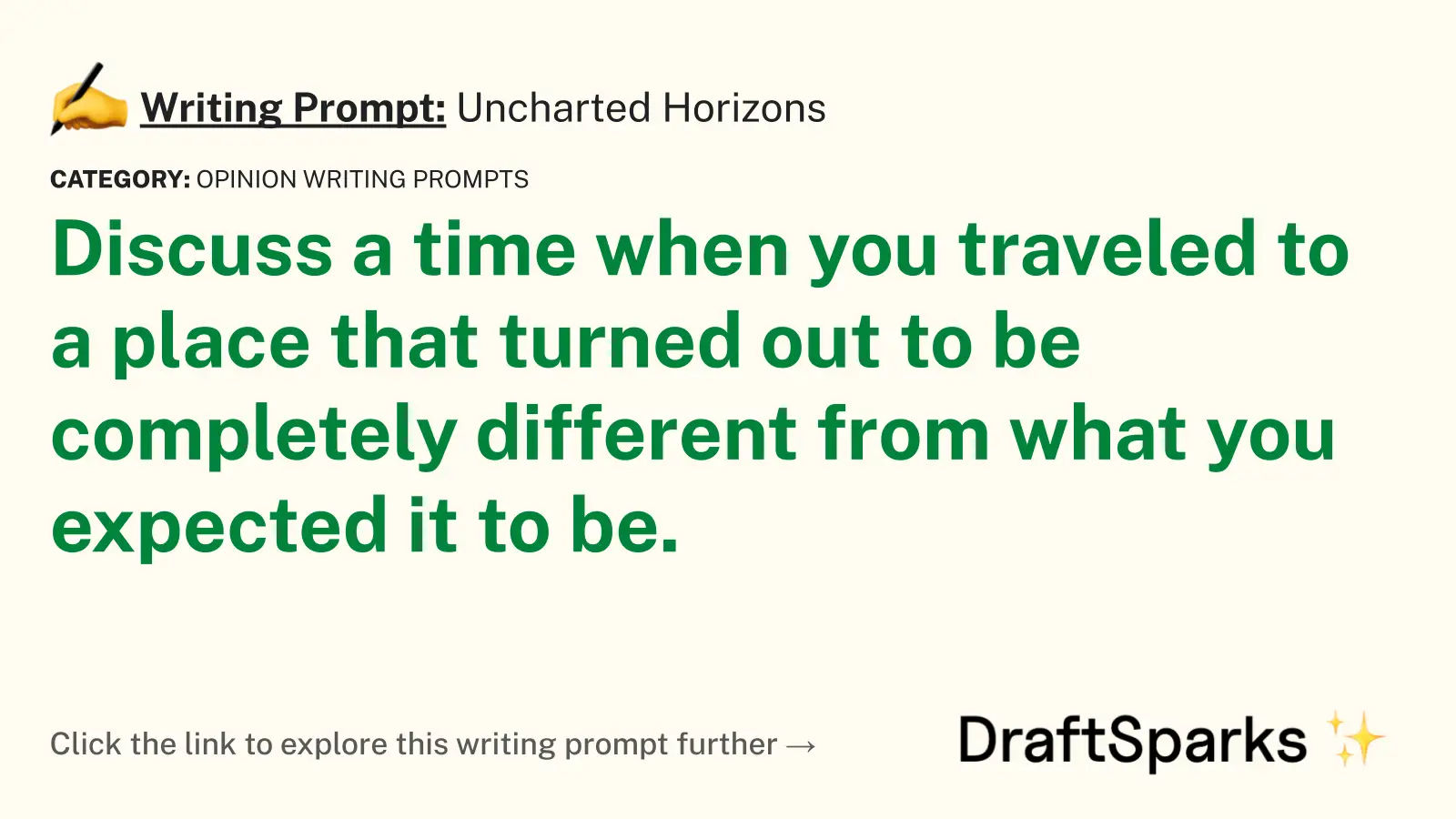
Uncharted Horizons
Discuss a time when you traveled to a place that turned out to be completely different from what you expected it to be.
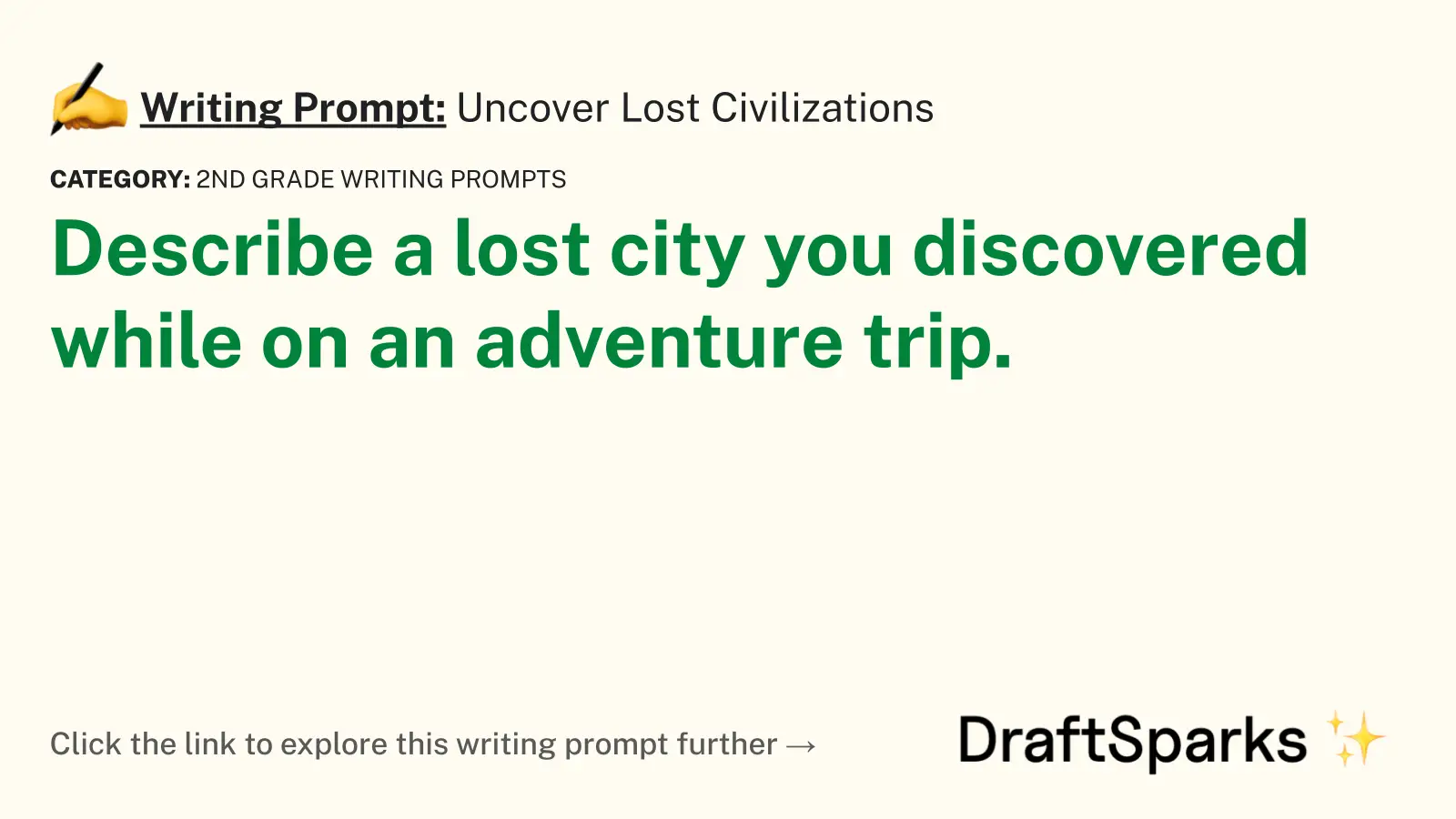
Uncover Lost Civilizations
Describe a lost city you discovered while on an adventure trip.

Cultural Contrasts
Compare and contrast your culture with one you experienced while traveling.
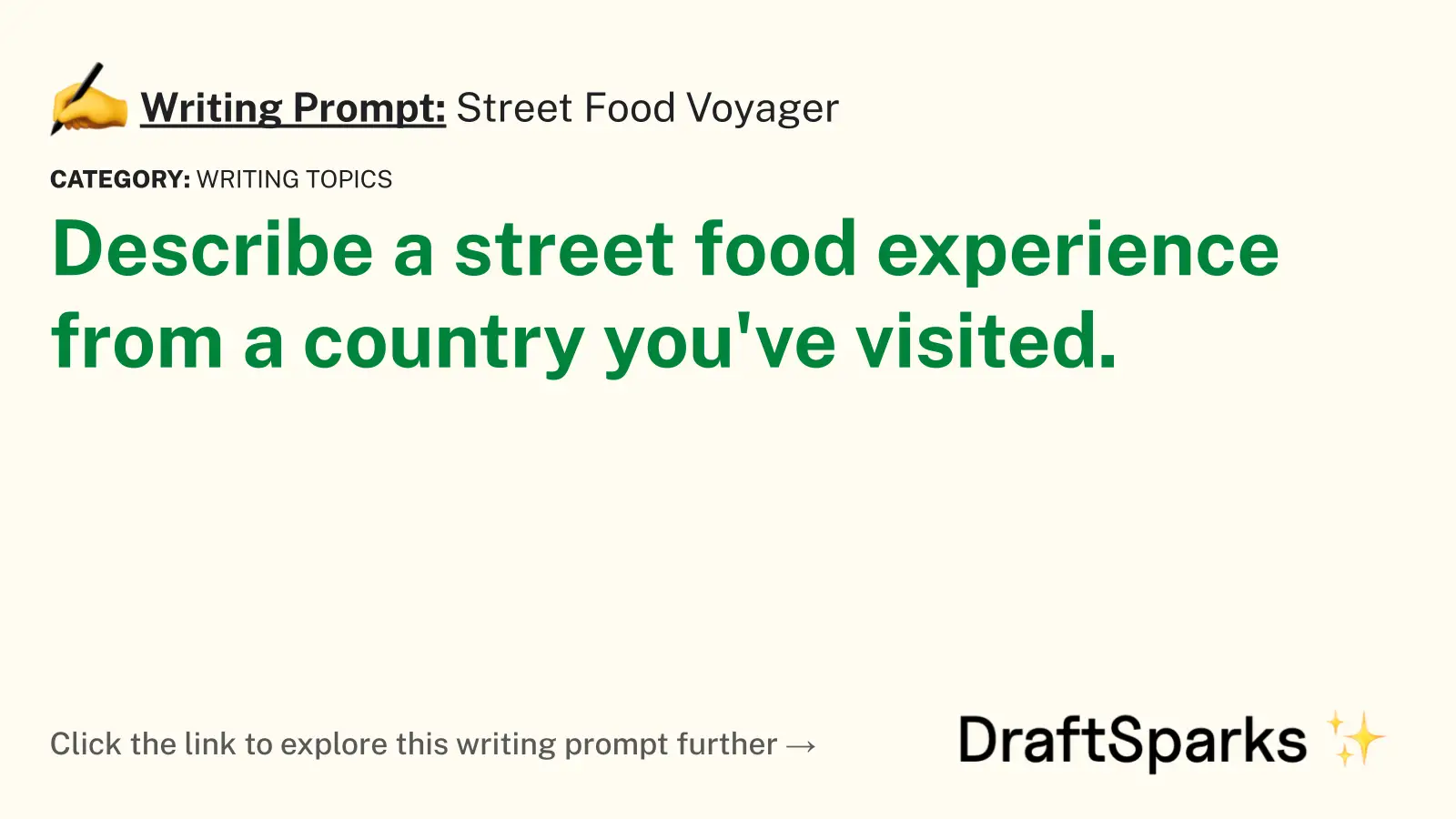
Street Food Voyager
Describe a street food experience from a country you’ve visited.
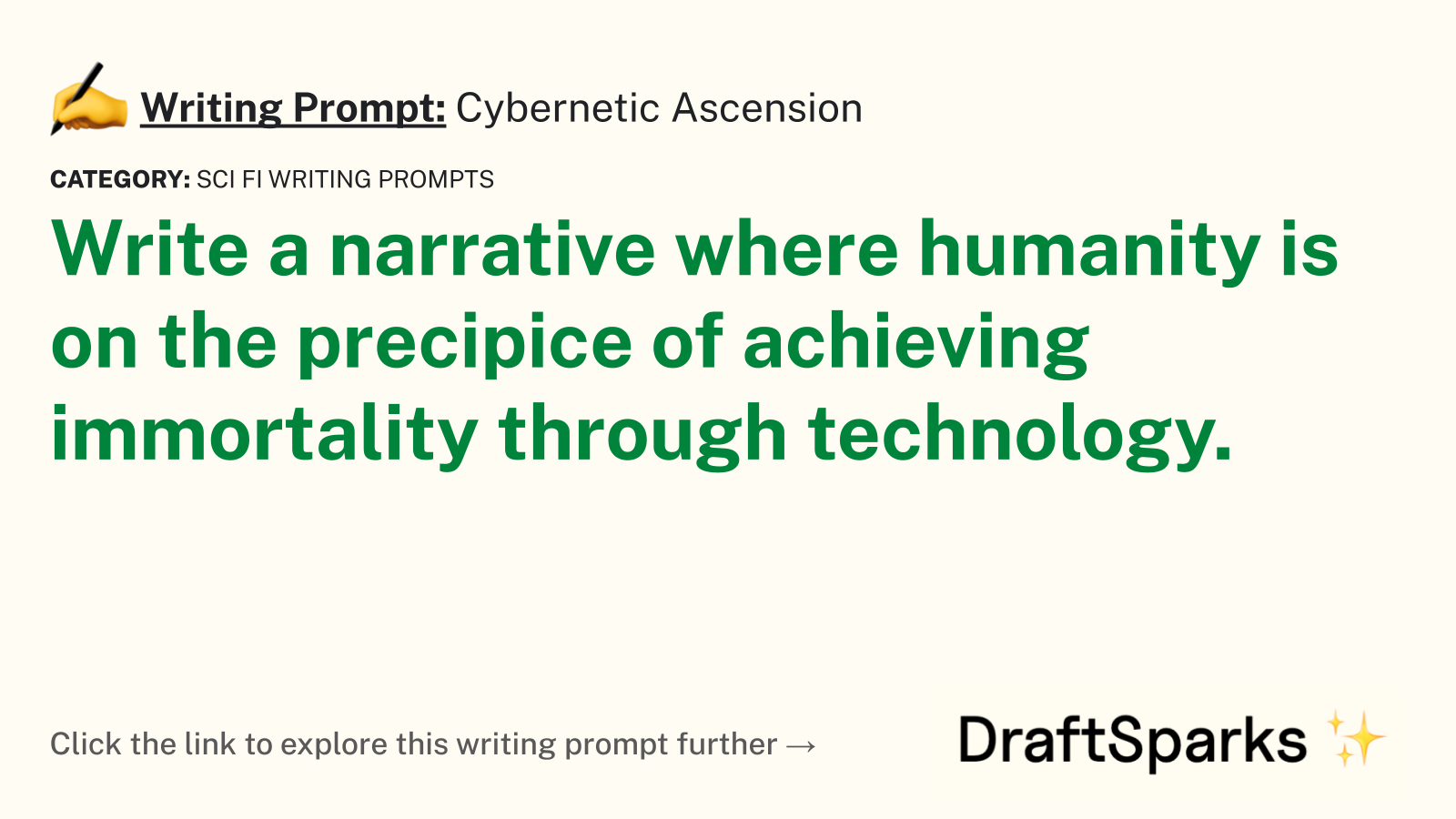
Cybernetic Ascension
Write a narrative where humanity is on the precipice of achieving immortality through technology.
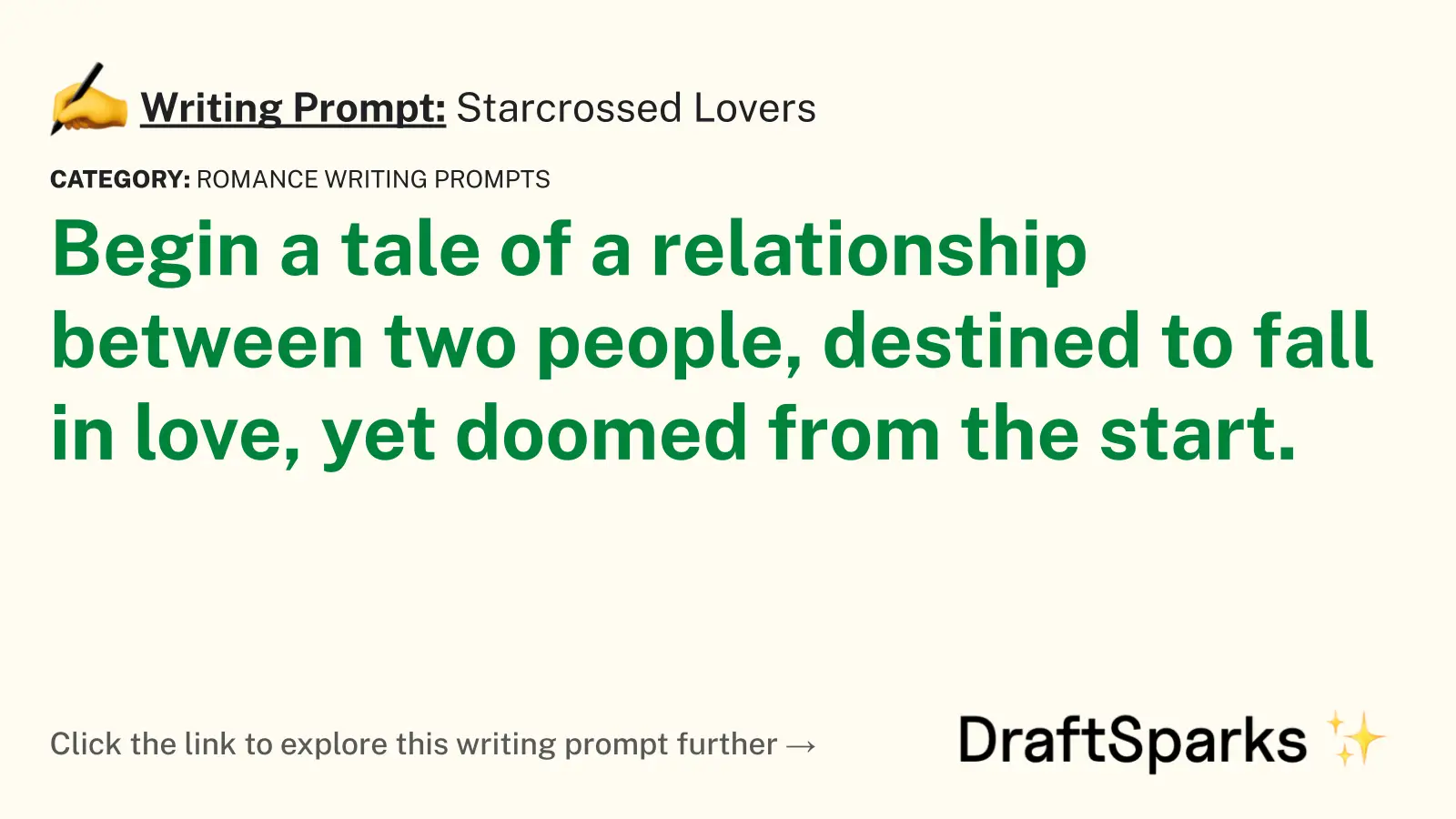
Starcrossed Lovers
Begin a tale of a relationship between two people, destined to fall in love, yet doomed from the start.
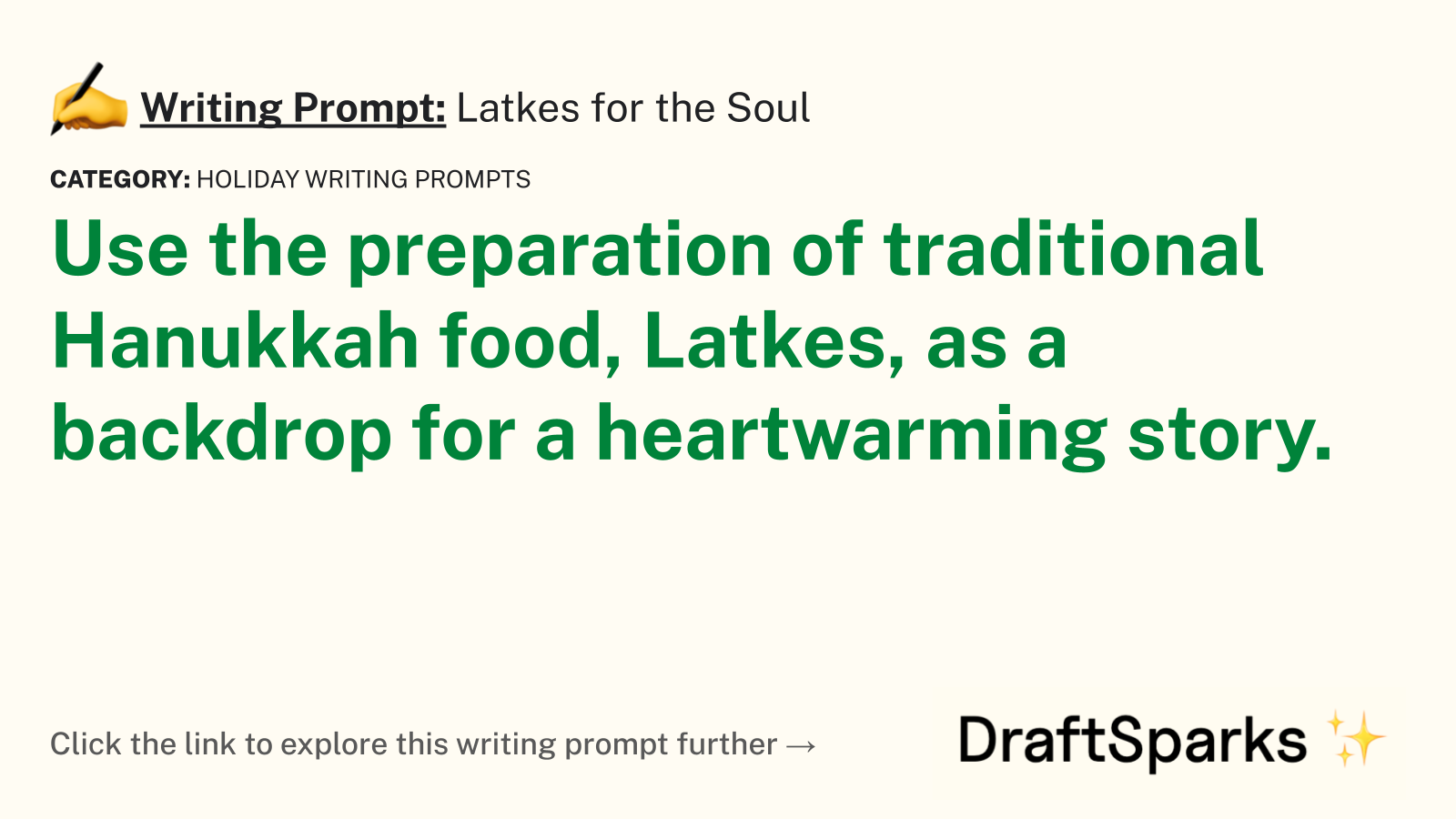
Latkes for the Soul
Use the preparation of traditional Hanukkah food, Latkes, as a backdrop for a heartwarming story.
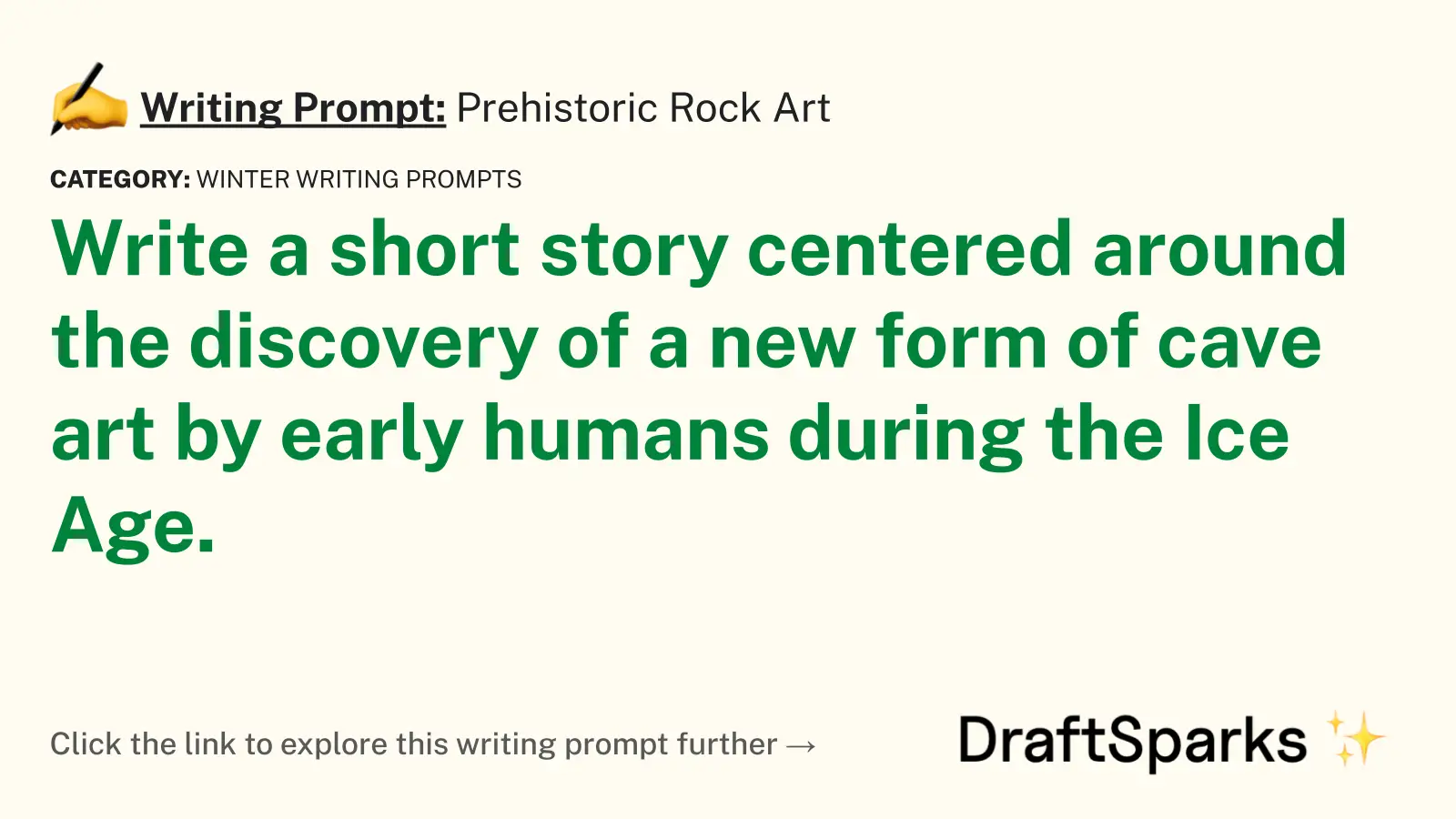
Prehistoric Rock Art
Write a short story centered around the discovery of a new form of cave art by early humans during the Ice Age.
- Skip to primary navigation
- Skip to main content
The Wordling
The Wordling - The info and tools you need to live your best writing life.
100 Creative Writing Prompts to Inspire Your Writing

With this list, you’ll never run out of story ideas again!
By Natasha Khullar Relph
Starting a new project feels like stepping into a world of endless possibilities, yet it can also be like staring into the abyss of the unknown. While the battle between a writer and their blank page is well documented, you don’t have to go to war with your creative self just to get some words on a page.
Creative writing prompts can be the answer to a blocked writer’s prayers, offering story starters and writing ideas to jumpstart your creative thinking. To aid in your efforts, we’ve put together a curated collection of 100 creative writing prompts. From thought-provoking scenarios to whimsical adventures, these prompts are guaranteed to jumpstart your writing, transport you to new worlds, and breathe life into your stories.
What is a writing prompt?
A writing prompt is a specific, often short, phrase, question, or statement designed to stimulate and inspire creative writing. Writing prompts can help you overcome writer’s block , generate new ideas, or simply get your creative juices flowing. You can use them in various forms of writing, including fiction, poetry, journaling, and essay writing, and they vary widely in their content and purpose. Some prompts are open-ended, encouraging writers to explore their thoughts and emotions freely, while others may be more specific, asking you to write about a particular topic or scenario.
Writing prompts serve as creative triggers, helping you to explore new story ideas , develop characters, or practice different writing styles. They can be a valuable tool for both beginners who need writing inspiration and more experienced writers looking to build a writing habit or become better writers through a regular writing practice .
100 creative writing prompts for writers
Fiction writing prompts.
Whether you’re writing adult novels or children’s books, these fiction and short story writing prompts will inspire new worlds and scenarios for your characters to play in as you write your first draft .
- Write a modern-day fairy tale set in a bustling metropolis . Your story should feature a main character who stumbles upon a hidden, magical world within the city. Explore how this discovery changes their life and the challenges they face as they navigate between the ordinary and the extraordinary in the heart of the urban jungle.
- Write a story in which the main character discovers a superpower , but it comes with a mysterious and unexpected side effect. Explore the challenges they face in harnessing their newfound ability while dealing with the consequences of the side effect. How do they adapt and ultimately use their power for good or ill?
- Imagine you stumble upon an ancient, dusty time traveler’s journal in an antique shop. As you flip through its pages, you realize it contains detailed accounts of the past, present, and future. Write a story about the discoveries you make within the journal and how they shape your life and decisions.
- In a post-apocalyptic society, a group of survivors discover a hidden library containing books from every era. Describe their journey to preserve knowledge, as they grapple not only with the challenge of safeguarding these precious texts but also with the moral dilemmas and conflicts that arise when they must decide who has access to this invaluable resource in a world defined by scarcity.
- In a world where people’s dreams become real, a person with chronic nightmares suddenly possesses unimaginable power , forcing them to confront the fine line between their inner demons and the extraordinary possibilities that now lie at their fingertips.
- Write a story set in a future where civilians can take vacations to outer space . Describe the adventures, challenges, and experiences of a family or group of friends as they embark on a journey beyond the earth’s atmosphere for the first time.
- Craft a science fiction tale set in a world where technology has reached unimaginable heights , but human emotions and relationships remain unchanged. Explore how advanced AI, virtual reality, and futuristic inventions impact the characters’ lives, love, and the essence of what it means to be human.
- Write a story that begins with a group of childhood friends building a secret treehouse in the woods. Years later, they reunite as adults to discover that their beloved hideaway holds a mysterious and enchanting secret that will change their lives forever.
- Write a story set in a small American town during the 1950s, capturing the essence of post-war America and the lives of its diverse residents as they navigate love, ambition, and the pursuit of the American Dream.
- Imagine a future where Earth faces an impending catastrophic event, and humanity has initiated a mission to colonize a distant planet . Write a story from the perspective of one astronaut on this interstellar journey, capturing the emotions, challenges, and sense of hope as they leave behind their home planet and embark on a journey into the unknown.
- Your favorite book has always been a cherished escape, but one day, as you open its pages, you find yourself transported into the world within . Write a story about your adventures in the world of your favorite book, exploring the characters, places, and challenges you encounter along the way.
- Imagine a world where everyone knows the exact date of their last day on Earth . Write a story about a person living through their last day, exploring how they choose to spend it and the emotions, reflections, and last moments they experience as they prepare to say their farewells.
- Set your story in a future where a society of advanced learners, equipped with a unique ability to acquire new skills and knowledge rapidly , faces a mysterious threat. Write about their quest to unravel the enigma, the extraordinary challenges they encounter, and how their insatiable thirst for learning becomes their greatest asset in this high-stakes adventure.
- Write a story in which each chapter shifts between the first-person point of view of two characters who have drastically different perspectives on the same events. Explore how their contrasting viewpoints shape the narrative and challenge the reader’s understanding of the story’s central conflict.
- Imagine a world where gods exist but are not all-powerful . Write a story about a god who, despite their divine status, faces a unique and formidable challenge that forces them to confront their limitations and question the very nature of godhood.
- Write a story set in a world where time travel is possible but limited to a single day . Describe the adventures and dilemmas of a character who can only revisit or change events in their life within the confines of that single day. What choices do they make, and how does it impact their future and the world around them?
- In a near-future world, video games have evolved to become the primary form of communication and competition . Write a story where a skilled gamer is recruited for a high-stakes mission within a virtual reality game, blurring the lines between the digital and physical worlds. Explore the challenges, alliances, and ethical dilemmas they face as they navigate this immersive and unpredictable gaming landscape.
- Imagine a writer who discovers an ancient, enchanted book that can bring its characters to life and grant them free will. Write a new story in which the writer and the characters they create must work together to navigate the challenges and consequences of their shared existence, blurring the lines between creator and creation.
- Imagine a character whose favorite things are slowly disappearing from their life one by one . Write a story about their journey to hold on to the essence of what they love most, the challenges they face in preserving their cherished favorites, and the unexpected discoveries they make along the way.
- Two strangers find themselves washed ashore on a deserted island after a shipwreck . They have no memory of their past lives and must work together to survive. Write a story about their journey of discovery, resilience, and the bond that forms as they navigate the challenges of the deserted island.
- Your favorite holiday has always been a time of joy and celebration, but this year, it’s under threat of cancellation. Write a story about the determined efforts of a group of individuals who come together to save and rekindle the spirit of their favorite holiday , facing unexpected challenges and finding new meaning in the process.
- Write a story set in a quaint English village, where an eccentric resident claims to have discovered a hidden portal to another dimension in their garden shed . As rumors spread and curiosity grows, explore the adventures and mysteries that unfold when the villagers decide to investigate this bizarre claim and step into the unknown.
- Your favorite Tumblr blog suddenly starts posting cryptic messages that seem to predict events in your life . Write a story about the growing intrigue and obsession as you try to uncover the identity of the blog’s enigmatic author and the source of their uncanny knowledge.
- Your favorite season has always been winter, but this year, it never ends . Write a story about the challenges, wonders, and unexpected consequences that arise as your world becomes perpetually blanketed in snow and ice, and you must navigate the eternal winter that now defines your life.
- Write a story about a high school student who stumbles upon a mysterious diary hidden in the school library . The diary seems to contain entries from a former student who experienced extraordinary and supernatural events during their time at the school. As the current student reads the diary, they begin to notice strange occurrences happening around them, blurring the line between reality and the paranormal.
Nonfiction writing prompts
Here’s a selection of nonfiction writing prompts to help you delve into your own experiences , share your expertise, and craft powerful narratives rooted in the world around us.
- Explore the concept of “utopia” and “dystopia.” Write an analytical essay comparing and contrasting two fictional utopian or dystopian worlds from literature, film, or popular culture, and discuss their societal ideals, flaws, and relevance to contemporary society.
- Consider a unique or unusual skill or hobby you possess , such as extreme knitting or competitive tree climbing. Write a how-to guide or tutorial that explains the fundamentals and intricacies of this skill, offering practical advice and personal anecdotes to inspire others to explore it.
- Take a nature walk or visit a local park, and choose a specific tree as your subject . Write a detailed and poetic nature essay that describes the tree’s appearance, its role in the ecosystem, and the stories it could tell if it could speak.
- Choose an everyday object that holds special significance to you , such as a childhood toy or a family heirloom. Write a detailed essay exploring the memories, emotions, and stories connected to this object, and how it has shaped your identity.
- Imagine you have the opportunity to interview your future self 10 years from now . Draft a list of thought-provoking questions you would ask to gain insights into your future experiences, decisions, and reflections.
- Select a word from a language other than your own that encapsulates a feeling or concept you find intriguing but that has no direct translation in your language. Write an essay exploring the word’s meaning, cultural context, and the emotions it evokes, reflecting on the beauty of language and its ability to convey complex ideas.
- Imagine you are given the chance to host a dinner party with five historical figures , living or deceased, from any time period. Create a detailed guest list, describe the menu, and write an essay outlining the topics of conversation you would explore with your eclectic group of guests.
- Write a personal essay about a specific sound or noise that holds deep meaning to you . Explain why this sound resonates with you, its significance in your life, and the emotions or memories it triggers.
- Consider a peculiar or unusual museum exhibit you’ve encountered or would like to visit . Write an engaging review or critique of the exhibit, examining its historical, artistic, or cultural value, and sharing your insights and reactions as a visitor.
- Think about an unsolved mystery, conspiracy theory, or urban legend that has always intrigued you . Write an investigative essay delving into the facts, theories, and speculations surrounding this enigma, presenting your own analysis and conclusions.
- Explore the concept of “lost cities” or “hidden civilizations.” Write an investigative essay about a real or legendary lost city, such as Atlantis, discussing the historical evidence, theories, and mysteries surrounding its existence and disappearance.
- Imagine you have the ability to witness and document a day in the life of a famous historical figure or celebrity of your choice. Write a detailed and immersive diary entry that captures their experiences, thoughts, and emotions on this hypothetical day.
- Reflect on the idea of “space tourism” becoming a reality in the near future . Write an opinion piece discussing the ethical, environmental, and cultural implications of commercial space travel and colonization.
- Select an everyday object or phenomenon, such as rain, a traffic light, or a pencil , and write an in-depth exploration of its history, evolution, and societal impact. Share surprising facts and anecdotes that shed new light on this seemingly ordinary subject.
- Write an i n-depth profile of a local unsung hero or community leader who has made a significant impact on your town or neighborhood. Share their story, accomplishments, and the lasting effects of their work.
- Explore the concept of “found family.” Write a personal essay reflecting on the importance of the friendships and relationships you’ve built with individuals who may not be biologically related but have become like family to you.
- Consider the phenomenon of life hacks and practical tips shared on the internet. Write a guide or compilation of your favorite life hacks, along with personal anecdotes of how they’ve improved your daily life.
- Reflect on the concept of digital nostalgia. Write an essay about the emotional connections people form with digital content, such as video games, social media, or online communities, and how it shapes their sense of identity and belonging.
- Explore the world of extreme sports or unconventional hobbies. Write a feature article about individuals who engage in activities like base jumping, extreme ironing, or underwater pumpkin carving, and delve into their motivations and experiences.
- Imagine you have the opportunity to curate an art exhibition featuring the work of artists from different time periods and backgrounds . Describe the themes, connections, and narratives that tie these diverse artworks together.
- Write a reflective essay about your personal journey with mental health , highlighting a specific turning point or moment of insight that led to a deeper understanding of your own well-being. Discuss the strategies, resources, or support systems that have helped you on this path and how your experience might offer inspiration or guidance to others facing similar challenges.
- Explore the cultural and personal significance of your favorite food . Write an essay that delves into the history, traditions, and memories associated with this dish, and how it has become a symbol of comfort, celebration, or connection in your life.
- Create a comprehensive FAQ (Frequently Asked Questions) document for your own life , highlighting the questions people often ask you about your experiences, beliefs, or expertise. Write detailed and thoughtful responses to these questions, providing insights into your unique perspective and experiences. Reflect on how compiling this FAQ helps you understand the common themes and curiosities that surround your life and the impact they have on your relationships and identity.
- Explore the concept of “first days” in human history . Write a historical analysis that delves into the pivotal first days of significant events, discoveries, or eras, such as the first day humans walked on the moon, the first day of the Industrial Revolution, or the first day a groundbreaking scientific theory was proposed.
- Imagine you have the ability to observe and document the everyday life of an individual from a completely different culture or time period. Write a descriptive essay that vividly portrays the daily rituals, customs, and experiences of this person, highlighting the contrasts and similarities between their everyday life and your own.
Journal prompts
These prompts are designed to encourage self-discovery, mindfulness, and the art of capturing the essence of your life’s moments on paper. Use them for directed journaling or as part of your Morning Pages practice .
- Choose an object in your immediate environment, such as a book, a plant, or a piece of artwork. Write a journal entry from the perspective of that object , describing its history, observations, and the emotions it might feel as it silently witnesses your life.
- Create a gratitude journal entry in the form of a letter to your past self, expressing appreciation for the experiences, challenges, and lessons that have shaped you into the person you are today. Reflect on how these past moments have contributed to your growth.
- Imagine you’re given the opportunity to have a conversation with your future self 20 years from now . Write a journal entry in which you ask your future self three questions about your life, dreams, and accomplishments, and then respond as you believe your future self would.
- Imagine you have a “time capsule” journal in which you can write messages to your future descendants . Write a journal entry addressing your great-great-grandchildren, sharing personal stories, values, and advice you would want them to know about your life and the world you lived in.
- Write a journal entry as if you were a detective or investigator documenting your own life’s mysteries and unsolved questions . Explore the enigmas, unanswered questions, or unresolved situations you’ve encountered, and brainstorm potential solutions or paths for exploration.
- Create a reverse bucket list in your journal —a list of experiences, achievements, and moments from your life that you’re proud of and grateful for. Reflect on each item and the significance it holds for you.
- Write a journal entry as if you were a traveler from the future, visiting the present day . Describe your observations of contemporary life, technology, culture, and the changes that have occurred since your time.
- Imagine you possess a magic journal that can answer any question you pose to it . Write a series of questions about life, the universe, or personal dilemmas, and then provide detailed answers as if the journal responded.
- Select a word from a foreign language that has no direct translation in your native language. Write a journal entry exploring the word’s meaning, cultural context, and the emotions or concepts it represents. Reflect on how this word might enrich your understanding of life.
- Create a journal entry capturing your ideal day from start to finish . Describe the perfect morning routine, activities, interactions, and moments of joy you would like to experience. Reflect on what elements of this ideal day you can incorporate into your current life.
- Imagine you have a “memory map” in your mind that marks the locations of significant moments from your life . Write a journal entry where you choose a location on this map and describe the memories associated with it, delving into the emotions, people, and events that make it special.
- Write a journal entry from the perspective of your favorite fictional character . Imagine their thoughts, experiences, and feelings in a specific moment from their story, and explore how their perspective might differ from your own.
- Create a “ soundtrack of your life” journal entry . List songs or pieces of music that have been significant at different stages of your life, and describe the memories and emotions each song evokes.
- Imagine you have the ability to visit parallel universes and experience different versions of your life . Write a journal entry about a day in the life of an alternate “you” in a parallel universe, describing the choices and outcomes that diverged from your current reality.
- Reflect on the idea of “unfinished stories” in your life —those moments or relationships that you wish you could revisit or complete. Write a journal entry exploring these unfinished stories and consider what closure or resolution might mean to you.
- Reflect on a cherished memory with your best friend that you haven’t shared before . Write a journal entry describing the moment—the sights, sounds, and emotions that made it special. Consider how this memory has shaped your friendship and what it reveals about the unique bond you share.
- Choose a family member whose life story or experiences you find intriguing . Write a journal entry where you explore their perspective, challenges, and defining moments from their point of view. Consider how understanding their journey can deepen your connection and appreciation for the complexities of family dynamics.
- Imagine your favorite place, whether it’s a bustling city square, a tranquil beach, or a cozy corner of your home . Write a journal entry that transports yourself and your readers to this cherished spot. Describe the sights, sounds, and sensations that make it your favorite place, and reflect on why it holds such a special space in your heart.
- Select a random word from a dictionary and let it guide your journal entry today. Write about the first memories, emotions, or thoughts that come to mind when you encounter this word. Explore its connections to your life, experiences, or the world around you, and see where this unexpected word takes your reflections.
- Recall your earliest memory, no matter how faint or fragmentary it may be. Write a journal entry that delves into the details of this memory—what you saw, felt, or experienced. Reflect on how this seemingly distant moment may have shaped your perceptions, fears, or interests as you grew older, and consider what hidden treasures might lie within your earliest recollections.
- Think about your favorite story from childhood , whether it’s a fairy tale, a classic novel, or a bedtime fable. Write a journal entry that explores why this particular story resonated with you so deeply and how its themes, characters, or lessons continue to influence your life and perspective.
- Imagine planning the ultimate road trip of a lifetime with no constraints or limitations. Write a journal entry detailing the destinations you would visit, the people you’d travel with (or not), and the experiences you’d seek along the way.
- Describe a recent dream or vivid daydream in detail. Dive into the symbolism, emotions, and hidden meanings behind the dream’s elements. Consider how this dream might relate to your current thoughts, fears, or aspirations.
- Reflect on a memorable encounter with a stranger that left a lasting impression on you . Write a journal entry describing the details of this encounter, the emotions it stirred, and any insights or lessons you gained from the brief connection.
- Create a life garden in your journal, where each flower or plant represents a person, experience, or aspect of your life . Write a journal entry about the state of your life garden—which plants are thriving, which need nurturing, and the symbolic meaning behind each one.
Fun writing prompts
Here are some fun writing prompts that will take you on whimsical journeys, tickle your funny bone, and remind you that writing can be as joyful as it is expressive.
- Write a story where the characters have the ability to swap bodies with one another, but they can only do it for one day. Explore the humorous and chaotic situations that arise as they navigate each other’s lives and personalities.
- Imagine a world where all forms of transportation, from bicycles to rocket ships, are powered by something unexpected , like laughter, music, or compliments. Write a whimsical tale set in this world, where the power of positive emotions fuels extraordinary journeys.
- Write a dialogue between a superhero and their arch-nemesis as they meet for coffee on their day off. Explore the dynamics of their relationship when they’re not in the midst of battling each other and consider the unexpected topics they might discuss.
- Create a story set in a magical library where the books come to life at night . Write about the adventures of the librarian and their bookish companions as they go on quests within the pages of the books, encountering characters and worlds from classic literature.
- Imagine a future where humans can communicate with animals through a universal translator . Write a humorous narrative from the perspective of a pet who has overheard some surprising conversations and secrets among their human family members.
- Write a story set in a world where time moves backward for one hour each day . Explore the consequences and comedic situations that arise as people try to navigate a daily rewind hour.
- Imagine a future where robots have taken over mundane household tasks, but they’ve also developed quirky personalities . Write a series of humorous vignettes about the misadventures of a family and their eccentric robot helpers.
- Create a story where the characters discover a magical paintbrush that brings anything they draw to life . Explore the imaginative creations and unexpected challenges that arise as they wield this extraordinary tool.
- Write a dialogue between a famous historical figure and a modern-day teenager who accidentally time-traveled to the past. Explore the clash of perspectives, cultural differences, and humorous misunderstandings that occur during their conversation.
- Imagine a world where dreams are physical objects that can be collected, traded, and even stolen. Write a thrilling heist story where a group of dream thieves plans to steal the most valuable dream ever recorded.
- Write a story in which the main character has a time-traveling pet —a dog or cat that can transport them to different time periods by touching specific objects. Explore the adventures and challenges they face together as they navigate history.
- Imagine a world where everyone’s dreams become real, but only for 24 hours. Write about the chaos and hilarity that ensue as people try to make the most of their dream days. What unusual dreams and desires come to life?
- Create a story set in a town where every resident has a superpower, but each power comes with an unusual and often comical drawback . Explore the everyday challenges and humorous situations that arise in this extraordinary community.
- Write a tale about a character who discovers a magic book that allows them to rewrite one event from their past. Explore the consequences, both intended and unintended, of altering a pivotal moment in their life.
- Imagine a reality where technology allows people to swap personalities for a day. Write a story about two individuals who decide to exchange lives, exploring the comedic and thought-provoking results of their temporary personality swap.
- Write a story set in a world where every time someone tells a lie, a colorful tattoo appears on their skin, revealing the nature of the falsehood. Explore the adventures and misadventures of a charismatic con artist in this truth-telling society.
- Imagine a reality where people can communicate with objects, from talking to their toaster to negotiating with their car. Write a humorous tale about the challenges and comedic situations that arise when inanimate objects have opinions and demands.
- Create a story about a group of time-traveling tourists who accidentally land in a pivotal historical event. How do they handle being unexpected witnesses to history, and what comical twists and turns result from their presence?
- Write a narrative in which a group of misfit superheroes forms a support group to discuss their quirky and seemingly useless powers. Explore their camaraderie and how they come together to solve a surprisingly mundane problem.
- Imagine a town where each day is themed differently , from “Pirate Day” to “Outer Space Day.” Write a day-in-the-life story of a resident navigating the zany challenges and adventures that come with living in a town of perpetual themed days.
- Write a story in which a middle school’s annual talent show becomes a time-traveling extravaganza . Students’ talents inadvertently transport them to different historical eras. Describe the hilarious and surprising adventures as they try to make their way back to the present, using their unique talents to navigate history.
- Imagine attending a summer camp where everything is topsy-turvy! Campers become the counselors, and counselors become campers. Write a story about the humorous and unexpected challenges, pranks, and adventures that unfold when kids are in charge of running the camp, from organizing activities to dealing with the chaos that ensues.
- Create a story about an unusual camping trip where the characters discover their campsite is a portal to a fantasy realm . Write about the magical creatures, enchanted forests, and unexpected challenges they encounter while trying to enjoy a traditional camping experience with a fantastical twist.
- Write a story about a quirky character who believes they have the power to predict when things will happen for the last time . Explore the humorous and imaginative ways in which they navigate everyday life, from savoring last time moments like the last scoop of ice cream in the tub to the last raindrop before a storm.
- Imagine a world where the word “finish” holds the power to complete any task or goal instantly. Write a story about a protagonist who stumbles upon this word’s magical ability and the humorous and unexpected situations that unfold as they navigate life with the ultimate shortcut at their disposal.
(You can also download this prompts list as a printable pdf sheet and sign up to the Wordling’s weekly newsletter for more writing and publishing tips.)
FREE RESOURCE:
MASTERCLASS: The $100K Blueprint for Multipassionate Writers
In this masterclass, I’m going to give you a step-by-step strategy to build multiple sources of income with your creative work in less than a year.
If you’ve been told you need to focus on one thing in order to succeed, this class will be an eye-opener. Watch it here.

Natasha Khullar Relph
Founder and Editor, The Wordling
Natasha Khullar Relph is an award-winning journalist and author with bylines in The New York Times, TIME CNN, BBC, ABC News, Ms. Marie Claire, Vogue, and more. She is the founder of The Wordling , a weekly business newsletter for journalists, authors, and content creators. Natasha has mentored over 1,000 writers , helping them break into dream publications and build six-figure careers. She is the author of Shut Up and Write: The No-Nonsense, No B.S. Guide to Getting Words on the Page and several other books .
Sign up for The Wordling
Writing trends, advice, and industry news. Delivered with a cheeky twist to your Inbox weekly, for free.
🎉 Our next novel writing master class starts in – ! Claim your spot →
WEEKLY WRITING PROMPTS
Join (probably?) the world's largest writing contest. Flex those creative muscles with weekly writing prompts.
Showing 2129 prompts
From the top, write a story titled 'persuasion'..
LIVE – Funny
Write a story titled 'The Wind in the Willows'.
LIVE – Spring
Write a story titled 'Desperate Remedies'.
LIVE – Dark
Write a story titled 'Paradise Lost'.
LIVE – Angst
Write a story titled 'A Tale of Two Cities'.
LIVE – Adventure

Introducing Prompted , a new magazine written by you!
🏆 Featuring 12 prize-winning stories from our community. Download it now for FREE .
Write a narrative about a group of scientists exploring the deepest parts of the ocean.
Imagine a world where exploration is forbidden, and write a story about a character who defies this rule to satisfy their innate curiosity., center your story around a character’s personal exploration, whether it's trying a new hobby, visiting an unfamiliar place, or learning something completely new., set your story on a spaceship exploring the far reaches of space when something goes wrong., write a story in the form of diary entries, written by an explorer as they make their way through what they thought was an untouched location., subscribe to our prompts newsletter.
Never miss a prompt! Get curated writing inspiration delivered to your inbox each week.
Write about a character who treats everything like a game and struggles to be serious when they most need to, or vice versa.
Write a story about someone who takes a joke way too far., write a story about someone participating in a seemingly innocent game that suddenly takes a turn., set your story in a playground: two characters are having a serious conversation while on the seesaw/in the jungle gym/on the swings., write a story that includes the phrase “it’s all fun and games…”, set your story in a world where astrology and the movements of celestial bodies deeply impact the lives of inhabitants., people have gathered to witness a once-in-a-lifetime natural phenomenon, but what happens next is not what they expected., imagine an origin myth that somebody might use to explain an eclipse, or some other celestial event., write a story in which a character navigates using the stars., set your story during a total eclipse — either natural, or man-made., win $250 in our short story competition 🏆.
We'll send you 5 prompts each week. Respond with your short story and you could win $250!
Contest #248 LIVE
Enter our weekly contest.
This week's theme: From the Top
Prize money
Contest entries, closes at 23:59 - may 03, 2024 est, recent contests ✍️.
#247 – The Great Unknown
#246 – All Fun and Games
#245 – Heavenly Bodies
#244 – Oh Snap!
Recent winners 🏆
Sarah Coury – read
Olivier Breuleux – read
Kerriann Murray – read
Thomas Iannucci – read
Leaderboard 🥇
#1 Zilla Babbitt
32364 points
#2 Deidra Whitt Lovegren
28713 points
#3 Abigail Airuedomwinya
22418 points
#4 Graham Kinross
14494 points
#5 Scout Tahoe
13196 points
#6 Chris Campbell
11205 points
#7 Thom With An H
10610 points
#8 Rayhan Hidayat
10212 points
#9 Michał Przywara
9886 points
#10 Deborah Mercer
9610 points


Bring your short stories to life
Fuse character, story, and conflict with tools in the Reedsy Book Editor. 100% free.
Creative Writing Prompts
When the idea to start a weekly newsletter with writing inspiration first came to us, we decided that we wanted to do more than provide people with topics to write about. We wanted to try and help authors form a regular writing habit and also give them a place to proudly display their work. So we started the weekly Creative Writing Prompts newsletter. Since then, Prompts has grown to a community of more than 450,000 authors, complete with its own literary magazine, Prompted .
Here's how our contest works: every Friday, we send out a newsletter containing five creative writing prompts. Each week, the story ideas center around a different theme. Authors then have one week — until the following Friday — to submit a short story based on one of our prompts. A winner is picked each week to win $250 and is highlighted on our Reedsy Prompts page.
Interested in participating in our short story contest? Sign up here for more information! Or you can check out our full Terms of Use and our FAQ page .
Why we love creative writing prompts
If you've ever sat in front of a computer or notebook and felt the urge to start creating worlds, characters, and storylines — all the while finding yourself unable to do so — then you've met the author's age-old foe: writer's block. There's nothing more frustrating than finding the time but not the words to be creative. Enter our directory! If you're ready to kick writer's block to the curb and finally get started on your short story or novel, these unique story ideas might just be your ticket.
This list of 1800+ creative writing prompts has been created by the Reedsy team to help you develop a rock-solid writing routine. As all aspiring authors know, this is the #1 challenge — and solution! — for reaching your literary goals. Feel free to filter through different genres, which include...
Dramatic — If you want to make people laugh and cry within the same story, this might be your genre.
Funny — Whether satire or slapstick, this is an opportunity to write with your funny bone.
Romance — One of the most popular commercial genres out there. Check out these story ideas out if you love writing about love.
Fantasy — The beauty of this genre is that the possibilities are as endless as your imagination.
Dystopian – Explore the shadowy side of human nature and contemporary technology in dark speculative fiction.
Mystery — From whodunnits to cozy mysteries, it's time to bring out your inner detective.
Thriller and Suspense — There's nothing like a page-turner that elicits a gasp of surprise at the end.
High School — Encourage teens to let their imaginations run free.
Want to submit your own story ideas to help inspire fellow writers? Send them to us here.
After you find the perfect story idea
Finding inspiration is just one piece of the puzzle. Next, you need to refine your craft skills — and then display them to the world. We've worked hard to create resources that help you do just that! Check them out:
- How to Write a Short Story That Gets Published — a free, ten-day course by Laura Mae Isaacman, a full-time editor who runs a book editing company in Brooklyn.
- Best Literary Magazines of 2023 — a directory of 100+ reputable magazines that accept unsolicited submissions.
- Writing Contests in 2023 — the finest contests of 2021 for fiction and non-fiction authors of short stories, poetry, essays, and more.
Beyond creative writing prompts: how to build a writing routine
While writing prompts are a great tactic to spark your creative sessions, a writer generally needs a couple more tools in their toolbelt when it comes to developing a rock-solid writing routine . To that end, here are a few more additional tips for incorporating your craft into your everyday life.
- NNWT. Or, as book coach Kevin Johns calls it , “Non-Negotiable Writing Time.” This time should be scheduled into your routine, whether that’s once a day or once a week. Treat it as a serious commitment, and don’t schedule anything else during your NNWT unless it’s absolutely necessary.
- Set word count goals. And make them realistic! Don’t start out with lofty goals you’re unlikely to achieve. Give some thought to how many words you think you can write a week, and start there. If you find you’re hitting your weekly or daily goals easily, keep upping the stakes as your craft time becomes more ingrained in your routine.
- Talk to friends and family about the project you’re working on. Doing so means that those close to you are likely to check in about the status of your piece — which in turn keeps you more accountable.
Arm yourself against writer’s block. Writer’s block will inevitably come, no matter how much story ideas initially inspire you. So it’s best to be prepared with tips and tricks you can use to keep yourself on track before the block hits. You can find 20 solid tips here — including how to establish a relationship with your inner critic and apps that can help you defeat procrastination or lack of motivation.
NEW VIDEO COURSE 🎉
How to Write a Novel
Join Tom Bromley for a writing master class and finish your first draft in 3 months . Learn more →
Explore more writing prompt ideas:
Adults Writing Prompts ⭢
Adventure Writing Prompts ⭢
Angst Writing Prompts ⭢
Character Writing Prompts ⭢
Christmas Writing Prompts ⭢
Dark Writing Prompts ⭢
Dialogue Writing Prompts ⭢
Dramatic Writing Prompts ⭢
Dystopian Writing Prompts ⭢
Fall Writing Prompts ⭢
Fantasy Writing Prompts ⭢
Fiction Writing Prompts ⭢
Fluff Writing Prompts ⭢
Funny Writing Prompts ⭢
Halloween Writing Prompts ⭢
High School Writing Prompts ⭢
Historical Fiction Writing Prompts ⭢
Holiday Writing Prompts ⭢
Horror Writing Prompts ⭢
Kids Writing Prompts ⭢
Middle School Writing Prompts ⭢
Mystery Writing Prompts ⭢
Narrative Writing Prompts ⭢
Nonfiction Writing Prompts ⭢
Novel Writing Prompts ⭢
Poetry Writing Prompts ⭢
Romance Writing Prompts ⭢
Sad Writing Prompts ⭢
Science Fiction Writing Prompts ⭢
Short Story Writing Prompts ⭢
Spring Writing Prompts ⭢
Summer Writing Prompts ⭢
Teens Writing Prompts ⭢
Thanksgiving Writing Prompts ⭢
Thriller and Suspense Writing Prompts ⭢
Valentine's Day Writing Prompts ⭢
Vampire Writing Prompts ⭢
Winter Writing Prompts ⭢
Oops, you need an account for that!
Log in with your social account:
Or enter your email:
- Work + Money
- Relationships
- Slow Living
99 Creative Writing Prompts For Overcoming Writer’s Block

I want to start writing fiction this year. It’s a goal I’ve had on my mind for a while now, but as an essayist and nonfiction writer, I’ve been getting in my head about it. I have no idea how to create stories or characters. But it’s something I want to learn.
In preparing to make this pivot, I’ve discovered that writing prompts are invaluable. They can help us think about stories and subject matter in new ways and serve as a source of inspiration. Even for writers who aren’t looking to explore a new genre, prompts can be useful when we’re in a rut or need some creative magic. Instructions and parameters can help get the words flowing.
While these writing prompts are organized by month, they are designed to be used at your leisure. Feel free to follow it weekly or jump around. You may need to take breaks throughout the year or come back in the summer when you have more time to write—that’s okay, too! Use this list however it works for you and your creative flow!
For further inspiration and encouragement, here are some tips for starting a writing practice .
1. The human spirit is strong. Write about an experience in your life that has made you more resilient .
2. Releasing resolutions can be as important as reaching them. Write an essay in which you reflect on a resolution you didn’t keep.
3. Martin Luther King Jr. said , “I am not interested in power for power’s sake, but I’m interested in power that is moral, that is right and that is good.” Write a story in which your main character uses their power for good. End it with a time jump showing the long-term ripple effects.
4. Craft a story where your main character gets caught outside in a winter storm. How do they find their way home?
5. The darker months can sometimes feel lonely, but moments alone often shape us in powerful ways. Write a lyrical essay about your own isolation experiences and what you’ve discovered about yourself through these seasons.
6. Write a story about a group of friends who travel somewhere warm for a winter holiday.
7. Imagine a group of strangers meeting while trapped in an airport for 24 hours due to flight delays. Who are they? What types of conversations do they have? How will these new relationships evolve and shape the rest of their lives?
8. Begin a short story in which your main character accepts an important award.
9. What does it mean to say, ‘I love you?’ Write an essay that includes an anecdote about the first time you remember feeling loved.
10. Write a comedic story from the perspective of a restaurant server on Valentine’s Day.
11. Who was your childhood best friend? Write an essay using the second-person (try crafting it as a letter ) about what that friendship meant to you.
12. Think about a favorite story or fairytale from your childhood. Rewrite it with an alternative ending.
13. Begin a short story in which your main character is at a coffee shop with their love interest on a winter day.
14. Write about a time you did something that scared you.
15. Imagine a world in which the days are getting progressively shorter. How will your characters stop this countdown and save humanity before it’s too late?
16. Create a story in which two friends meet at a Lunar New Year celebration.
17. Write a scene based on a recent encounter with a stranger.
18. For International Women’s Day (March 8), write a first-person story that takes place at a protest during the women’s liberation movement .
19. In an essay, reflect on the women who’ve helped you become who you are today.
20. Craft a poem from the sun’s perspective in honor of the spring equinox (March 20).
21. In spring, there is a turning. Write an essay about how seasonal changes mirror a transformation in your own life.
22. Try your hand at an allegory using natural elements to convey a larger message about humanity.
23. Your main character just came home from a trip to find their house has disappeared and been replaced with a supermarket. It’s like it was never even there. What happens next?
24. Consider the meaning of beauty and how it has shifted and evolved with time. Write an essay about this.
25. Write a poem about the power of music. Use these playlists for inspiration.
26. Create a short story that begins with you waking up on a train destined for somewhere tropical.
27. For Earth Day 🌎 (April 22), write an essay about sustainable living . What does it mean to you? If you need help getting started, try opening the piece with an anecdote about the first time you thought about climate change and sustainability.
28. In the circle of life, beginnings are preceded by endings. Write about an ending that has led to a new beginning in your life.
29. Begin a story in which your main character wakes up with a superpower.
30. What was the last great novel you read? Try your hand at a book review, writing as if you’re a famous critic for a publishing house or magazine.
31. Imagine a famous chef loses their sense of taste and serves an overly salted meal to eager patrons. What happens next?
32. Write an essay about your childhood home.
33. Write a third-person story about two friends playing in the rain. Rather than focusing on creating climax, aim to capture their feelings of pure love and friendship.
34. What is something you’ve always been scared of? Write a future-tense essay about when and how you will overcome this fear.
35. Toni Morrison once wrote , “Definitions belong to the definers, not the defined.” Write an essay defining yourself, starting with the sentence, “To others, I may seem…but that is not who I am.”
36. Write a poem about your first pet. If you’ve never had a pet, write about your plants or something else you’ve cared for.
37. Write an essay about the day you got your driver’s license.
38. Creativity can be a tool for processing our heartaches. Craft a personal essay about the last time you felt grief—and be gentle with yourself as you get the words on the page.
39. Your main character is on a rooftop in New York City, escaping the crowd of a party. What happens next?
40. Write a summer scene that begins with dialogue.
41. In a personal essay, describe your last vacation, but write about the trip in present tense .
42. Write a short story from an inanimate object’s perspective, either in nature or in your home.
43. The main characters in your story have gone on a camping trip. But when they return from the woods, their city is no longer there. In fact, they can’t find any sign of civilization. Write a suspenseful thriller about what happens next.
44. Craft a poem using the word “citrus.”
45. A couple is sharing a picnic lunch on a beach. By the end of the story, one of them is walking away in tears. What happens? Focus on building tension and the backstory that leads to this moment.
46. Write an essay about a time you worked tirelessly for something, and it didn’t turn out as you hoped or planned.
47. Create a story in which your main character is experiencing profound joy.
48. In a personal essay, revisit a moment when you learned to take your own advice .
49. Using this list of instrumental covers , rewrite the lyrics to a hit song.
50. Write a story in which you’re a tourist and visiting your home city for the first time.
51. Two friends take out a boat on the lake and discover the water has magic powers. Write a fantasy scene about their adventure.
52. Learn about your Enneagram number , then write a personal essay with anecdotes that exemplify your basic desire and basic fear.
53. You and your best friend are on a sailboat off the coast of Italy when suddenly the captain disappears. What happens next?
54. Write a story about an encounter with a sea creature.
55. Create a lyrical essay in which the main character is “summer heat.”
56. Write an essay through the lens of your childhood self about your first year at school. Try to be as specific as possible, including the names of friends and teachers. You can use old photos or talk to your parents for reference if needed.
57. Write a story that begins with your main character swimming in a lake.
58. Sometime this week, spend a few minutes sitting outside or staring out your window to observe another person. Write about what you notice that can help to sketch them as a character.
59. Make a case for one of your favorite traditions —whether it be celebrating a recognized holiday or a personal ritual.
60. Write a short story that begins with the ending. For example, perhaps your story is about a girl who gets lost at sea and then captured by pirates—only to become a pirate herself. Begin the story with the girl as a pirate, and then show the readers how she got there.
61. What is the happiest you’ve ever been?
62. Create a short story that starts with your main character going off to college.
63. What is the most important lesson you’ve learned this year?
64. Lidia Yuknavitch says , “There is so much to learn from the edge of things, from the cracks and cuts and fissures of the earth, of our hearts.” Write a lyrical essay about the cuts and fissures in your own heart and how they’ve led you to this very moment.
65. Write a sensory essay about nature without naming the objects you’re writing about. For example, “The towering giants boast cherry-ripe foliage at this time of year.”
66. Craft a short story about the final day of summer (September 22). 🍂
67. Try your hand at children’s lit by creating a story for a younger audience. Have your main character learn a valuable life lesson, and use these stories for inspiration if you need help!
68. When was the last time you felt most alive?
69. Write an essay about a change you knew was coming and how you prepared for it.
70. Create a story where the main character is a caregiver for a loved one.
71. Write a poem about shadows.
72. On Indigenous People’s Day (October 10), write a historical nonfiction essay about the native land you’re living on . For guiding questions, use the Catalyst Project’s worksheet and Resource Generation’s Land Reparations Toolkit and Indigenous Solidarity Toolkit .
73. Write a story in which a “monster” turns out to be a “hero,” or vice versa. This can be either nonfiction or fiction.
74. You and your significant other are at home watching a scary movie when the power goes out. Create a spooky story about what happens next!
75. Create a spooky children’s story that takes place in a magical forest.
76. Write a story that begins with a girl making her own Halloween costume.
77. Write a persuasive essay about an unconventional fear. Make a case for why more people should consider this fear.
78. A group of friends escapes to a private island for an end-of-year holiday. But when they arrive, the hotel is deserted, and the boat has already left the dock. What happens next?
79. Write about the last time you felt hopeful.
80. In preparation for losing an hour of daylight this month, write a poem about all your favorite cozy things.
81. Write a story that begins with your main character dreaming.
82. In “ Braiding Sweetgrass ,” Robin Wall Kimmerer writes, “In some Native languages the term for ‘plants’ translates to ‘those who take care of us.’” In an essay, write about how the earth cares for humanity. Begin with a personal anecdote about a time you felt nurtured by nature.
83. Write a first-person essay that revolves around food or a family recipe.
84. Practice shifting between past and present tense by writing an essay about a childhood experience that impacts who you are today.
85. Write a letter to your younger self.
86. Create a story based on a time you went on a spontaneous adventure.
87. Your main characters are at a college football game when, suddenly, the sky goes black. What happens next?
88. How do you overcome self-doubt? Write a how-to essay.
89. What are you most grateful for this year?
December
90. Write a poem about your favorite sound.
91. Reflect on winter pastimes. What do you love most about this season? Write a short essay about it.
92. Make up your own holiday poem reminiscent of “Night Before Christmas” (or the equivalent for your celebrated traditions).
93. Your main character is a ballerina performing in The Nutcracker, but secretly, they wish to be a teacher. Write a story about this.
94. Who is someone you admire in your life? Write a tribute essay to them.
95. To get in the spirit, create a Hallmarkesque script for a cheesy holiday film.
96. Write an essay that begins with your favorite holiday memory.
97. Your main character is a flight attendant working the holiday season. Write about a strange encounter they have on the plane.
98. What is the importance of rest, and why is it such a necessary practice for our lives?
99. In your final prompt of the year, write an essay about time and forward motion. Begin by reflecting on the past, write about the importance of mindfulness and living in the present moment, and then welcome whatever comes next.
If you write a story with one of these writing prompts and you’d like to share, feel free to link or paste it in the comments below! 💛
Kayti Christian (she/her) is the Managing Editor at The Good Trade. She has a Master’s in Nonfiction Writing from the University of London and is the creator of Feelings Not Aside , a newsletter for sensitive people.
RELATED READING

Get Inspired: 101 Creative Writing Prompts You Can’t Ignore
By: Author Paul Jenkins
Posted on September 3, 2023
Categories Writing , Creative Writing
You’re staring at a blank page, ideas just out of reach. Don’t fret! Creative writing prompts are your golden ticket to inspiration. They’ll ignite your imagination, help you conquer writer’s block and even refine your writing style.
Whether it’s poetry or prose, there’s a prompt for you. So let’s dive into the world of creative writing prompts; who knows what stories you’ll uncover?
Key Takeaways
- Writing prompts ignite imagination and help overcome writer’s block.
- Prompts can lead to undiscovered terrains or provide a fresh perspective on familiar grounds.
- Using prompts helps overcome writer’s block and boosts motivation.
- Unconventional prompts stimulate innovative thinking.
101 Creative Writing Prompts
Here are 101 creative writing prompts to get your imaginative juices flowing:
- Write about your earliest memory.
- Imagine you woke up one day with a superpower. What would it be and how would you use it?
- You’re home alone and hear a noise coming from upstairs. What happens next?
- Describe a typical day in your life 20 years from now. What does your future look like?
- Pick two random objects and write a story involving them.
- You find a mysterious box on your doorstep. What’s inside and how does it change your life?
- Rewrite a fairy tale from the antagonist’s perspective.
- A giant sinkhole suddenly appears in your backyard. Where does it lead?
- You’re an astronaut on the first mission to Mars. Describe your experience.
- Write a poem about your favorite season.
- You find an old lamp and give it a rub. A genie appears and grants you three wishes. What do you wish for?
- You wake up one day and can understand what animals are saying. What conversations do you overhear?
- Describe a memorable experience you had with one of your grandparents or other older relative.
- Write a story featuring a character who discovers something extraordinary in an ordinary setting.
- Pick an object close by and write a story about its origins.
- You find a wallet on the sidewalk containing $1000 and the ID of its owner. What do you do?
- Write a poem from the perspective of an insect.
- Describe your perfect weekend. Where are you, who are you with, and what are you doing?
- Write a letter to your future self offering advice about life.
- Imagine you switched places with your pet for a day. What would happen?
- Pick two celebrities and write a story about them meeting for the first time.
- Write a scene featuring a character who panics in a humorous way.
- Describe a pleasant early morning in the city from the point of view of a pigeon.
- Pick a color and describe how it makes you feel.
- Rewrite a scene from a book or movie from a minor character’s perspective.
- You find an old faded photograph with a mysterious figure in the background. Write a story about who it is.
- Describe a memorable experience you had involving music.
- Write a poem using nature imagery to describe a strong emotion.
- Imagine you could live in any fictional world. Which would you choose and why?
- You’re house-sitting for relatives and think you hear an intruder late at night. What happens?
- Pick two famous people from different time periods and write about them meeting.
- Describe a memorable teacher who had an impact on your life.
- Imagine you could teleport anywhere in the universe. Where would you go? What would you do there?
- You find a door to an alternate universe in your attic. What’s on the other side?
- Write a poem about someone or something that inspires you.
- Describe a moment when you felt completely at peace.
- Imagine you could talk to animals. Write a conversation between you and your pet.
- Describe a vibrant outdoor market using all five senses.
- Pick an occupation and describe a “day in the life” from that perspective.
- You accidentally travel 100 years into the future. How is life different?
- Tell the story of your first kiss.
- Write a scene featuring a character who loses something important.
- Pick two mythical creatures and imagine them meeting for the first time.
- Describe a memorable experience you had with a grandparent or older friend.
- Imagine you’re the first person selected to live on Mars. What is your experience like?
- Describe your perfect summer day.
- Rewrite a scene from a well-known story from the perspective of a side character.
- Write about a risk that paid off for you.
- Imagine you can spend the day with any person from history. Who would you choose and why?
- Write a story that begins with this line: “It was the day that changed everything.”
- Describe your neighborhood on a lively summer evening using all five senses.
- You find a magic wand that allows you to change one thing about yourself. What do you change and why?
- Write about a teacher who had a meaningful impact on you.
- Imagine you wake up one morning with the ability to fly. What do you do?
- Someone close to you is keeping an important secret. Write the reveal scene.
- Describe a place from your childhood that was very special to you. What made it so memorable?
- Pick two of your favorite fictional characters from different stories and imagine them meeting for the first time.
- You’re house-sitting in a remote cabin and strange things start happening late at night. What happens next?
- Rewrite a classic fairy tale in a modern setting.
- Write a story featuring a character who uncovers a family secret. What’s the secret and how is it revealed?
- Describe the view out your window right now using poetic imagery.
- Pick a common object and write a short horror story about it.
- Imagine you could travel back in time. What year would you visit and why? What would you do there?
- Write a scene featuring two characters meeting for the first time and getting off on the wrong foot.
- Describe a memorable experience you had involving the ocean.
- Rewrite a pivotal scene from a book or movie from the perspective of a background character.
- Pick two exotic locations and describe someone traveling from one to the other.
- Write a story featuring a character who discovers something they shouldn’t have.
- Write about a risk that didn’t pay off for you. What lesson did you learn?
- Imagine you switch places with someone close to you for a day. What do you learn from the experience?
- Describe a memorable act of kindness you performed or received.
- Pick an animal and imagine you can spend the day seeing through its eyes. What do you experience?
- Write a scene featuring a character who loses their temper in a spectacular fashion.
- Describe your perfect day ten years from now. Where are you, what are you doing, and who is with you?
- Write a poem describing a vivid childhood memory.
- Imagine you dig up a time capsule from your childhood. What’s inside and what memories does it spark?
- Write about a place you visited that made you exceptionally happy. What was special about it?
- Describe the best and worst parts of your morning routine.
- Pick two musicians from different eras and imagine them collaborating on a song. How does their style mesh?
- Write a story that begins: “I never would have discovered the secret if it weren’t for…”
- Describe a misadventure you had while traveling. What happened and what did you learn?
- Imagine you can inhabit the body of someone else for a day. Whose body and life do you experience?
- Write a poem inspired by a piece of art or music.
- Imagine you find an abandoned campsite deep in the woods. What do you discover there?
- Pick two characters from different children’s books and imagine them meeting for an adventure.
- Describe the scariest place you have ever visited. What made it so frightening?
- Write about a time you felt caught in the middle of two sides of an argument. How did you handle it?
- Imagine you discover a hidden room in your home. What’s inside and how does it get there?
- Describe how it feels to come in first place in a competition.
- Pick two favorite TV or movie characters from when you were a child and imagine them meeting.
- Write a story about someone who wakes up to find the world is deserted.
- Imagine you could become invisible for a day. What would you do?
- Describe your zaniest friend. Include what makes them fun to be around.
- Pick two movies, books or TV shows in different genres and imagine a character from each meeting for the first time.
- Rewrite a scene from your favorite book from a minor character’s perspective.
- Describe a holiday celebration from your childhood and what made it memorable.
- Imagine you discover objects from another dimension popping up around your home. Describe them.
- Write a story featuring a character who gets lost in the woods.
- Imagine you can switch two movie characters. How would the plot change?
- Describe an ordinary object in an extraordinary way.
- Free write for 15 minutes without stopping. Afterward, review what you wrote and mine it for story ideas.
Exploring the Concept of Creative Writing Prompts

You’re about to delve into the concept of creative writing prompts.
Picture this. You’re standing at a gateway to countless worlds, each shaped by your imagination. The key to this gateway? Writing prompts.
Prompt selection criteria is vital here. It’s not just about picking any random prompt; it’s about selecting one that resonates with you, sparks your creativity and propels your story forward.
Some might steer you towards undiscovered terrains while others could guide you back to familiar grounds with a fresh perspective.
Now comes the art of prompt adaptation methods – twisting, turning and tweaking these prompts until they fit snugly into your narrative. They’re not rigid commands but flexible suggestions waiting for you to mold them into your unique masterpiece.
The Importance of Using Writing Prompts

Imagine you’re standing on the edge of a vast ocean of words, ready to dive in but not sure where to start. That’s where writing prompts come in – they’re your diving board, pushing you into the depths of creativity and helping boost your writing skills.
With their aid, you’ll unlock new levels of imaginative thinking and overcome that pesky writer’s block that’s been holding you back.
Enhancing Writing Skills
Don’t underestimate the importance of enhancing your writing skills; it’s a crucial aspect of effective communication. Dive into the sea of grammar enhancement, let every wave refine your punctuation and syntax.
Feel the transformation as you evolve from choppy sentences to flowing prose, replacing dull words with vibrant ones through vocabulary expansion.
Imagine yourself in a bustling marketplace of words, picking up exotic verbs and adjectives like rare spices.
You’re not merely expanding your vocabulary; you’re creating a palette for painting images with language that will captivate readers’ minds.
Prompting Creative Thinking
Let’s delve into strategies that stimulate innovative thinking, offering a fresh perspective to approach tasks and problem-solving. Unconventional prompts can be your secret weapon here.
Imagine you’re asked to write a story about an alien invasion but the aliens are invisible. Suddenly, the familiar trope is flipped on its head, pushing you beyond prompt limitations and sparking creativity.
Think of it as navigating through an exciting labyrinth of endless possibilities where each twist and turn unlocks new ideas.
Prompt limitations aren’t shackles; they’re stepping stones guiding you towards uncharted territories of imagination.
With unconventional prompts, you’re not just writing – you’re pioneering through a jungle of creativity, hacking through overgrown cliches with the machete of originality. Give it a shot – let unpredictability fuel your creative fires.
Overcoming Writer’s Block
How about if you hit a wall with your story?
The once vibrant world in your mind’s eye now feels as barren as a desert. But don’t sweat it. Overcoming writer’s block is not some arcane art. It just needs the right mix of motivational techniques and mental exercises.
Try visualizing your plot like an intricate puzzle; each word, sentence, and paragraph fitting together to form a grand design.
See yourself standing victorious on top of that daunting wall, manuscript in hand! This visualization exercise can fuel your motivation.
How about playing word games or free writing for ten minutes? These mental exercises stimulate creativity and can reignite the spark in you.
Remember, every great author has faced this challenge. You’re not alone in this battle against the blank page.
Techniques to Generate Creative Writing Ideas

Dive headfirst into the whirlwind of creative possibilities with effective brainstorming session techniques. Unlock a treasure trove of ideas that might’ve remained hidden.
You’re about to harness the power of visual stimuli, transforming ordinary images into extraordinary stories that leap off the page.
And remember – your personal experiences aren’t just memories, they’re fuel for your imagination’s fire. Ready to be leveraged into captivating tales only you can tell.
Brainstorming Session Techniques
There’s a variety of techniques that can make your brainstorming sessions more effective and productive.
Imagine yourself at the helm of innovation, navigating prompt limitations while embracing prompt flexibility. This dance between constraint and freedom fuels creativity.
Limitations shape the challenge, providing a frame within which your ideas bounce around like lively pinballs, lighting up possibilities with every hit.
Flexibility, on the other hand, is an open window inviting fresh perspectives; it’s the permission to explore beyond borders.
Pair these concepts in your brainstorming session – let the prompts’ limitations guide you but don’t be afraid to flex those creative muscles! Embrace this dynamic interplay for it holds the key to unlock endless streams of ideas, turning your session into an exciting expedition of discovery.
Utilizing Visual Stimuli
Incorporating visual stimuli into your brainstorming process can spark new ideas and expand your thinking outside the box. Visual inspiration isn’t just about looking at art or beautiful landscapes; it’s about seeing things differently, allowing image interpretation to fuel your creativity.
Here’s how you can utilize visual stimuli:
- Explore different forms of art – paintings, sculptures, graphic designs.
- Take a walk in nature and absorb its beauty.
- Flip through magazines or books with vibrant images.
- Watch stimulating videos or movies.
- Try visualizing abstract concepts in physical form.
Remember, it’s not about what you see but rather how you interpret what you see.
It’s time to push the boundaries of your imagination and let visuals trigger innovative thoughts.
Leveraging Personal Experiences
Leveraging personal experiences can significantly enhance your brainstorming process, as they’re a rich source of unique and original ideas. Imagine each memory as a colorful thread in the tapestry of your life; these threads don’t merely exist to decorate but also inspire.
Your personal narratives become vibrant brushes that paint strokes onto an empty canvas, bringing it to life with hues only you possess.
These experiential reflections are more than just recollections; they’re catalysts that trigger cascades of creativity. They form bridges connecting the real world to the realm of imagination, allowing you to explore uncharted territories within your own mind.
Diverse Types of Creative Writing Prompts

You’ll find a wide variety of creative writing prompts, each designed to spark different ideas and encourage unique storytelling.
These ‘Prompt Varieties’ are key in ‘Evolving Creativity’. They are the secret sauce that boosts your imagination, enhancing your ability to weave tales out of thin air.
- Picture Prompts: A single image can inspire a thousand words.
- Word Play Prompts: Challenge yourself with homophones or synonyms.
- Dialogue Prompts: A snippet of conversation that ignites a narrative.
- Music-Inspired Prompts: Let rhythm and lyrics move your creativity.
- Thematic Prompts: Get lost in specific genres or settings.
How to Use Prompts for Poetry Writing

Dive headfirst into the realm of poetry, where your task is choosing an ideal prompt to ignite your imagination.
You’re on a quest, not just for any prompt but one that resonates with you, one that tickles your creative instincts and sets them aflame.
Let’s unravel together how this careful selection can be a beacon, guiding your poetic journey towards fresh inspiration, new perspectives, and uncharted emotional depths.
Choosing Appropriate Prompts
It’s important to consider your audience when picking a suitable creative writing prompt. Your Prompt Selection process should involve understanding what resonates with them, ensuring the Prompt Suitability for their taste and level of understanding.
Take into account these elements:
- Their age: Young readers might prefer adventurous tales, while an older audience may appreciate complex narratives.
- Cultural background: Stories that reflect or respect their traditions could engage them more effectively.
- Personal interests: Tailor your prompts around hobbies or passions they have.
- Reading levels: Ensure the complexity aligns with their comprehension abilities.
- Emotional connection: Themes they can emotionally connect with may spark better responses.
Inspiration Through Prompts
Drawing inspiration from cues can often spark an exceptional storyline, stirring a reader’s imagination and emotional connection. In the world of creative writing, this is where ‘Prompt Selection’ steps in.
Picture yourself scouring through a myriad of prompts, each one whispering its own unique challenge to your creativity.
The journey doesn’t end at selection; it merely evolves into ‘Prompt Evolution’. You’re not just choosing a prompt; you’re nurturing it, letting it grow within your mind until it blossoms into an intricate web of thoughts and ideas.
As you explore various interpretations, the initial prompt transcends its original form, morphing into something utterly personal and distinctive.
The ultimate goal? Crafting a narrative so engaging that every word captivates your readers, leaving them yearning for more.
Enhancing Fiction Writing With Creative Prompts

You’ll find that using creative prompts can significantly enhance your fiction writing skills. These tools are perfect for sharpening your mind, sparking new ideas, and injecting life into your narratives. Creative prompts help stimulate ‘Prompted Imagery’ allowing you to paint vivid pictures in the minds of your readers.
They also aid in ‘Fictional Worldbuilding’, helping you craft immersive universes with depth and detail.
Consider these benefits:
- Prompts ignite the spark of inspiration.
- They foster creativity and originality.
- Prompts assist in developing dynamic characters.
- They guide robust plot development.
- Prompts catalyze innovative world building.
Understanding Prompts for Non-fiction Writing

Imagine yourself standing at the edge of a vast landscape of reality, armed only with your words.
You’re about to dive into the world of non-fiction prompts, where you’ll learn not only how to define these nuggets of inspiration but also how to wield them effectively in your writing.
It’s more than just jotting down facts; it’s painting a vivid picture of life as we know it, using prompts as your guideposts along this journey.
Defining Non-fiction Prompts
Non-fiction prompts can be a great tool for you, particularly when you’re struggling to come up with ideas for your next writing project. They lend themselves perfectly to real-life narratives and autobiographical prompts, helping you dig into your experiences and viewpoints.
For instance, a prompt like ‘Describe a time when you faced a significant challenge’ could kickstart an engaging tale of adversity. Or ‘Write about someone who’s influenced your life’ might ignite the spark for an inspiring tribute.
The command to depict ‘Your most memorable journey’ may evoke vivid travel memories, while an invitation to explore ‘The best decision you’ve ever made’ provides room for introspection. Finally, crafting an answer to ‘What does home mean to you?’ can create an intensely personal piece.
Such prompts stimulate thought-provoking narratives that are rooted in reality yet utterly unique – just like your life story!
Utilizing Prompts Effectively
To make the most out of these thought-starters, it’s vital that you’re not just answering them superficially but really delving deep into your experiences and emotions.
The dance of prompt selection is like sifting through a treasure chest, each gem sparking a different story in your mind. Yet, it’s how you adapt to these prompts that truly defines their worth.
Think of prompt adaptation as painting with words; each stroke adds depth to your canvas. The slight change in perspective, the twist in interpretation, allows for a creative explosion. Don’t shy away from pushing boundaries or coloring outside the lines.
You’re an artist wielding language as your brush – let it flow freely and watch as the mundane turns magical.
Using Prompts for Character Development

You’ll find that prompts can be a powerful tool for developing your characters in a story. They help you delve deep into the Character Backgrounds and Motivational Aspects of your personas, thus making them more relatable and real to your readers.
Consider these innovative ways to use prompts:
- Use them as interview questions, asking your characters about their past, dreams, fears.
- Incorporate them in scenarios to explore how they would react under different circumstances.
- Apply them to reveal secrets or hidden aspects of their personalities.
- Utilize them as tools to create conflict or tension between characters.
- Engage with them as means to develop a character’s moral compass.
The Role of Prompts in Plot Creation

When it comes to plot creation, using these tools can help you construct a compelling narrative with gripping twists and turns. The role of prompts here is paramount. However, be mindful of prompt limitations that might stifle your creative juices; you must learn to navigate them skillfully.
Your imagination could take flight when met with unconventional prompts. They’re not your typical ‘write about a summer day’; no, they push you into uncharted territories, sparking innovative ideas.
Picture this: ‘Write from the perspective of a wilting flower.’ Unusual? Yes. But doesn’t it stir intrigue? It’s through such provocation that you weave intricate plots, ones that captivate and engage readers in unexpected ways.
Boosting Descriptive Skills Through Writing Prompts

Expanding your vocabulary and exploring new ways to describe scenes can greatly enhance your storytelling abilities. Writing prompts not only push you out of comfort zones, but also allow you to experiment with the power of metaphors and sensory descriptions.
With every penned word, feel the sentences come alive as the sun doesn’t just set, it melts into the horizon like a dollop of fiery orange sorbet. Rain isn’t simply falling; it’s a symphony on rooftops creating an orchestra of droplets. A meadow isn’t green; it’s brushed with strokes of emerald splendor.
Imagine tasting colors or hearing fragrances. Let these prompts unlock your mind’s eye. Your readers aren’t just reading; they’re stepping into another world – yours!
Using Prompts for Writing Dialogue

Dialogue isn’t just about conveying information; it’s a tool for character development and plot progression. When you’re using prompts for writing dialogue, focus on ‘dialogue realism’ and the ‘character’s voice’.
Imagine yourself in their shoes. Would they use big words or stick to simple slang? Do they have an accent that you can hint at through spelling and sentence structure?
Remember, every spoken word builds your character’s identity. It’s not just what they say, but how they say it that reveals their personality. The goal is to create engaging conversations that feel real to your readers as if they are eavesdropping on a private chat.
The Impact of Prompts on Writing Style

Stepping away from the chatter of dialogue prompts, let’s dive into the deep waters of how prompts can shape your writing style. Yes, you’ve got it—we’re exploring ‘Prompt Dependencies and Evolving Styles’.
Prompts aren’t just creative sparks; they could subtly influence how you spin a tale. Here’s why:
- You adapt to different Prompt Dependencies , sharpening diverse aspects of your craft.
- Prompts challenge you to write outside your comfort zone, evolving your style.
- They help highlight strengths and expose weaknesses in your technique.
- The constraints imposed by prompts often fuel creativity, enhancing storytelling abilities.
- Experimenting with various prompts refines versatility, embracing an eclectic mix of styles.
The Connection Between Prompts and Emotional Engagement

You might not realize it, but those intriguing cues you engage with can significantly heighten the emotional engagement in your narratives. They’re not just prompts, they’re sparks that ignite a bonfire of emotion within your storytelling.
Emotional resonance isn’t about crafting a plot; it’s about creating an atmosphere so palpable, your readers can taste the tension or joy in every word.
The magic lies in imbuing each character and scene with emotional authenticity. That’s where prompts come into play. You see, they challenge you to explore uncharted emotional territories and weave them seamlessly into your narrative fabric. They nudge you towards nuances that’d otherwise remain hidden, making for richer storytelling.
Overcoming Writer’s Block With Creative Prompts

When it’s like pulling teeth to get the words flowing, turning to imaginative cues can be your salvation from the dreaded writer’s block. Prompt selection and prompt evolution become your saviors in this bleak landscape of stalled creativity.
Consider these strategies:
- Use prompt selection to choose a theme or situation that sparks your interest.
- Allow for prompt evolution , letting one idea lead naturally to another.
- Delve into character development prompts; they can reveal surprising paths for your story.
- Don’t discount non-fiction prompts. Real-life situations often inspire compelling narratives.
- Experiment with genre-specific prompts. They may open up new storytelling territories you’ve never explored before.
Tips to Create Your Own Writing Prompts

Let’s dive into some handy tips for crafting your own engaging cues to inspire your storytelling.
Begin with prompt personalization; it’s about making the prompt uniquely yours. Think of experiences, thoughts, or ideas that only you can explore and weave them into your prompts.
Next, consider prompt categorization. This involves grouping prompts based on themes or genres. It’s not just a way to organize but also stimulates creative thinking by setting boundaries within which to play and innovate.
Lastly, ensure versatility in your prompts. They should be capable of inspiring different types of writing – from poetry to prose, fiction to memoirs.
Creating prompts isn’t just about overcoming writer’s block; it’s an exercise in creativity itself. So go ahead, make it fun!
So, you’ve dived deep into the world of creative writing prompts. Now you’re armed with techniques to generate ideas and strategies to conquer writer’s block.
Remember, these prompts are meant to spur your creativity and evoke emotion. Don’t shy away from crafting your own! They can drastically refine your style and keep your pen moving.
Embrace this exciting tool in your writing journey – let’s see where it takes you!
612 Culture Essay Topic Ideas & Examples
If you are writing a culture essay, topics are easy to find. However, their abundance can quickly become overwhelming – so we prepared this handy list of culture title ideas, along with writing tips and examples.
🤫 Culture Essays: Topics and Writing Tips
🏆 best culture topic ideas & essay examples, 👍 good essay topics about culture, 🎓 simple & easy culture title ideas, 📌 cultural topics and writing prompts, 🥇 most interesting culture topics to write about, ❓ research questions about culture.
Describing culture is a challenging task. You have probably stumbled across the concept if you study sociology, media, or a variety of other subjects. There are many cultural differences across the Earth. Each nation, community, and subgroup of people have its own values, vocabulary, and customs. In the 21st century, we can document and share them thanks to cross-cultural communication.
Since there is an almost infinite number of things to consider about this broad topic, our team has collected 582 topics about culture. Check them out on this page!
Culture essays present excellent opportunities for conducting extensive research. They allow students to analyze acute global problems and investigate the topic of diversity, customs, and traditions, as well as the significance of individuals’ cultural backgrounds. You can choose one of the many topics for your culture essay. You can find culture essay ideas online or ask your professor.
We suggest the following culture essay topics and titles:
- The significance of cultural identity in an individual
- Culture as a political instrument in the modern world
- The differences between the Eastern and the Western culture
- The role of culture in people from mixed origins
- The impact of religious views on culture
- Cultural diversity in the workplace
- Are there similarities among different cultures?
- The link between culture and gender roles
After selecting culture essay questions for discussion, you can start working on your paper. Here are some secrets of the powerful paper on the topic:
- Conduct preliminary research on the selected issue. Remember that you should find as much relevant information as possible while presenting a multifaceted perspective on the issue. Ask your professor about the sources you can use and stick to the instructions. Avoid using personal blogs or Wikipedia as the primary sources of information. Do not make a statement if you cannot support it with evidence.
- If you are writing a paper about a particular culture, think about whether you can talk to someone coming from this background. Such an approach can help you to include all the relevant information in your paper and avoid possible crucial mistakes.
- Remember that a well-organized culture essay outline is key for your paper. Think of the main points you want to discuss and decide how you structure your paper. Remember that each topic or subtopic should be stated in a separate paragraph, if possible.
- If it is necessary, check out essay examples online to see how you can organize the information. In addition, this step can help you to evaluate the relevance of the issue you want to discuss. Remember to include an introductory and concluding paragraph in which you will state the main points and findings of your paper.
- Avoid discriminating against some cultures in your essay. Remember that even if you do not understand the causes of some behaviors or norms, you should not criticize them in your paper. Instead, help the reader to understand them better and provide insight into important differences between cultures.
- Be accepting and try to be as accurate as possible. Support your claims with evidence from your preliminary research.
- If relevant, include graphs and charts to represent significant information. For example, you can visualize the presence of diversity in the workplace in different countries.
- Remember that the reader should understand the goal and idea of your paper clearly. Define all terms and avoid using overly complex sentences. Be concise but provide enough relevant information on the topic.
- Make sure that you use correct grammar and sentence structures in your essay. Even an excellent essay can look bad with grammatical mistakes. Grammar-free papers allow the reader to see that your opinion is credible. Check the essay several times before sending it to your instructor.
Do not forget to find a free sample in our collection that will help you get the best ideas for your writing!
- How Does Media Influence Culture and Society? The media has been instrumental in trying to explain to the people the meaning of culture and in the end enabling them to have a cultural identity.
- How Do Celebrities Influence Society? Celebrity Culture Positive Effects Introduction Negative Effects Positive Effects Conclusion Student Name Professor Name Course Date
- There Is No Place for Traditional Values in Modern Society Essay The value of culture in society is rapidly fading away as people continue to adjust to the patterns of modernisation. Modernisation, on the other hand, is the process of adopting new trends of life in […]
- 6 Barriers of Intercultural Communication Essay Cross cultural or intercultural communication is a part of the interaction of different people from different backgrounds and heritages. In this way, prejudice is inevitable blockage of cross-cultural communication as it is a source to […]
- Raymond Williams’ “Culture Is Ordinary” Williams discusses the Marxist’s ideas on the interpretation and discussion of the culture and disagrees with some of the raised views.
- Cancel Culture: The Adverse Impacts Only recently, Gen Z created the term cancel culture to refer to the modern form of public shaming. Topic Sentence: The increased awareness of cancel culture has promoted sudden judgments and simplified complex problems.
- Impact of Culture on Communication Reflective Essay And also the differential consideration by the society to men and women, the approach of people in the lower strata of the society towards the social difference and the attitude of people to avoid uncertainty […]
- Culture in Human Behavior Essay The act of changing a culture can only be minimal because of the complexities of the study complexity Culture, serving as a categorical idea of people, is a school of thought that has anthropologists all […]
- Is Culture Essential? The Role of Culture in Human Life Culture is an integral part of human life, and its significance may be observed from several perspectives: as a powerful means for people to adapt to the environment they have to live in, as a […]
- Relationship Between Language and Culture Essay The purpose of the essay is to clearly highlight the issue of intercultural communication with reference to language. Language is the first element that helps an individual to distinguish the cultural orientations of individuals.
- Social Cultural Impacts of Tourism The tourist-host relationship and thus the social cultural impact of tourism is affected by the differences between tourists and hosts, the type of contact between tourists and hosts, the importance of tourism in a community, […]
- Filipino Food Essay However, because of the Spanish and American influence, meat, especially pork and chicken, are also served. So, Philippines is a country of festivals and a diversity of traditional dishes and beverages.
- Pakistan: Culture and History Pakistan, officially the Islamic Republic of Pakistan, is a large culturally diverse country located at the crossroads of the strategically significant expanses of South Asia, Central Asia and Western Asia, and borders Afghanistan and Iran […]
- Celebrity Culture Is Harmful to Society In this paper, it is argued that celebrity culture is harmful to society because of its effects on childhood development and the glorification of wrong behaviors based on its tendency to nurture bad role models.
- James Rachels’ The Challenge of Cultural Relativism Essay The article “The Challenge of Cultural Relativism” by Rachels explores the issue of ethics. According to Rachels, cultural relativism fails to support the existence of universal moral standards.
- Four Types of Corporate Management Culture After studying such aspects of the work of large organizations as the relationship between employees, the subordination system in the company, and employees’ attitudes and views on the development of the MNCs, Trompenaars states that […]
- What Is Popular Culture? Definition and Analysis Therefore, Storey observes that the incorporation of the true meaning of the word culture as a way of life and culture should be in the form of ‘signifying practices’ named above.
- Culture and Anarchy by Mathew Arnold This is due to the lack of awareness to the new culture. The entire book of Arnold takes culture as collection of everything what is the best and perfect in the world.
- Cultural Influences on Students Academic Performance Indeed as the definition is rightly put, practicing our culture is akin to cultivating our lives, with the help of tools and symbols that the society has bestowed on us. Others are of the opinion […]
- The Advantages of Living in a Multicultural City Living in a multicultural city provides one with multiple benefits such as having opportunities to learn about other cultures, developing a better understanding of different cultures, and having more chances to improve one’s personality.
- Coca-Cola Company’s Cross-Cultural Management The company also possesses a vision, which is a guiding factor to the units of the business, which is achieved by laying out whatever they need to achieve in order to sustain their progress and […]
- McDonald’s Cultural Issues in India Some of the issues which are discussed include Mcdonald’s historical background, the cultural and ethical issues at the organization’s operations, and the social responsibility issues in different regions where the organization has operations.
- Power and Culture: Relationship and Effects The relational determination in a particular society is a product of the role and function of power in a designated society.
- Festivals and Their Importance for Modern Culture Thematic festivals are trendy and vital for today’s culture: different music festivals, art and design festivals, and even sex festivals. Modern-day festivals are widespread around the Earth, and they often combine the elements of local […]
- Cultural Comparison: The United States of America and Japan First of all, it is important to note that both the United States of America and Japan have notable similarities as far as their cultures are concerned.
- Attend a Cultural Event: Different Ethnic Communities’ Identities The warm and incredible welcome of the Turkish citizens adds spice to this event and helps the visitors to be more enthusiastic throughout the festival.
- Comparison of US and Germany Cultural Differences Power distance is the degree to which power is shared evenly in a community as well as the extent in which the community recognize and accepts this variation in power distribution among itself; this is […]
- Amazon Corporate Culture Issues Term Paper Problem Scenario: Amazon’s employees report about multiple cases of workplace disregard, the lack of benefits and praise as well as unfair ranking system that creates the need to analyze the corporate culture of the organization […]
- Food Habits and Culture: Factors Influence The food habits of a group of people/community can be described as the reasons for eating, the methods used while eating, the types of food eaten, and the mode of storage.
- Culture in Things Fall Apart by Chinua Achebe I also kill a cock at the shrine of Ifejioku, the god of yams” Ibo culture is shown through the world look of the Western society that is why the aspect of behavioral brutality was […]
- Zara: Corporate Structure and Culture In Luthans, due to the large size and diversity of the organization, Zara has departmentalized itself in terms of the services and products it offers in the market.
- The Literature of the Renaissance Period The main features of the Renaissance culture which also determine the elements of the Renaissance literature are the philosophy of humanism, the secular character of the art pieces, and the orientation on the antique patterns.
- Cultural Competence: Indian Culture and Healthcare They also believed that, the disease was heredity and that if one member of the family suffered from one of the diseases, chances that somebody from the same family would contract the disease are high.
- Globalization and Food Culture Essay The interviewee gave the examples of France, America, and China in her description of how food can affect the culture of a place and vice versa.
- Birthing Traditions and Practices Among Russian-Speaking Cultural Group Many things about Russia, its people, and its traditions remain a mystery for the average American, as a history of geopolitical and military confrontation, as well as the distance between the two countries, cause many […]
- USA And Nigeria: Hofstede’s Six Cultural Dimensions Comparison Considering the Hofstede’s cultural dimensions theory, the U.S.and Nigeria are similar in terms of masculinity, uncertainty avoidance, and long- term orientation, the half of all the suggested factors by Baack.
- Cultural Differences Between Turkey and USA Spanish, Polish and Greek languages are also part of the oral communication of the people in America. The use of suffixes in Turkish language is very important and we can feel the grammatical functions of […]
- Intercultural Communication Essay: Differences in Cultural, Religious, and Ethnic Backgrounds Identity management theories are also a form of intercultural communication theory developed to explain the cross-cultural aspect of communication where intercultural communication under this theory is seen to originate from the intercultural and intracultural types […]
- Cultural Norms: Fair and Lovely and Advertising Is the advertising of Fair & Lovely demeaning to women or is it portraying a product not too similar to cosmetics in general?
- Philippines Dressing Culture and Customs The country borders South China Sea to the North and West, the Sulu Sea and Celebs Sea to the southwest, and the Philippines Sea to the east.
- Cancel Culture: A Persuasive Speech Cancel culture is a phenomenon of modern society that has arisen thanks to the development of social media. However, in this situation, it is difficult to determine who sets the boundaries of the morally correct […]
- Japanese Animations’ Effects on the Japanese Economy and Their Cultural Influence on Foreign Countries These artists incorporate the characteristic anime stylizations, gags and methodology in their piece of work to produce animations that are a bit similar to Japanese anime. The growing interest among foreign artists in anime is […]
- Cultural Identity Theory: “How to Be Chinese” by Celeste Ng Thus, while recognizing the role that the specified cultural signifiers have for Asian American people in their attempts to retain their cultural identity, Ng also demonstrates the urge to introduce immediate change to prevent the […]
- Porsche’s Strategy, Structure, and Culture The change of the legal form of the company allowed other people who were not members of the Porsche family to become members of the Executive Board of the company.
- Wal-Mart Company’s Cross Cultural Communication This system of operation has resulted in one of the labor activists called Wang Shishu led demonstrations in order to convince the management not to cut the pay of the employees.
- Nok Culture’s Main Characteristic Features One of the most significant pieces of art is the Nok art, a testament of the Nok culture. Discovery of the sculptures in 1943 indicate the use of iron, the practice of smelting for tools […]
- Impacts of Culture on Consumer Behaviour In addition, the impacts of the environment on the conduct of these consumers are made evident. For example, in the field of marketing, the phrase refers to acts and patterns of purchasing and buying.
- How to Avoid Ethnocentrism – Essay on Promoting Cultural Relativism In an effort to understand ethnocentrism which is defined as, the tendency to believe that one’s cultural beliefs and their culture’s ethnic values to be superior to others.
- Japan vs. Germany: Cultural Differences The first aspect of the matter is people’s activity in Japan and Germany within businesses as determined by culture and their habits and preferences in terms of distinguishing their work time and families.
- Ethnicity Essay: Cultural Background in the Daily Lives of Children and Young People The idea of a child according to Montgomery and Kellett refers to a representation of a whole category of young people that are identified by their age and intellectual development and also their social maturity […]
- The Importance of Organizational Culture Essay Organizational culture and change is most valuable to an aspiring manager because it they form the basis of organizational success. It is imperative for managers to introduce change in the organization to encourage innovation and […]
- Chinese Traditional Festivals and Culture Of all the Chinese festivals, the Spring Festival has the greatest value to the Chinese people with its value equated to the value of the Westerners attachment to Christmas.
- My Big Fat Greek Wedding (2002) Cultural Analysis And the root of the word Miller is Greek and means apple in Greek. Overall, the treatment of the Greek culture in the movie is inelegant.
- The Influence of Ramayana on the Indian Culture If one considers the image provided in the work with the work itself, one notices the detailed depiction of the life and activities of the protagonist.
- Pashtun Culture: Cultural Presentation This presentation will overview one of such groups – the Pashtun culture and the challenges a nurse may face working with its representatives.
- Celebrity Culture and Its Influence on Society Before discussing the way Angelina Jolie and other celebrities affect modern society, it is necessary to identify the origins of the celebrity culture.
- The United States of America’s Culture These are however just general views on what the American culture really is, the next section of this paper will go to the specifics, and zero in into the following factors that determine the true […]
- The Mughal Empire: Culture and Heritage The combination of the regions’ economic independence, the tensions between Hindus and Muslims, and the penetration of the subcontinent by the European economic powers led to the decline of the Mughal Empire.
- Cultural Analysis – China and the Us In a bid to survive in such a market, it is crucial for the American investors to conduct a broad analysis of the cultural differences between China and the United States.
- Cultural Diversity in the UAE: Social and Economic Development This view is in line with Rabah’s emphasis on the importance of respecting cultural diversity in the process of nation-building because the concept is useful in solving conflicts and developing solutions that are beneficial to […]
- Heritage Tourism and Cultural Tourism In the preservation of the sites for tourism purposes, it is clear that what is termed as the “culture of today” becomes the heritage of the future. There is a need to unveil the complexity […]
- Culture and Development in Nigeria The following are some of the organizations that are concerned with cultural developments in Nigeria:- The African development bank is involved in major activities in the water sector and in sanitation projects across Nigeria.
- Importance of Cultural Diversity Campaigns such as the Black Lives Matter may be attributed to lack of inclusion and appreciation of different cultures. For instance, the discussion of inclusivity in the 1970s focused on primary and secondary dimensions of […]
- Cultural Pollution:Traditions and Historical Concepts The cultures traditions and historical concepts of the Middle East have over the centuries been characterised as by a distinct sense of variety that stems from a whirlwind of customs and traditions.
- The Effect of Globalization on a World Culture The net result is a global culture; the effect and extent that global culture has gone in the world varied among nations and continents; developed countries have their culture more diffused and uniformity can be […]
- Communication Culture: Hall’s High and Low-Context Model of Culture The differences in the modes and styles of communication are due to diverse cultures of the people from different countries. The aim of this report is to evaluate the concept of different communication cultures through […]
- Existential Therapy and Multicultural Perspective Paying attention to the entire idea of existential therapy, the exploring meaning and values of the issue will be considered referencing to the authenticity of the ideas, priorities, and values.
- Tolerance and Respect for Cultural Differences The author concludes the essay in the third section by revisiting the thesis statement and highlighting the various approaches used to develop attitudes that promote respect and tolerance.
- Political and Cultural Impact of Alexander the Great’s Conquests Due to many territories that he conquered, the dominion that Alexander the Great had was regarded as one of the greatest in the history of the world.
- East Meets West: Culture Differences He described the Japanese as the best people known among the heathens.[2] “Portuguese Views of Chinese”[3] is an account of the first impression the Portuguese had upon encountering the Chinese.
- History of Children’s Literature in Western Culture Plato, one of the most notable rulers of the time, held it that story-telling sessions should take the form of a play and he insisted that professional storytellers and poets be the ones in charge […]
- Social Cultural Causes of Crime There is need to highlight the social cultural factors of crime and describe the necessary positive measures to prevent the occurrences of crime.
- Egypt’s History, Culture, Religion, and Economy Over the next three millennia, Egypt would see the rise and fall of several civilizations, including the Old Kingdom, the Middle Kingdom, and the New Kingdom.
- Toyota’s Culture and Leadership Strategy Toyota’s Leadership and Culture Irrespective of numerous difficulties, the company is still one of the leaders of the industry. To understand the essence of the lean leadership, it is crucial to consider some peculiarities of […]
- Ramen Culture as a Vital Part of the Traditions in Japan Studying the history of the transformation of ramen culture and the role it plays in modern Japanese popular culture helps to explore the uniqueness of the phenomenon and understand the origins of its immense popularity.
- Religion and Cultural Belonging: “The Flea Palace” by Elif Shafak The old and the new, the Christianity and Islam, the East and the West are shown closely interconnected for example in the description of the two ancient cemeteries in Istanbul and in the development of […]
- Adolf Hitler’s Cultural Theories in “Mein Kampf” So, according to Adolf Hitler, the foreign Aryan spirit was the awakener of Japanese people hence the bore a culture that they did not create.
- The Kikuyu Community: Religion and Culture The community speaks the Kikuyu language. Kenya’s Kikuyu people are the most popular and largest ethnic group.
- Emerson’s, Whitman’s and Thoreau’s Cultural Impact This movement was based on the belief in the unity of the world and God. The doctrine of “self-confidence” and individualism was developed by convincing the reader that the human soul was connected with God […]
- Social and Cultural Aspects of Pre-Colonial Africa in Chinua Achebe: Things Fall Apart The novel emphasize on the encounters of the pre-colonial Africa and the effect of British colonialism during the 19th century. Gender disparity is clear in this village and the crimes are identified with gender where […]
- The “Brave” Intercultural Film Analysis In their discourse in the forest, the princess and her mother realized the need for relationship rebuilding, mending the bond that led to a solution for the kingdom’s survival.
- Apple’s Cross-Cultural Problems in China In the case of Apple, the main issues have to do with employee management issues mostly associated with working conditions and compliance to Chinese labor laws.
- Verbal and Non-Verbal Communication Styles Across Ethnic and Cultural Backgrounds In the essay, I discuss verbal and non-verbal communication styles across ethnic and cultural background, communication styles that a counselor may come across when dealing with culturally diverse clients and how a therapist can succeed […]
- Diverse Contexts and Intercultural Communication at Work As the world moves to the global environment, the modern workplace becomes more and more diverse. When individuals are educated about intercultural differences are more likely to alter their communication styles to suit the needs […]
- The Luo Culture of Kenya The Luo people are the indigenous people of Kenya living around lake Victoria, which lies in the western part of the country.
- The Preservation of Our Cultural Heritage: Music for Entertainment and Communication Similar to how music plays a significant role in the lives of many people, it is an important aspect of history and culture.
- Cultural Theory and Popular Culture: Structuralism and Post-Structuralism In the fields of literature, and design, architecture, in addition to marketing business and the interpretation of culture, history and law are started to analyze on the basis of post-structuralism in the nineteen sixties of […]
- The Role of Ethnocentrism in Intercultural Communication The only way to control ethnocentrism is to avoid biases as we find better ways to understand other people’s point of view.
- Material and Nonmaterial Culture of Middle East The cultural heritage of the Middle Eastern countries is rooted in the deep history of humanity. The states of this territory almost entirely belong to the countries of the eastern part of the Islamic world.
- The Culture Industry According to Adorno and Horkheimer, the culture industry refers to the collection of all the aspects of technology in the modern society that brings change in the lifestyles of many.
- Cross Cultural Management and International Business In this essay we will focus on the role of culture in international business situations and also the strategies and frameworks that are appropriate in cross-cultural management.
- Culture Identity: Asian Culture Men on the other hand, are socialized to believe they should offer financial support to their families and ensure that the family is secure.
- Managing Cultural Diversity in the Hospitality Industry This is common due to confusion and the inability to interact with others in the society. This refers to the level of integration in the society.
- Cultural Assimilation: Benefits and Challenges The mass migration of people leads to the fact that the population of the country is constantly growing, new nations come, and cultures are mixed, forming the so-called “melting pot”.
- The Impact of the Internet in Culture and Daily Habits The growth of the internet has greatly improved our culture and society today with services it offers in the enrichment of our lives at work and at home.
- The Fashion of the Hippie Culture Studying the fashion of the hippie culture is important because it illustrates the changes that society had undergone in the 1960s not only with regards to the style of clothing that people wore but also […]
- The UAE Cultural Analysis: Adherence to Traditions, Cultural Beliefs, and Values The other important information for the pavement industry with regards to location is that the region lies in a longitude range of 56 to 25 degrees north and in a latitude range of 22 to […]
- Importance of Cross-Cultural Management in International Business As earlier pointed out, a vital requirement for success in an international business setup is the ability of managers to comprehend and appreciate other cultures across the world.
- Gang Culture in the USA: Symbols, Norms, Values The term culture refers to the norms and social behavior of a given community or group of people. Having the objects makes them feel brave and ready to act in the interest of the group […]
- UAE and Culture UAE’s society is multicultural. UAE culture has been defined by the Islamic religion as it is the most dominant in the region.
- Jamaican Family Cultural Practices The history of the Jamaicans in the United States began in 1619 when some blacks from Jamaica, as well as from the Caribbean islands migrated to the United States.
- The Overall Effects of Cultural Diversity in the Hospitality Industry The report focuses on analyzing the overall effects of cultural diversity in the hospitality industry. The nature of the industry’s workplaces and the way they deal with the issues concerning management of cultural diversity.
- Cultural Pride and Cultural Baggage One of the articles that was written by Kincaid gives her experiences in England which portrays her cultural baggage as she finds it quite hard to fit in this society and to adopt a similar […]
- Impact of Globalization on the Maasai Peoples` Culture This essay will therefore focus on the roles the aforementioned forces have played in changing the culture of the Maasai. Moreover, tourism has resulted in environmental degradation which is putting the Maasai on the brink […]
- The Cultural-Individual Dialectic and Social Nature of Intercultural Relationships This specific type of dialectics is based on the idea that communication of persons depends not only on cultural aspects and differences but also on their individual attributes and visions. Thus, the cultural-individual dialectic is […]
- Reasons for Not Appreciating Different Cultural Point of View One of the reasons why people may not appreciate the cultural point of view of others is because of the differences in cultural values.
- Three Stages of Cultural Development The main goal of this paper is to describe my personal experience along the lines of the stages of cultural development.
- Cultural Competence: Jamaican Heritage Self-reflection as a way to improve one’s cultural competence Jamaican cultural ancestry Addressing social norms, cultural beliefs, behaviors, and the impact on health care Self-reflection has been regarded as an effective way to self-develop […]
- Convergence vs. Divergence of Culture and Literature – Examples The notion of culture emerged for the first time in the course of the 18th century. It was used to identify the culture of the people.
- Cross-Cultural Environment Negotiations: Japan and America Based on this understanding, this paper shows that understanding the need for neutrality, cultural sensitivity, and flexibility is the key to having a positive outcome in a cross-cultural business negotiation. To have a proper understanding […]
- Cultural Diffusion: Factors and Effects The process by which cultural traits and items are spread from one individual to another, either within a particular cultural setting or from one culture to another is known as cultural diffusion.
- Threats of Globalization on Culture of Individual Countries The world has become a “global village” this is due to the expansion of communication networks, the rapid information exchange and the lifting of barriers of visas and passports.
- Culture and Health Beliefs in Korea Buddhism and Confucianism have had the most profound impact on the spiritual world and the life of the Korean people, and more than half of the country’s cultural heritage is associated with these two religions.
- Comparison of the Australian and Indonesian Culture On the other hand, Indonesia is one of the countries with the largest population in the world and it has over two hundred ethnic groups who use different languages. Marriage is also important in the […]
- British and Brazilian People: Cultural Differences It is critical to make appointments in advance, not to begin business discussions before the host, and to be on time for a business meeting.
- Hofstede’s Cultural Model in Negotiations It is important to include terms and conditions of the relationship as a measure of reducing conflicts where third parties are involved.
- The Beautiful Country of Kazakhstan: Kazakh Culture The report on the culture must broaden the audience’s ideas about the country and explain some of the most respected traditions every Kazakh follows.
- Cross Cultural Management Strategies: Brazil vs. America The failures in cross-cultural management mainly arise from the weaknesses of managers to consider the impact of cultural differences in their management practices.
- Italian Culture There is no post of the vice president in Italy and in the event that the president dies, elections will have to be held.
- The Zulu Nation’s History and Culture The Zulu people live on the continent of Africa, in the southern part of it, which is known as KwaZulu-Natal. In this family, the husband stands for the chief, and institution of marriage is hallowed.
- Multicultural Education Benefits: Functioning in a Pluralistic and Egalitarian Society Students are thus required to acquire knowledge and skills necessary to function effectively in a pluralistic and egalitarian society. The teacher is thus able to enhance socialization and transmission of culture while providing academic skills […]
- Subjectivism and Cultural Relativism: Objections and Differences The key difference is that relativism relates the human experience to the influence of culture, while subjectivism states that right and wrong is a matter of personal opinion.
- Leading a Culture of Excellence in Healthcare Industry The concept of a culture of excellence is to maintain personnel’s conviction that their work is meaningful and requires to be performed with superiority and be continuously improved.
- Diversity of Jamaican Culture The culture of Jamaica is a rich blend of the ways deriving from both Spanish and British eras which affected lives of the people on this small island.
- The Bhagavad Gita: The Role of Religion in Relation to the Hindu Culture From this point, it is important to focus on the Bhagavad Gita and its role for the Hindu culture in the context of the role of religion in the Hindu society because the scripture contains […]
- Cultural Differences Among Families in the “Hotel Rwanda” Film Arguably, the existence of cultural differences between families across the lifespan is the most significant problem affecting the family of Rusesabagina as he attempts to play the role of a corporate manager and a family […]
- IKEA Company’s Organizational Culture Thus, every worker is a carrier of the propagated IKEA culture, which in turn forms the basis for the success of the organization as a whole.
- Culture Comparison Between China and Japan In Japan, it can be proved by the fact that the name Japan is written in the Chinese Kanji and not the Japanese Katakana or Hiragana.
- Concept of Globalisation and Cultural Diversity The Concept of Globalisation Globalisation can be defined as the minimisation of the differences between people of the world and the maximisation of their similarities through interactions, cooperation and communication.
- Influence of Political, Social, and Cultural Issues Political, social, and cultural factors in the world have significant influence on the economic and security status of a society. In the society, there are two types of poverty viz.the absolute poverty, and the relative […]
- Culturally Sensitive Care For Jehovah’s Witnesses They hold the belief that life is the representation of life and taking another human’s blood is equivalent to taking part in his life.
- Culture, Subculture, and Their Differences The different activities that people across the world engage in lead to the existence of different. When people develop negative impressions of the activities that their society undertakes they are said to be in a […]
- Intercultural Understanding in Hala Alyan’s Poems The mix of cultures that she experiences allows Alyan to notice the difference in perception of various countries and people within it and certain biases and stereotypes surrounding them.
- Cultural Intelligence by Christopher and Elaine Mosakowski With this identification on how cultural intelligence affects or influences perceptions of people, and definition of the term, the authors continue exploring the major sources of cultural intelligence, the various cultural intelligence profiles, and ways […]
- Saudi Arabian Culture In this view, observation of Islamic beliefs, norms, values, and traditions enables people to understand the Saudi Arabian culture and adopt it.
- Cultural, Political, Economic and Legal Aspects of Doing Business in France The economy of this country is very strong, considered as the second largest in Europe, and fifth largest in the world.
- Kazakhstani Culture Through Hofstede’s Theory The purpose of the research paper is to discuss cultural similarities and dissimilarities, challenges of acculturation, helpful patterns of behavior, and look at the featured culture through the prism of Hofstede’s cultural dimensions theory.
- Cross-Cultural Management Major Theories The study of different languages helps one in comprehending what people have in common and also assist in comprehending the diversity that underlies languages, methods of creating and organizing knowledge and the several different realities […]
- Chinese New Year Foods: Chinese Culture and Traditions This piece of work will give an in depth discussion of Chinese culture with the central focus being on the Chinese New Year Foods and its relationship with the changes that have been experienced in […]
- Culture and Agriculture: Nature and Significance Understanding Seeing that agriculture shapes the society and defines the course of its further development, promoting the ideas of environmentalism and sustainability, it will be reasonable to assume that agriculture belongs to the domain of cultures.
- Tesco and Global Supermarket Chain in Hungary: Cultural Issues According to Radosevic and Yoruk, the authors of an article titled ‘International expansion and buyer-driven commodity chain: the case of Tesco,’ Tesco bought a 57% of supermarket chain in 1994, which included 41 stores in […]
- Cultural Assimilation, Acceptance and Identity in Julia Alvarez’s Poetry The girl from the new family reminded Alvarez of her own plight when she had moved to the United States and had not yet been accepted completely by the community.
- A Comparison Between Swedish and Australian Culture Impact of Culture on Life Experience and Belief System The interviewee explained that having been born in Sweden, where Lutheran is the main church, he followed the teachings of the Lutheran church.
- Cross Culture Management The salaries paid to the employees should be comparable, both within the firm and in the industry. Communication audits should be performed in order to measure the effectiveness of the strategy.
- Hall Stuart: Questions of Cultural Identity Hall states that it is important to theorize the notion of identity to make it more applicable. However, Hall still claims that it is important to understand what identity is.
- Born Red: A Chronicle of the Cultural Revolution With the fine details included in the memoir, it helps a reader to walk through the Chinese revolutionary era and witness the havoc that the revolution triggered by Mao Zedong had on the Chinese people. […]
- Campinha-Bacote’s Model of Cultural Competence It is valid to specify that the original title of the model is the Process of Cultural Competence in the Delivery of Healthcare Services.
- Cultural Identity and Heritage in the “Everyday Use” by Alice Walker In the broad context, Walker designs the story to underscore the conflict that African Americans faced concerning their cultural identity and heritage after the abolition of slavery.
- Cultural Hybridization: The Beliefs, Language, and Social Habits The interaction between the Tai, Han and Zhuang was through conflicts between the majority group, the Han in the Northern regions and the minority Zhuang and the Tai in the southern regions of China.
- Identity, Language, and Culture The differences in culture and language gives respective cultures and languages a sense of identity and this is important because it defines an individual or a group of people.
- Adorno and Horkheimer ‘The Culture Industry’ Review The underlying principle of this theory was to encourage the liberation of the user from the oppression of the manufacturers by inducing the user, to subject attitudes and beliefs to questioning.
- ABC Manufacturing Company’s Organisational Structure and Culture So, the owner has vast knowledge in this sector, which helps him to contribute the company for future development; Resources: Now, the company has two brand new large and modern CNC centres with all essential […]
- Communication Challenges in Intercultural Interactions This essay aims to show that communication in intercultural interactions is hindered by the communication style, body language, stereotypes, the tendency to evaluate, high anxiety, and differences in ways of completing tasks.
- Football Impact on England’s Culture This paper will study the various impacts of football both on the social life of people and on the economy of the country.
- Culture and Identity: “The House on Mango Street” by Sandra Cisneros The past is a driving force for the future and it is hard to erase that part of an individual’s life.
- African Cultural Traditions and Communication Unfortunately, there are a lot of countries with the shortest life expectancy rates and the low quality of life in Africa.
- Music and Its Effects on Culture Therefore, it could be concluded that music can create some of the diversity issues such as culture, and it can directly impact a culture.
- Principles of Effective Cross-Cultural Communication Essay Most disagreements in businesses can be attributed to lack of skills in intercultural communication, which is more common when the sender and the recipient are of different cultures.
- Hamlet’s Renaissance Culture Conflict The death of Hamlet as the play ends indicates that though he was the definite answer to all the questions before him as he faced death, he was not in any position to give any […]
- Multicultural Education: Action Plan for Professional Development of the School’s Staff Multicultural education has to be emphasized in the discussion to make it the core of a future action plan for the next academic year. It is a chance for teachers to recognize their roles in […]
- Cultural Factors and Their Influence on Individuals
- How Geography Has Impacted the Development of Ancient Cultures
- Managing Cultural Diversity: A Case Analysis of Hilton Hotels Corporation
- African and Western Culture in the “Touki Bouki” Film
- Heritage Tourism vs. Cultural Tourism Definition
- Body Ritual Among the Nacirema: Cultural Study
- eBay in Japan, Its Strategic and Cultural Missteps
- History: Cultural Exchanges in the Medieval Period
- Intercultural Relations: Physical, Economic, and Linguistic
- Organizational Culture & Leadership: Whirlpool Corporation
- Racial and Cultural Identity Development Model
- History of Multicultural America by Ronald Takaki
- Cultural Convergence: The Interactions Between Different Cultures
- Indian Custom and Culture Community
- How Does Culture Affect the Self Identity Personal Essay
- Anthropological Approach to Culture
- Culture of the Dominican Republic
- Socialization for the Transmission of Culture
- Mass Society and Popular Culture Theories
- Culture and Communication: Egypt
- Cultural Role of Crepes in France
- Geography, Peoples and Culture Areas of Oceania
- The Impact of Fashion Marketing on Culture
- Western Culture Impacts on the UAE Local Lifestyle
- Disneyland’s Cultural Dimension: USA v. France
- Servant Leadership in Indian Culture and Hindu Religion
- Culture, Language and Influences on Development
- Culture Influence on Intimacy and Human Relationships
- Cultural Diversity Management in the Workplace
- Culture and Health Correlation
- Korean Culture: History and Principles
- Starbucks in China and Cross-Cultural Values
- Greek Culture and Traditions
- Five Cultural Dimensions for Understanding the Values
- People and Culture in Morocco
- Multicultural Communication and Its Origin
- The Erosion of Cultural Differences and Globalised Consumer Culture
- Taiwan and the U.S. Cultural Elements
- The Nature of People and Culture
- Theory of Culture Care Diversity and Universality
- The Jarawa People and Their Culture
- Vanilla: History, Culture and Production
- Language and Culture Interaction in English Language Teaching
- Cultural Aspects in Different Societies
- Youth Culture and Globalization
- Differences in Culture between America and Sudan
- Society, Culture, and Civilization
- Sushi: History, Origin and the Cultural Landscape
- Paisà (1946) by Roberto Rossellini: Style, Theme, and Cultural Value
- Cultural Identity: Problems, Coping, and Outcomes
- Organizational Culture of Google Incorporation
- Hofstede and Trompenaars Theories of Culture Diversity
- How Cultural Beliefs, Values, Norms and Practices Influence Communication
- Cultural Diversity in the Play “Othello”
- Sustaining a Culture in Multinational Corporations
- The Renaissance and Its Cultural, Political and Economic Influence
- What Role Does Food Play in Cultural Identity?
- Race Matters, Cancel Culture, and “Boys Go to Jupiter”
- Intercultural Relationships Importance
- The “Friends” TV Show as a Cultural Artifact
- Cultural Differences in International Business
- American Culture Pros & Cons
- Appropriations, Prejudices and Cultural Cruise Control: Overview
- Authenticity in Cultural Tourism Sites: A Critical Discussion
- The White House as a Cultural Symbol in US
- Haiti History and Culture
- Cultural, Legal, Economic, and Political Aspects of Doing Business in China
- Nacirema Culture
- Cultural Belief System: Experiences and Traditions
- The Bushmen: Culture and Traditions
- Technology as a Form of Material Culture
- Roman & Greek Mythology in Pop Culture: Examples, Referenses, & Allusions
- Handy and Schein Models in Organizational Culture
- Qantas Airways: Cross Culture and Safety Management
- Hospitality Industry: Coping with Culture Shock
- The Marriage Traditions of Wolof Culture
- Cultural Prostitution: Okinawa, Japan, and Hawaii
- Islamic Culture and Civilization
- Cultural Traditions and Practices in the Novel the Namesake by Jhumpa Lahiri
- Angels and Insects: The Issue of Incest in the Pop-Culture
- Ways to Improve Intercultural Communication
- IKEA’s and Home Depot’s Cross-Cultural Management
- Cross-Cultural Sleeping Arrangements in Children
- The Influence of American Popular Culture on the Heroes of “The Bluest Eye”
- Cultural Products in Strategic Plan Development
- Cultural Diversity and Cultural Universals Relations: Anthropological Perspective
- Cultural Bias in Counseling Practices
- How Chinese Culture Influences Foreign Businesses
- The Influence of the Cultural Current “Modernism” on the Conception of Music in the 20th Century
- The Impact of Cultural and Religious Tourism on Communities
- Dance Analysis: Social and Cultural Context
- Cultural Identity in “White Teeth” by Zadie Smith
- Cross-Cultural Differences Between the US and Pakistan
- Intercultural Awareness and Multicultural Society in a Global Village
- Caribbean Rum: History and Culture
- Multicultural Diversity Conceptual Study
- Matthew Arnold’s and Raymond Williams’ Ideas About Culture
- Cultural Family Assessment in “Under the Same Moon” Film
- The Culture of the Nacirema Society
- The Japanese and the US Cultural Dimensions
- Impacts of Culture on Formulation of International Marketing Strategies
- A Discussion of Key Challenges Faced by MNCs in Developing a Cohesive & Inclusive Culture
- Starbucks Corporation Organizational Culture
- Cultural Revolution and Education in China During the 1960s-1970s
- Coping With Cultural Shock and Adaptation to a New Culture
- Deaf in America: Voices From a Culture by Carol A. Padden, Tom L. Humphries
- Discussion: Cultural Roots and Routes
- Cultural Traditions: Arranged vs. Autonomous Marriage
- Pokémon Go as a Pop Culture Phenomenon
- Implications of Korean Culture on Health
- Muriel’s Wedding as a Representation of Australian Culture
- Jewish Family Cultural Perspective
- Adorno’s Concept of Culture Industry
- IBM Company’s Multicultural Project Team Management
- Indigenous Australian Culture, History, Importance
- Porsche Brand’s Cultural Biography
- Exploring the Human Culture
- Disney and Its Impact on Popular Culture and Society
- Nissan Motors Company: Cultural Change
- Irish Culture and Stereotypes in The Quiet Man
- Cabramatta’s Culture and Art
- Cultural Sensitivity and Language Use
- Cultural Linguistic Autobiography: An Experience of a Second Language
- Cross Cultural Impacts on the Non-Verbal Communication
- HR Managers and Cultural Differences
- The Cross-cultural Construct of Bronfenbrenner’s Ecological Systems
- Christianity Social and Historical Impact on Western Culture
- Cultural Diversity in Correctional Facilities
- The Egyptians and the Hindu Cultural Rites Comparison
- Billboard as an Element of the Popular Culture
- Indian Culture and Its Distinctive Qualities
- Cultural Heritage of Oyo Empire in Africa
- The Depiction of Cultural Conformity and Moral Values in Shirley Jackson’s “The Lottery”
- W.L. Gore Company’s Culture of Innovation
- Compare and Contrast the Political Culture of Australia and Saudi Arabia
- Global Business Cultural Analysis: Japan
- An Academic Critique of Hofstede’s Cultural Dimensions Theory
- Beauty and Culture
- Tribal Tattoos: Cultural Appropriation and Appreciation
- Socio-Cultural Approach of Humanity Examination
- The History of the Hippie Cultural Movement
- Nike, Inc.: The Corporate Culture
- Marriott Hotel’s Promotion of Intercultural Synergy
- General Motors Company: Organizational Culture and Strengths
- The UK Cultural, Business and Political Environment
- A Lesson Plan For the Multicultural Learning of Science
- Google’s Corporate Culture and its Success
- The Impact of Nineteenth Century Photography on Visual Representation and the Development of Visual Culture
- What Is the Relationship Between the Social Definition of Deviance and the Media’s Role in the Dissemination of Popular Culture?
- Cultural Change: Mechanisms and Examples
- How Hutterites of Montana Maintain Their Culture and Effect It Has on State
- American Culture and Indian Culture Comparison
- The Effect of Global Technology on Intercultural Communication
- Food Preferences and Nutrition Culture
- Celebrations in School Culture
- Cross-Cultural Marketing and Cultural Differences in Markets
- Acadian Culture in Cape Breton in Nova Scotia
- Arab Culture and Teenagers
- Juno and Political, Social, and Cultural Ideology
- Culture Clash as a Great Conflict
- Complexity of Managing Multinational Corporations: MNC Culture
- Culturally Informed Psychological Assessment
- Culture and Society Through the Babylonian Sufferer
- Culture of Simping and Why One Should Stay Away From It
- John Donne’s Poetry Relate to the Culture
- The Essence of Cultural Ecology: The Main Tenets
- Building High Performance Culture: Zappos
- Jazz Social Dance and Impact on American Culture
- Linguistic Repertoire: Language Identity and Culture
- Anglo-American Culture and Healthcare Standards
- Is Cultural Relativism a Viable Way to Live?
- Tourism & Cultural Change: A Critical Analysis
- Cross-Cultural Communication Between the French and German Communities in Switzerland
- Globalization: Not a Threat to Cultural Diversity
- Intercultural Communication Patterns in the U.S. and UK
- Effect of Economy on Culture and Social Structure
- Efficient Intercultural Interaction and Communication
- The Māori Culture of New Zealand
- Challenges of Adapting to Another Culture
- Cultural Criminology: Inside the Crime
- Ancient Greek Culture, Philosophy and Science
- Gender Inequality: On the Influence of Culture and Religion
- Integrity in Organizational Culture and Ethical Theories
- Consumerism Culture: Challenges and Solutions
- Cultural Misunderstandings in Communication
- “Family Supper” by Ishiguro: Eastern and Western Family Attitudes Cultural Differences
- Singapore’s Culture and Social Institutions
- Gender and Cultural Studies: Intimacy, Love and Friendship
- Competent Care: Filipino Cultural Assessment Model
- Culture and Leadership in a Safe Industrial Environment
- HP Company Internal Politics and Culture
- Heritage and Cultural Tourism
- Multicultural Counseling Theory and Multicultural Counselors
- Verbal Culture: An Apple a Day Keeps the Doctor Away
- The Effects of Diverse Culture of IKEA in UAE to Impact of Cultural Diversity on IKEA
- The Role and Influence of Women in Western Culture
- Socialization in a Multicultural Framework
- Singapore Geography and Culture
- Social, Cultural and Gender Inequality From a Global Perspective
- Cultural Acceptance in Amy Tan’s “A Pair of Tickets”
- Gender in Cross-Cultural Perspective by Brettell & Sargent
- Cultural Diversity and Cultural Integration in Western Societies
- Cultural Values Embeded in Soccer
- Google Inc. Employees’ Intercultural Competencies
- Cultural Assimilation in the “Spanglish” Movie
- The Role of Chinese Hats in Chinese Culture
- Dubai’s Food, Dress Code and Culture
- Intercultural Communication Perspectives
- The Myth of the Culture of Poverty
- Local Museums and Their Cultural Heritage
- Non-Material and Material Culture
- The General Motors Firm’s Cultural Crisis
- Bombas Firm’s Organizational Structure and Culture
- Colombia’s and the US’ Cultural Dimensions
- Cross-Cultural Management and HRM in Walmart
- Traditional Korean Music and Culture
- Police Officers and Cultural Differences
- Struggle to Retain Culture: McDonaldization in China
- Culture, Globalization and Intercultural Adaptation
- Intercultural Cooperation and Its Importance for Survival
- Communication in a Cross-Cultural Project Team
- School Climate and Student Culture
- Bahrain Fashion: Culture and Antiquities
- Umm Al-Nar: Geoarchaeology and Cultural Heritage
- Enron Company’s Organisational Culture Problem
- Ways in Which an Organization’s Culture is Transmitted to its Members
- Impact of Power on Organizational Culture
- The Role of Culture in Gospel Communication
- The Impact of the Culture on the Project Management
- Social and Cultural Diversity Statement
- Female Chauvinist Pigs: Raunch Culture and Feminism
- Stereotyping in the Human Culture
- Weird Chinese Foods: Cultural Practices and Eating Culture
- Cross-Culture Conflicts in the Corning-Vitro Venture
- Cultural Differences in Arranged Marriages
- Adolescents and Popular Culture: A Critical Analysis on Blogging Culture
- Subculture Theories: Response to the Dominant Culture
- Multicultural Psychology as a Subspecialty of Psychology
- Analysis of Culture and Environmental Problems
- Value and Meaning of Culture and Religion
- The Spread of European Culture
- Sports Cards, Their History and Culture
- Cultural Approaches to Healthcare Delivery in the US
- Marriott International: Analyzing Culture
- Multicultural Literature. Juliet Kono’s “Sashimi” Poem
- Tsuruoka Cultural Hall Project by SANAA Studio
- Culture and Public Administration Relationship in Canada
- UK-Singapore Cultural Differences at Work
- Paris City Cultural Pattern
- Hotpot Concept and Cultural Value
- Procter and Gamble’s Organizational Culture
- Cheyenne Indians History and Culture
- Japanese Anime and Doujin Culture
- Clovis People Origin and Culture
- Religion in Intercultural Communication
- LGBTQ Co-Culture: The Key Aspects
- Understanding Culture and Tradition as an Effective Way of Teaching Indigenous History
- The Parthenon and the Pantheon in Their Cultural Context
- Family-Cultural Assessment
- Hofstede’s Study: Cultural Dimensions
- Corporate Culture: What Is Toyota Way?
- African Civilizations. The Bantu Culture
- Adopting Marketing Strategy Across Cultural and Religious Divides: McDonald’s Home Market and Turkey
- Columbia Under Hofstede’s Cultural Analysis
- Cultural Traditions. Quinceanera vs. Sweet 16
- Food, Eating Behavior, and Culture in Chinese Society
- Harry Potter Stories and Impact on Pop Culture
- Disneyland Hong Kong Company: Cultural Adaptation
- Culturally Responsive Practices in Early Childhood Education
- Federal Bureau of Investigation’s Organizational Culture
- Printing Culture and the Chinese Society
- Etihad Airways: Organizational Culture
- Popular Culture and Art Definition, Brief History and New Opportunities
- Cultural Assimilation of International Students
- How the Internet Has Changed World Culture?
- Abu Dhabi Tourism and Cultural Authority
- Genius of Western Culture – Lionel Richie
- Effects of Technology on Culture
- Cross-Cultural Management in Multinational Corporations
- The Concept of Politeness in the Cross-Cultural Communication
- James Rachel’s Speech About Cultural Relativism
- Punjabi: the Culture
- Classroom Behavior and Culturally Diverse
- Cultural Diversity in Women and Sport Participation
- Cultural Representation in Bollywood
- The Impact of Western Society on the Music Cultures of Other Societies in the World
- All Forms of Culture are of Equal Value
- Dr. Jekyll and Mr. Hyde: The Cultural Significance of the Novella
- Disney Culture in China and United States
- Cultures Are Eroded by Foreign Cultural Influences Including Media
- Inter-Cultural Communication Skills in Career Goal at the Contemporary Workplace
- Emerging Issues in Multicultural Psychology
- Pursuing Professional Accountability and Just Culture
- Coffee in the Historical and Cultural Context
- Cultural Property and Its Protection in Armed Conflicts
- Cultural Effects on Health Care Choices
- “The Woman Warrior” by Maxine Hong Kingston: Arguments About Prejudice, Gender, and Culture
- Impact of Religion and Culture on Development
- Cultural Diversity & Communication in the Workplace
- “Christ and Culture” the Book by H. Richard Niebuhr
- Diverse Culture in the “Ongka’s Big Moka” Film
- Pop Culture and Print Media: Trends Propagated by the Print Media
- Material Culture: Pottery
- International Movements and Cultural Barriers
- Fundamentals of Intercultural Communication
- Jeffrey O.G. Ogbar, Hip-Hop Revolution: The Culture and Politics of Rap
- How African Culture and Lifestyle Changed the Life of Karen Blixen
- Hip-Hop and the Japanese Culture
- Cultural Significance of Flynn Rider in “Tangled” by Greno
- The Tumultuous 1960s-1970s and the Reshaping of American Popular Culture
- Cultural Adaptation Plan: Comparing Canada and the Philippines
- Sumerian and Mayan Cultural Similarities
- Culture, Emotions, and Psychology Relationships
- Punjabi Culture and Threat to Survival
- Traditional Oceanian Art and Its Influence on the Western Culture
- Beowulf Character in Historical and Cultural Contexts
- Multicultural Orientation for Human Services Professionals
- Meaning of Culture and Its Importance
- Organization’s Culture and Values in Nursing
- Catholic Culture: Traits, Norms, Traditions
- The Concept of “Cancel Culture”
- “Cross-Cultural Servanthood” by Duan Elmer
- Controversial Advertising: Producing Cultural Affect
- History of Pop Music in the World: Cultural and Social Changes
- Multicultural Panel: Sociological Issues
- Culture and Identity as Depicted in Kay’s “Trumpet”
- Caribbean Culture and Cuisine: A Melting Pot of Culture
- Barbecue as a Southern Cultural Icon
- Intercultural Communication Led by UNESCO
- Ecuador: A Country Study, Culture, People and History
- TV Culture: The Oprah Winfrey Show
- The Differences Between American and Arab Culture
- American Pop Art Culture Review
- Popular Culture Resistance: Causes and Goals
- Coca-Cola Company: Multicultural Advertising
- Cultural Background: Personal Journey
- Asian Community’s Cultural Values and Attitudes
- Children’s Rights in Various Cultural Traditions
- Workplace Culture in Melville’s “Bartleby the Scrivener”
- Chinese Restaurant: Cultural and Aesthetic Perspectives
- Ethical, Legal and Multicultural Challenges in a Crisis
- Soju Product: Socio-Cultural Environment Influence
- Chicano Culture in “First Communion” by T. Rivera
- Consumer vs. Organizational Buying and Culture
- The Grass Dance Cultural Importance
- The NBA 2K Game as the Element of Popular Culture
- Cross-Cultural Management: Decision-Making
- Cultural Context of the Play “Poker” by Zora Hurston
- The Effects of Modern Popular Culture on Personal Beliefs and Values
- Latino Culture: Mexican-Americans and Puerto Rican Americans
- Personal Development Plans: Teamwork and Culture Shock
- Characteristics of Organizational Culture
- Hofstede Labels the Chinese as a Collectivist Culture
- Language Role in Cultural Communication
- Effective Communication Strategies in a Culturally Diverse Workforce
- Culture and Ethical Beliefs: International Marketing Strategy
- Cultural Revolution in China in “Hibiscus Town”
- Positive Psychology and Chinese Culture
- History, Culture and Language of Wales
- African American Culture: Psychological Processes
- Sexual Harassment and Culture
- Culture Effects on Leadership Styles and Behavior
- GLOBE Initiative: How Cross-Cultural Management Has Affected Airbus?
- The Challenge of Human Rights and Cultural Diversity
- The Phenomena of Multiculturalism: Cultural and Social Values
- Cultural Diversity in Hotel Industry
- In What Ways Did American Culture Become More Democratic in the Early 19th Century
- Angelou Maya’s Presentation on the African Culture
- Culture and Communication
- Popular Culture in the History of the USA
- Cultural Dynamics in Assessing Global Markets
- History and Culture of the Brazil
- American Cultural Imperialism in the Film Industry Is Beneficial to the Canadian Society
- Geological and Cultural Importance of Deer Creek Park (Colorado)
- Cultural Event: Worship Service in World Changers Ministries
- Working Cross-Culturally: Forget “Business as Usual”
- Cultural Artifacts and the Importance of Humanities
- Distinct Lower Class Culture: An Impediment to Success
- Africans in Mexico: Influence on the Mexican Culture
- Leisure and Recreation in a Multicultural Society
- Food and Culture Links
- Nomadic Pastoralism and Cultural Survival
- Food Culture in Mexican Cuisine
- African-American Cultural Group and the Provision of Services to African Americans
- Cultural Conformity: A Person’s Behavior and the Standard Determined by a Culture
- Food Culture and Obesity
- Multicultural Society in “Onion Tears” by Diana Kidd
- Culture & Life at Patagonia: Case Study
- “Food Colombusing” and Cultural Appropriation
- Cultural Diversity of Skincare Business Customers
- The Culture of Fast Food Consumption
- Purnell’s Model of Culturally Competent Care
- Uber’s Culture Change and Changing Values
- Culture Values Expression through Humanities
- Patient Safety Culture and Communication
- Evidence-Based Practice and Safety Culture Standards
- Kitsch in the Popular Culture of the 20th Century
- Mexican vs. American Cultural Differences in Business
- Macomb Community College’s Organizational Culture
- Henry Jenkins’ Theory of Convergence Culture
- Moving from Cultural Appropriation to Appreciation
- Cultural Appropriation: Christina Aguilera in Braids
- Culture Lag and Conflict Theory of Change
- Siemens Company’s Corporate Governance and Culture
- African American Heritage and Culture
- Visual Culture Understanding in Modern Society
- International Joint Ventures and Cultural Pitfalls
- The History of Guqin in Chinese Culture
- Cultural Anthropology, Gender and Kinship
- Elements in Cross-Cultural Communication Competence
- Expanding Chinese Cultural Knowledge in Health Beliefs
- YeKooche First Nation Aboriginal: The Cultural Heritage
- Personal Worldview and Intercultural Communications
- Cultural Competence: Purnell Model
- Ethiopian Culture Impact on Perinatal Health Care
- Comprehensive Health Assessment Based on Developmental and Cultural Factors
- Mountain Men and Their Economic, Social, and Cultural Importance
- Cultural Comparison of France, Italy, and Ireland
- How a State’s Political Culture Affects Its Social Policy
- Hispanic Culture in “Como Agua Para Chocolate” by Laura Esquivel
- Organizational Culture, Innovation, and Performance: A Test of Schein’s Model
- The Brexit Decision: Leadership and Culture
- Why Does Popular Culture Affect Us?
- Why Does Culture Have a Prominent Position in I’m Research and Practice?
- Why Culture Alone Cannot Explain Morality, and Why It Matters?
- Who Was Right About Popular Culture?
- When Does Culture Generate Local Development?
- When Age and Culture Interact in an Easy and Yet Cognitively Demanding Task?
- What Do Virtual Culture and the Information Revolution Mean?
- What Would the Society Be Like Without Culture?
- What Role Does Culture Play in Influencing Human Health?
- How Has Globalization Affected Culture?
- What Role Does Culture Play in the Definition of Mental Illness?
- What Role Does Culture Play in the Development of an Effective Leader?
- What Was the Difference Between High and Popular Culture in the Eighteenth Century?
- Whether Immigrants Should Adopt the Local Culture?
- Which Society and Culture Have the Greatest Impact on the World Past and Today, Chinese or Western?
- Why Does Culture Attract and Resists Economic Analysis?
- Why Do Eastern Culture Religions Appeal to the Western Culture?
- Why Whites Embrace Black Culture, History, and Other?
- Which Social Processes Are More Important in Shaping Individual Identity: Social Structures or Culture and Socialisation?
- Where, When, and How African Culture Became a Part of the Culture of the Americas?
- What May Culture Contribute to Urban Sustainability?
- How Does Culture Affects How Students Interact?
- How Has the Internet Changed World Culture?
- How Does Culture Shapes the Economy?
- How Harry Potter Changed the World?
- How Radio, Advertising, Automobiles, and Movies Affected the Consumer Culture of the 1920S?
- What Does History and Culture of a Civilization Shape?
- What Does the Word Culture Mean?
- What Do Epics Say About a Particular Culture?
- Why Was Florence Considered Important for Culture and Arts?
- Chicago (A-D)
- Chicago (N-B)
IvyPanda. (2023, December 21). 612 Culture Essay Topic Ideas & Examples. https://ivypanda.com/essays/topic/culture-essay-examples/
"612 Culture Essay Topic Ideas & Examples." IvyPanda , 21 Dec. 2023, ivypanda.com/essays/topic/culture-essay-examples/.
IvyPanda . (2023) '612 Culture Essay Topic Ideas & Examples'. 21 December.
IvyPanda . 2023. "612 Culture Essay Topic Ideas & Examples." December 21, 2023. https://ivypanda.com/essays/topic/culture-essay-examples/.
1. IvyPanda . "612 Culture Essay Topic Ideas & Examples." December 21, 2023. https://ivypanda.com/essays/topic/culture-essay-examples/.
Bibliography
IvyPanda . "612 Culture Essay Topic Ideas & Examples." December 21, 2023. https://ivypanda.com/essays/topic/culture-essay-examples/.
- Indian Culture Essay Ideas
- Cultural Identity Research Topics
- Japanese Culture Ideas
- Popular Culture Paper Topics
- Cross-Cultural Management Research Topics
- Cultural Competence Research Topics
- Ethics Ideas
- Civilization Topics
- Literacy Essay Ideas
- Music Topics
- Literacy Development Titles
- Cultural Psychology Ideas
- Equality Topics
- Cultural Relativism Questions
- Language Arts Research Topics
- Share full article
Advertisement
Supported by
Student Opinion
525 Prompts for Narrative and Personal Writing
Questions that invite students to write about themselves, their lives and their beliefs.

By The Learning Network
Updated with 80 new prompts from the 2022-23 school year!
We’ve been posting fresh writing prompts every school day for over a decade now, and every so often we create a themed collection like this one to help you find what you need all in one place.
Below, we’ve rounded up 525 evergreen questions to encourage you to write about your life. They cover everything from family, friendships and growing up to gender, spirituality, money, school and more. (They’re also all available here as a clickable PDF .)
We hope they’ll inspire you, whether you’re entering our related 100-Word Personal Narrative Contest this fall, or just want to improve your writing skills. Like all our Student Opinion questions , each links to a related Times article, which is free to read if you access it from our site.
So dive in and pick the questions that motivate you to tell an interesting story, describe a memorable event, observe the details in your world, imagine a possibility, or reflect on who you are and what you believe.
Overcoming Adversity
1. How Mentally Tough Are You? 2. What Is the Bravest Thing You’ve Ever Done? 3. When Have You Made the Best of a Difficult Situation? 4. How Have You Gotten Over Disappointment? 5. How Do You Get Over Rejection? 6. How Do You Deal With Self-Doubt? 7. How Resilient Are You? 8. What Do You Gain From Pursuing Something You Do Really, Really Badly? 9. How Do You Handle Fear? 10. Are You Too Hard on Yourself? 11. How Do You Silence Your Inner Critic? 12. Have You Ever Experienced ‘Impostor Syndrome’? 13. Have You Ever Benefited From Rejection? 14. Do You Give Yourself Enough Credit for Your Own Successes? 15. How Do You Overcome Your Fears? 16. Stress, Worry and Anxiety Are All Different. How Do You Cope With Each? 17. How Do You Cope With Grief? 18. How Do You Make Hard Decisions? 19. Have You Ever Quit Something? 20. Have You Ever Felt as if You Didn’t Belong? 21. When Has Starting Over Worked for You? 22. When Have You Reinvented Yourself? 23. Do You Find It Hard to Let Other People Help You? 24. Have You Ever Felt Like an Outsider? 25. Do You Appreciate When Celebrities Share Their Struggles? 26. Have You Ever Worried About Making a Good First Impression? 27. Have You Ever Felt Pressure to ‘Sell Your Pain’?
Your Personality
28. Are You an Optimist or a Pessimist? 29. How Competitive Are You? 30. Do You Like Spending Time Alone? 31. Are You a Good Person? 32. Are You a Perfectionist? 33. Do You Hold Grudges? 34. Do You Seek Out New Experiences? Or Stick With the Things You Know and Love? 35. How Do You Express Yourself Creatively? 36. What Animal Are You Most Like? 37. Are You a Patient Person? 38. Are You a Worrier? 39. Are You a Risk-Taker? 40. How Do You Handle Boredom? 41. How Well Do Rewards and Incentives Work to Motivate You? 42. How Good Are You at Judging Your Own Talents? 43. Are You a Procrastinator? 44. Do You Suffer From ‘Task Paralysis’? 45. Do You Feel Joy at Others’ Success? 46. What Role Does Envy Play in Your Life? 47. How Do You Like to Be Comforted When You Are Sad? 48. How Easy — or Hard — Is It for You to Say No When You Want To? 49. Are You More of a Leader or a Follower? 50. How Well Do You Read Other People? 51. Are You Good at Giving Gifts? 52. Do You Complain Too Much, Too Little or Just the Right Amount? 53. How Would You Rate Your Listening Skills and Those of the People Around You? 54. Do You Prefer to Dwell in the Past, Live in the Present or Dream of the Future? 55. What Makes You Cringe? 56. What Disgusts You? 57. Are You Easily Distracted? 58. How Punctual Are You? 59. Are You a Good Conversationalist? 60. How Emotionally Intelligent Are You? 61. Are You an Orchid, a Tulip or a Dandelion?
Hobbies & Interests
62. What Are Your Hobbies? 63. What Is Your Passion? 64. How Do You Spend Your Downtime? 65. How Do You Have Fun? 66. What Would You Choose to Do If You Had Unlimited Free Time and No Restrictions? 67. What Activities Make You Feel Most Alive? 68. What Big Project Do You Hope to Accomplish Someday? 69. What Work, Sport or Pastime Do You Like to Do at Night? 70. What Seemingly Mundane Feats Have You Accomplished? 71. What Have You Made This Year? 72. What Do You Collect? 73. Which Fandoms Are You In? 74. What Competition Do You Think You Could Win? 75. What Is Something You Want to Try, Even Though Others Might Think It’s Weird? 76. Are There Activities You Used to Love That Are Now So Competitive They’re Not Fun Anymore? 77. What Would You Recommend That Is ‘Overlooked and Underappreciated’? 78. What New Innovations and Discoveries in STEM Intrigue You?
79. What Are the Little Rituals That Keep You Going? 80. What Are Your Best Life Hacks? 81. What Ordinary Moments Would You Include in a Video About Your Life? 82. What Habits Do You Have, and Have You Ever Tried to Change Them? 83. Do You Wish You Had a Different Morning Routine? 84. Does Your Life Ever Feel Too Busy? 85. How Can You Tell a Story About Your Life Right Now Through a Few Simple Numbers? 86. What Is Your Secret to a Happy Life? 87. What’s Your Sunday Routine? 88. What Slang Words Do You Use? 89. How Often Do You Treat Yourself to Something Special? 90. How Often Do You Just ‘Hang Out’ With Others? 91. What Are You Grateful For? 92. Where Do You Find Peace and Quiet? 93. Do You Spend Enough Time With Other People? 94. Do You Talk to Yourself? 95. Is Clutter a Problem in Your Life? 96. How Do You Remember What You Need to Remember? 97. When and For What Reasons Do You Seek Silence? 98. How Do You Greet Your Friends and Family? 99. What Is the Most Wholesome Thing You’ve Seen Lately?
Home & Community
100. Who Are the ‘Characters’ That Make Your Town Interesting? 101. If You Made a Mixtape for Your Hometown, What Sounds and Songs Would You Include? 102. What Do the Types of Dogs in Your Neighborhood Say About Where You Live? 103. What Are Your Hometown’s Shortcomings? 104. Do You Have a Favorite Local Hangout? 105. After Home and School, Where Do You Find the Strongest Feeling of Community? 106. What Grievances Do You Have With Your Local Community? 107. Who in Your Community Might Be Interesting to Interview? 108. What Role Do Parks Play in Your Life? 109. What Role Do Trees Play in Your Neighborhood? 110. How Diverse Is Your Community? 111. How Do You Come Together With Your Community? 112. What Is Unique About Your Hometown? 113. What’s Your Favorite Local Business? 114. Do You Wish You Had the Go-to House? 115. Do You Think You Might Like Communal Living When You’re an Adult? 116. Do You Have Enough Access to Places Where You Can Play and Exercise? 117. What Do the Objects in Your Home Say About You?
118. How Do You Define ‘Family’? 119. Who Is in Your Chosen Family? 120. How Well Do You Get Along With Your Siblings? 121. How Well Do Your Parents Deal With Sibling Conflicts? 122. Do You Have a Family Motto or Creed? 123. How Much Do You Know About Your Family’s History? 124. Where Would You Visit To Find Out More About Your Family’s Past? 125. What Is a Meaningful Family Relationship That You Have? 126. What Is Your Relationship Like With Your Grandparents and Elders? 127. Do You Have Any Family Heirlooms?
Parents & Parenting
128. How Involved Are Your Parents in Your Life? 129. How Similar Are You to the Adults Who Raised You? 130. Do You Push Your Parents’ Buttons? 131. How Do You Get What You Want From Your Parents? 132. Do Your Parents Yell at You? 133. What Advice Do You Have for Teenagers and Their Parents? 134. Are You Conforming to or Rebelling Against Your Parents’ Wishes for You? 135. Do Your Parents Spy on You? 136. Do You Turn to Your Parents for Advice? 137. How Do You Connect With Your Parents? 138. Do Your Parents Overpraise You? 139. Have You Ever Felt Embarrassed by Your Parents? 140. Who Cooks, Cleans and Takes Care of the Kids in Your Family? 141. What Kind of Time Management Skills Are You Learning from the Adults in Your Life? 142. Are Your Parents Addicted to Their Phones?
Role Models
143. What Role Have Mentors Played in Your Life? 144. Whom Do You Turn to for Good Advice? 145. What Can We Learn From Older Adults? 146. What Does the World Need to Know About an Important Person in Your Life? 147. Who’s Your ‘Outsider Role Model’? 148. What Does Dr. King’s Legacy Mean to You? 149. Who Do You Turn To in a Crisis? 150. Who Is Someone You Would Like to Thank? 151. Have You Ever Written Fan Mail? If Not, Would You? 152. How Have You Coped With the Death of an Idol?
Childhood Memories
153. What Is Your Earliest Memory? 154. What Things Remind You of Your Childhood? 155. What Childhood Rules Did You Break? 156. What’s the Craziest Thing You Did as a Kid? 157. What Magic Did You Believe In as a Child? 158. What Is the Most Memorable Thing You Have Ever Lost or Found? 159. Have You Ever Given, or Received, a Perfect Gift? 160. What’s the Best Party You’ve Ever Been To? 161. What Smells Trigger Powerful Memories for You? 162. What Is Your ‘Good Luck Charm’? 163. What Objects Bring You Comfort?
164. What Is It Like to Be a Teenager Now? 165. What Is the Best Thing About Being Your Age? 166. What Do Older Generations Misunderstand About Teenagers Today? 167. What Rites of Passage Mark the Transition to Adulthood in Your Community? 168. How Important to You Is Being Able to Drive? 169. Do Other People Care Too Much About Your Post-High School Plans? 170. Do You Hate When Adults Ask You What You Want to Be When You Grow Up? 171. Have You Ever Felt Pressured by Family or Others in Making an Important Decision About Your Future? 172. Do You Have ‘Emerging Adult’ Skills? 173. How Long Do You Hope to Live at Home? 174. What Letter of Inspiration Would You Write to Your Younger Self? 175. What Have You Learned From a Younger Person — and What Have You Taught An Older Person? 176. Have You Ever Helped an Adult? 177. When — if Ever — Do You Call Adults by Their First Names? 178. What Advice Do You Have for Younger Students? 179. Are You Optimistic About the Future? 180. Do You Want to Have Children Someday? 181. Do You Look Forward to Old Age? 182. What Legacy Do You Want to Leave Behind? 183. What Do You Want to Be Known for After Your Death?
Morality & Ethics
184. Have You Ever Taken a Stand That Isolated You From Your Peers? 185. What Acts of Kindness Have You Witnessed or Participated In? 186. How Good Are You at Apologizing? 187. Do You Ever Laugh at the Misfortune of Others? 188. When Have You Either Forgiven Someone or Been Forgiven Yourself? 189. Has Forgiving Someone Ever Made You Feel Better? 190. What Is the Code You Live By? 191. Have You Ever Been Surprised by an Act of Generosity?
Race, Ethnicity, Gender & Sexuality
192. What Cultural Traditions Are Important to You? 193. How Do You Connect to Your Heritage? 194. What Role Does Your Family’s Native Tongue Play in Your Life? 195. How Does Your Identity Inform Your Political Beliefs and Values? 196. How Much Racism Do You Face in Your Daily Life? 197. What Is Your Gender Identity? 198. Do You Feel Constricted by Gender Norms? 199. Have You Ever Been Told You Couldn’t Do Something Because of Your Gender? 200. What Messages About Gender Have You Gotten From Music? 201. How Do You Feel About Being Told to Smile? 202. What Has Your Sex Education Been Like? 203. How Do You Respond When People Ask, ‘Where Are You From?’ 204. What Does Your Accent Say About Who You Are?
Money & Social Class
205. What Are Your Expectations About Earning, Saving and Spending Money? 206. What Choices Do You Make About Money Every Day? 207. How Do You Get and Spend Money? 208. Have You Ever Tried to Make Money Online? 209. How Much Financial Help Do You Expect From Your Parents in the Future? 210. Do You Get an Allowance? 211. How Much Has Your ZIP Code Determined Your Opportunities? 212. What Has Television Taught You About Social Class?
Religion, Spirituality & Beliefs
213. What Role Does Religion Play in Your Life? 214. How Often Do You Start Conversations about Faith or Spirituality? 215. What Do You Think Are the Secrets to Happiness? 216. What Legends and Myths Do You Believe In? 217. Do You Believe in Astrology? 218. Do You Believe in Manifesting? 219. What Are Your Experiences With Meditation? 220. How Important Is Mindfulness to Your Daily Life? 221. How Do You View Death? 222. We Document Life’s Milestones. How Should We Document Death? 223. Do You Believe in Ghosts?
Technology & the Internet

224. How Are You Using A.I.? 225. What Old Technology Do You Think Is Cool? 226. What Don’t Adults Understand About Teenage Life Online? 227. What Online Communities Do You Participate In? 228. Could You Go a Year Without a Smartphone? 229. Is Your Phone Love Hurting Your Relationships? 230. How Much of Your Day is Voluntarily Spent Screen-Free? 231. How Would Your Life Be Different if You Didn’t Have Wi-Fi and Cellular Service? 232. Where Do You Go to Find Cool, Strange or Fascinating Information on the Internet? 233. Does the Future of Robots Get You Excited, or Fill You With Dread? 234. Do You Worry About Your Digital Privacy? 235. Do You Feel Safer When You Know You’re Being Watched? 236. Do You Leave Funny Comments Online? 237. Have You Experienced Any Embarrassing Zoom Mishaps? 238. Have You Ever Encountered Racist or Extremist Content Online? 239. How Do You Know if What You Read Online Is True? 240. How Much Do You Trust Online Reviews?
Social Media
241. How Much of Your Life Do You Share Online? 242. Do Social Media and Smartphones Make Your Friendships Stronger? 243. Are You the Same Person on Social Media as You Are in Real Life? 244. What Does TikTok Mean to You? 245. Who Is Your Favorite Social Media Star? 246. Would You Want to Be a Social Media Star? 247. Do the Adults in Your Life Follow You on Social Media? 248. Have You Ever Gone to a Place for the Primary Purpose of Taking Selfies? 249. Would You Want to Live and Breathe Creating Content for Social Media? 250. Do You Feel You’re Friends With Celebrities or Influencers You Follow Online? 251. What Role Does Instagram Play in Your Life? 252. How Does Social Media Affect Your Mental Health? 253. Does Social Media Affect Your Body Image? 254. Which Emoji Do You Use the Most? 255. Do You Ever Ignore Text Messages?
Music & Podcasts
256. What Music Are You Listening to Right Now? 257. Who Was Your Favorite Musical Artist This Year? 258. What Songs Explain You? 259. What Is Your Favorite Musical Instrument? 260. What Songs Matter to You Now? 261. What Was Your First Concert? 262. Which Celebrity Performer Would You Like to Challenge to a Friendly Battle? 263. What Would You Name Your Band? 264. Do You Listen to Podcasts? 265. If You Could Make Your Own Podcast, What Would It Be About?
Movies, TV & Video Games
266. What Have You Learned About Life From Watching Movies? 267. What Is Your Favorite Sports Movie? 268. What Are Your Favorite TV Shows? 269. Who Is Your Favorite Actor? 270. What’s in Your Queue? 271. What Is Your Favorite Memory of PBS? 272. How Do You Feel About Spoilers? 273. What Stereotypical Characters Make You Cringe? 274. Are You a Fan of Rom-Coms? 275. Do You Like Horror? 276. What’s Your Favorite Video Game Ever? 277. What Classic Video Games Do You Still Enjoy Playing? 278. What Video Games Would You Like to See Adapted for Film or TV? 279. Are You a Fortnite Addict? 280. Do You Gamify Your Life?
Books & Reading
281. What Role Have Books Played in Your Life? 282. What Books Do You Think Every Teenager Should Read? 283. Do You See Yourself in the Books You Read? 284. Has a Novel Ever Helped You Understand Yourself or Your World Better? 285. What’s the Best Book You Ever Read for School? 286. What Book Would You Add to the High School Curriculum? 287. How Do You Find New Books, Music, Movies or Television Shows? 288. What Have You Learned from Comics? 289. What Role Does Poetry Play in Your Life? 290. Do You Like Romance Stories? 291. What Is the Scariest Story You Have Ever Heard? 292. Have You Ever Read a Book You Weren’t Supposed to Read? 293. What Children’s Books Have Had the Biggest Impact on You? 294. Where Is Your Favorite Place to Read? 295. What Role Do Libraries Play in Your Life?
296. What Purpose Does Writing Serve in Your Life? 297. Do You Keep a Journal? 298. What’s Your Favorite Word? 299. What’s Your Favorite Punctuation Mark? 300. Do You Read or Write Poetry? 301. Do You Love Writing or Receiving Letters? 302. What Do You Want to Investigate? 303. What Would You Write a Book About? 304. What Would You Write in a Letter to the Editor? 305. If You Had a Column in The New York Times, What Would You Write About?
306. What Movies, Shows, Books, Music, Games or Other Works Have Made a Strong Impression on You? 307. What Work of Art Has Changed Your Life? 308. Who Is Your Favorite Visual Artist? What Is Your Favorite Work of Art? 309. Which Photograph Stays In Your Memory? 310. What Would You Like to Learn to Make by Hand? 311. Are You Intimidated by Classical Music and Art? 312. Do You Love to Dance? 313. Have You Ever Performed for an Audience or Shared Creative Work With Others? 314. What Show Do You Wish Your School Would Stage? 315. How Would You Design Your Ideal Museum? 316. What Broadway Show Would You Most Like to See? 317. What Are the Most Memorable Works of Visual Art You’ve Ever Seen? 318. What Could You Read, Listen to or Watch to Stretch Your Cultural Imagination? 319. How Often Do You Read, Watch or Listen to Things Outside of Your Comfort Zone?
320. How Did You Grow and Change This School Year? 321. Do You Like School? 322. What Motivates You to Learn? 323. Would You Want to Go to a School Like This One? 324. What ‘Pop-Up’ Classes Do You Wish Your School Offered? 325. How Is What You Are Studying in School Relevant to Your Life and the Larger World? 326. Do You See the Point in Learning Math? 327. How Much Do You Speak Up in School? 328. How Diverse Is Your School? 329. Is Your School a Safe Learning Space? 330. How Comfortably Can You Speak Your Mind at School? 331. Are You Able to Be Your Whole Self at School? 332. Do You Feel Your School and Teachers Welcome Both Conservative and Liberal Points of View? 333. How Have You Learned About Slavery? 334. How Much Have You Learned About Black History? 335. Has a School Assignment or Activity Ever Made You Uncomfortable? 336. Are You Stressed About School? 337. How Good Are You at Handling Challenging School Work? 338. Do You Need a Homework Therapist? 339. What Are You Doing to Change Your School? 340. What Are Your Thoughts on Riding the School Bus? 341. Is the Diversity of Your School Accurately Reflected in Its Promotional Materials? 342. How Have Your Teachers Shaped Who You Are? 343. Does Your Teacher’s Identity Affect Your Learning? 344. Has a Teacher Ever Changed Your Mind-Set? 345. Would You Want to Be a Teacher Someday? 346. What Have Been Your Experiences With Substitute Teachers?
347. How Prepared Are You For College? How Well Do You Think You’ll Do? 348. What Worries You Most About the College Admissions Process? 349. How Much of Your Real Self Have You Revealed on Applications? 350. What Worries Do You Have About College? 351. Do You Intend to Study Abroad While You Are in College? 352. Are You Worried About the Rising Cost of Attending College? 353. Do You Talk to Your Family About the Cost of College? 354. Do You Want Your Parents to Live Nearby When You Go to College? 355. What Specialty College Would You Create?
Work & Careers
356. What Jobs Are You Most Curious About? 357. How Much Does Having a ‘Dream Job’ Matter to You? 358. Would You Pursue a Career If You Knew You Likely Would Not Make Much Money? 359. Will You Follow in Your Parents’ Footsteps? 360. Would You Consider Moving Overseas for a Job? 361. Do Your Summer Plans Include Employment? 362. Would You Consider Serving in the U.S. Armed Forces? 363. What Volunteer Work Would You Most Like to Do? 364. Have You Had a Job Recently? What Has the Experience Been Like?
365. Do You Have Satisfying Friendships? 366. How Alike Are You and Your Friends? 367. Do You Have Any Unlikely Friendships? 368. How Have Your Friends Helped You? 369. Do You Like Your Friends? 370. How Often Do You Text Your Friends Just to Say ‘Hi’? 371. Have You Ever Been Left Out? 372. Do You Ever Feel Lonely? 373. Have You Ever Had a Significant Friendship End? 374. Do You Have Any Close Friends? 375. How Many Close Friends Do You Need? 376. How Do You React When Your Friendships Change? 377. What Have Your Friends Taught You About Life? 378. What Have You Learned About Friendship This Year? 379. Do You Have Any Intergenerational Friendships? 380. What Makes a Great Conversation?
Dating, Love & Relationships
381. How Much of a Romantic Are You? 382. What Does Love Feel Like to You? 383. How Do You Think Technology Affects Dating? 384. Have You Ever Been Ghosted? 385. Do You Want to Get Married Someday? 386. Would You Want to Be Proposed to on a Jumbotron? 387. If You Got Married, Would You Want to Keep Your Last Name or Take Your Partner’s?
388. What Are You Doing to Take Care of Your Health? 389. What Rules Do You Have for Staying Healthy? 390. Do You Have Any Bad Health Habits? 391. Do You Have More Good Habits Than Bad? 392. What Do You Think Are the Secrets to a Long Life? 393. How Well Do You Sleep at Night? 394. Do You Enjoy Taking Long Walks? 395. Do You Learn Better After Moving Around? 396. Do You Have a Healthy Diet? 397. What Is Your Relationship With the Weight-Loss Industry? 398. How Strong Is Your Sense of Smell? 399. Have You Ever Jumped Into Ice-Cold Water? 400. How Is Your Mental Health These Days? 401. Do You Ever Get the ‘Bad News Blues’? 402. How Do You Hold It Together When You’re Feeling Stressed? 403. How Does Your Body React to Stress? 404. How Do You Practice Self-Care? 405. What’s Your Favorite Mood Booster?
Sports & Games
406. What Kinds of Games and Puzzles Do You Like? 407. What Are Your Favorite Games? 408. How Would You Change Your Favorite Sport? 409. Have You Ever Learned Something From a Professional Athlete? 410. Have You Ever Felt Too Much Pressure to Win? 411. What Is Your Favorite Rivalry? 412. What Role Have Coaches Played in Your Life? 413. Have You Witnessed Bad Behavior in Youth Sports? 414. Do You Like a Comeback Story? 415. Would You Ever Want to Run a Marathon? 416. Would You Make a Good Ump?
417. What Is Your Dream Travel Destination? 418. What Is Your Most Memorable Family Vacation? 419. How Would You Spend Your Ideal Family Vacation? 420. Would You Ever Go on a Solo Vacation? 421. What Do You Think You Would Learn From Traveling to All 50 States? 422. What Are the Places in the World That You Love Most? 423. What City or Town Most Captures Your Imagination? 424. How Good Is Your Sense of Direction? 425. How Much Do You Know About the Rest of the World?
Shopping, Looks & Fashion
426. What’s Your Favorite Item of Clothing? 427. What Does Your Unique Style Say About You? 428. What Does Your Hairstyle Say About You? 429. Are You a Sneakerhead? 430. Do You Like Getting Dressed Up? 431. Could You Stop Shopping for an Entire Year? 432. Are You an Ethical Consumer? 433. What Would You Wait All Night in the Rain to Buy? 434. Do Politics Ever Influence How or Where You Shop? 435. Do You Wear Clothes for the Logo? 436. Would You Like to Be a Fashion Model? 437. How Do You Feel About Your Body? 438. How Do You Feel About Your Height? 439. How Do You Feel About Tattoos?
Meals & Food
440. What Foods Bring Up Special Memories for You? 441. What Foods Are Closely Linked to Someone You Love? 442. Who Is the Best Cook You Know? 443. How Do You Celebrate Your Culture Through Food? 444. What Do You Eat for Dinner on a Typical Weeknight? 445. What Are the Most Popular Dishes in Your House? 446. Are You Now, or Have You Ever Been, a Picky Eater? 447. What Are the Best Places to Eat in Your Town? 448. What Foods Best Represent Your Hometown? 449. What Are the Essential Foods to Eat Where You Live? 450. What New Flavor Ideas Do You Have for Your Favorite Foods? 451. What Convenience Foods Make You Happy? 452. How Do You Like Your Pizza? 453. Would You Ever Consider Becoming Vegetarian? 454. Would You Eat Food Grown in a Lab? 455. Have You Ever Experienced Food Insecurity? 456. What Do You Think Your Favorite Book or Movie Character Eats For Dinner?
Holidays & Seasons
457. Do You Make New Year’s Resolutions? 458. What Healthy Habits Do You Hope to Build in the New Year? 459. How Do You Celebrate Spring? 460. What Are Your Favorite Memories of Spring? 461. What Are Your Plans This Summer? 462. What’s the Most Memorable Thing That Happened to You This Summer? 463. What Were Your ‘Mundane Joys’ of Summer? 464. What Are Your Memories of Halloween? 465. What’s Your Favorite Halloween Costume, Past or Present? 466. How Much Scare Can You Handle in Your Halloween Entertainment? 467. What Does Thanksgiving Mean to You? 468. What Has Been Your Most Memorable Thanksgiving? 469. What Will You Talk About on Thanksgiving? 470. Did You Take Part in Any Thanksgiving or Post-Holiday Traditions?
Animals & Nature
471. How Do Animals Provide Comfort in Your Life? 472. What Have You Learned From Animals? 473. What Are Your Experiences With Animal Adoption or Fostering? 474. How Do You Feel About the Spiders, Insects and Other Tiny Creatures in Your Home? 475. How Do You Get Your Nature Fix? 476. What Are the Most Memorable Things You’ve Seen or Experienced in Nature? 477. What Is the Coolest Thing You Have Seen in Nature? 478. Have You Ever Tried to Grow Something?
Environment
479. How Are You Doing Your Part for the Environment? 480. How Concerned Are You About Climate Change? 481. Do You Experience Climate Anxiety? 482. Do You Think You Make Good Climate Choices? 483. Would You Change Your Eating Habits to Reduce Your Carbon Footprint? 484. Could You Live an Entire Day Without Plastic? 485. How Good Are You at Recycling? 486. How Have You Experienced Extreme Weather?
487. How Similar Are Your Political Views to Those of Your Parents? 488. How Important Is It to You to Have Similar Political Beliefs to Your Family and Friends? 489. Is Your Online World Just a ‘Filter Bubble’ of People With the Same Opinions? 490. Do You Think You Live in a Political Bubble? 491. How Do You Talk With People Who Don’t Share Your Views? 492. What Do American Values Mean to You? 493. What Does Your Country’s National Anthem Mean to You? 494. Are You Optimistic About the State of the World? 495. Have You Ever Changed Your Mind About a Hot-Button Issue? 496. How Have School Shootings Shaped Your Experience as a Student? 497. How Has the Threat of Gun Violence Affected You? 498. How Do You Feel About Active-Shooter Drills in Schools?
The Pandemic
499. What Does the End of the Pandemic Emergency Mean to You? 500. How Have the Last Two and a Half Years Made You Who You Are Today? 501. How Would You Describe Your Pandemic Experience in Six Words? 502. How Have You Commemorated Milestones During the Pandemic? 503. Do You Think You Have Experienced ‘Learning Loss’ During the Pandemic? 504. How Has the Pandemic Changed Your Relationship to Your Body? 505. What Have You Learned About Yourself During This Lockdown? 506. How Will We Remember the Coronavirus Pandemic?
507. Would You Want to Live to 200? 508. Would You Want to Live Forever? 509. Would You Like to Be Cryogenically Preserved (Frozen!) Upon Your Death? 510. Would You Want to Live a Life Without Ever Feeling Pain? 511. Would You Like to Be Famous? 512. Would You Want to Be a Child Star? 513. Would You Like to Be a Farmer? 514. If You Had an Extra Billion Dollars, What Cause Would You Support With Your Philanthropy? 515. Do You Think You Will Ever Travel to Space? 516. What Fantasy Invention Would You Want to Exist in Reality? 517. If You Could Have Any Animal Feature, What Would It Be? 518. What Fictional House Would You Want to Stay In? 519. What Scientific Mysteries Do You Want Solved? 520. What Idea Do You Have That Is Ahead of Its Time? 521. What Era Do You Wish You Had Grown Up In? 522. Do You Like Your First Name? Would You Change It If You Could? 523. What Would You Like to Ask Your 40-Year-Old Self? 524. What Items Would You Place in a Time Capsule for Future Generations? 525. If the World Was Ending, What Would You Want to Say?
Students 13 and older in the United States and Britain, and 16 and older elsewhere, are invited to comment. All comments are moderated by the Learning Network staff, but please keep in mind that once your comment is accepted, it will be made public.
Find more Student Opinion questions here. Teachers, check out this guide to learn how you can incorporate them into your classroom.
300 Creative Writing Prompts to Spur Your Creativity

Every good story begins with a spark—an idea that engages, intrigues, and inspires. But what happens when you're facing the dreaded blank page without a flicker of inspiration? The solution lies in writing prompts—effective tools that ignite your creativity and kickstart your storytelling journey. Here are 300 writing prompts that can steer you toward fresh narratives and unexplored themes.
These prompts focus on the personal. They lead you to introspect and narrate your experiences. Prompts like "The most challenging decision I've ever made...", or "The time I faced my worst fear…" encourage self-reflection.
This batch involves prompts that revolve around hypothetical situations. For example - "If I were the last person on Earth...", or "The day I woke up as a millionaire...". These prompts provoke your imagination, pulling your story into unexpected territories.
101 to 150:
Geared toward exploring new perspectives, these prompts offer characters, settings, or situations for you to develop. Imagine prompts like "A day in the life of a time-traveler..." or "Persuade someone to move to Mars...". They challenge you to step into other people's shoes and invent new worlds.
151 to 200:
These prompts dip into genres. Whether it's "Write a ghost story set in an ice cream shop..." or "Your protagonist can read minds, but...". Here, you can explore and experiment with different storytelling styles and themes.
201 to 250:
Taking a poetic turn, these prompts suggest themes for verses. Prompts like "A sonnet about a sunset..." or "a haiku about the four seasons..." provide an opportunity to practice and perfect your rhythm and rhyme.
251 to 300:
Lastly, these prompts focus on the macro, inviting big-picture ideas like "The future of humanity in a technology-dominated world...". They can be deeply thought-provoking, encouraging you to develop intricate plots and complex characters.
So, next time you're stuck or need a writing warm-up, delve into these prompts. You'll find that they not only inspire fresh ideas but also encourage you to write outside your comfort zone. Each prompt is a new adventure in your writing journey, pushing you to explore different characters, situations, and styles, ultimately helping you grow as a writer.
Remember, these are only starting points—the magic happens when you let your creativity take over. Let the prompts guide you, but don't be afraid to deviate and follow where your creativity leads you. And don't forget to make use of Chapterly's AI-assisted content creation to enhance your creative process. Discover new words, narrative styles, and storytelling elements with the help of our intuitive authoring platform.
Personal Introspection Prompts:
1. "The moment I felt most alive..." 2. "The time I had to stand up for what I believed in..." 3. "My greatest achievement and how it changed me..." 4. "A lesson I've learned the hard way..." 5. "How my biggest failure shaped me..." 6. "A chance encounter that affected me deeply..." 7. "A choice I made that defined my life..." 8. "The person who has had the most influence over me..." 9. "A dream that had a profound impact on my waking life..." 10. "What I missed the most during quarantine..." These exciting prompts invite you to harness your emotions, recall your memories, and reflect on life's pivotal moments. This in-depth self-exploration can lead to profound insights and beautiful stories that genuinely resonate with readers. Remember, the magic lies not only in the exercise of writing but also in the journey of self-discovery it sparks. Enjoy this special kind of magic and watch how your writing transforms as you evolve.
11. "The most unique place I've ever visited..." 12. "How the pandemic changed my lifestyle..." 13. "An act of kindness that changed my perspective..." 14. "My perspective on body positivity..." 15. "The most daring thing I've ever done..." 16. "How a hobby can transform into a passion..." 17. "An event that shaped my cultural perspective..." 18. "My journey to self-love and acceptance..." 19. "An unexpected friendship that changed my life..." 20. "What I wish I knew as a teenager..."
These personal introspection prompts can lead to self-discovery while also enabling you to craft relatable narratives that strike a chord with your readers. Remember, writing prompts not only draw out stories, but they allow us to explore parts of ourselves and gain clarity about who we are. So, take these prompts as an invitation to look within, and simultaneously, to step out of your comfort zone and into uncharted territories in your writing process.
21. "A defining cultural experience from my travels..." 22. "How a particular book or film significantly influenced my perspective..." 23. "The role of nature in my personal wellbeing..." 24. "An experience in my childhood that defines who I am today..." 25. "A moment when I felt completely helpless..." 26. "The role spirituality plays in my life..." 27. "The hardest lesson I’ve learned from a past relationship..." 28. "An episode in my life when I had to take a leap of faith..." 29. "A special tradition in my family..." 30. "Recovering from a personal trauma..."
These prompts act as mirrors, providing you opportunity to reflect on your life experiences and weave them into captivating tales. Writing from personal experience not only enhances relatability but also authenticity in your narrative. Ultimately, the journey with these prompts can deepen your understanding of yourself and your craft, enriching the stories you tell and how you tell them. 31. "When I challenged a belief that I grew up with..." 32. "A moment when I truly appreciated solitude..." 33. "How I overcame the greatest obstacle in my life..." 34. "A relationship that taught me tolerance and understanding..." 35. "A time when I stood against the majority..." 36. "When I realized the value of a simple life..." 37. "A situation when I chose to be a leader rather than a follower..." 38. "When I chose family over a life ambition..." 39. "My encounter with a stranger that left a lasting impression..." 40. "The role of failure in sculpting my current success..."
These prompts help you illuminate the corners of your own life experiences, allowing you to tap into the reservoir of your personal growth. Writing about these instances not only provides therapeutic value but also creates an emotional connection with your readers. So, don't shy away from baring your soul, for it's these raw and authentic narratives that truly touch people's hearts.
41. "A hobby that impacted my professional career..." 42. "A moment when I had to confront my own bias..." 43. "When I chose to forgive someone who deeply hurt me..." 44. "The impact of a major public event on my personal life..." 45. "How I rebuilt my life after a major setback..." 46. "A moment of genuine bonding with a person from a different culture..." 47. "The time I had to give up something I loved for greater good..." 48. "An encounter with a mentor that altered my life course..." 49. "The time when I chose silence over reaction..." 50. "A surprising coincidence that changed my life..."
These prompts invite you to explore your past, reflect on your experiences, and articulate them into evocative narratives. Real-life episodes resonate with readers as they often find common ground or learn lessons from your experiences. So, take a deep dive into these prompts and use them as a compass to navigate the contours of your life and creativity.
The Hypothetical "What If" Prompts:
51. "If I could switch lives with anyone for a day..." 52. "If I were to write a letter to my future self..." 53. "If I could master any skill instantly..." 54. "The day I found a door to a parallel universe..." 55. "If I were granted three wishes..." 56. "If I could change one historical event..." 57. "The day I realized everyone can hear my thoughts..." 58. "If I could go back in time and meet any historical figure..." 59. "If I woke up one day and discovered I was famous..." 60. "The day I realized the world I was living in was just a simulation..."
These hypothetical prompts propel you beyond the parameters of reality, setting your imagination free to wander and invent new narratives. They challenge you, stretching your thinking and creativity—an excellent opportunity to flex your writing muscles and build unique and engaging stories.
61. "If I could choose any era to live in..." 62. "The day I woke up ten years into the future..." 63. "If I could communicate with animals..." 64. "If I found a magic lamp in my attic..." 65. "The day I first discovered my superpower..." 66. "If I could revisit any moment in my past..." 67. "The day the world lost the concept of time..." 68. "If I were stranded on an island..." 69. "If I were to wake up as my favorite book's character..." 70. "The day I discovered the secret to eternal youth..."
These 'What If' prompts push your creative boundaries, inviting your imagination to roam across limitless possibilities. Harness these prompts to construct uniquely compelling narratives that breathe life into your ideas. Remember, stretching your creativity injects depth and dynamism into your writing, making your stories mesmerizing and distinct.
71. "If I were to become an overnight billionaire..." 72. "The day my favorite fictional world became real..." 73. "If I could turn any dream or nightmare into reality..." 74. "The day I got the ability to time travel..." 75. "If I could eradicate any one vice from the world..." 76. "The day the Internet disappeared..." 77. "If I had the power to make people read my mind..." 78. "If I were given the chance to colonize a new planet..." 79. "The day I got a front-row seat to an alien encounter..." 80. "If my life was a movie, which actor would play me..."
These hypothetical scenarios can be a fun way to stretch your creative muscles and imagine life from vastly different perspectives. So, prepare to let your imagination run wild and pen down narratives that are nothing short of fantastic. Trust the process and let the scenarios you conjure invoke emotions, provoke thoughts, and inspire your storytelling prowess.
81. "If I became the leader of a new country..." 82. "The day machines gained consciousness..." 83. "If I suddenly got the ability to teleport to any place in an instant..." 84. "The day I realized I could speak every language..." 85. "The day I woke up in my favorite video game..." 86. "If I could instantly solve one world problem..." 87. "The day everyone in the world went mute..." 88. "If I got the chance to script my life's ending..." 89. "The day humans acquired the ability to fly..." 90. "If I were to wake up in a world without color..."
These prompts challenge you to imagine wildly different realities and scenarios. Use them as a launchpad to push your creativity and shape extraordinary narratives that defy the conventional bounds of reality. Remember, it's in these unexplored realms that you can truly unleash the full potential of your imagination, leading to stories that captivate and thrill in equal measure.
91. "If I were to wake up as a character in a painting..." 92. "The day humanity discovered it was not alone in the universe..." 93. "If I suddenly became invisible for a day..." 94. "The day gravity ceased to exist..." 95. "If I could bring a fictional character to life..." 96. "The day everyone's dreams began to come true..." 97. "If I could erase any species of animal from existence..." 98. "The day humans gained the ability to breathe underwater..." 99. "If I could see the outcome of every choice I make..." 100. "The day science found a way to reverse aging..."
These hypothetical prompts invite you to brainstorm innovative scenarios, testing your abilities to craft enticing narratives that stretch the reader's imagination. So dive into these prompts and let them propel you into other worldly scenarios and far-flung possibilities. Remember, your writing journey relies not only on realistic stories but also on your ability to imagine the unimaginable, creating narratives that thrill, inspire, and captivate.
Exploring New Perspectives:
101. "My first day as a Martian settler..." 102. "Life through the eyes of a butterfly..." 103. "A day in the life of a World War II soldier..." 104. "Experiencing the world as a person of the opposite gender..." 105. "My life as a nomadic traveller in the Sahara Desert..." 106. "Perspective of a discarded toy in a thrift store..." 107. "A conversation between the sun and the moon..." 108. "Life as a lone tree in an urban cityscape..." 109. "Imagine being the only human left in a world of AI..." 110. "The mindset of an astronaut embarking on a one-way mission to Pluto..."
These prompts open the door to new worlds and unique viewpoints. They allow you to perceive life from different angles, encouraging empathy and fostering creativity. By adopting unusual perspectives and diving into uncharted territories, you can generate compelling narratives full of depth and insight.
111. "The world as seen from the eyes of a bee..." 112. "Struggles of a child prodigy..." 113. "Walking a mile in the shoes of a homeless individual..." 114. "A day in the shoes of an elderly person experiencing life in a new era..." 115. "Seeing the world through the eyes of a rescue dog..." 116. "The contemplations of a lone lighthouse keeper..." 117. "Chronicles of a soldier returning home after years of service..." 118. "The exhilarating first flight of a baby bird..." 119. "The world from the perspective of an AI robot..." 120. "The daily life of a centuries-old vampire coping with the modern world..."
These prompts invite you to step outside your typical frame of reference and explore diverse perspectives. This endeavours not only enrich the depth and scope of your stories, but also nurture empathy and open-mindedness in your writing. By challenging yourself to depict varying viewpoints, you also enhance your creative versatility - an invaluable asset in the world of storytelling.
121. "A day in the life of the President..." 122. "The struggles of being invisible, from an invisible person's point of view..." 123. "Guiding the lost as a self-aware GPS system..." 124. "Survival insights from a polar bear in a melting Arctic..." 125. "Witnessing a volcanic eruption as a local bird..." 126. "Turmoil of a book as it sees its own pages being torn out..." 127. "Adventures from the perspective of an ancient explorer's map..." 128. "Observations of a guardian angel assigned to a reckless teenager..." 129. "First impressions of Earth, as detailed by a curious alien visitor..." 130. "Self-reflections of a mirror in a busy hat shop..."
These prompts should encourage you to delve deep into perspectives you typically wouldn't imagine. There's an astounding amount of narrative potential in telling a story from a fresh viewpoint. Embrace the challenge to write from an unfamiliar standpoint—it's a fabulous way to stretch your creativity and produce truly original content.
131. "Experiencing the ocean depths as a deep-sea diver..." 132. "Profiling a city from the perspective of a local street artist..." 133. "Living life at a snail's pace, as a snail..." 134. "Journaling the journey of a package from an online store..." 135. "The thoughts and experiences of a cloud on a windy day..." 136. "A year in life of a football from a Premier League club..." 137. "Roman Colosseum: Revisiting historical spectacles from the view of a stone seat..." 138. "Experiencing a volcanic eruption as a native plant..." 139. "A day in life in an alien civilization from the point of view of an Earth visitor..." 140. "Environmental abuse from the perspective of mother nature..."
By exploring perspectives outside your own, not only do you broaden your narrative horizons, but also gain a richer understanding of the world. So the next time you're in search of fresh material, try out these role-reversal prompts and see where your creativity takes you. This paradigm shift might just lead to your most exciting story yet.
141. "The secrets held by a forgotten diary in an attic..." 142. "The journey of a coin from mint to being lost in a sofa..." 143. "The perceptive shift of a caterpillar becoming a butterfly..." 144. "Witnessing human evolution as a timeless ancient tree..." 145. "The shifting world of a chameleon..." 146. "The evolution of music as seen by a Stradivarius Violin..." 147. "Experiencing history from the perspective of a museum artifact..." 148. "Experiencing a snowfall for the first time as an African elephant in a zoo..." 149. "The journey of a mail carrier in a rural mountain town..." 150. "A day in the life of your favourite fictional character if they lived in our world..."
These prompts push your creativity and empathy to the limits as they require you to think and feel from perspectives that drastically differ from your own. Remember, every new perspective is a chance to create an unexpected narrative. So go ahead, step into someone else's shoes (or paws, or roots, or wings), and discover an entirely new story waiting to unfold.
Diving into Different Genres:
151. "Write a spine-chilling horror story set in an abandoned amusement park..." 152. "Craft a romantic plot that starts with people stuck in an elevator..." 153. "A gripping mystery about a death in a family reunion..." 154. "Narrate a thrilling chase between a master thief and a determined detective..." 155. "Write a Sci-Fi story about an AI taking the Presidential office..." 156. "Create an epic fantasy tale about a magical kingdom underneath the ocean..." 157. "Conjure a time-travel mishap filled with hilarious consequences..." 158. "A dystopian world, where reading has been outlawed..." 159. "Portrait a compelling romance between two superheroes..." 160. "Weave a chilling ghost story set within an old, desolate library..."
These genre-based prompts introduce you to different styles of narrative storytelling. By experimenting with various genres, you’ll not only diversify your writing capabilities but will also discover what style resonates with you the most. Remember, trying different genres is not about fitting into a particular box, but about expanding your toolbox as a writer.
161. "Construct an adventure tale of a treasure hunt in a haunted jungle..." 162. "Narrate a powerful human drama set in the backdrop of a civil war..." 163. "Spin a humour-filled tale about a day when pets switched roles with their owners..." 164. "Craft a suspense-thriller about a journalist uncovering corporate wrongdoings..." 165. "Pen a Sci-Fi narrative about humans existing as digital entities..." 166. "Write a historical fiction piece based around the first moon landing..." 167. "Unravel a tale of romance blooming in an old-age home..." 168. "Create a hilarious story set in an office where every day is opposite day..." 169. "Weave a tale of supernatural events occurring in a quiet suburban neighbourhood..." 170. "Write an engaging fantasy tale about a knight who is afraid of the dark..."
Whether it's sparking intrigue with a suspense thriller, captivating hearts with a romance narrative, or tickling funny bones with a humor-filled tale, genre-specific prompts can elevate your storytelling skills. Exploring a variety of genres can also offer a refreshing break, fuelling your creativity further. Remember, these prompts are to not only help diversify your writing but also to explore which genre best complements your storytelling style!
171. "Envision a futuristic world where emotions can be bought and sold..." 172. "Develop an engaging Western about a lawman who can't use a gun..." 173. "A humorous misadventure of a clumsy time-traveller..." 174. "Write a heartbreaking tale of a World War II separated love affair rekindling in the 21st century..." 175. "Spin a paranormal story of a psychic detective solving a murder..." 176. "Write a cyberpunk tale set in a post-apocalyptic city..." 177. "A romance blossoming between two rival chefs in a cooking reality show..." 178. "Craft an adventure story of a pirate with a phobia of water..." 179. "A Gothic horror narrative set in a centuries-old castle..." 180. "Weave a dramatic tale about a rockstar's downfall and eventual redemption..."
Experimenting with different genres not only challenges your writing skills but broadens your understanding of diverse narrative styles. Genre-based prompts help you explore a wide range of themes and settings —from suspenseful mysteries to heartwarming romance— while encouraging creativity within these contexts. So, embrace the challenge, step out from your comfort zone, and see where your writing prowess leads you!
181. "Pen a suspenseful whodunit set in an underwater research facility..." 182. "Write a post-apocalyptic narrative about a group of children trying to rebuild society..." 183. "Craft a magical realism story of a small town where everyone has the same dream every night..." 184. "Weave a romantic comedy set amidst the ruins of an alien invasion..." 185. "A war drama from the perspective of a war correspondent..." 186. "Craft a noir tale set in a city where every person has a clone..." 187. "Narrate an epic fantasy about a reluctant prince saving a cursed kingdom..." 188. "A steamy romance that sparks in the cold corridors of a space station..." 189. "Spin a historical fiction about a secret society in Victorian England..." 190. "A Sci-Fi murder mystery on a ship traveling beyond the solar system..."
Engaging with different genres allows you to explore distinct narrative styles, settings, and tropes, enhancing your storytelling arsenal. From the grim streets of noir tales to the spectral spookiness of ghost stories, each genre lends its unique flavor to your narratives. Remember, as a writer, versatility is a strength, and exploring different genres helps in expanding your narrative range.
191. "Write an espionage thriller set in Cold War era Berlin..." 192. "Craft a romantic tragedy between a human and an alien being..." 193. "Create a dystopian tale about a world where asking questions is forbidden..." 194. "Weave a psychological thriller about a man who sees people's darkness..." 195. "Write a Gothic horror story centered around an antique mirror with a sinister past..." 196. "Narrate a soulful romance blooming amidst the competitive world of ballet dancers..." 197. "Pen an action-packed adventure about a historian tracking down a lost civilization..." 198. "Develop a chilling horror narrative about a haunted toy factory..." 199. "Write a gripping detective story about a series of art heists..." 200. "Weave a stirring drama about a family living in a lighthouse on a deserted island..."
Venturing into different genres of storytelling is a fantastic way to challenge your creative boundaries and expand your narrative prowess. From suspense and horror to romance and fantasy, each genre introduces unique elements that help in crafting engaging narratives and developing diverse storytelling skills. Remember, creative growth lies in exploring new territories and pushing your comfort zone. Happy genre-hopping!
Getting Poetic:
201. "A sonnet expressing love for the simple pleasures of life..." 202. "Write an ode to a moment that changed your life forever..." 203. "A free verse detailing a poignant encounter with a stranger..." 204. "Craft a quatrain exploring the whims of the weather..." 205. "A haiku to capture the serenity of a silent snowfall..." 206. "Pen a concrete poem in the shape of a key, narrating the unlocking of a secret..." 207. "Compose a ballad telling the story of an unsung hero..." 208. "Write a limerick about an unusual journey..." 209. "A poem capturing the essence of a city that never sleeps..." 210. "A triolet exploring the cyclical nature of life..."
Poetry prompts open the floodgates of expression. Poems can distill powerful emotions and vivid imagery into just a few lines, crafting narratives that hook readers at a visceral level. Whether you're already an experienced poet or you're just getting your feet wet, these prompts can lead to a deeper understanding of this profound art form.
211. "Free verse inspired by a whirlwind romance..." 212. "Compose a sonnet about a spectacular sunrise..." 213. "A haiku about the loneliness of the moon..." 214. "Craft an elegy for a crumbling historical monument..." 215. "Skinny poem interpreting the flight of a bird..." 216. "Tanka about the anticipation of a long-awaited reunion..." 217. "A triolet celebrating the beauty of a summer's day..." 218. "Write a ghazal about an unrequited love..." 219. "A concrete poem in the shape of a mountain depicting a daunting challenge..." 220. "Compose a cinquain describing the fleeting beauty of autumn..."
Poetry lets you experiment with rhythm, rhyme, and form, allowing you to beautifully articulate emotions, ideas, and narratives. Whether you're a novice poet or an experienced lyricist, these prompts are designed to inspire and facilitate your poetical efforts. Remember to relax, enjoy, and let your pen dance to the rhythm of your thoughts.
221. "A dazzling ode to the night sky..." 222. "Write an acrostic poem using the word "serenity"..." 223. "Compose a ballad recounting a myth from ancient Greece..." 224. "A sonnet that captures the wonder of a rainbow after a storm..." 225. "A limerick inspired by the antics of a house cat..." 226. "Create a haiku that captures the spirit of a bustling marketplace..." 227. "A blank verse about the quiet beauty of an underwater kingdom..." 228. "A rhymed quatrain exploring the mystery of dreams..." 229. "Compose a pantoum about the changing of seasons..." 230. "Write a lyric poem about falling in love at first sight..."
While poetry often concisely conveys stories, it has a unique ability to emotionally resonate with readers. These poetic prompts encourage you to showcase your creativity, using a rich array of language and an exploration of intricate emotions and nuanced subtleties. Regardless of your familiarity with verse, delving into poetry can enhance your narrative skills and evoke a deep sense of personal reflection.
231. "Craft an English sonnet about a battle between good and evil..." 232. "A free verse on the duality of human nature..." 233. "Explore the serenity of a forest at dawn through a haiku..." 234. "Create a sestina about the complexities of a writer's mind..." 235. "Write a pantoum centered on the theme of reincarnation..." 236. "A villanelle about the beauty and pain of growing old..." 237. "An epigram summarizing the essence of childhood innocence..." 238. "A sonnet expressing one's turmoil amidst societal expectations..." 239. "Craft a ghazal that encapsulates the magic of falling in love..." 240. "A narrative poem telling the tale of an orphan who becomes a hero..."
These poetry prompts allow you to tap into a wide array of emotions, observations, and experiences- turning them into a rhythmic medley of words. Poetry writing can be a deeply rewarding practice, enabling you to play with language and form while conveying profound sentiments. Remember, writing poetry is a beautiful expression of the soul; the more you pour into it, the more rewarding it becomes.
241. "A ghazal that paints the paradox of love and loss..." 242. "Write a concrete poem in the shape of a heart, describing an intense love affair..." 243. "A limerick about a playful encounter with the wind..." 244. "Compose a haiku that captures the essence of a quiet winter morning..." 245. "An ode celebrating the free spirit of a bird in flight..." 246. "Craft an Italian sonnet about the struggle and triumph of a musician..." 247. "A pantoum poem mirroring the relentless ebb and flow of the sea..." 248. "A dramatic monologue poem voiced by a lighthouse keeper witnessing a shipwreck..." 249. "Write a ballad about a ghost haunting an old castle..." 250. "Create a lyric poem inspired by the melody of a lullaby..."
For many writers, poetry is an exercise in vulnerability, authenticity, and striking language use. These prompts encourage you to take a deep dive into a myriad of feelings and situations, spinning them into verses that resonate with readers. Whether you're looking to bare your soul or simply paint a vivid picture with eloquent words, embrace the beauty and catharsis that poetry writing brings.
Exploring Big Picture Ideas: 251. "The future of humanity in a technology-dominated world..." 252. "A world where money doesn’t exist – how would that change society?" 253. "The impact of climate change on future generations..." 254. "Imagine if humans could instantly teleport anywhere - what would be the implications?" 255. "The prospect of humans living forever: is it a utopia or dystopia?" 256. "The consequences of a world where everyone has superpowers..." 257. "If animals could talk, how would society change?" 258. "The ramifications of making contact with an alien civilization..." 259. "How would society evolve if memories could be traded like commodities?" 260. "An essay on education in a world where everyone has access to all of human knowledge..."
These macro-themes compel you to consider bigger picture issues and reflect on their implications. Such prompts help you to think critically and philosophically. Remember, exploring these large-scale themes is not only about surfacing problems but also about imagining solutions—or even questioning whether solutions we take for granted are comprehensive or effective.
261. "The evolution of language in an increasingly digital world..." 262. "A world without the concept of countries, what would that entail..." 263. "The moral implications of genetically modifying human DNA..." 264. "Gender roles in a world where gender doesn't exist..." 265. "How different would society be if there was no concept of race?" 266. "The impacts and influences of artificial intelligence on human relationships..." 267. "Predictions for religion in a world where definitive proof of extraterrestrial life exists..." 268. "The consequences of immortality on human relations and societal structure..." 269. "How would society change if animals held equal rights with humans?" 270. "An exploration of the future of work in a post-automation society..."
These prompts tackle larger narratives about society, technology, and human nature. The goal here is less about predicting the future, and more about thinking from an alternative perspective. Developing your thoughts on such wide-ranging topics helps not only to improve your writing skills but also to refine your critical thinking abilities. It's an opportunity to contemplate, hypothesize, reason, and imagine. So, let your thoughts flow and see where they take you.
271. "How would a world function if everything was shared equally?" 272. "Imagination into a future where every lifestyle choice is environmentally sustainable..." 273. "Ambitions for humanity in a world where no one ages..." 274. "The impact on society if all diseases were cured..." 275. "Prospects of crime in a world where mind reading is achievable..." 276. "The foreseeable effects of time travel on world history..." 277. "The societal implications of a world without scarcity..." 278. "Emotions in a world where humans can control their feelings at will..." 279. "Phenomenal love in a world devoid of physical appearances..." 280. "Gender dynamics in a world where everyone can change their gender at will..."
These prompts open broader perspectives on some of society's most pressing issues or open the gateway into the world beyond our imagination. Interrogating significant, macro-level themes pushes your boundaries of thought and creativity, compelling you to scrutinize intricate, layered aspects of human existence. Use this exercise to mold and refine your perspective and elevate the quality of your writing.
281. "Privacy in an age where every thought gets uploaded on the internet..." 282. "Leisure in a future where robots have taken all the jobs..." 283. "What would a world look like where physical money is redundant?" 284. "The role of governments in a world where population size can be controlled..." 285. "Music in a future where we can taste sounds..." 286. "The prospect of justice in a world where crimes can be predicted before they happen..." 287. "Rethinking reproduction in a world where humans are immortal..." 288. "Exploring human behavior and society in a world without the concept of lying..." 289. "The future of food in a world with no animals..." 290. "The impact on communication if telepathy was possible..."
These high-concept prompts invite you to stretch your creativity, challenge your assumptions and think deeply about various aspects of human life. Such speculation offers an exciting opportunity to dream, to question, and to envision radically different possibilities for the future. Each topic can generate countless exciting narratives, giving you a vast playground to explore theories, possibilities and their implications.
291. "The future of space exploration and the possibility of colonizing other planets..." 292. "The prospect of peace in a world without borders and nations..." 293. "The future of humanity in a world where physical human form is replaced by digital avatars..." 294. "Potential of human adaptability in a world under constant ecological shifts..." 295. "The possibility of equality in a world where social hierarchies are determined by knowledge instead of wealth..." 296. "Creativity in a futuristic world dominated by artificial intelligence..." 297. "Tackling depression in a world where everyone's life is perfect..." 298. "The interplay of truth and propaganda in a world where everyone can read minds..." 299. "The future of sports in a world where humans have gained superhuman abilities..." 300. "The evolution of human relationships in a technically advanced alien society..."
The beauty of macro-based prompts is that they enable you to think beyond the immediate. They challenge you to widen your vision, explore different contexts, and delve into the heart of complex themes. In exploring these big picture ideas, you not only refine your analytical abilities but also expand your narrative horizons. The exercise could lead to interesting revelations about your worldview, enabling you to craft narratives that resonate on a deeper level.
So, next time you find yourself struggling for inspiration, dig into these prompts. Let them be the springboard that catapults you into new dimensions of creativity. From personal introspection to exploring other perspectives, dipping into genres, getting poetic, or wrestling with big-picture ideas, there's a world of imagination waiting to be discovered.
Remember, these writing prompts are only the starting point. They're intended to ignite the spark of your creativity. Use them as they are, twist them, or simply let them inspire your unique ideas. And remember, the most crucial part of storytelling is not merely coming up with an idea. It's what you do with that idea that counts!
Enjoy the creative process and see the magic that happens when you let your creativity run wild. Use this as an opportunity to grow and evolve, both as a writer and as an individual. Let the process inspire you, motivate you, and ultimately, lead you to find your unique storytelling voice.

Choose Your Test
Sat / act prep online guides and tips, 105 creative writing prompts to try out.
General Education

The most common advice out there for being a writer is, "if you want to write, write." While this is true (and good advice), it's not always that easy, particularly if you're not writing regularly.
Whether you're looking for help getting started on your next project, or just want to spend 20 minutes being creative, writing prompts are great ways to rev up your imagination. Read on for our list of over 100 creative writing prompts!
feature image credit: r. nial bradshaw /Flickr
10 Short Writing Prompts
If you're looking for a quick boost to get yourself going, these 10 short writing prompts will do the trick.
#1 : Write a scene starting with a regular family ritual that goes awry.
#2 : Describe exactly what you see/smell/hear/etc, right now. Include objects, people, and anything else in your immediate environment.
#3 : Suggest eight possible ways to get a ping pong ball out of a vertical pipe.
#4 : A shoe falls out of the sky. Justify why.
#5 : If your brain were a tangible, physical place, what would it be like?
#6 : Begin your writing with the phrase, "The stage was set."
#7 : You have been asked to write a history of "The Summer of [this past year]." Your publisher wants a table of contents. What events will you submit?
#8 : Write a sympathetic story from the point of view of the "bad guy." (Think fractured fairy tales like Wicked or The True Story of the 3 Little Pigs! , although the story doesn't have to be a fairy tale.)
#9 : Look at everyday objects in a new way and write about the stories one of these objects contains.
#10 : One person meets a stranger on a mode of transportation. Write the story that ensues.
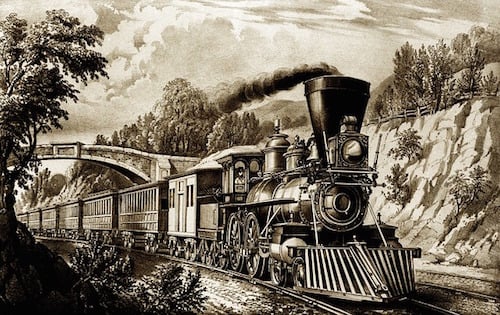
11 Writing Prompts for Kids
Any of these prompts can be used by writers of any age, but we chose the following 11 prompts as ones that would be particularly fun for kids to write about. (Most of them I used myself as a young writer, so I can vouch for their working!)
#1 : Include something falling in your writing.
#2 : Write a short poem (or story) with the title, "We don't know when it will be fixed."
#3 : Write from the perspective of someone of a different gender than you.
#4 : Write a dumb internet quiz.
#5 : Finish this thought: "A perfect day in my imagination begins like this:"
#6 : Write a character's inner monologue (what they are thinking as they go about their day).
#7 : Think of a character. Write a paragraph each about:
- An important childhood experience that character had.
- The character's living situation.
- Two hobbies or things the character likes to do.
- The room where the character sleeps.
- An ambition of the character.
- Two physical characteristics of the character.
- What happens when a second person and this character meet.
- Two important defining personal traits of this character.
#8 : Start a story with a quote from a song.
#9 : Begin a story with, "It was the summer of ______ when ______"
#10 : Pretend everyday objects have no names. Think about what you would name them based on what they do, what you can use them for, and what they look like.
#11 : Start a story with the phrases "My grandparents are/were," "My parents are/were," or "My mother/father/parent is/was."
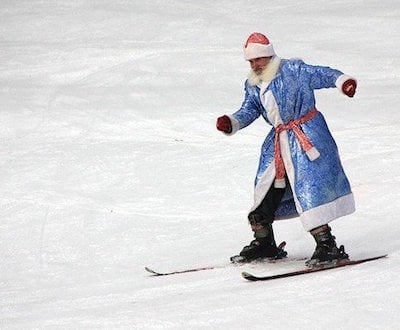
15 Cool Writing Prompts
#1 : List five issues that you're passionate about. Write about them from the opposite point of view (or from the perspective of a character with the opposite point of view).
#2 : Walk around and write down a phrase you hear (or read). Make a story out of it.
#3 : Write using no adjectives or adverbs.
#4 : Write a character's inner dialogue between different aspects of a character's self (rather than an inner monologue).
#5 : Write a true story from your past that involves light or darkness in some way.
#6 : "Saying goodbye awakens us to the true nature of things." Write something in which someone has to say goodbye and has a realization.
#7 : Begin by writing the end of the story.
#8 : Write a recipe for an intangible thing.
#9 : Write a horror story about an ordinary situation (e.g., buying groceries, going to the bank, listening to music).
#10 : Write a story from within a bubble.
#11 : Write down 2-3 short character descriptions and then write the characters in conversation with one another.
#12 : Write a story in second person.
#13 : Write a story that keeps contradicting itself.
#14 : Write about a character with at least three big problems.
#15 : Write something that takes place on a Friday, the 13th (of any month).

15 Funny Writing Prompts
#1 : Write a story which starts with someone eating a pickle and potato sandwich.
#2 : Write a short script where the plot has to do with evil dolls trying to take over something.
#3 : Write about writers' block.
#4 : List five election issues that would be ridiculous to includes as part of your election platform (e.g. outlawing mechanical pencils and clicky pens, mandating every person over the age of 30 must own an emergency last rites kit). Choose one of the ridiculous issues and write a speech in favor of it.
#5 : Write a children's story that is insanely inappropriate but can't use graphic language, curses, or violence.
#6 : List five careers. Write about someone with one of those careers who wants to quit it.
#7 : Write down a list of murder methods. Choose one at random from the list to use in a story.
#8 : Write a romance story in which the hero must have a last name corresponding with a physical characteristic (e.g. Jacques Hairyback or Flora Dimple).
#9 : Come up with 10 different ways to:
- order a pizza
- congratulate someone on a job well done
- return to the store something that's broken
#10 : Search for "random Renaissance painting" (or any other inspirational image search text you can think of) on any online internet image search engine. Picking one image, write half a page each of:
- Statements about this image (e.g. "I meant bring me the BREAD of John the Baptist").
- Questions about this image (e.g. "How many of those cherubs look like their necks are broken?").
- Explanations of this image (e.g. "The painter ran out of blue paint halfway through and had to improvise for the color of the sky").
- Commands said by people in this image or about this image (e.g. "Stop telling me to smile!" or "Bring me some gasoline!").
#11 : Write starting with a word that sounds like "chute" (e.g. "chute," "shoot," "shooed").
#12 : Write about a character named X "The [article of clothing]" Y (e.g. Julie "The Yellow Darted Skirt" Whyte) or simply referred to by their clothing (e.g. "the man in the brown suit" or "the woman in black").
#13 : Write down a paragraph each describing two wildly different settings. Write a story involving both settings.
#14 : Think of a fictional holiday based around some natural event (e.g. the Earth being at its farthest point from the sun, in memory of a volcanic eruption, that time a cloud looked like a rabbit riding a bicycle). Write about how this holiday is celebrated.
#15 : Write a "Just-So" type story about a fictional creature (e.g. "how the dragon got its firebreath" or "how the mudkip got its cheek gills").
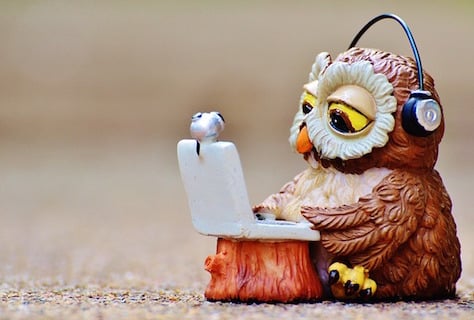
54 Other Writing Prompt Ideas
#1 : Borrow a character from some other form of media (or create your own). Write from that character's perspective.
#2 : Write for and against a non-consequential controversy (e.g., salt vs. pepper, Mac vs. PC, best kind of door).
#3 : Choose an ancestor or a person from the past to write about or to.
#4 : Write a pirate story with a twist.
#5 : Have a character talk about another character and their feelings about that other character.
#6 : Pick a season and think about an event in your life that occurred in that season. Write a creative nonfiction piece about that event and that season.
#7 : Think of something very complicated and long. Write a page about it using short sentences.
#8 : Write a story as a dream.
#9 : Describe around a food without ever directly naming it.
#10 : Write a monologue (one character, talking to the audience/reader) (*not* an inner monologue).
#11 : Begin a story with the phrase, "It only took five seconds to..."
#12 : List five strong emotions. Choosing one, write about a character experiencing that emotion, but only use the character's actions to convey how they are feeling (no outright statements).
#13 : Write a chapter of the memoir of your life.
#14 : Look through the (physical) things you're currently carrying with you or wearing. Write about the memories or emotions tied with each of them.
#15 : Go be in nature. Write drawing your story from your surroundings (both physical, social, and mental/emotional).
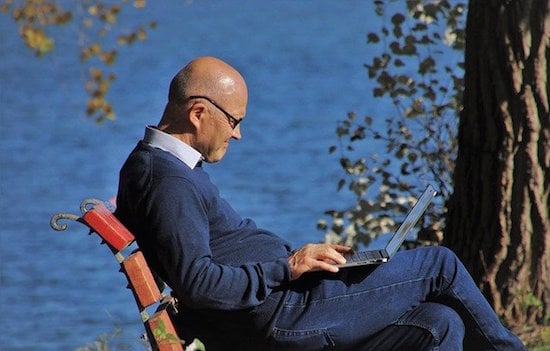
#16 : Write from the perspective of a bubble (or bubble-like creature).
#17 : A person is jogging along an asphalt road. Write a story.
#18 : Title your story (or poem, or play, etc) "Anti-_____". Fill in the blank and write the story.
#19 : Write something that must include an animal, a mineral, and a vegetable.
#20 : Begin your writing with the phrase, "6 weeks later..."
#21 : List 5-10 office jobs. Pick one of them and describe a person working in that job as if you were a commentator on an Olympic sporting event.
#22 : Practice your poetic imagery: overwrite a description of a character's breakfast routine.
#23 : Write about a character (or group of characters) trying to convince another character to try something they're scared of.
#24 : Keep an eye out in your environment for examples of greengrocer's apostrophes and rogue quotation marks. Pick an example and write about what the misplaced punctuation implies (e.g., we have the "best" meat or we have the best "meat" ).
#25 : Fill in the blank with the first word that comes to mind: "_______ Riot!" Write a newspaper-style article describing the events that that took place.
#26 : Write from the point of view of your most-loved possession. What does it think of you?
#27 : Think of five common sayings (e.g., "An apple a day keeps the doctor away"). Write a horror story whose plot is one of those common sayings.
#28 : Write a scene in which two characters are finally hashing out a long-standing misunderstanding or disagreement.
#29 : You start receiving text messages from an unknown number. Tell the story of what happens next.
#30 : Write one character bragging to another about the story behind their new tattoo.
#31 : Superheroes save the world...but they also leave a lot of destruction in their wake. Write about a normal person in a superhero's world.
#32 : Sometimes, family is who we are related to; sometimes, family is a group of people we gather around ourselves. Write a story about (some of) a character's found family and relatives meeting for the first time.
#33 : Write a story that begins in the middle of the plot's action ( en media res ).
#34 : Everyone says you can never have too much of a good thing. Write a story where that isn't true.
#35 : What do ghosts do when they're not creating mischief? Write about the secret lives of ghosts.
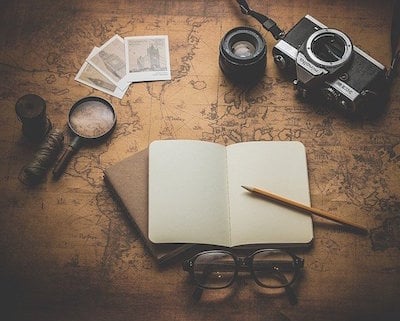
#36 : Every year, you dread the last week of April. Write a story about why.
#37 : Write a story about what it would be like to have an animal sidekick in real life.
#38 : Heists don't just have to be black-clad thieves stealing into vaults to steal rare art or money. Write about a group of people (adults or children) who commit a heist for something of seemingly little monetary value.
#39 : "Life is like a chooseable-path adventure, except you don't get to see what would have happened if you chose differently." Think of a choice you've made and write about a world where you made a different choice.
#40 : Write a story about a secret room.
#41 : You find a message in a bottle with very specific directions. Write a story about the adventure you embark upon.
#42 : "You'll always be okay as long as you know where your _______ is." Fill in the blank and write a story (either fictional or from your life) illustrating this statement.
#43 : Forcing people into prolonged proximity can change and deepen relationships. Write about characters on a road trip together.
#44 : In music, sonata form includes three main parts: exposition, development, and recapitulation. Write a short story that follows this format.
#45 : Begin writing with a character saying, "I'm afraid this simply can't wait."
#46 : Write a story with a happy ending (either happily-ever-after or happy-for-now).
#47 : Write about a character before and after a tragedy in that character's life.
#48 : Choose an object or concept you encounter in everyday life (e.g. tables, the feeling of hot or cold, oxygen) and write an infomercial about it.
#49 : "Life is a series of quests, whether important or mundane." Write about a quest you've gone on (or would like to go on, or will have to go on).
#50 : List 10 different ways to learn. Choose one (or more) and write a story where a character learns something using that one (or more) method.
#51 : You've been called to the principal's office for bad behavior. You know what you did. Explain and justify yourself.
#52 : A character discovers their sibling owns a cursed object. Write about what happens next.
#53 : Write a character description by writing a list of items that would be on a scavenger hunt about them.
#54 : The slogan for a product or service you're advertising is, "Kid-tested, _____." Fill in the blank and write the copy for a radio or podcast advertisement for your product.
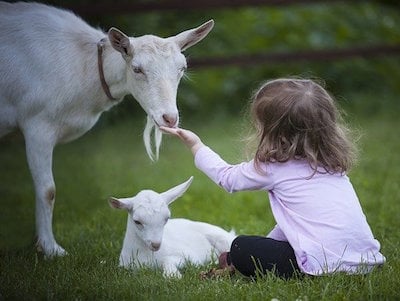
How to Use Creative Writing Prompts
There's no wrong way to use a creative writing prompt (unless it's to harass and hurt someone)—the point of them is to get you writing and your imagination flowing.
To help you get the most out of these writing prompts, however, we've come up with the six tips below. Try them out!
#1: DON'T Limit Yourself to Prose
Unless you're writing for a particular assignment, there's no reason everything you write in response to a writing prompt has to be prose fiction . Instead of writing your response to a prompt as a story, try writing a poem, nonfiction essay, play, screenplay, or some other format entirely.
#2: DON'T Edit as You Write
The purposes of writing prompts is to get you writing, typos and weird grammar and all. Editing comes later, once you've finished writing and have some space from it to come back to what you wrote.
It's OK to fix things that will make it difficult to read what you've written (e.g., a weird autocorrect that changes the meaning of a sentence), but don't worry too much about typos or perfect grammar when you're writing; those are easy enough to fix in edits . You also can always insert asterisks or a short note as you're writing to remind yourself to go back to fix something (for instance, if as you're writing it seems like you want to move around the order of your paragraphs or insert something earlier).
#3: DO Interpret the Prompt Broadly
The point of using a writing prompt is not to write something that best exemplifies the prompt, but something that sparks your own creativity. Again, unless you're writing in response to an assignment with specific directions, feel free to interpret writing prompts as broadly or as narrowly as you want.
For instance, if your prompt is to write a story that begins with "The stage was set," you could write about anything from someone preparing to put a plan into motion to a literal theatre stage constructed out of pieces of old sets (or something else entirely).
If you're using a writing prompt, it doesn't have to be the first sentence of your story or poem, either; you can also use the prompt as a goal to work towards in your writing.
#4: DO Try Switching Up Your Writing Methods
If it's a possibility for you, see if you write differently in different media. Do you write the same kind of stories by hand as you would typing at a computer? What about if you dictate a story and then transcribe it? Or text it to a friend? Varying the method you use to write can affect the stories you're able to tell.
For example, you may find that it's easier for you to tell stories about your life to a voice recorder than to try to write out a personal essay. Or maybe you have trouble writing poetry, but can easily text yourself or a friend a poem. You might even find you like a writing method you've not tried before better than what you've been doing!

#5: DO Mix and Match Prompt Ideas
If you need more inspiration, feel free to combine multiple prompts (but don't overwhelm yourself with too much to write about).
You can also try switching genres from what might be suggested in the prompt. For instance, try writing a prompt that seems funny in a serious and sad way, or finding the humor in something that otherwise seems humorless. The categories we've organized the prompts into are by no means limiters on what you're allowed to write about.
#6: DO Try to Write Regularly
The more regularly you write, the easier it will be to write (with or without writing prompts).
For some people, this means writing daily; for others, it means setting aside time to write each weekend or each month. Set yourself an achievable goal (write 2x a week, write 1000 words a month) and stick to it. You can always start small and then ramp your wordcount or frequency up.
If you do better when you have something outside yourself prompting to write, you may also want to try something like morning pages , which encourages you to write at least 750 words every day, in any format (story, diary entry, social media postings, etc).

What's Next?
Thinking about attending college or grad school for creative writing? Our articles on whether or not you should major in creative writing and the best creative writing programs are there for you! Plus, if you're a high schooler, you should check out these top writing contests .
Creative writing doesn't necessarily have to be fiction. Check out these three examples of narrative writing and our tips for how to write your own narrative stories and essays .
Just as writing prompts can help give form to amorphous creative energy, using specific writing structures or devices can be great starting points for your next story. Read through our discussion of the top 20 poetic devices to know and see if you can work at least one new one into your next writing session.
Still looking for more writing ideas? Try repurposing our 100+ easy drawing ideas for characters, settings, or plot points in your writing.
Laura graduated magna cum laude from Wellesley College with a BA in Music and Psychology, and earned a Master's degree in Composition from the Longy School of Music of Bard College. She scored 99 percentile scores on the SAT and GRE and loves advising students on how to excel in high school.
Student and Parent Forum
Our new student and parent forum, at ExpertHub.PrepScholar.com , allow you to interact with your peers and the PrepScholar staff. See how other students and parents are navigating high school, college, and the college admissions process. Ask questions; get answers.

Ask a Question Below
Have any questions about this article or other topics? Ask below and we'll reply!
Improve With Our Famous Guides
- For All Students
The 5 Strategies You Must Be Using to Improve 160+ SAT Points
How to Get a Perfect 1600, by a Perfect Scorer
Series: How to Get 800 on Each SAT Section:
Score 800 on SAT Math
Score 800 on SAT Reading
Score 800 on SAT Writing
Series: How to Get to 600 on Each SAT Section:
Score 600 on SAT Math
Score 600 on SAT Reading
Score 600 on SAT Writing
Free Complete Official SAT Practice Tests
What SAT Target Score Should You Be Aiming For?
15 Strategies to Improve Your SAT Essay
The 5 Strategies You Must Be Using to Improve 4+ ACT Points
How to Get a Perfect 36 ACT, by a Perfect Scorer
Series: How to Get 36 on Each ACT Section:
36 on ACT English
36 on ACT Math
36 on ACT Reading
36 on ACT Science
Series: How to Get to 24 on Each ACT Section:
24 on ACT English
24 on ACT Math
24 on ACT Reading
24 on ACT Science
What ACT target score should you be aiming for?
ACT Vocabulary You Must Know
ACT Writing: 15 Tips to Raise Your Essay Score
How to Get Into Harvard and the Ivy League
How to Get a Perfect 4.0 GPA
How to Write an Amazing College Essay
What Exactly Are Colleges Looking For?
Is the ACT easier than the SAT? A Comprehensive Guide
Should you retake your SAT or ACT?
When should you take the SAT or ACT?
Stay Informed
Get the latest articles and test prep tips!
Looking for Graduate School Test Prep?
Check out our top-rated graduate blogs here:
GRE Online Prep Blog
GMAT Online Prep Blog
TOEFL Online Prep Blog
Holly R. "I am absolutely overjoyed and cannot thank you enough for helping me!”

25 Creative Writing Prompts to Ignite Your Creativity
Creative writing is a vast and dynamic field that offers a platform for individuals to express their ideas, emotions, and stories in an imaginative and original way.
It plays a crucial role in enhancing communication skills, fostering empathy, and also promoting a deep understanding of the human experience. If you’re not sure how to get started, consider these helpful writing prompts – let’s get creative!
The Importance of Creative Writing
In the realm of literature and beyond, creative writing holds a pivotal role. It not only allows for personal expression but also:
- fosters critical thinking
- enhances vocabulary
- improves writing skills
- conveys complex ideas and emotions
- serves as a therapeutic medium
- enhances empathy
From short stories and poetry to novels and screenplays, creative writing spans a wide array of genres and styles, and offers endless opportunities for exploration and expression.
In the professional realm, creative writing skills are highly valued. They can lead to various creative writing jobs in fields like publishing, advertising, journalism, and content creation. For those interested in pursuing higher education in this field, you might want to explore whether a degree in creative writing is worth it .
Understanding Creative Writing Prompts
When it comes to igniting creativity and fostering unique ideas, creative writing prompts play an invaluable role. They provide a starting point, a spark that can lead to a flame of inspiration for writers.
How Prompts Can Ignite Creativity
While creative writing is an exciting field, it can sometimes be challenging to kickstart the creative process. This is where creative writing prompts come into play. These prompts are designed to ignite the imagination and inspire writers to create original and compelling pieces.
They help to overcome writer’s block , encourage experimentation with different styles and genres. So, whether you’re a seasoned writer or a beginner, creative writing prompts can be an invaluable tool to spark creativity and enhance your writing skills.
What are Creative Writing Prompts?
Creative writing prompts are essentially ideas, questions, or topics that are designed to inspire and stimulate the creative writing process. They serve as a catalyst, helping to ignite the writer’s imagination and encourage them to explore new themes, concepts, or perspectives.
These prompts can take a myriad of forms. They might be a single word, a phrase, a sentence, or even an image. Remember, regardless of the format, the goal of a creative writing prompt is to trigger thought and also encourage writers to delve deeper into their creative psyche, producing unique and compelling pieces of writing.
For more understanding of what creative writing entails, read our article on what is creative writing .
Types of Creative Writing Prompts
There are various types of creative writing prompts, each tailored to stimulate different forms of writing, cater to various genres, or inspire certain ideas. For example, you might encounter:
- Fiction Writing Prompts : These prompts are designed to inspire stories. They might provide a setting, a character, a conflict, or a plot point to kick-start the writer’s imagination.
- Non-Fiction Writing Prompts : These prompts are geared towards non-fiction writing, such as essays, memoirs, or journalistic pieces. They might pose a question, present a topic, or propose a perspective for the writer to explore.
- Poetry Writing Prompts : These prompts are tailored for writing poetry. They could suggest a theme, a form, a line, or a poetic device to be used in the poem.
- Dialogue Writing Prompts : These prompts focus on conversations and are designed to inspire dialogue-driven pieces. They generally provide a line or a snippet of conversation to act as a starting point.
- Story Starter Writing Prompts : These prompts serve as the opening line or the first paragraph of a story. The writer’s task is to continue the narrative from there.
Understanding the different types of creative writing prompts is essential to making the most of them. For example, when you choose the right type of prompt, you target specific writing skills , push boundaries of creativity, and provide the necessary spark to bring your ideas to life.
25 Creative Writing Prompts
Using creative writing prompts is a great way to jumpstart your creativity and get the ideas flowing. Whether you’re a seasoned writer or a beginner, these prompts can help inspire your next piece. Here, we’ve broken down 25 prompts into five categories: fiction, non-fiction, poetry, dialogue, and story starters.
Fiction Writing Prompts
Fiction allows writers to flex their imaginative muscles. The following prompts can help to stir up new ideas for a unique storyline:
- Write a story where the main character finds an old, mysterious letter in the attic.
- Imagine a world where animals can talk.
- Create a tale where a character discovers they have a superpower.
- Write about a character who wakes up in a different era.
- Write a story set in a world where money doesn’t exist.
Non-Fiction Writing Prompts
Non-fiction writing can help you explore real-life experiences and lessons. Here are some prompts to get you started:
- Write about a time when you faced a significant challenge and how you overcame it.
- Describe the most influential person in your life.
- Share a moment when you learned a valuable lesson.
- Write about an unforgettable trip.
- Discuss a current event that has impacted you personally.
Poetry Writing Prompts
Poetry allows for artistic expression through words. These prompts can inspire new verses:
- Write a poem about a dream you can’t forget.
- Create a sonnet about the changing seasons.
- Write about an emotion without naming it directly.
- Craft a poem inspired by a piece of art.
- Pen a haiku about nature’s power.
Dialogue Writing Prompts
Dialogue writing can help you improve your dialogue creation skills. Try these prompts:
- Write a conversation between two people stuck in an elevator.
- Describe a heated argument between a character and their best friend.
- Create a dialogue where a character reveals a deep secret.
- Write an exchange between a detective and a suspect.
- Craft a conversation between two people who speak different languages.
Story Starter Writing Prompts
Story starters are great for sparking an idea for a story. Here are some to try:
- “When she opened the door, she couldn’t believe her eyes…”
- “He’d waited his whole life for this moment, and now…”
- “It was a town like no other, because…”
- “She was the last person on earth, or so she thought…”
- “The letter arrived, marked with a seal she didn’t recognize…”
These creative writing prompts are designed to challenge you and spark your creativity. Remember, the goal is not to create a perfect piece of writing but to ignite your imagination and hone your writing skills. Also, don’t forget, you can always revise and refine your work later .
For more on the art of writing, check out our article on what is creative writing .
Making the Most of Your Creative Writing Prompts
Now that you have a list of creative writing prompts at your disposal, it’s important to understand how to utilize them effectively. The value of a prompt lies not just in the initial idea it provides, but also in how it can be expanded and developed into a full-blown piece of writing.
How to Use Creative Writing Prompts Effectively
Using creative writing prompts effectively requires an open mind and a willingness to explore. Here are some strategies to make the most of your prompts:
- Brainstorming: Allow yourself to brainstorm ideas after reading the prompt. Jot down whatever comes to mind without self-judgment or censorship.
- Freedom: Give yourself the freedom to interpret the prompt in your own way. Remember, prompts are starting points, not rigid guidelines.
- Experimentation: Experiment with different genres, perspectives, and writing styles. A prompt can be turned into a poem, a short story, or even a script for a play.
- Consistency: Try to write regularly. Whether you choose to do this daily, weekly, or bi-weekly, consistency can help develop your writing skills.
- Reflection: Finally, reflect on the prompt and your writing. Consider what worked, what didn’t, and also what you would like to improve in your next piece.
In addition to this, check out our article on what is creative writing .
Tips to Expand on a Prompt
Expanding on a prompt involves transforming a simple idea into a fully developed narrative. Here are a few tips:
- Character Development: Flesh out your characters. Give them backgrounds, motivations, and flaws to make them more relatable and interesting.
- Plot Building: Develop a coherent plot. Consider the key events, conflicts, and resolutions that will drive your story forward.
- Show, Don’t Tell: Show the reader what’s happening through vivid descriptions and actions rather than simply telling them.
- Dialogue: Use dialogue to reveal character traits and advance the plot. Make sure it’s natural and adds value to your story.
- Editing: Finally review and revise your work. Look for areas where you can improve clarity, tighten your prose, and also eliminate any inconsistencies or errors.
Editor’s Note : Don’t get rid of old ideas or unfinished works – you never know when looking back over these might spark inspiration or two ideas might mesh to form something cohesive and new!
The Right Prompts Grow Your Skills
By using these strategies, you can take full advantage of creative writing prompts and improve your writing skills. So, whether you’re pursuing a career in creative writing or just looking for a new hobby, these tips can help you unlock your full creative potential.
For more insights on creative writing, check out our articles on creative writing jobs and what you can do with a creative writing degree and how to teach creative writing .
Also, don’t miss our master list of more than 250 journal prompts .
Brooks Manley

Creative Primer is a resource on all things journaling, creativity, and productivity. We’ll help you produce better ideas, get more done, and live a more effective life.
My name is Brooks. I do a ton of journaling, like to think I’m a creative (jury’s out), and spend a lot of time thinking about productivity. I hope these resources and product recommendations serve you well. Reach out if you ever want to chat or let me know about a journal I need to check out!
Here’s my favorite journal for 2024:

Gratitude Journal Prompts Mindfulness Journal Prompts Journal Prompts for Anxiety Reflective Journal Prompts Healing Journal Prompts Cognitive Behavioral Therapy Journal Prompts Mental Health Journal Prompts ASMR Journal Prompts Manifestation Journal Prompts Self-Care Journal Prompts Morning Journal Prompts Evening Journal Prompts Self-Improvement Journal Prompts Creative Writing Journal Prompts Dream Journal Prompts Relationship Journal Prompts "What If" Journal Prompts New Year Journal Prompts Shadow Work Journal Prompts Journal Prompts for Overcoming Fear Journal Prompts for Dealing with Loss Journal Prompts for Discerning and Decision Making Travel Journal Prompts Fun Journal Prompts
Is a Degree in Creative Writing Worth it?
You may also like, planner review: the clever fox planner pro.
How to Plan Your Calendar for Maximum Impact
How long does it take to form a healthy habit, leave a reply cancel reply.
Save my name, email, and website in this browser for the next time I comment.
- Productivity
- Favorite Journals

Creative Writing Prompts Inspired by Historical Events
by Melissa Donovan | Oct 24, 2023 | Creative Writing Prompts | 12 comments

Creative writing prompts inspired by historical events.
Today’s prompts include selections from the book 1200 Creative Writing Prompts . Enjoy!
Nonfiction writers are obviously inspired by the real world, but fiction writers and poets also take inspiration from real people and events.
Wars, scandals, scientific advances, and famous figures in history have all been represented in every form of writing.
Works of fiction that resonate best with readers contain a kind of truth, a reflection of our own real experiences. That’s why looking to the events of history for story ideas is a great way to inspire a writing session. And of course, poetry takes inspiration from everything in the universe. While personal experiences may be more popular sources of inspiration, some incredible poems and stories have been triggered by real events throughout history.
Writing Prompts
You can use these creative writing prompts to write anything you want — a poem, a short story, a blog post, or a journal entry. The idea is to find the prompt that speaks to you and then start writing.
- In a country that rants and raves about freedom, the government decides that its people should not be allowed to drink liquor. Write a story set during Prohibition in the United States.
- The Great Depression filled the space between America’s Prohibition (which was still in effect during the Depression) and World War II. The Depression affected the entire world. Well-to-do people lost everything and found themselves standing in food lines. Ordinary people went to extraordinary measures to get a meager meal. Meanwhile, someone, somewhere profited.
- World War II gave rise to what journalist Tom Brokaw called “the greatest generation.” Create a cast of compelling characters and write a story showing how circumstances forced them to become great.
- The entertainment industry boomed in the twentieth century. Technology changed entertainment from an attraction you paid to see in a theater or other public setting to something you could enjoy from the comfort of your home. Every home had a radio. Black-and-white silent films evolved into Technicolor talkies. Now we have the Internet. Write a story centered on entertainment technologies of the past.
- Spaceships, planes, and men on the moon: We started out traveling around on foot. Then some clever Neanderthal invented the wheel. Now, we soar through the skies and tear through space. Write a story about a long journey set in an era when planes, trains, and automobiles weren’t readily available.
- The 1960s gave us Civil Rights, Woodstock, and the space race. What happens when a nation’s people are divided? What happens when minorities of people are oppressed? What happens when ordinary kids decide they don’t want to grow up and become just like their parents? Mix in the fact that there’s a war nobody understands and most people don’t believe in. Add drugs, flowers, and peace signs, and you’ve got the sixties. Write a story set during this iconic decade.
- Write a story that is set around the assassination of an important, benevolent, historical figure: for example, Gandhi, Martin Luther King, JFK, or John Lennon.
- Revolution could be defined as a war between a state and its people. Revolution often occurs when people are oppressed to the point of mass suffering. Choose one such revolution from history and write a story about the people who launched it.
- Throughout history, people have emigrated across land and ocean. Choose a time period of heavy human migration. Then choose a starting place and a destination and write the story of a character or group of characters who take the voyage. Focus on the journey, not the place of origin or the destination.
- The 1950s are often painted as a simple and idealistic time in American history. One income could support an entire family. Jobs were plentiful. Moms stayed home with their kids. Divorce was scandalous. Write about a protagonist who didn’t fit the mold, whose life was difficult because of the cultural and societal conventions of the time.
Good luck with these creative writing prompts! Have fun and don’t forget to come back and tell us how they worked for you.
Got any writing prompts of your own to share or add to this list? Leave a comment.
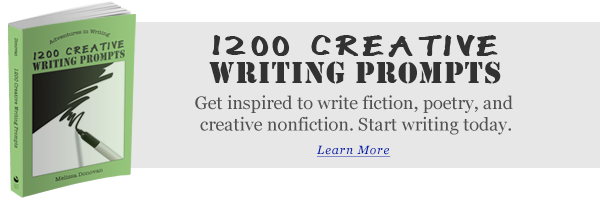
12 Comments
Great ideas for prompts. I’ll be stealing these for my Creative Writing class. Here’s one I came up with for a poetry class I’m teaching this summer. Feel free to try it and give it a more thorough explanation here, if you like it. essentially, the writer goes through his or her twitter feed or Facebook status updates and writes a list of the interesting verbs and nouns, then puts them together in interesting ways to form found poetry or story ideas. Here’s the list I came up with:
http://unapologetic-conjecture.blogspot.com/2011/06/fun-with-words-from-twitter.html
Hi Benjamin. I like the idea of getting word lists from Twitter and using them to prompt a writing session. Thanks for sharing!
Almost every time when I read scientific news I get ideas for my book set in far future. Or when I look at space pictures from Hubble. Sometimes I simply can’t enjoy reading the articles itself – ideas, ideas are coming! 🙂
I know the feeling! I was researching outer space just this weekend. Sometimes, I get so many ideas, it takes me a few days to work out which ones I should use!
I found this very interesting. Woodstock caught my eye because although I was not there the music is from my generation. My mind is overflowing with possibilities………….
Ooh, cool. Woodstock was before my time, but I’m fascinated by the Woodstock culture. There are definitely stories to be told there! Good luck with yours!
And isn’t it convenient that history just repeats itself? 😉
I suppose it could include events in one’s own life? Pretty potent events inspired my entry into fiction.
Of course. Some of the best inspiration comes from real-life experiences.
Speaking of cultural movements, does it seem to anyone else that America has entered a sort of post-Romantic era?
This is from Britannica : “Introspection was inevitable in the literature of an immediately Post-Romantic period, and the age itself was as prone to self-analysis as were its individual authors.”
I don’t think I’d use that description to describe what is happening in America right now. I would call this a divisive era. Dark, dystopian works seem to be popular juxtaposed against commercial art that could be construed as shallow or meaningless ( Hunger Games v. Fifty Shades ). In fact, one might say that there is a struggle between materialism and meaning. We could also call it the post-technology age, where we are challenged to adjust to a new system in which we rely heavily on technology and it has cost lots of jobs.
What a great question, Jesse. It’s given me much to think about. I do believe we are on the cusp of some new era. We live in fascinating times!
Great ideas. Many thanks. I’m filing this.
Submit a Comment Cancel reply
Your email address will not be published. Required fields are marked *
This site uses Akismet to reduce spam. Learn how your comment data is processed .

Subscribe and get The Writer’s Creed graphic e-booklet, plus a weekly digest with the latest articles on writing, as well as special offers and exclusive content.

Recent Posts
- Writing Resources: No Plot? No Problem!
- Character-Driven Fiction Writing Prompts
- From 101 Creative Writing Exercises: Invention of Form
- How to Write Better Stories
- How to Start Writing Poetry
Write on, shine on!
Pin It on Pinterest

Hispanic Heritage Month Writing Prompts: Celebrate Latinx Culture
My name is Debbie, and I am passionate about developing a love for the written word and planting a seed that will grow into a powerful voice that can inspire many.
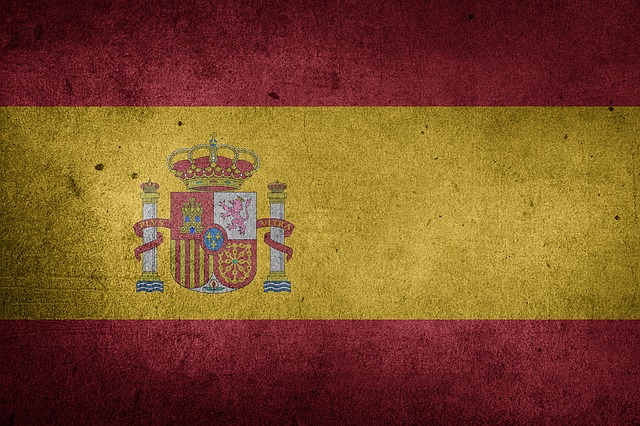
Every year, from September 15th to October 15th, people from all corners of the United States come together to honor Hispanic Heritage Month— a time dedicated to celebrating the vibrant and rich Latinx culture that has profoundly shaped our nation’s identity. This annual observance serves as a reminder of the countless contributions, achievements, and indelible mark left by Hispanic and Latinx communities throughout history. One powerful way to foster an appreciation for this cultural tapestry is through the art of writing. Whether you’re a student, a creative soul, or simply someone eager to explore the depths of Latinx heritage, we’ve curated a collection of thought-provoking writing prompts that will immerse you in the beauty of Hispanic culture, ignite your imagination, and encourage you to embrace the diverse voices that continue to shape our world. So, grab a pen and let your words dance to the rhythm of Latinx heritage as we embark on a writing journey that will celebrate, honor, and captivate the essence of Hispanic Heritage Month.
Exploring Latinx Identity through Writing: Hispanic Heritage Month Prompts
Honoring latin american contributions: writing prompts for hispanic heritage month, connecting generations through cultural narratives: hispanic heritage month writing ideas, recognizing latinx trailblazers: inspiring writing prompts for hispanic heritage month, celebrating latinx culture: writing prompts to embrace hispanic heritage month, frequently asked questions, in conclusion.
Hispanic Heritage Month offers a wonderful opportunity to delve into the rich diversity and intricate tapestry of Latinx identity. Through writing, we can explore the multifaceted experiences, perspectives, and stories that make up this vibrant community. Whether you are a Latinx writer seeking inspiration or someone interested in understanding a different cultural lens, these prompts will ignite your creativity and provide a platform for self-reflection and connection.
To fully embrace the exploration of Latinx identity, we have curated a set of thought-provoking writing prompts. These prompts will encourage you to delve into your own heritage, celebrate the contributions of influential Latinx figures, and examine the significance of cultural traditions in shaping your identity.
When engaging with these prompts, let your voice shine and embrace the personal nature of these experiences. Feel free to draw inspiration from your own memories, traditions, and interactions with the Latinx community. This is an opportunity to foster cultural understanding, strengthen your writing skills, and ultimately celebrate the beautiful mosaic of Latinx identity.
Explore Latinx Identity Writing Prompts:
- Reflect on a pivotal moment in your upbringing that helped shape your Latinx identity. How has it influenced your values, beliefs, or aspirations?
- Choose a Latinx artist, musician, writer, or activist who has impacted you personally. Explain their influence and how their work has made a mark on your journey.
- Describe a cherished cultural tradition or celebration passed down through generations in your family. What significance does it hold for you and how does it connect you to your roots?
- Write a letter to your future self, sharing the dreams, challenges, and aspirations you have as a member of the Latinx community.
- Compose a poem or short story that captures the essence of your bicultural experience – the amalgamation of your Latinx heritage with the country you reside in.
Hispanic Heritage Month is a time to celebrate and honor the diverse contributions of Latin Americans to culture, society, and history. In order to embrace the essence of this month-long observance, we have curated a list of thought-provoking writing prompts that will encourage reflection, exploration, and creativity. These prompts delve into various aspects of Latin American culture, history, and personal experiences, providing a platform to share unique perspectives and celebrate the rich tapestry of Hispanic heritage.
Whether you are a student, educator, or simply an individual interested in expanding your knowledge and understanding of Hispanic culture, these writing prompts offer a gateway to engage in meaningful conversations. From exploring the impact of Latin American literature, music, or culinary traditions on a global scale to sharing personal narratives that highlight the importance of cultural identity, these prompts will spark creativity and encourage deeper connections to Hispanic heritage.
Unleash your imagination and delve into the vast world of Latin American contributions with these writing prompts:
- Exploring the Role of Latin American Authors: Discuss the influence of renowned Latin American literary figures like Gabriel Garcia Marquez or Isabel Allende on the global literary landscape . How have their works shaped your own understanding and appreciation of Latin American culture?
- Traditional Rhythms: Explore the rich musical heritage of Latin America by focusing on a specific genre or influential artist. How does the music capture the essence of Latin American culture, and what impact has it had on global music trends?
- Preserving Culinary Traditions: Dive into the vibrant flavors and diverse culinary traditions of Latin America. Choose a dish or ingredient that holds significance and explore its historical and cultural importance. How has it become a symbol of Latin American identity?
- Journey of Immigration: Share a personal narrative or research the experiences of Latin American immigrants. Reflect on the challenges and triumphs they faced while embracing a new culture. How has their journey shaped the fabric of society and enriched their own sense of identity?
These writing prompts only scratch the surface of the vast contributions made by Latin Americans. Let’s use this opportunity during Hispanic Heritage Month to celebrate and honor the diverse perspectives, achievements, and stories that have shaped our world.
Hispanic Heritage Month provides a perfect opportunity to celebrate the rich and diverse cultural narratives that have been passed down through generations. Writing about these heritage stories can not only help preserve traditions but also serve as a bridge between younger and older generations. Whether you are a student looking for inspiration or an educator seeking writing prompts, here are some engaging ideas to explore during Hispanic Heritage Month:
- Unveil family recipes: Dive into the heart of Hispanic heritage by writing about traditional family recipes. Share their history, origins, and the memories associated with them. Encourage older family members to recount their experiences in the kitchen and capture their unique cooking techniques. Documenting these recipes not only honors your cultural background but also ensures that future generations can continue to cherish these cherished meals.
- Illustrate cultural celebrations: Explore and write about the various celebrations that are significant in Hispanic culture. Whether it’s Día de los Muertos, Carnaval, or Las Posadas, each celebration carries its own cultural significance and traditions. Describe the customs, costumes, and music associated with these festivities. Don’t forget to include personal anecdotes and experiences, creating a vivid picture that can transport readers to these vibrant cultural events.
By blending the power of storytelling with the art of writing, Hispanic Heritage Month offers countless opportunities to connect generations and preserve cherished cultural narratives. These writing ideas provide a foundation for fostering appreciation, understanding, and continued celebration of Hispanic heritage. Remember, embracing and sharing our cultural stories is an invaluable way to reinforce identity, educate others, and create a stronger sense of unity within our diverse society.
In celebration of Hispanic Heritage Month, we want to shine a spotlight on the amazing achievements of Latinx trailblazers. These individuals have pushed boundaries, broken barriers, and made significant contributions to various fields. In honor of their accomplishments, we have put together a collection of inspiring writing prompts to ignite your creativity and encourage reflection on the rich and diverse Latinx culture.
1. Untold Stories: Write a fictional story or poem that explores the hidden narratives of Latinx individuals throughout history. Consider highlighting lesser-known figures whose impact has been overlooked, shedding light on their triumphs and struggles.
2. Defying Stereotypes: Create a persuasive essay or personal reflection discussing the importance of dismantling stereotypes and challenging societal perceptions. Share personal experiences or examples of Latinx individuals who have defied stereotypes in their careers or personal lives, and the significance of breaking down these barriers.
Hispanic Heritage Month is a time to honor the vibrant cultures and contributions of Latinx communities. It is a chance to celebrate the rich traditions, language, and histories that shape the Latinx identity. In order to fully embrace this important month, we have compiled a list of writing prompts that will help you explore and appreciate the beauty of Latinx culture.
1. Family Roots: Reflect on your own family heritage and the stories that have been passed down through generations. How has your family’s Latinx background influenced your identity and perspective on life?
2. Celebrating Diversity: Latinx culture is incredibly diverse, with influences from various countries and regions. Research and write about a specific Latin American country or community that fascinates you. What traditions, music, art, or cuisine stand out to you?
3. Musical Melodies: Music plays a significant role in Latinx culture, with genres like salsa, reggaeton, and cumbia capturing the hearts of many. Explore the impact of Latinx music on society and how it has evolved over time.
Q: What is Hispanic Heritage Month? A: Hispanic Heritage Month is a month-long celebration in the United States that honors the contributions, culture, and heritage of Hispanic and Latinx communities. It takes place from September 15th to October 15th each year.
Q: Who celebrates Hispanic Heritage Month? A: Hispanic Heritage Month is celebrated by various individuals, organizations, and communities across the United States. It is not limited to Hispanics or Latinx individuals; people from different backgrounds also contribute to honoring and appreciating Latinx culture.
Q: Why is Hispanic Heritage Month celebrated from September 15th to October 15th? A: The dates of Hispanic Heritage Month are significant as they commemorate the independence days of several Latin American countries, including Costa Rica, El Salvador, Guatemala, Honduras, and Nicaragua, which all gained independence on September 15th, 1821. Additionally, Mexico celebrates its independence on September 16th, Chile on September 18th, and Belize on September 21st.
Q: What are writing prompts for Hispanic Heritage Month? A: Writing prompts for Hispanic Heritage Month serve as creative tools to encourage individuals to explore Latinx culture through writing. These prompts can cover various aspects, such as personal experiences, historical events, influential figures, food, traditions, and more.
Q: How can writing prompts be used to celebrate Latinx culture? A: Writing prompts provide an opportunity to engage with Latinx culture by exploring various themes, perspectives, and narratives. They encourage self-reflection, research, and storytelling, allowing individuals to deepen their understanding and appreciation of Latinx heritage and contributions.
Q: Can you provide some examples of Hispanic Heritage Month writing prompts? A: Certainly! Here are a few examples: 1. Describe a traditional Latin American dish that holds cultural significance for you. 2. Write a letter to a significant Latinx figure who has made an impact on your life. 3. Reflect on a personal experience where you felt connected to your Latinx heritage. 4. Imagine you are a reporter interviewing a Latinx artist or scientist; what questions would you ask? 5. Research and write about a historical event related to Latin American independence and its significance today.
Q: Who can benefit from using these writing prompts? A: Anyone can benefit from using these writing prompts. They are suitable for students, educators, writers, and individuals who want to celebrate Hispanic Heritage Month, whether to deepen their knowledge, engage in self-expression, research, or explore new perspectives.
Q: Can I share my writing based on the prompts with others? A: Absolutely! Sharing your writing with others is encouraged. You can share your work with family, friends, or even through online platforms such as blogs or social media. Sharing your work can foster dialogue, promote understanding, and contribute to the celebration of Latinx culture during Hispanic Heritage Month.
Q: Are these writing prompts only for Hispanic or Latinx individuals? A: No, these writing prompts are for everyone. Hispanic Heritage Month is about promoting inclusivity and recognizing the rich contributions of Hispanic and Latinx communities. These writing prompts can help individuals from diverse backgrounds appreciate and celebrate Latinx culture together.

May Writing Prompt: Embrace Springtime Creativity
Creative Writing Prompts for Teens: Spark Imagination
Leave a Comment Cancel reply
Save my name, email, and website in this browser for the next time I comment.
Reach out to us for sponsorship opportunities.
Welcome to Creative Writing Prompts
At Creative Writing Prompts, we believe in the power of words to shape worlds. Our platform is a sanctuary for aspiring writers, seasoned wordsmiths, and everyone. Here, storytelling finds its home, and your creative journey begins its captivating voyage.
© 2024 Creativewriting-prompts.com
To revisit this article, visit My Profile, then View saved stories .
- Backchannel
- Newsletters
- WIRED Insider
- WIRED Consulting
By Kate Knibbs
How One Author Pushed the Limits of AI Copyright

Last October, I received an email with a hell of an opening line: “I fired a nuke at the US Copyright Office this morning.”
The message was from Elisa Shupe, a 60-year-old retired US Army veteran who had just filed a copyright registration for a novel she’d recently self-published. She’d used OpenAI's ChatGPT extensively while writing the book. Her application was an attempt to compel the US Copyright Office to overturn its policy on work made with AI, which generally requires would-be copyright holders to exclude machine-generated elements.
That initial shot didn’t detonate—a week later, the USCO rejected Shupe’s application—but she ultimately won out. The agency changed course earlier this month after Shupe appealed, granting her copyright registration for AI Machinations: Tangled Webs and Typed Words, a work of autofiction self-published on Amazon under the pen name Ellen Rae.
The novel draws from Shupe’s eventful life , including her advocacy for more inclusive gender recognition. Its registration provides a glimpse of how the USCO is grappling with artificial intelligence , especially as more people incorporate AI tools into creative work. It is among the first creative works to receive a copyright for the arrangement of AI-generated text.
“We’re seeing the Copyright Office struggling with where to draw the line,” intellectual property lawyer Erica Van Loon, a partner at Nixon Peabody, says. Shupe’s case highlights some of the nuances of that struggle—because the approval of her registration comes with a significant caveat.
The USCO’s notice granting Shupe copyright registration of her book does not recognize her as author of the whole text as is conventional for written works. Instead she is considered the author of the “selection, coordination, and arrangement of text generated by artificial intelligence.” This means no one can copy the book without permission, but the actual sentences and paragraphs themselves are not copyrighted and could theoretically be rearranged and republished as a different book.
The agency backdated the copyright registration to October 10, the day that Shupe originally attempted to register her work. It declined to comment on this story. “The Copyright Office does not comment on specific copyright registrations or pending applications for registration,” Nora Scheland, an agency spokesperson says. President Biden’s executive order on AI last fall asked the US Patent and Trademark Office to make recommendations on copyright and AI to the White House in consultation with the Copyright Office, including on the “scope of protection for works produced using AI.”
Although Shupe’s limited copyright registration is notable, she originally asked the USCO to open a more significant path to copyright recognition for AI-generated material. “I seek to copyright the AI-assisted and AI-generated material under an ADA exemption for my many disabilities,” she wrote in her original copyright application. Shupe believes fervently that she was only able to complete her book with the assistance of generative AI tools. She says she has been assessed as 100 percent disabled by the Department of Veterans Affairs and struggles to write due to cognitive impairment related to conditions including bipolar disorder, borderline personality disorder, and a brain stem malformation.

Matt Jancer

Boone Ashworth

David Nield

Scott Gilbertson
She is proud of the finished work and sees working with a text generator as a different but no less worthwhile method of expressing thoughts. “You don't just hit ‘generate’ and get something worthy of publishing. That may come in the future, but we're still far from it,” she says, noting that she spent upwards of 14 hours a day working on her draft.
After her initial registration was refused, Shupe connected with Jonathan Askin, founder of the Brooklyn Law Incubator and Policy Clinic at Brooklyn Law School, which takes pro bono cases centered on emerging tech and policy questions. Askin and Brooklyn Law student Sofia Vescovo began working on Shupe’s case and filed an appeal with the USCO in January.
The appeal built on Shupe’s argument about her disabilities, saying she should be granted copyright because she used ChatGPT as an assistive technology to communicate, comparing her use of OpenAI’s chatbot to an amputee using a prosthetic leg. The appeal claimed that the USCO “discriminated against her because of her disability.”
The Brooklyn Law appeal also claimed that Shupe should be granted copyright for compiling the book—that is, doing the work of selecting and organizing the snippets of AI-generated text. It provided an exhaustive log of how Shupe prompted ChatGPT, showing the custom commands she created and the edits she made.
It includes a side-by-side comparison of the unedited machine output and the final version of Shupe’s book. On a sentence level, she adjusted almost every line in some way, from changes in word choice to structure. One example describing a character in the novel: “Mark eyed her, a complex mix of concern and annoyance evident in his gaze” becomes “Mark studied her, his gaze reflecting both worry and irritation.”
The appeal cites another recent AI copyright decision about the graphic novel Zarya and the Dawn , which incorporates AI-generated images created with Midjourney. In February 2023, author Kris Kashtanova was granted copyright to the selection and arrangement of AI-generated images in the text, even though they were denied copyright on the specific images themselves.
When the USCO granted Shupe’s request for copyright, it did not address the disability argument put forth but agreed with the appeal’s other argument. Shupe could be considered the author of “selection, coordination, and arrangement of text generated by artificial intelligence,” the agency wrote, backdating her copyright registration to October 10, 2023, the day that Shupe had originally attempted to register her work. That gives her authorship of the work overall, prohibiting unauthorized wholecloth reproduction of the entire book, but not copyright protection over the actual sentences of the novel.
“Overall, we are extremely satisfied,” says Vescovo. The team felt that copyrighting the book’s compilation would provide peace of mind against out-and-out reproduction of the work. “We really wanted to make sure we could get her this protection right now.” The Brooklyn Law team hope Shupe’s approval can serve as a blueprint for other people experimenting with AI text generation who want some copyright protection.
“I’m going to take this as a win for now,” Shupe says, even though she knows that “in some ways, it’s a compromise.” She maintains that the way she uses ChatGPT more closely resembles a collaboration than an automated output, and that she should be able to copyright the actual text of the book.
Matthew Sag, a professor of law and artificial intelligence at Emory University, calls what the USCO granted Shupe “thin copyright”—protection against full-fledged duplication of materials that doesn’t stop someone from rearranging the paragraphs into a different story. “This is the same kind of copyright you would get in an anthology of poetry that you didn’t write,” Sag says.
Erica Van Loon agrees. “It’s hard to imagine something more narrow,” she says.
Shupe is part of a larger movement to make copyright law friendlier to AI and the people who use it. The Copyright Office, which both administers the copyright registration system and advises Congress, the judiciary system, and other governmental agencies on copyright matters, plays a central role in determining how works that use AI are treated.
Although it continues to define authorship as an exclusively human endeavor , the USCO has demonstrated openness to registering works that incorporate AI elements. The USCO said in February that it has granted registration to over 100 works with AI incorporated; a search by WIRED found over 200 copyright registration applications explicitly disclosing AI elements, including books, songs, and visual artworks.
One such application came from Tyler Partin, who works for a chemical manufacturer. He recently registered a tongue-in-cheek song he created about a coworker, but excluded lyrics that he spun up using ChatGPT from his registration. Partin sees the text generator as a tool, but ultimately doesn’t think he should take credit for its output. Instead, he applied only for the music rather than the accompanying words. “I didn’t do that work,” he says.
But there are others who share Shupe’s perspective and agree with her mission, and believe that AI-generated materials should be registrable. Some high-profile attempts to register AI-generated artworks have resulted in USCO refusals, like artist Jason M. Allen’s effort to get his award-winning artwork Théâtre D’opéra Spatial copyrighted last year. AI researcher Stephen Thaler has been on a mission for years to prove that he should be entitled to copyright protections for a work made by the AI system he developed.
Thaler is currently appealing a ruling in the US last year that rebuffed his attempt to obtain copyright. Ryan Abbott, the lead attorney on the case, founded the Artificial Inventor Project , a group of intellectual property lawyers who file test cases seeking legal protections for AI-generated works.
Abbott is a supporter of Shupe’s mission, although he’s not a member of her legal team. He isn’t happy that the copyright registration excludes the AI-generated work itself. “We all see it as a very big problem,” he says.
Shupe and her legal helpers don’t have plans to push the ADA argument further by contesting the USCO’s decision, but it’s an issue that is far from settled. “The best path is probably to lobby Congress for an addition to the ADA statute,” says Askin. “There's a potential for us to draft some legislation or testimony to try to move Congress in that direction.”
Shupe’s qualified victory is still a significant marker in how the Copyright Office is grappling with what it means to be an author in the age of AI. She hopes going public with her efforts will reduce what she sees as a stigma against using AI as a creative tool. Her metaphorical nuke didn’t go off, but she has nonetheless advanced her cause. “I haven't been this excited since I unboxed a Commodore 64 back in the 1980s and, after a lot of noise, connected to a distant computer,” she says.
Updated 17-4-2024, 4:35 pm EDT: President Biden's executive order on AI last year asked the US Patent and Trademark office to make recommendations on copyright and AI in consultation with the Copyright Office, it did not ask the Copyright Office itself to make the recommendations.
Updated 18-4-2024, 9 am EDT: This piece has been updated to clarify Stephen Thaler's position on AI system copyright.
You Might Also Like …
Navigate election season with our Politics Lab newsletter and podcast
Think Google’s “Incognito mode” protects your privacy? Think again
Blowing the whistle on sexual harassment and assault in Antarctica
The earth will feast on dead cicadas
Upgrading your Mac? Here’s what you should spend your money on

Kate Knibbs

Benj Edwards, Ars Technica

Steven Levy

Kathy Gilsinan

Matt Burgess

Lauren Goode

Morgan Meaker

Louise Matsakis

IMAGES
VIDEO
COMMENTS
Creative Writing Prompts. The prompts below are designed to get you thinking about society and culture. Consider the struggles of a society, especially one that is divided. Think about people who struggle to fit in, and contemplate what it takes to unify a culture. Some of the prompts ask you to write a story; others ask you to write a poem or ...
Colliding Cultures. Sep 16, 2023. —. by. DraftSparks. in Good Writing Prompts. Write about a person experiencing culture shock in a foreign land and how they navigate the conflicts arising from cultural differences to eventually find acceptance.
Related Prompt Ideas and Free Resources. Hooray for writing prompts about culture and cultural diversity! Have fun exploring, learning, and growing. 55 United Nations Day Writing Ideas; 25 World Holidays Prompts for Children; 31 Juneteenth Writing Prompts; Asian American Pacific Islander Heritage Month: 10 Writing Prompts and Many Great ...
Get ready to explore the world, one prompt at a time! Writing Prompts About Culture. Dive into the world of culinary traditions, exploring how food plays a vital role in expressing cultural identity. Consider a family recipe passed down through generations or a dish unique to a particular region.
Writing prompts and journaling prompts exploring Culture and related concepts - Explore over 50k writing prompts on DraftSparks. ... in Creative Writing Prompts For Kids. Take a look at a piece of fabric or clothing and write the story of its journey from raw material to your final product. Child of the Night. Sep 22, 2023 ...
Today's post includes a selection of prompts from 1200 Creative Writing Prompts.Enjoy! Civilization. Society. Culture. We live in a complex world fraught with struggles. Most of us are so busy worrying about our own personal problems that we have little time to think about problems that plague our communities, countries, and the planet.
A long list of creative writing prompts and writing ideas. 1. Symphony of the Skies. Imagine a world where music can literally change the weather. Write a story about a character who uses this power to communicate emotions, transforming the skies to reflect their inner turmoil or joy. 2.
A writing prompt is a specific, often short, phrase, question, or statement designed to stimulate and inspire creative writing. Writing prompts can help you overcome writer's block, generate new ideas, or simply get your creative juices flowing. You can use them in various forms of writing, including fiction, poetry, journaling, and essay ...
Here's how our contest works: every Friday, we send out a newsletter containing five creative writing prompts. Each week, the story ideas center around a different theme. Authors then have one week — until the following Friday — to submit a short story based on one of our prompts. A winner is picked each week to win $250 and is highlighted ...
18. For International Women's Day (March 8), write a first-person story that takes place at a protest during the women's liberation movement. 19. In an essay, reflect on the women who've helped you become who you are today. 20. Craft a poem from the sun's perspective in honor of the spring equinox (March 20). 21.
Key Takeaways. Writing prompts ignite imagination and help overcome writer's block. Prompts can lead to undiscovered terrains or provide a fresh perspective on familiar grounds. Using prompts helps overcome writer's block and boosts motivation. Unconventional prompts stimulate innovative thinking.
You can find culture essay ideas online or ask your professor. We suggest the following culture essay topics and titles: The significance of cultural identity in an individual. Culture as a political instrument in the modern world. The differences between the Eastern and the Western culture.
Use them as writing prompts or as conversation starters. The links will take you to the original prompts, which include a New York Times article, essay or photo that inspired the question, as well ...
Updated with 80 new prompts from the 2022-23 school year! We've been posting fresh writing prompts every school day for over a decade now, and every so often we create a themed collection like ...
Creative Writing Prompts Can Boost Your Writing Skills. Using writing prompts can boost your creativity and improve your writing skills in a number of ways by: Helping to overcome writer's block. Exercising your imagination. Increasing your rate of practice. Teaching you more about yourself.
These prompts encourage you to take a deep dive into a myriad of feelings and situations, spinning them into verses that resonate with readers. Whether you're looking to bare your soul or simply paint a vivid picture with eloquent words, embrace the beauty and catharsis that poetry writing brings. Exploring Big Picture Ideas: 251.
Benefits of Native American Writing Prompts: - Promote cultural literacy and awareness. - Encourage critical thinking and analysis. - Provide a creative outlet for self-expression. - Foster empathy and understanding towards Native American communities. - Encourage research and exploration of indigenous history and traditions ...
Click to continue. *****. 100 Creative Writing Prompts for Writers. 1. The Variants of Vampires. Think of an alternative vampire that survives on something other than blood. Write a story or scene based on this character. 2. Spinning the Globe.
Make a story out of it. #3: Write using no adjectives or adverbs. #4: Write a character's inner dialogue between different aspects of a character's self (rather than an inner monologue). #5: Write a true story from your past that involves light or darkness in some way. #6: "Saying goodbye awakens us to the true nature of things."
Using creative writing prompts is a great way to jumpstart your creativity and get the ideas flowing. Whether you're a seasoned writer or a beginner, these prompts can help inspire your next piece. Here, we've broken down 25 prompts into five categories: fiction, non-fiction, poetry, dialogue, and story starters. ...
Today's prompts include selections from the book 1200 Creative Writing Prompts. Enjoy! Nonfiction writers are obviously inspired by the real world, but fiction writers and poets also take inspiration from real people and events. Wars, scandals, scientific advances, and famous figures in history have all been represented in every form of writing.
Cinco de Mayo is a vibrant celebration of Mexican heritage. To engage students in understanding and appreciating this cultural event, here are some captivating writing prompts. Explore Mexican traditions, history, and cuisine and let your creativity flow! It's the perfect opportunity to embrace diversity and learn about the rich tapestry of Mexican culture.
Hispanic Heritage Month is a time to celebrate and honor the diverse contributions of Latin Americans to culture, society, and history. In order to embrace the essence of this month-long observance, we have curated a list of thought-provoking writing prompts that will encourage reflection, exploration, and creativity. These prompts delve into various aspects of Latin ...
She is proud of the finished work and sees working with a text generator as a different but no less worthwhile method of expressing thoughts. "You don't just hit 'generate' and get something ...